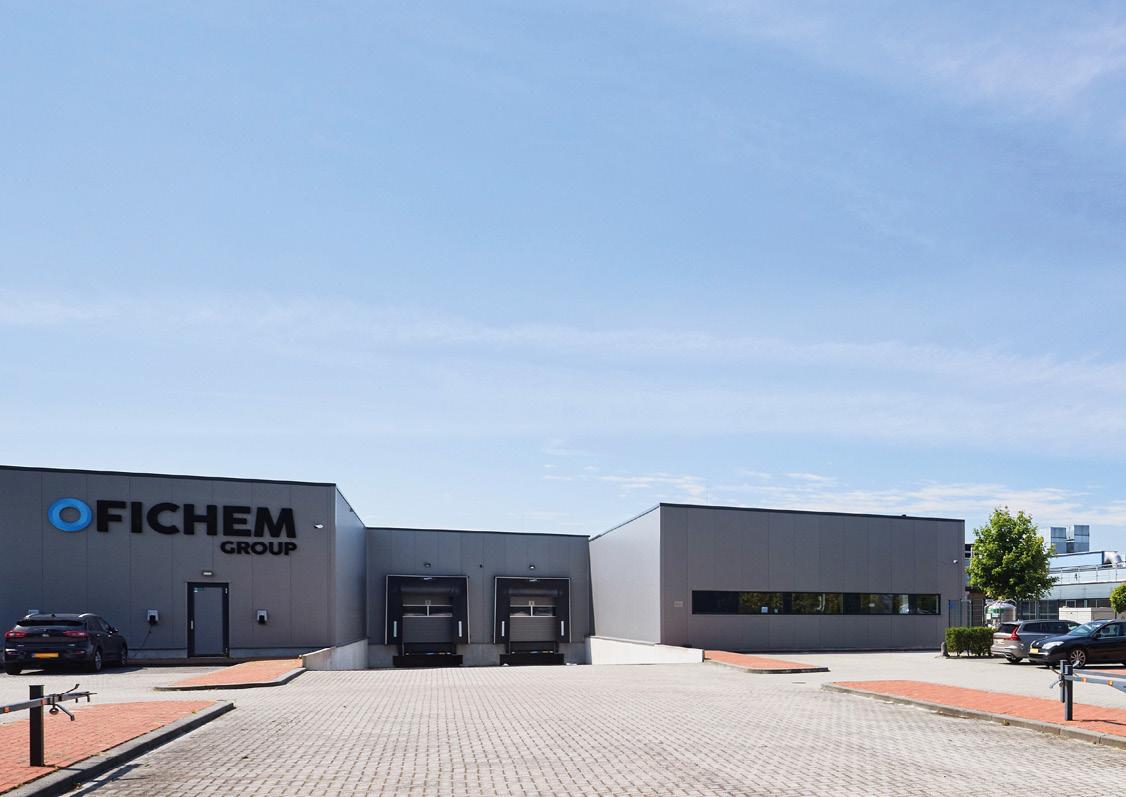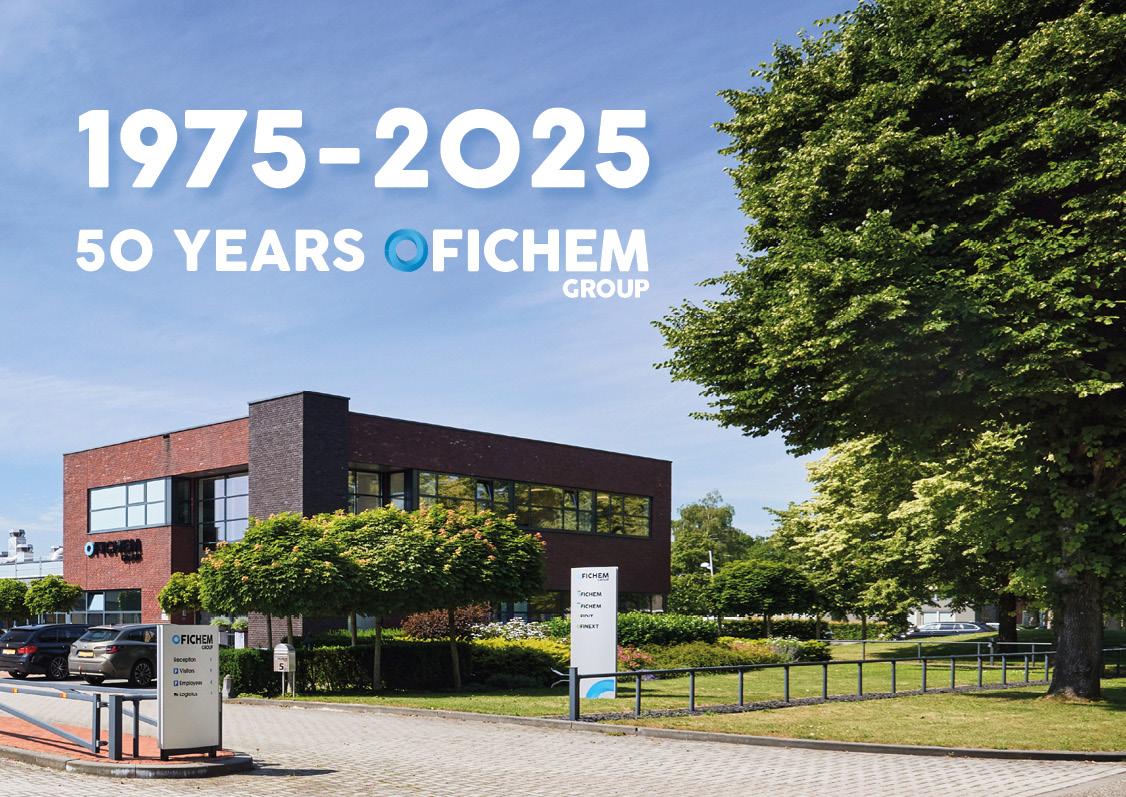

VOORWOORD
Namens burgemeester Jaap Velema van Westerwolde
Met gepaste trots en grote waardering schrijf ik dit voorwoord ter gelegenheid van het 50-jarig jubileum van de Ofichem Group – een familiebedrijf dat diepgeworteld is in onze regio, maar met een reikwijdte tot ver buiten de grenzen van Westerwolde en Nederland.
Het verhaal van Ofichem is even bijzonder als inspirerend. Wat ooit begon in een garage en later voortgezet werd in een oude melkfabriek, groeide uit tot een toonaangevende producent van actieve farmaceutische ingrediënten en medicijnen. Dat dit alles begon met een laboratorium dat ‘toevallig’ beschikbaar was in Ter Apel, lijkt op het eerste gezicht een gelukkig toeval. Maar wie dieper kijkt, ziet een bijzonder ondernemersverhaal – een Groningse variant op de start-upcultuur uit Silicon Valley. Niet geboren uit innovatie alleen, maar uit veerkracht, visie en de onmiskenbare mentaliteit van Oost-Groningen: nuchter, betrokken, standvastig. Waar Silicon Valley draait op investeerders en hype, draait Ofichem op vakmanschap, regionale verankering en internationale kwaliteit.
De ligging van Ter Apel – op het oog ver weg van de wereld, maar feitelijk strategisch tussen Hamburg en Rotterdam – blijkt geen belemmering maar een kracht. De keuze om juist hier te bouwen aan kennis, innovatie en kwaliteit getuigt van moed en overtuiging. Waar anderen vertrokken, werd hier iets opgebouwd. Waar verval dreigde, ontstond vernieuwing.
Het succes van Ofichem is niet alleen te danken aan scherp ondernemerschap, maar zeker ook aan de mensen uit onze regio. Lokale vakmensen, jarenlang betrokken, met kennis en loyaliteit als fundament van de continuïteit. Deze verwevenheid met de gemeenschap maakt Ofichem niet zomaar een bedrijf, maar een voorbeeld van wat er mogelijk is als ondernemerschap hand in hand gaat met regionale verbondenheid.
Namens het gemeentebestuur breng ik dan ook mijn diepe waardering en felicitaties over aan de familie Oldenziel, alle medewerkers en partners van Ofichem. Dit jubileum is niet alleen een moment om terug te kijken, maar ook een bemoedigend signaal voor de toekomst: er is hier in Westerwolde meer mogelijk dan we soms zelf durven te dromen.
Jaap Velema
Burgemeester Westerwolde
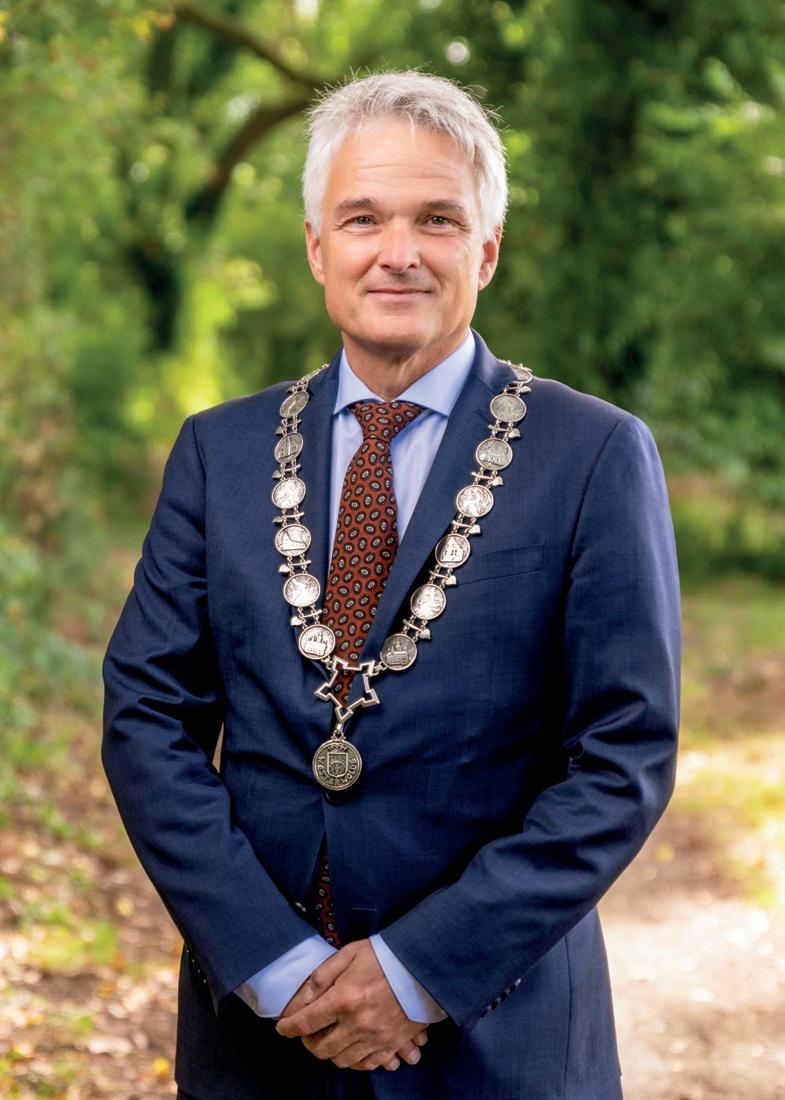
Foto: Metha Eikens.
FOREWORD
With due pride and great appreciation, I write this foreword on the occasion of the 50th anniversary of the Ofichem Group – a family business deeply rooted in our region, but with a reach far beyond the borders of Westerwolde and the Netherlands.
Ofichem’s story is as unique as it is inspiring. What once began in a garage and later continued in an old dairy factory, grew into a leading producer of active pharmaceutical ingredients and medicines. That it all began with a laboratory that “just happened” to be available in Ter Apel seems, at first glance, a happy coincidence. But upon closer inspection, one discovers a unique entrepreneurial story — a local, Northern variant on the Silicon Valley startup culture. Born not from innovation alone, but from resilience, vision, and the unmistakable mentality of East Groningen: down-to-earth, committed, and steady. While Silicon Valley thrives on investors and hype, Ofichem thrives on craftsmanship, regional roots, and international quality.
Ter Apel’s location — seemingly remote, yet strategically situated between Hamburg and Rotterdam — proves to be not an obstacle but a strength. The choice to build knowledge, innovation, and quality here demonstrates courage and conviction. Where others left, something was built here. Where decay threatened, innovation emerged.
Ofichem’s success is due not only to sharp entrepreneurship, but certainly also to the people from our region. Local professionals, committed for years, with knowledge and loyalty as the foundation of continuity. This interconnectivity with the community makes Ofichem more than just a company, but an example of what is possible when entrepreneurship goes hand in hand with regional connection.
On behalf of the municipal council, I therefore express my deepest appreciation and congratulations to the Oldenziel family, all employees, and partners of Ofichem. This anniversary is not only a moment to look back, but also an encouraging sign for the future: more is possible here in Westerwolde than we sometimes dare to dream.
Jaap Velema Mayor of Westerwolde
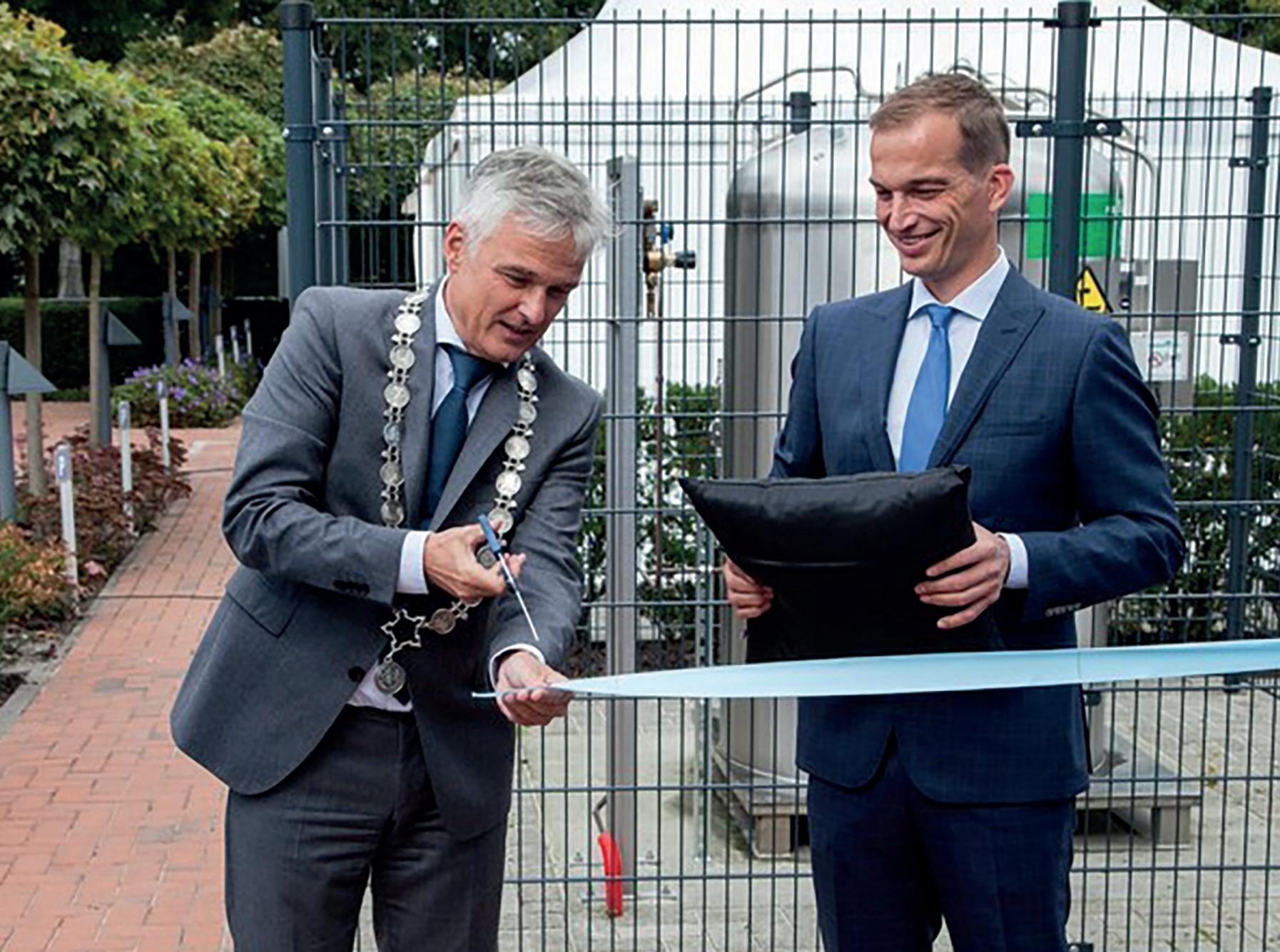
On behalf of Mayor Jaap Velema of Westerwolde
Mayor Velema ceremonially opens the new R&D facility/laboratories. Photo: Geert Smit.
Ofichem Group maakt het verschil Ofichem Group Makes the Difference
Ondernemen met een Missie Entrepreneurship with a Mission
50 jaar Ofichem: een tijdlijn
50 Years of Ofichem: A Timeline
Werving van personeel: toen en nu Recruiting Staff: Then and Now
Hoe Ofichem begon How Ofichem Started
Goede tijden en slechte tijden Good Times and Bad Times
Interview met Ina Oldenziel
with Ina Oldenziel
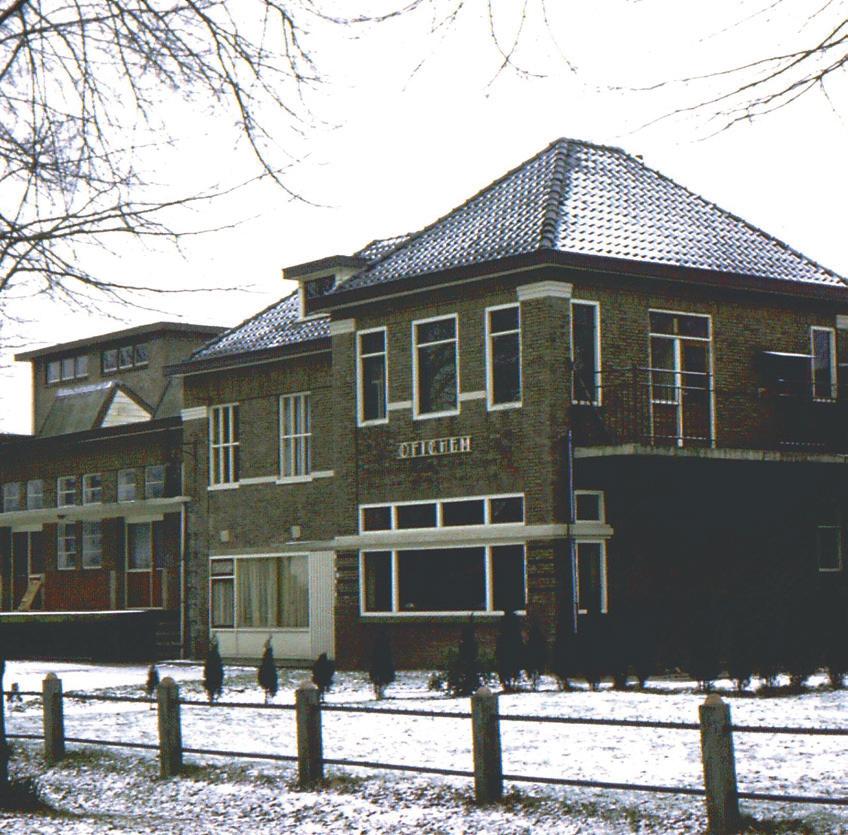
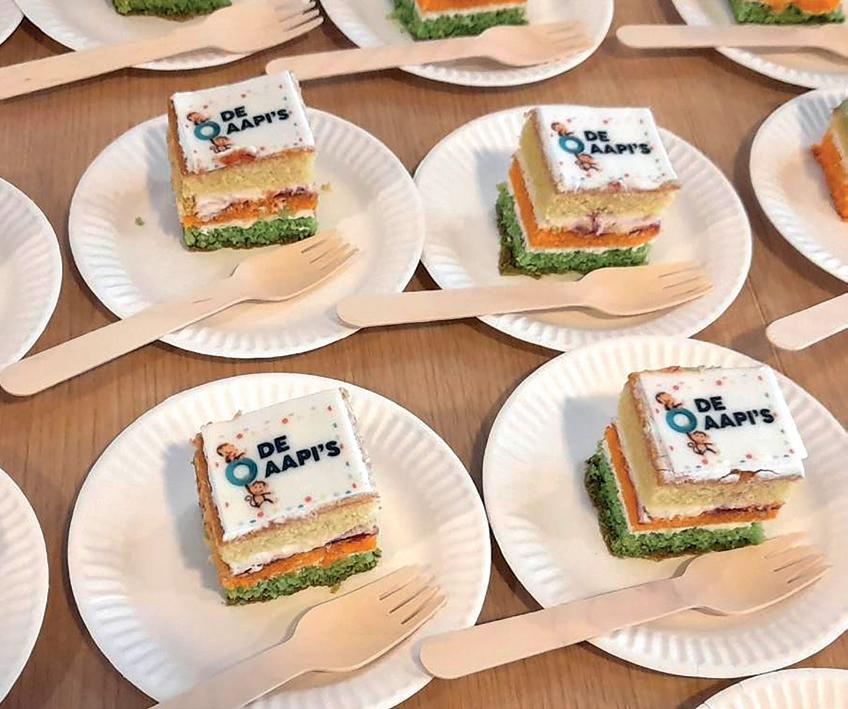
De AAPI’s binnen Ofichem The AAPIs within Ofichem
Interview met Truida Dol Interview with Truida Dol
Groei en ontwikkelingen Growth and Developments
Interview met Arjan van Ravenhorst Interview with Arjan van Ravenhorst

Interview with Weite Oldenziel
Feiten en cijfers Facts and Figures
Ofichem op de kaart Ofichem on the Map Opbouw van de Ofichem Group Ofichem’s Organisational Chart
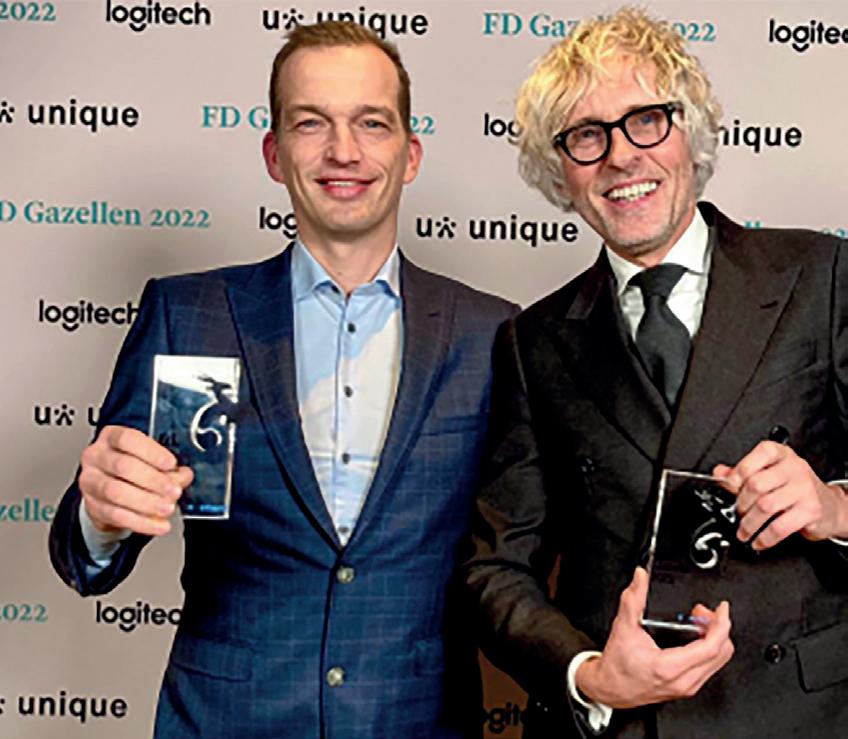
Een terugblik Looking
Blik op de toekomst Looking into the Future
Colofon Colophon
OFICHEM GROUP MAAKT HET VERSCHIL
OFICHEM GROUP MAKES THE DIFFERENCE
In een wereld waarin gezondheid steeds belangrijker wordt, maken wij — de Ofichem Group — al decennialang het verschil. Wat ooit als klein bedrijf begon, is in de afgelopen 50 jaar uitgegroeid tot een allround speler in de wereld van actieve farmaceutische ingrediënten (API’s) en medicijnen.
Maar wat ons écht onderscheidt, is onze overtuiging dat ieder mens én dier recht heeft op een eerlijk en veilig medicijn.
Onze missie is helder: bijdragen aan een betere gezondheid voor mens en dier. Dat doen we niet alleen door hoogwaardige veilige grondstoffen en medicijnen te leveren voor zowel mens als dier, maar ook door altijd te denken vanuit de klant.
Kwaliteit en klantgerichtheid gaan bij ons hand in hand. We stellen hoge eisen aan de API’s, medicijnen, onze diensten en veiligheid. Hierbij sturen wij op continue verbetering en eisen wij grondige kennis om te voldoen aan GMP-, GDP-, ICH- en ISO-richtlijnen* in elke fase.
In a world where health is becoming increasingly important, we — the Ofichem Group — have been making a difference for decades. What started as a small company has grown over the past 50 years into a comprehensive player in the world of active pharmaceutical ingredients (APIs) and medicines.
But what truly sets us apart is our belief that every person and animal has the right to honest and safe medicine.
Our mission is clear: to contribute to better health for people and animals. We do this not only by supplying high-quality safe raw materials and medicines for both humans and animals, but also by always thinking from the customer’s perspective.
Quality and customer focus go hand in hand with us. We set high standards for our APIs, medicines, services, and safety. We strive for continuous improvement and demand in-depth knowledge to comply with GMP, GDP, ICH, and ISO guidelines* at every stage.
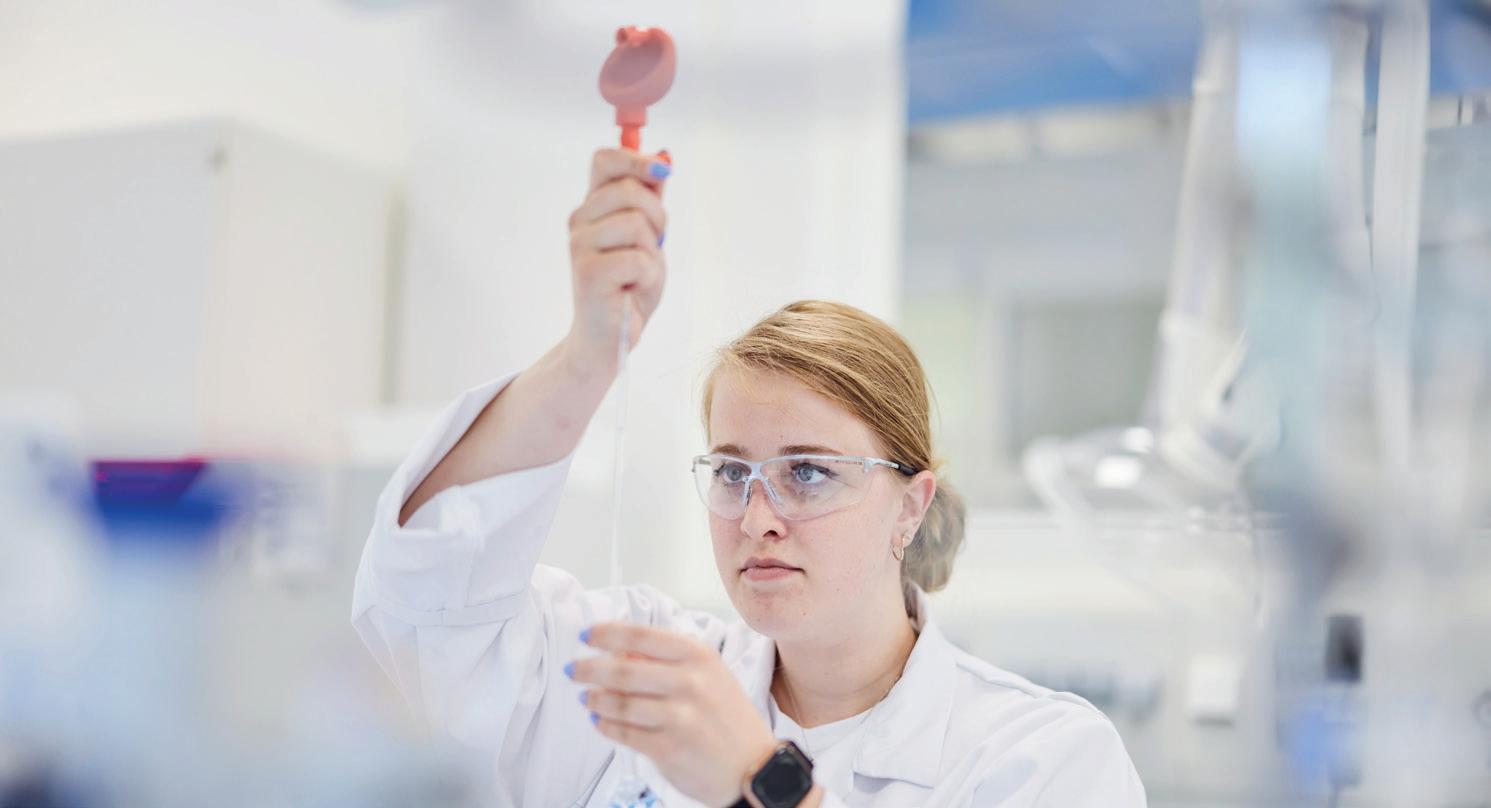
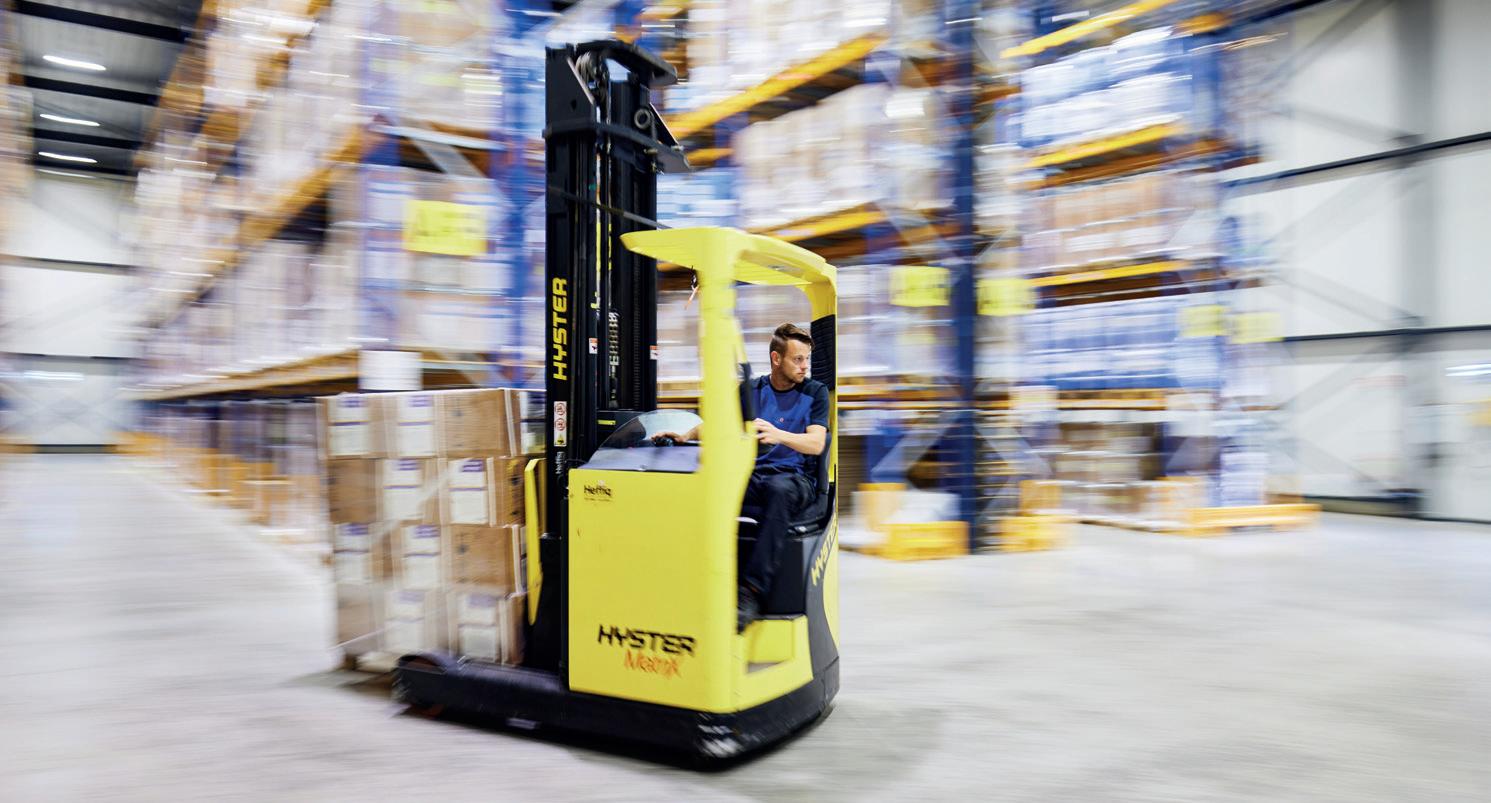
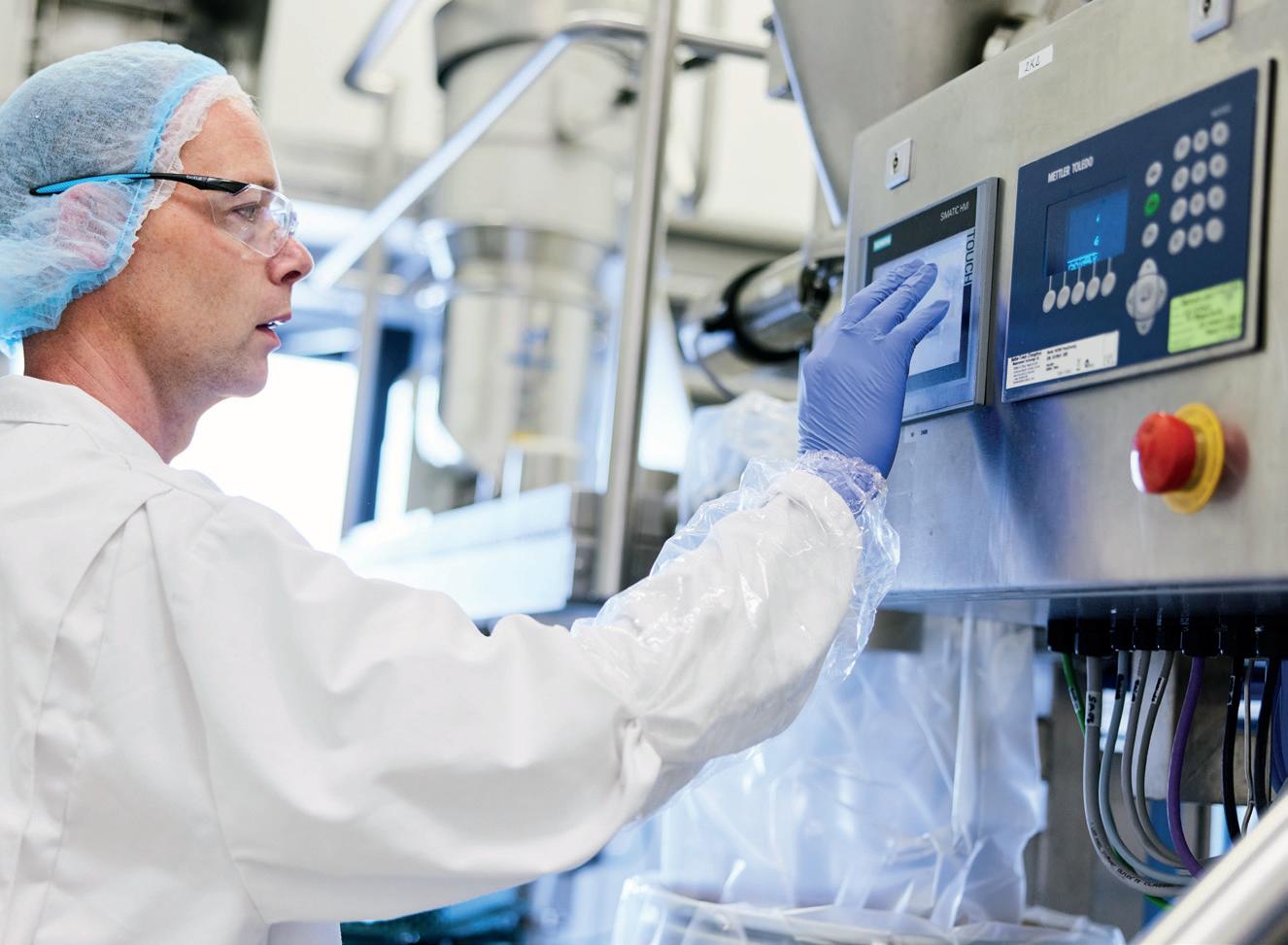
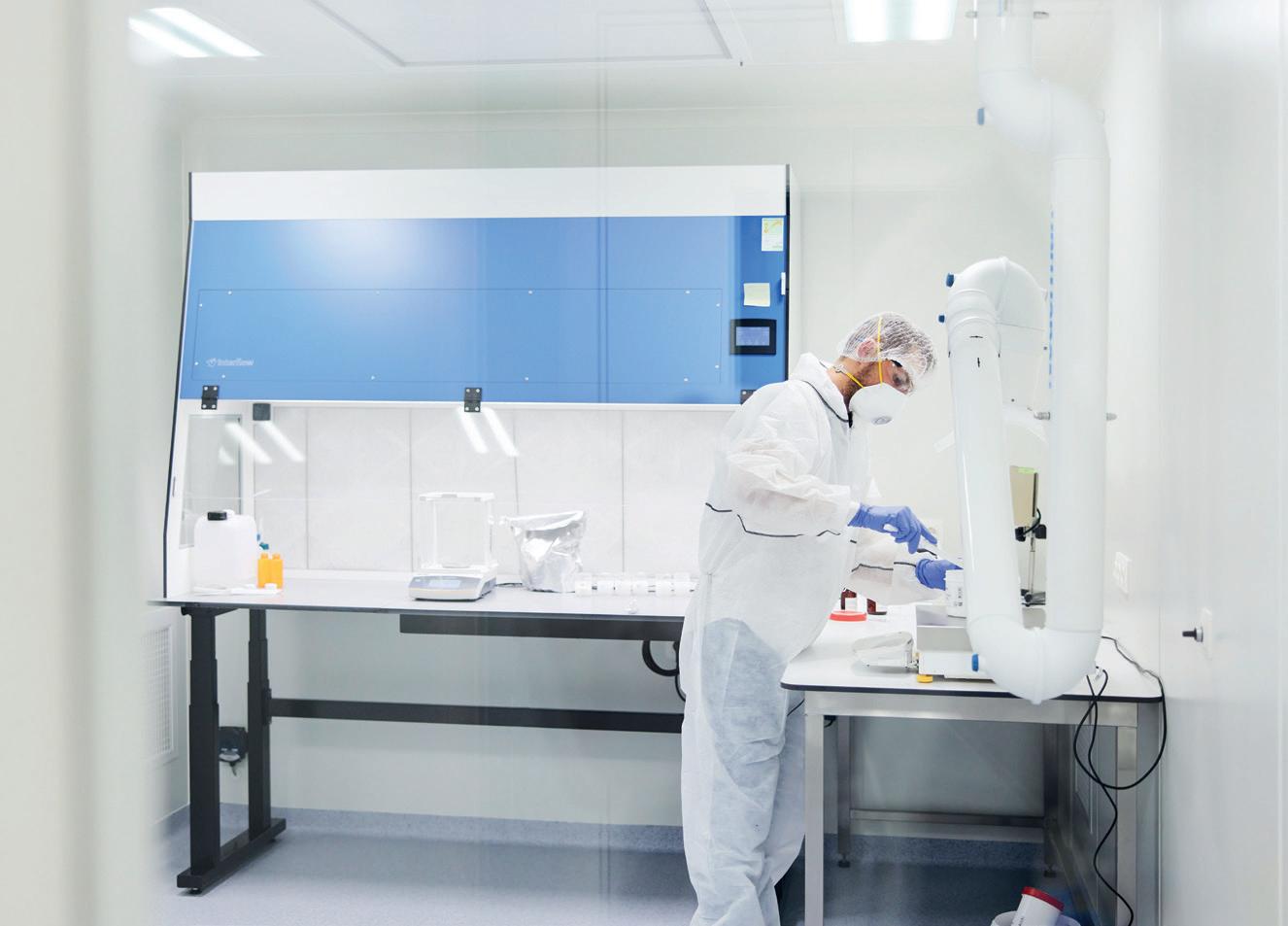
Proactief
In de loop der jaren heeft de Ofichem Group zich voortdurend aangepast aan veranderende markten en regelgeving. Door proactief in te spelen op ontwikkelingen in de farmaceutische industrie, zijn we uitgegroeid tot een partner die niet alleen API’s en medicijnen ontwikkelt, produceert en wereldwijd distribueert, maar ook een compleet gamma aan dienstverlenende activiteiten exploiteert.
WE STELLEN HOGE EISEN AAN DE API’S, MEDICIJNEN, ONZE DIENSTEN EN VEILIGHEID
De ontwikkeling van een medicijn is een complex en langdurig proces, dat gepaard gaat met strenge veiligheidsnormen en wettelijke vereisten. In veel aspecten van dit proces speelt de Ofichem groep een cruciale rol.
Uitbreiding
Een belangrijke aanpassing die we door de jaren heen hebben gemaakt is het uitbreiden met verschillende activiteiten. Sinds 2001 zijn er verschillende Business Units opgericht. Zo groeide Lab Ofichem uit tot de Ofichem Group.
Proactive
Over the years, the Ofichem Group has continuously adapted to changing markets and regulations. By proactively responding to developments in the pharmaceutical industry, we have grown into a partner that not only develops, manufactures and distributes APIs and medicines worldwide, but also exploits a complete range of service activities.
WE SET HIGH STANDARDS FOR OUR APIS, MEDICINES, SERVICES, AND SAFETY
The development of a medicine is a complex and long-term process, that comes with strict safety standards and legal requirements. The Ofichem Group plays a crucial role in many aspects of this process.
Expansion
An important change we have made over the years is to expand into different activities. Since 2001, several Business Units have been established. This is how Lab Ofichem grew into the Ofichem Group.
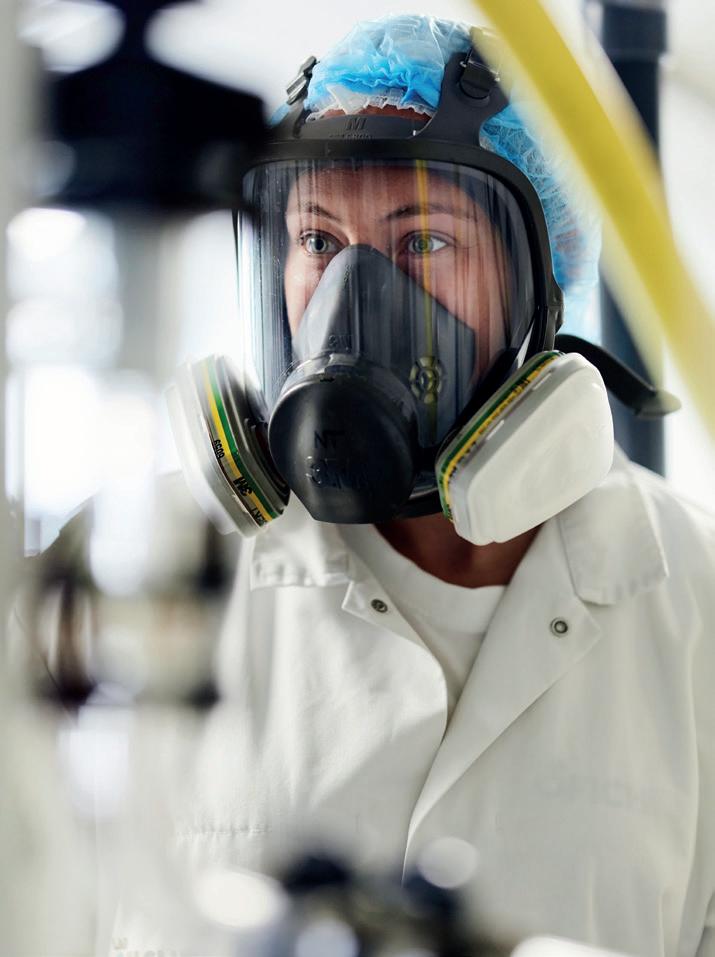
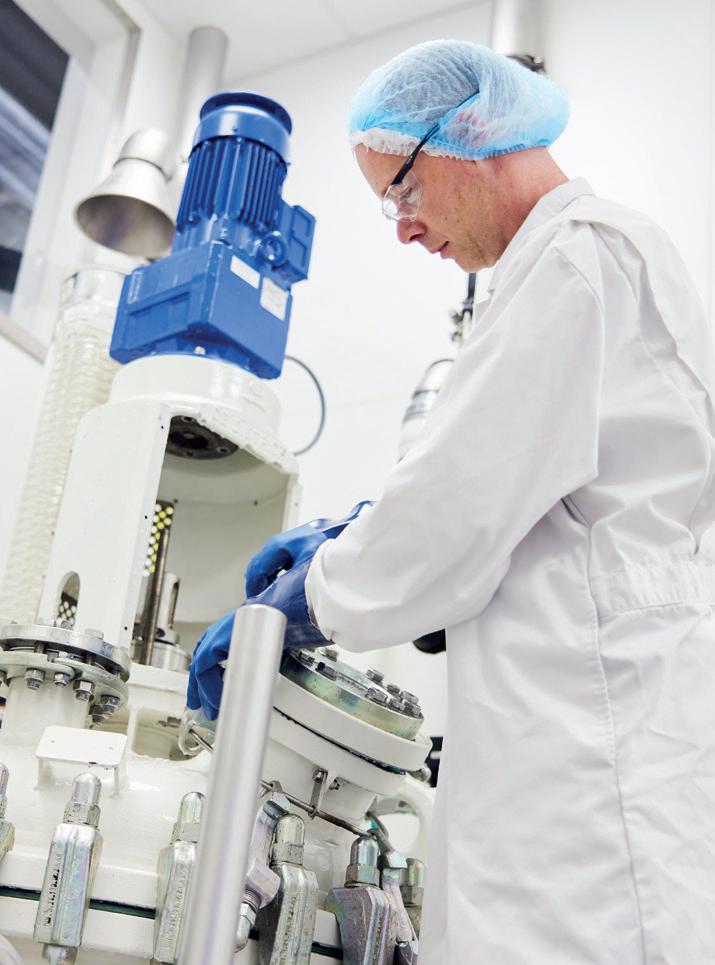
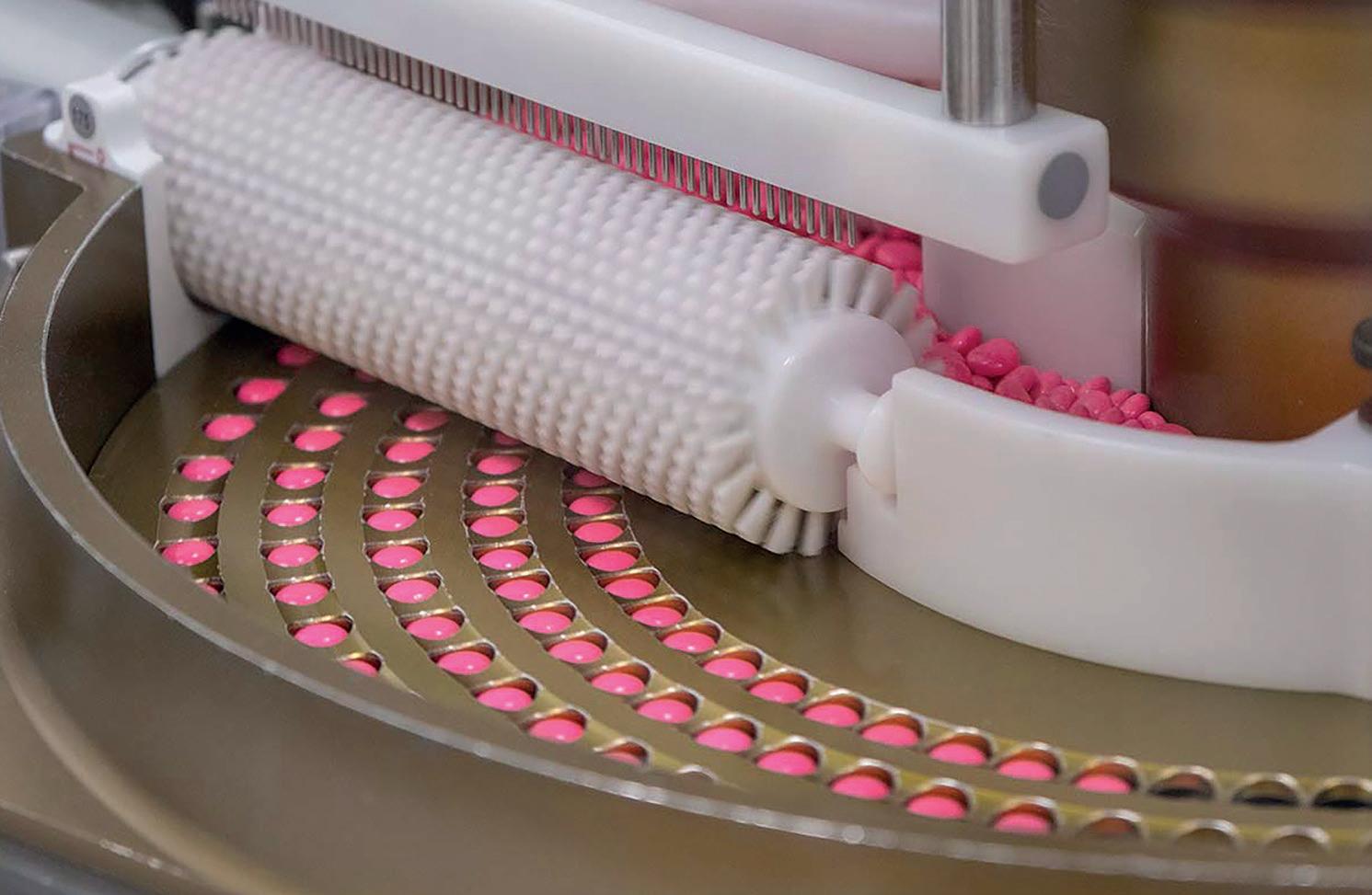
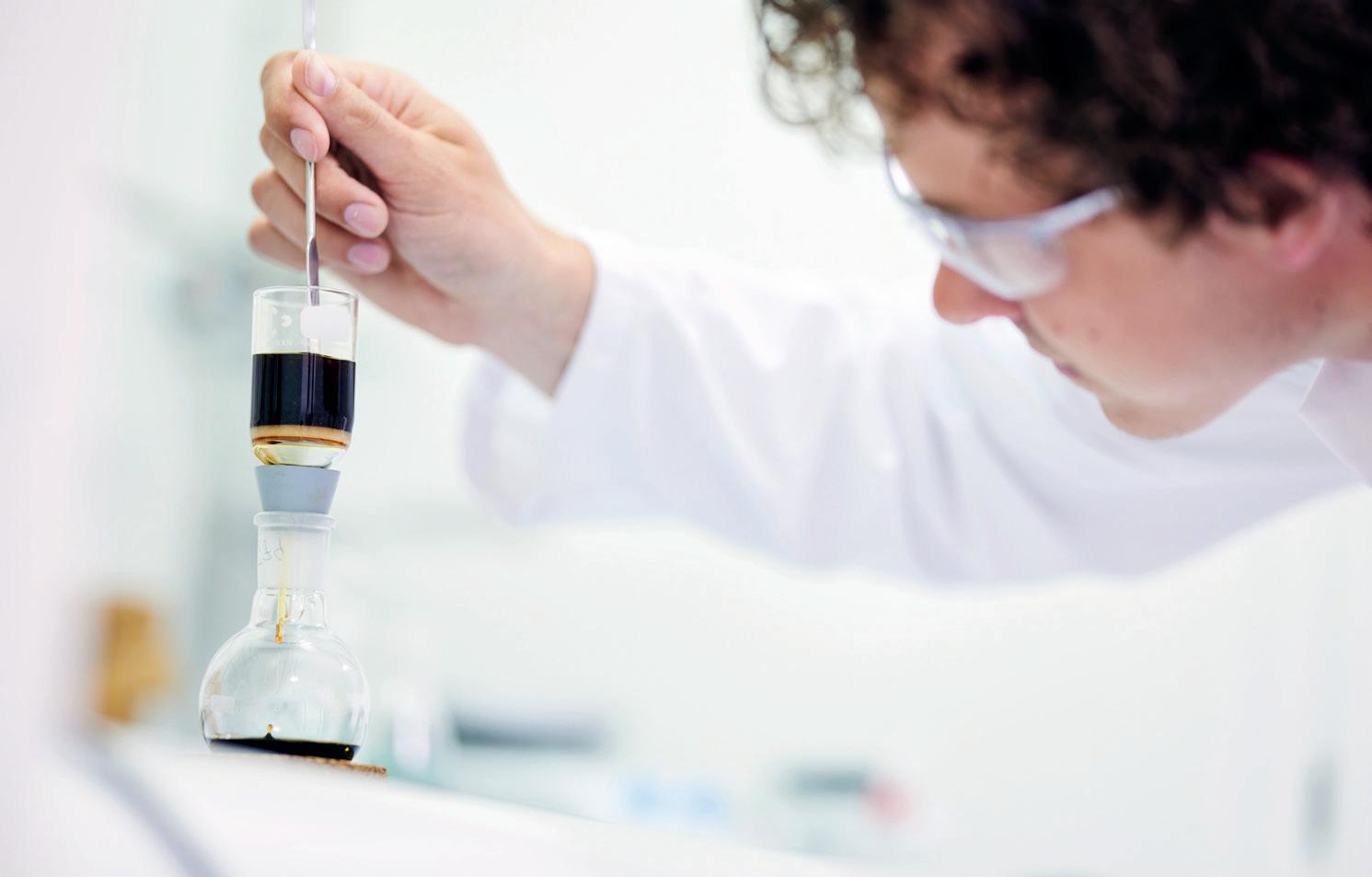
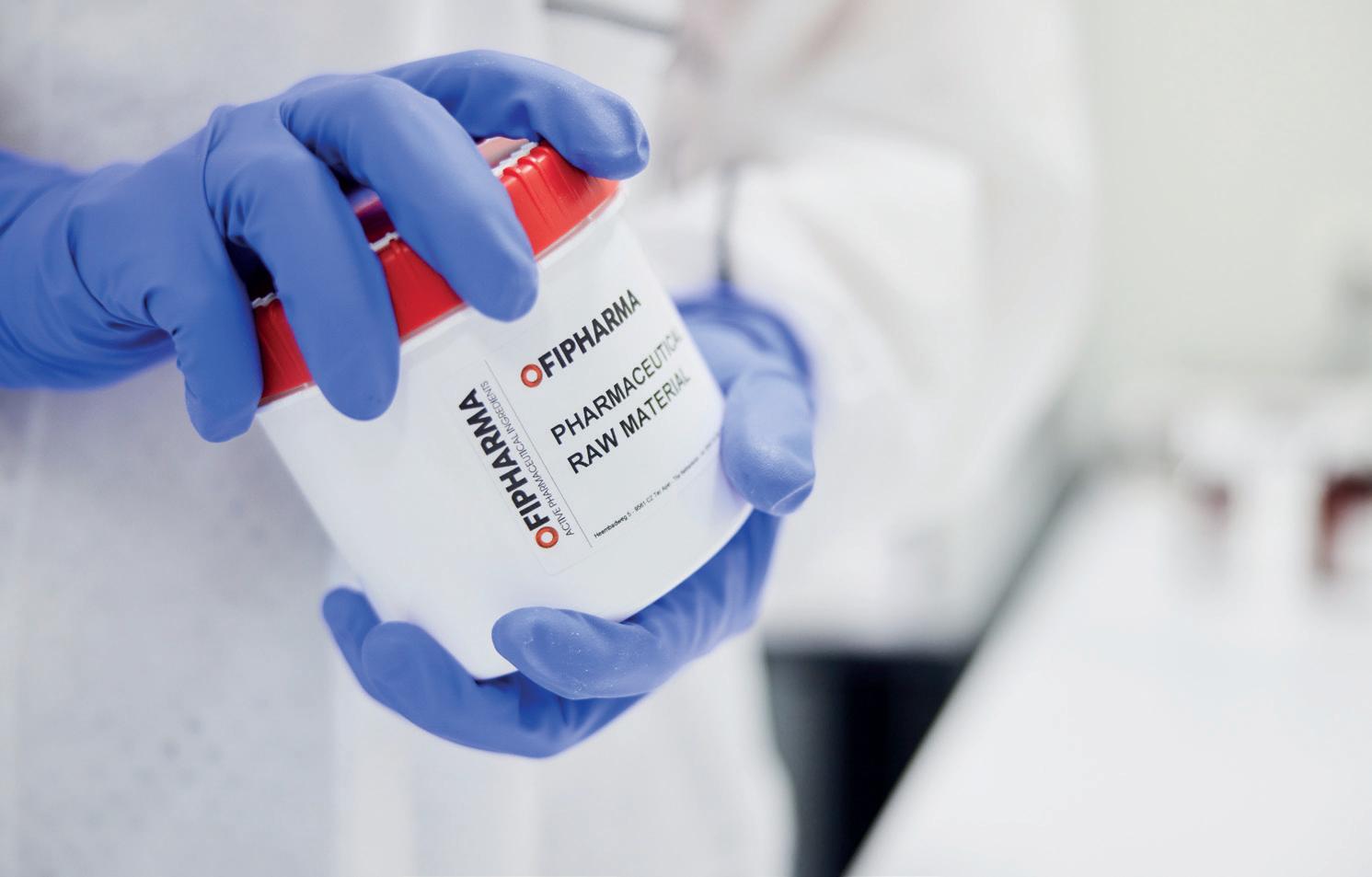
De synergie tussen deze verschillende Business Units maakt Ofichem Group tot een sterke en stabiele speler in de markt. Door de expertise en diverse internationale netwerken van de verschillende Business Units te combineren ontstaat een solide fundament waarop klanten kunnen vertrouwen.
De Ofichem Group houdt zich bezig met het oplossen van complexe vraagstukken op het gebied van API’s en medicijnen. Dit zijn bijvoorbeeld analytische, chemische en formuleringsvraagstukken die een rol spelen in ontwikkelingsprocessen en in de commerciële productie.
HET IS EEN VERHAAL VAN EEN
ORGANISATIE MET EEN
HART VOOR GEZONDHEID
Ook houdt de Ofichem Group zich bezig met het opslaan, ompakken, analyseren en distribueren van zowel API’s als medicijnen. Wat de vraag ook is: wij staan klaar met kennis, ervaring en toewijding.
The synergy between these different Business Units makes the Ofichem Group a strong and stable player in the market. By combining the expertise and the diverse international networks of the various Business Units, we have created a solid foundation on which customers can rely.
IT IS A STORY OF AN ORGANIZATION WITH A PASSION FOR HEALTH
The Ofichem Group is engaged in solving complex issues in the field of APIs and medicines. These include analytical, chemical and formulation issues that play a role in development processes and commercial production.
The Ofichem Group is also involved in the storage, repackaging, analysis and distribution of both APIs and medicines. Whatever the question, we are standby with knowledge, experience and dedication.
Visie
We hebben een duidelijke visie waar het bedrijf naartoe moet groeien. We willen namelijk een volledig geïntegreerd farmaceutisch bedrijf zijn, dat elke individuele stap kan uitvoeren die nodig is in de ontwikkeling en commerciële productie van medicijnen; een one-stop-shop. Hierbij is partnerschap en het samen optrekken met onze klanten van het hoogste belang.
De geschiedenis van Ofichem is er één van groei, innovatie en samenwerking. Maar bovenal is het een verhaal van een organisatie met een hart voor gezondheid, voor mens én dier.
Vision
We have a clear vision for the company’s future. We want to be a fully integrated pharmaceutical company, that can carry out every individual step required in the development and commercial production of medicines; a onestop shop. Partnership and working together with our customers are of the utmost importance in this regard.
Ofichem’s history is one of growth, innovation and collaboration. But above all, it is the story of an organisation with a heart for health, both for humans and animals.
ONDERNEMEN MET EEN MISSIE
ENTREPRENEURSHIP WITH A MISSION
Rondom medicijnen vinden een aantal belangrijke maatschappelijke discussies plaats. Zo is er sprake van frequent medicijntekorten op het vlak van generieke geneesmiddelen, is er een sterke afhankelijkheid van medicijnproductie van landen buiten Europa en is er veel discussie over de ontwikkeling en betaalbaarheid van nieuwe geneesmiddelen. Waarom is dat? Een gesprek met Weite Oldenziel, CEO van Ofichem Group.
“Hoofdzakelijk zijn er twee categorieën medicijnen: generieke medicijnen en specifieke, innovatieve medicijnen. Bij de eerste categorie is er een race-to-thebottom. Men kijkt wereldwijd naar de goedkoopste productielocatie. Zo is uiteindelijk de waarde van dit soort medicijnen enorm gedaald. Met alle gevolgen van dien. Diverse fabrikanten zijn eraan failliet gegaan, er is nauwelijks tot geen infrastructuur meer in Europa of de VS en men is 100% afhankelijk van China en India. De politiek heeft hier geen antwoord op.”
“Bij de tweede categorie is het precies andersom. De focus van westerse bedrijven ligt juist op innovatieve, vaak zeer geavanceerde medicijnen. Dit is zeker iets dat heel goed is”, vindt Weite.
“Het gaat immers om het behandelen van ziektes en aandoeningen waarop men eerst nog geen antwoord had. Echter is de betaalbaarheid van deze medicijnen een grote maatschappelijke uitdaging. Hierin zit ook een politieke paradox. Iedereen wil innovatie, maar niemand wil er voor betalen.”
Wat zouden we in Nederland moeten doen om minder afhankelijk te worden?
”Het hebben van een visie! Met de kennis van nu kunnen we vaststellen dat we de farmaceutische industrie in Nederland zo goed als kwijt zijn geraakt en dat we daardoor erg afhankelijk zijn geworden van landen in het Verre Oosten. Dat zouden we zo snel mogelijk moeten zien terug te draaien, voordat het te laat is. Als land zouden we in ieder geval voor de meest kritische medicijnen toch een bepaalde mate van zelfbeschikking moeten hebben.”
Several important societal discussions are taking place around medicines. For example, there are frequent shortages of generic drugs, there is a strong dependence on drug production in countries outside Europe, and there is considerable debate about the development and affordability of new medicines. Why is this? An interview with Weite Oldenziel, CEO of Ofichem Group.
“There are essentially two categories of medicines: generic medicines and specific, innovative medicines. In the first category, it is a race to the bottom. People are looking worldwide for the cheapest production location. As a result, the value of these types of medicines dropped significantly. With all the ensuing consequences. Several manufacturers have gone bankrupt, there is little to no infrastructure left in Europe or the US, and people are 100% dependent on China and India. Politicians have no answer to this.”
“In the second category, it is exactly the opposite. The focus of Western companies is precisely on innovative, often highly advanced medicines. This is certainly a very good thing,” says Weite.
“After all, it is about treating diseases and conditions for which no one previously had an answer. However, the affordability of these medicines is a major societal challenge. This also entails a political paradox. Everyone wants innovation, but no one wants to pay for it.”
What should we do in the Netherlands to become less dependent?
“We should have a vision! With the knowledge we have now, we can conclude that we have almost lost the pharmaceutical industry in the Netherlands and that we have therefore become very dependent on countries in the Far East. We should try to reverse this as quickly as possible, before it is too late. As a country, we should have a certain degree of self-determination for at least the most critical medicines.”
“We hebben pijnlijke lessen geleerd tijdens de Covid-19 periode. Bovendien is het geen financiële kwestie. 80% van alle medicijnen valt in de categorie ‘zeer goedkoop’, maar is wel van levensbelang. De totale uitgaven voor deze medicijnen is maar een fractie van ons zorgbudget, minder dan 0.5%.
Het is dus louter een kwestie van visie, competentie en politieke wil.”
Wat drijft jou als mens om werkzaam te zijn in deze branche?
“Ik vind dat gezondheidszorg voor iedereen toegankelijk moet zijn! Zowel voor mens als dier. Ons doel is om mensen te helpen met behulp van onze farmaceutische producten.”
“Ik vind het nog steeds wonderlijk hoe je met micro- en milligrammen van een bepaald stofje zo’n impact kunt maken op een mensenleven; dat je zo’n positieve bijdrage kan leveren aan iemands gezondheid! Dat drijft mij als mens om in deze sector actief te zijn.”
“Als privépersoon maak ik me wel zorgen over de beschikbaarheid van medicijnen nu en in de toekomst. Die raakt steeds verder onder druk. Dat is niet uit te leggen! Het is immers geen kwestie van geld en ook niet van beschikbaarheid van stoffen of productiecapaciteit.”
“We learned some painful lessons during the Covid-19 period. Moreover, it is not a financial issue. 80% of all medicines fall into the ‘very cheap’ category, yet they are vital. The total expenditure on these medicines is only a fraction of our healthcare budget, less than 0.5%. So it is purely a matter of vision, competence, and political will.”
What motivates you to work in this industry?
“I believe healthcare should be accessible to everyone! For both humans and animals. Our goal is to help people with our pharmaceutical products.”
“I still find it amazing how you can make such an impact on a person’s life with micrograms and milligrams of a specific substance; that you can make such a positive contribution to someone’s health! That is what motivates me to be active in this sector.”
“As a private individual, I am concerned about the availability of medicines, both now and in the future. It is under increasing pressure. It is inexplicable! After all, it is not a matter of money, nor of
“In Nederland en Europa heeft wanbeleid ervoor gezorgd dat de gezondheid van mensen onder druk is komen te staan door de geneesmiddeltekorten die er continu zijn. Het is niet uit te leggen dat cruciale medicijnen telkens niet leverbaar zijn in de apotheek of het ziekenhuis.”
“Hopelijk kunnen we over enkele decennia terugkijken op deze periode en concluderen dat we achteraf goed bijgestuurd hebben en het juiste hebben gedaan. Veel medicijnen — of het nu de API of het medicijn zelf is — kunnen als een primaire levensbehoefte beschouwd worden. Die moeten voor iedereen toegankelijk blijven, ook en júíst in noodsituaties.”
the availability of substances or production capacity.”
“In the Netherlands and Europe, mismanagement has caused people’s health to come under pressure due to the constant drug shortages. It is inexplicable that crucial medicines are constantly unavailable in pharmacies or hospitals.”
“Hopefully, in a few decades, we can look back on this period and conclude that we made the right adjustments and did the right thing. After all, many medicines, whether the API or the medicine itself, can be considered a basic necessity and these must remain accessible to everyone, especially in emergency situations.”
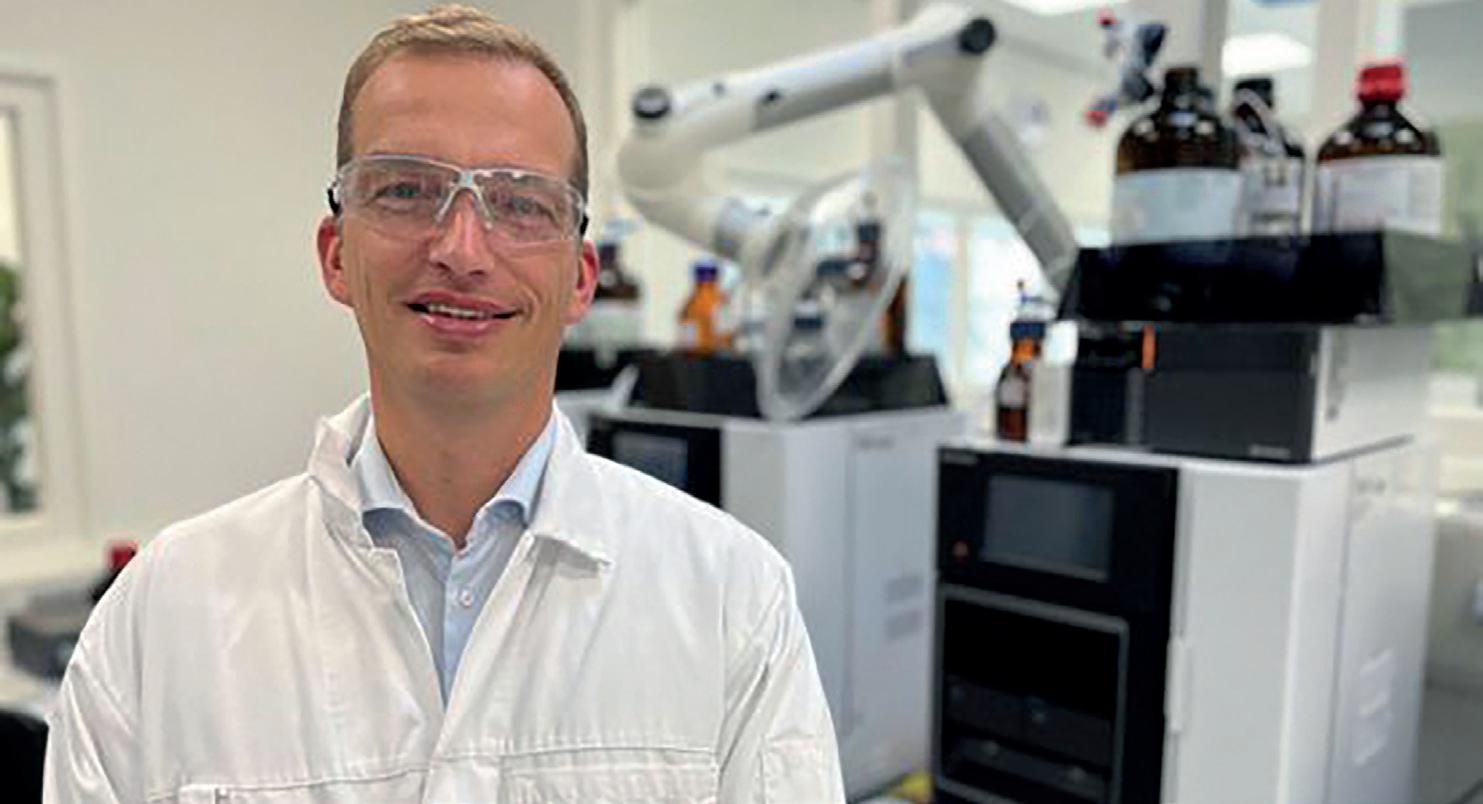
Foto: Loek Mulder, RTV Noord
50 JAAR OFICHEM: EEN TIJDLIJN
50 YEARS OF OFICHEM: A TIMELINE
OPGERICHT/FOUNDED:
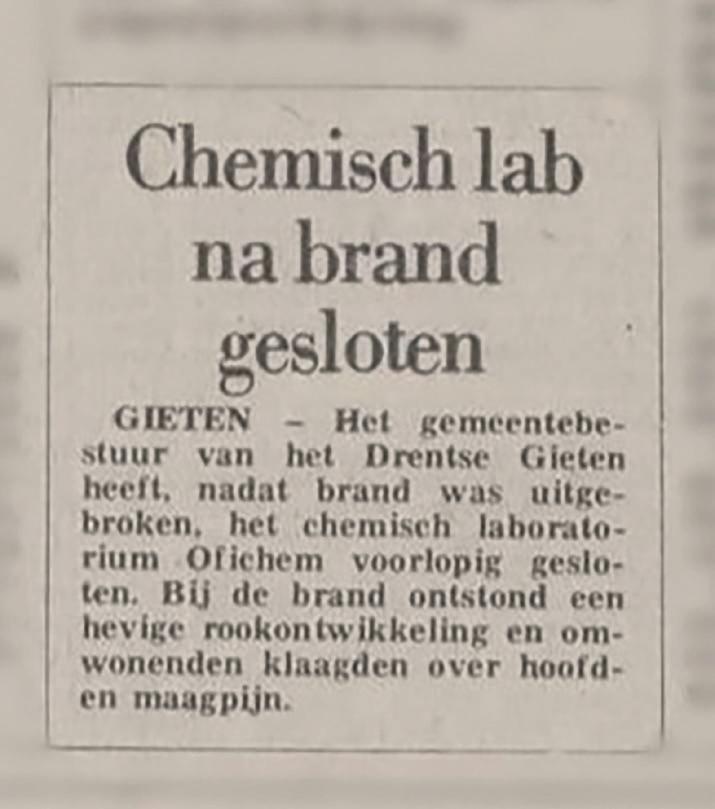

1975
Ofichem werd opgericht door Dr. Otto Oldenziel en Ina OldenzielMeursing. Hij begon het lab in de garage naast de woning. Na 1 jaar verhuisde het lab naar de oude melkfabriek in Gieten.
Ofichem was founded by Dr. Otto Oldenziel en Ina OldenzielMeursing. He started the lab in the garage next to the house. After 1 year, the lab moved to the old dairy factory in Gieten.
1977
Na een brand in het laboratorium werd Ofichem op 5 januari voorlopig gesloten door de gemeente.
After a fire in the chemical lab, Ofichem was temporarily closed by the municipality on the 5th of January.
1986
Ofichem verhuisde, na enig aandringen van de gemeente en omwonenden, naar Ter Apel.
After solicitation from the municipality and neighbours, Ofichem moved to Ter Apel.
OPGERICHT/FOUNDED:
2001
Incopharm werd opgericht. Het is een handelsbedrijf in API’s voor zowel humaan- als veterinair gebruik met als voornaamste afzetmarkt Oost Europa en de voormalige USSR landen.
Incopharm was founded. It is a trading company specializing in APIs for both human and veterinary use, with its primary sales market being Eastern Europe and the former USSR countries.
OPGERICHT/FOUNDED:
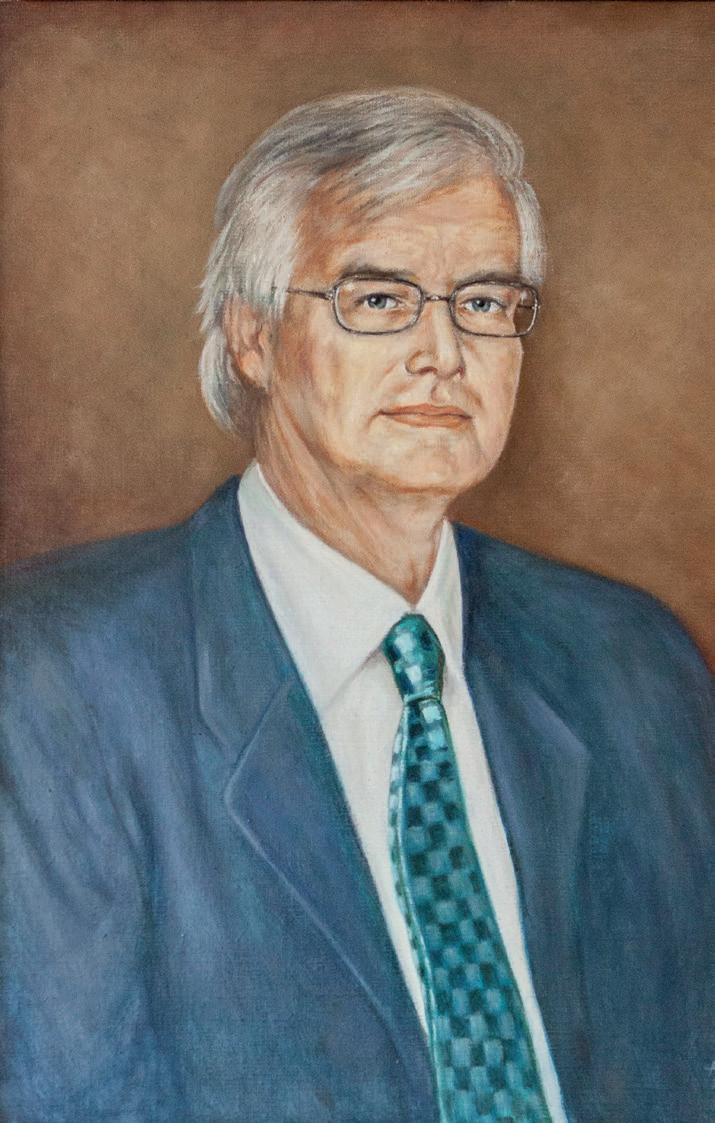
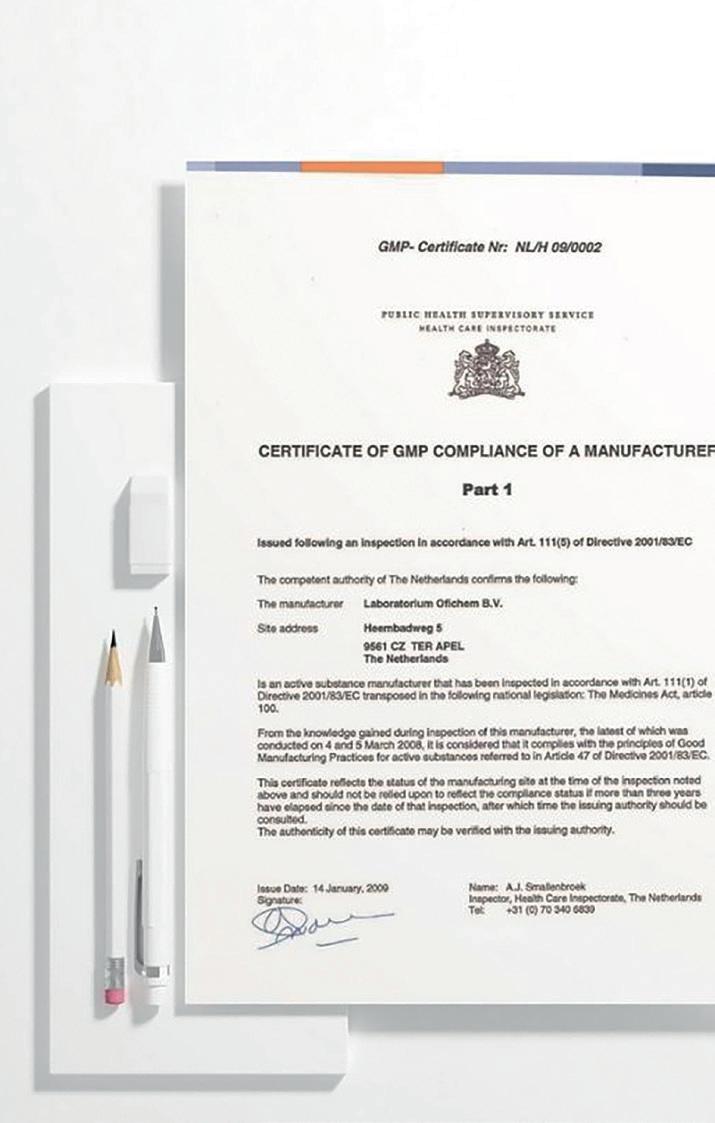
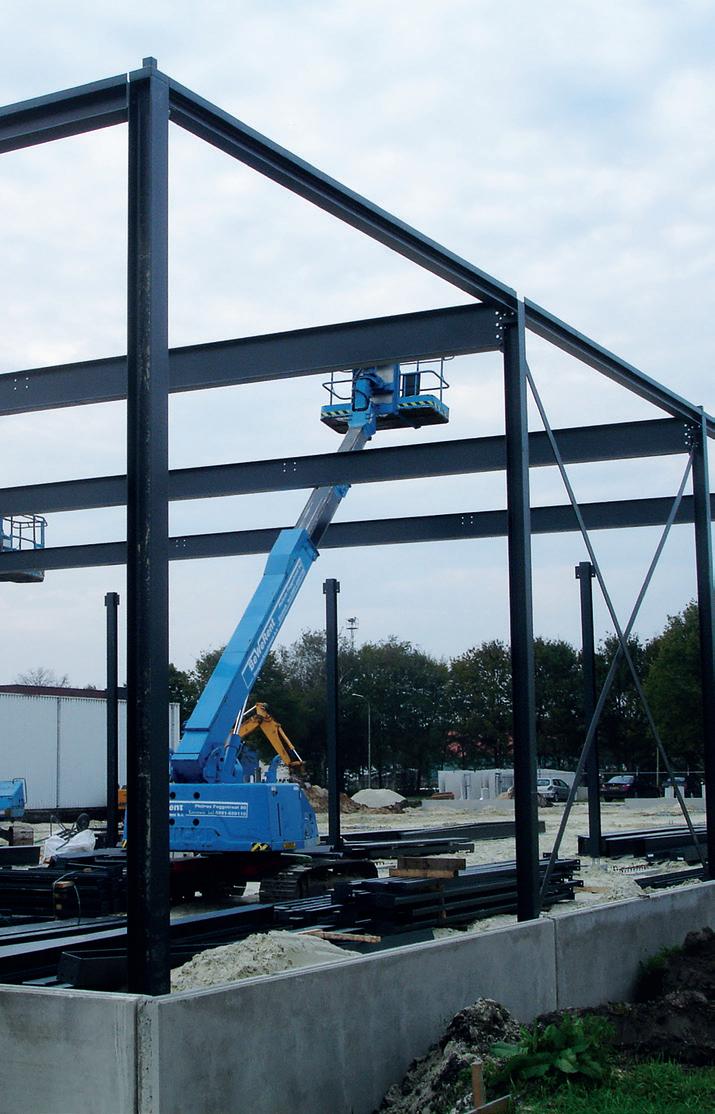
2004 2006
Ofichem B.V. werd opgericht. Het bedrijf koopt API’s voor diergeneesmid delen in, houdt die eventueel op voorraad en levert ze bij de klant.
Ofichem B.V. was founded. The company purchases APIs for veterinary medicines, holds them in stock if necessary, and delivers them to customers.
Een schok ging door het bedrijf na het plotseling overlijden van Dr. Otto Oldenziel. Dr. Weite Oldenziel nam het stokje van zijn vader over.
A shock went through the company after the sudden death of Dr. Otto Oldenziel. Dr. Weite Oldenziel took over the leadership from his father.
2008 2010 - 2012
De eerste GMP-inspectie (Good Manufacturing Practice) vond plaats in Ter Apel.
The first GMP-inspection (Good Manufacturing Practice) took place in Ter Apel.
Nieuwbouw en verbouwing locatie Heembadweg (Ter Apel).
New construction and renovation of the Heembadweg location (Ter Apel).
OPGERICHT/FOUNDED: OPGERICHT/FOUNDED:
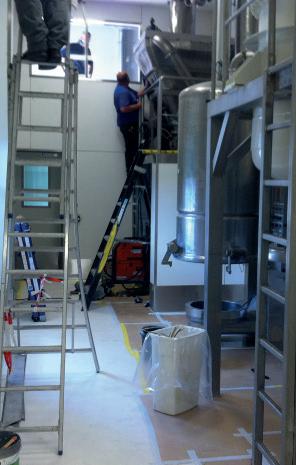
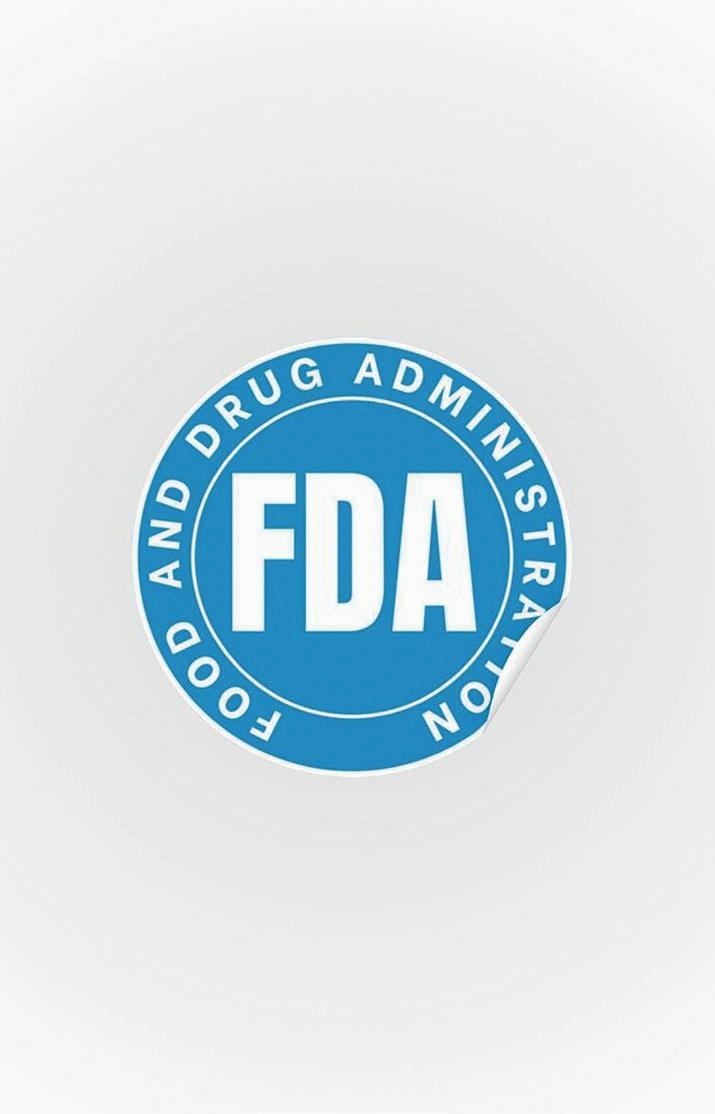
2011
Ofipharma werd opgericht. De Business Unit levert hoogwaardige API’s voor menselijk gebruik.
Ofipharma was founded. The Business Unit supplies high-quality APIs for human use.
2012
Ofidit werd opgericht. Dit is het onafhankelijke kwaliteitsborgingsbedrijf van Lab Ofichem in Hangzhou City, China.
Ofidit was established. This is the independent quality assurance company of Lab Ofichem in Hangzhou City, China.
2015
Alle productieruimtes werden aangepakt en alle installaties vervangen. Na deze verbouwing was Lab Ofichem na 9 jaar eindelijk weer up-to-standard.
All production areas were renovated and all installations replaced. After this renovation, Lab Ofichem was finally back up to standard after nine years.
2015
De eerste FDA-inspectie (de voedsel- en warenauthoriteit in de VS) vond plaats in Ter Apel.
The first FDA inspection (Food and Drug Administration of the USA) took place in Ter Apel.
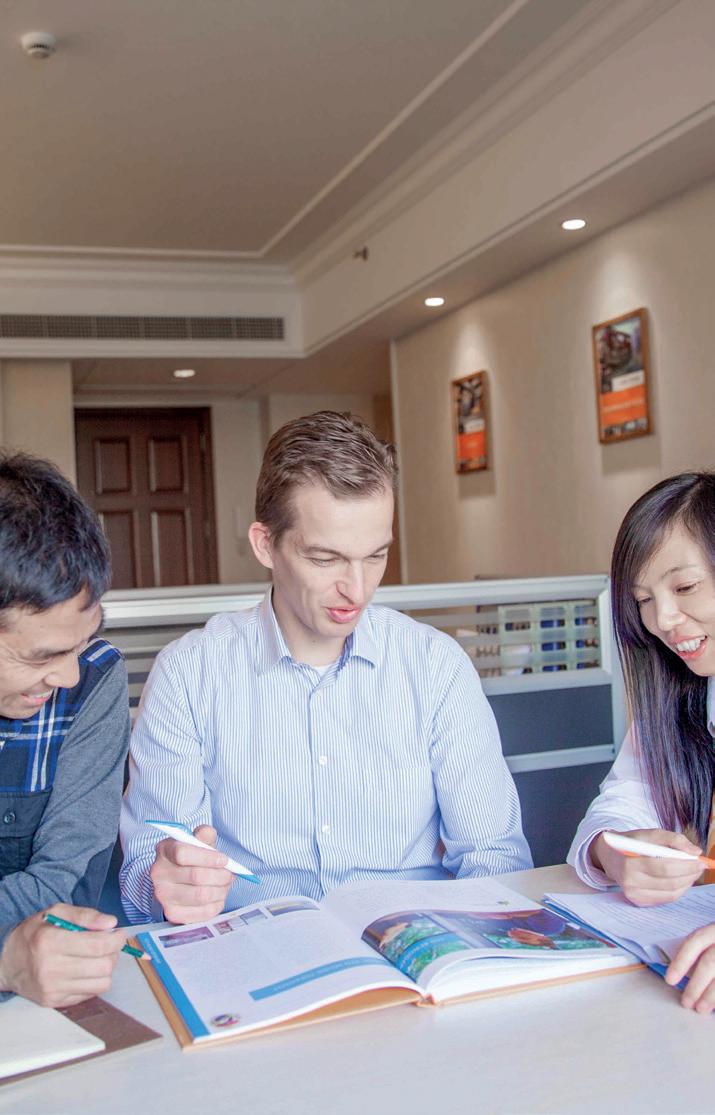
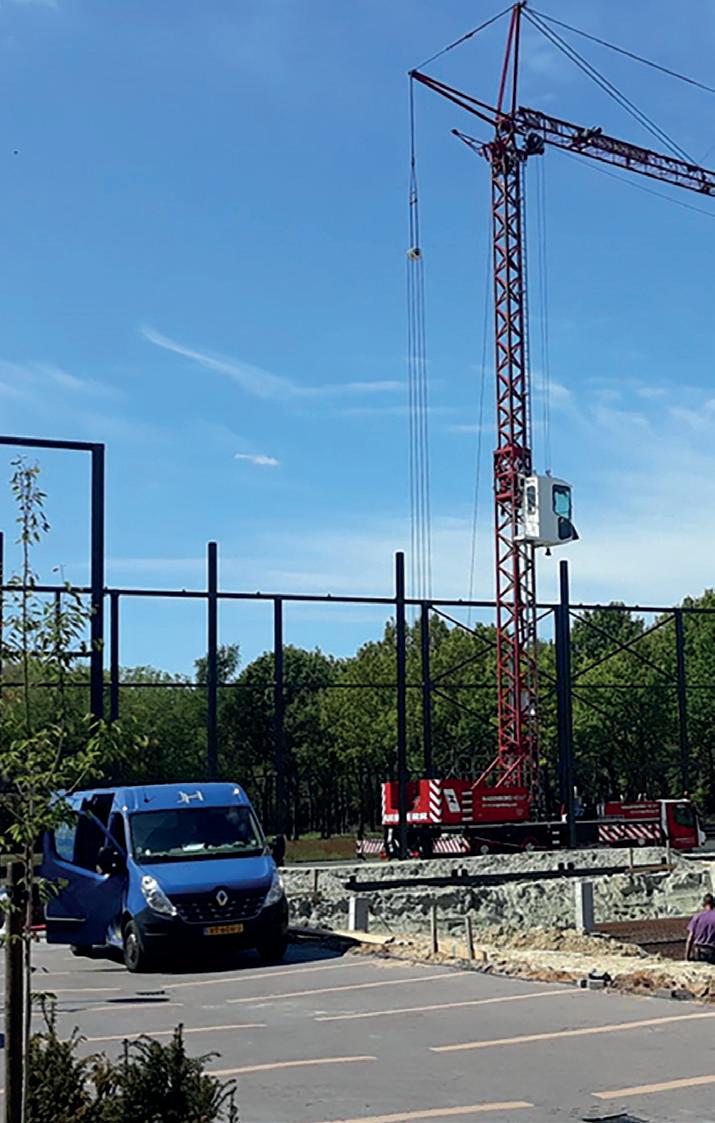
2016
Opening van het nieuwe kantoor in China.
The new office in China opened.
2018 - 2020
Aankoop en renovatie van de nieuwe locatie aan de Drenthweg (Ter Apel).
Purchase and renovation of the new location on Drenthweg (Ter Apel).
OPGERICHT/FOUNDED:

2019
Ofinext werd opgericht: een samenwerking tussen Lab Ofichem en Phytonext uit Wageningen. De technologie van Ofinext biedt de farmaceutische industrie full-spectrum cannabisextracten.
Ofinext was founded: a collaboration between Lab Ofichem and Phytonext from Wageningen. Ofinext’s technology offers the pharmaceutical industry full-spectrum cannabis extracts.
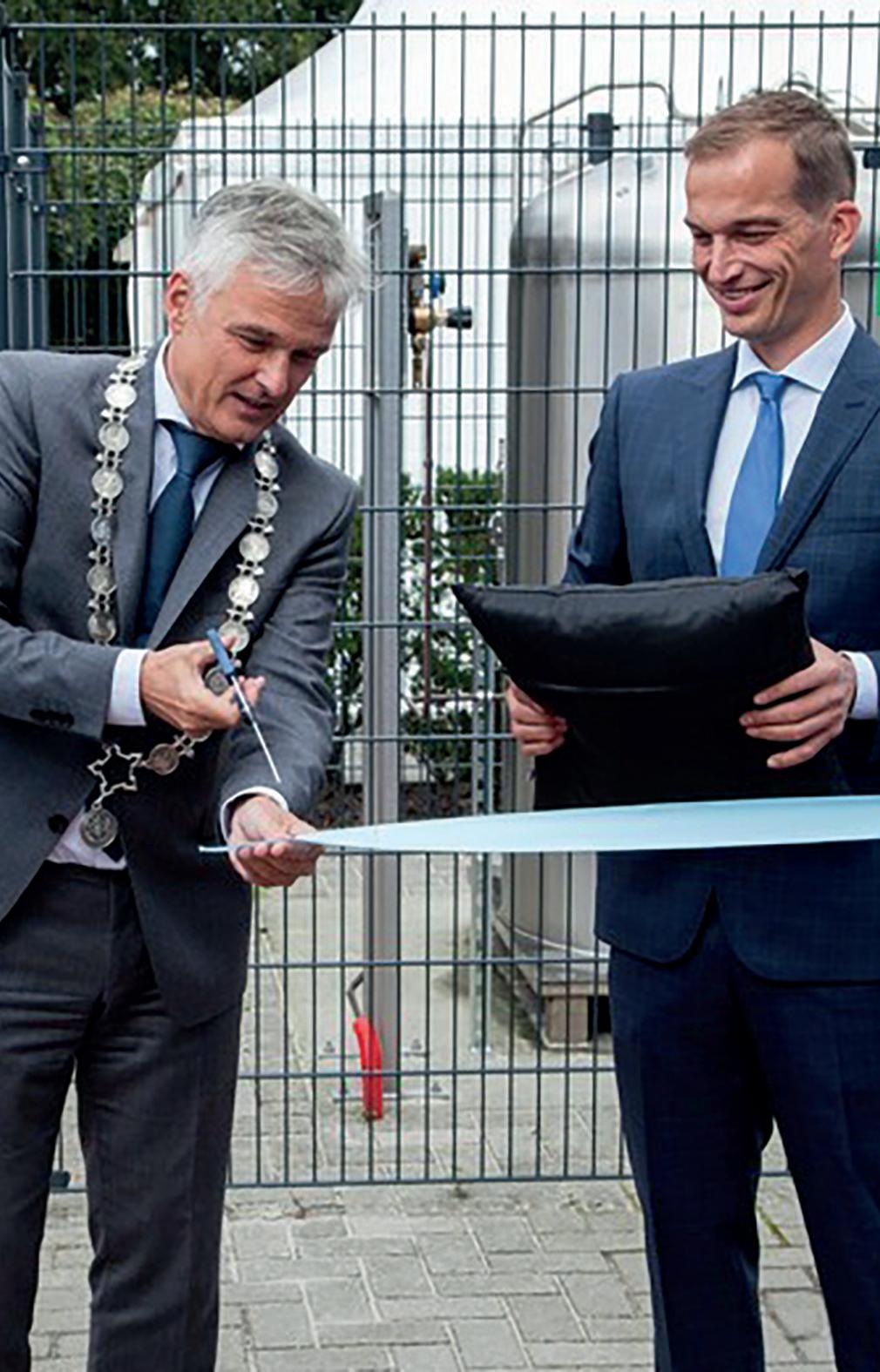
2021
Opening nieuwe R&D-laboratoria, laboratorium analyses voor derden en een pilot productieruimte.
Opening of new R&D laboratories, laboratory analyses for third parties and a pilot production space.
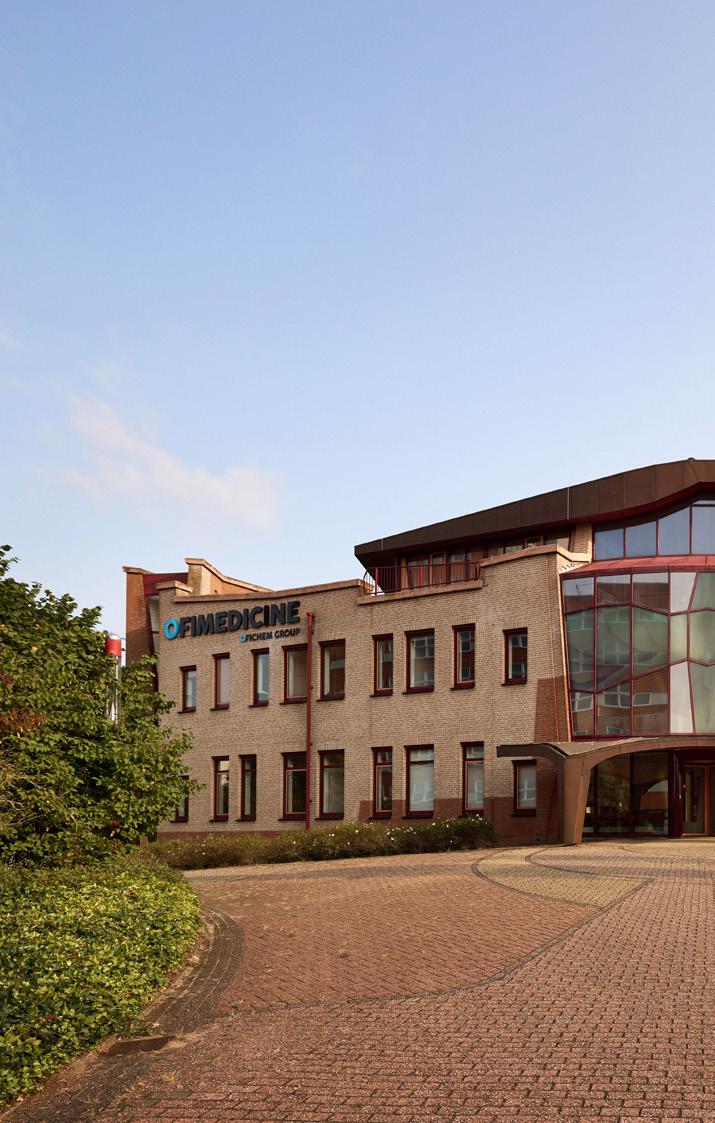
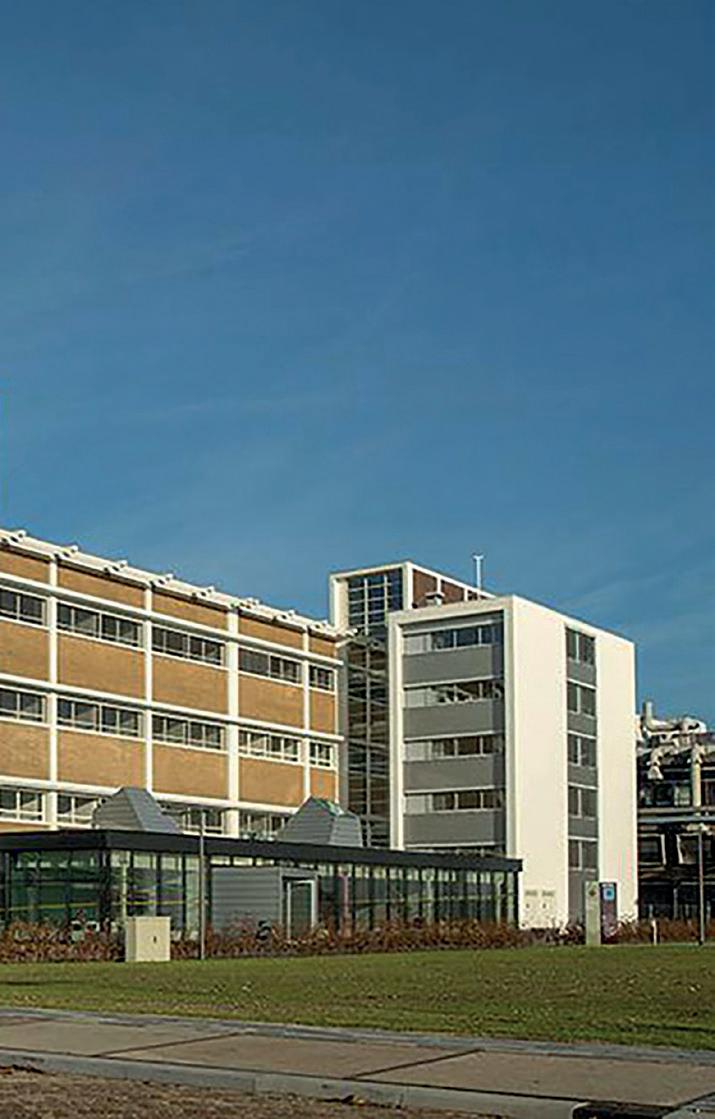
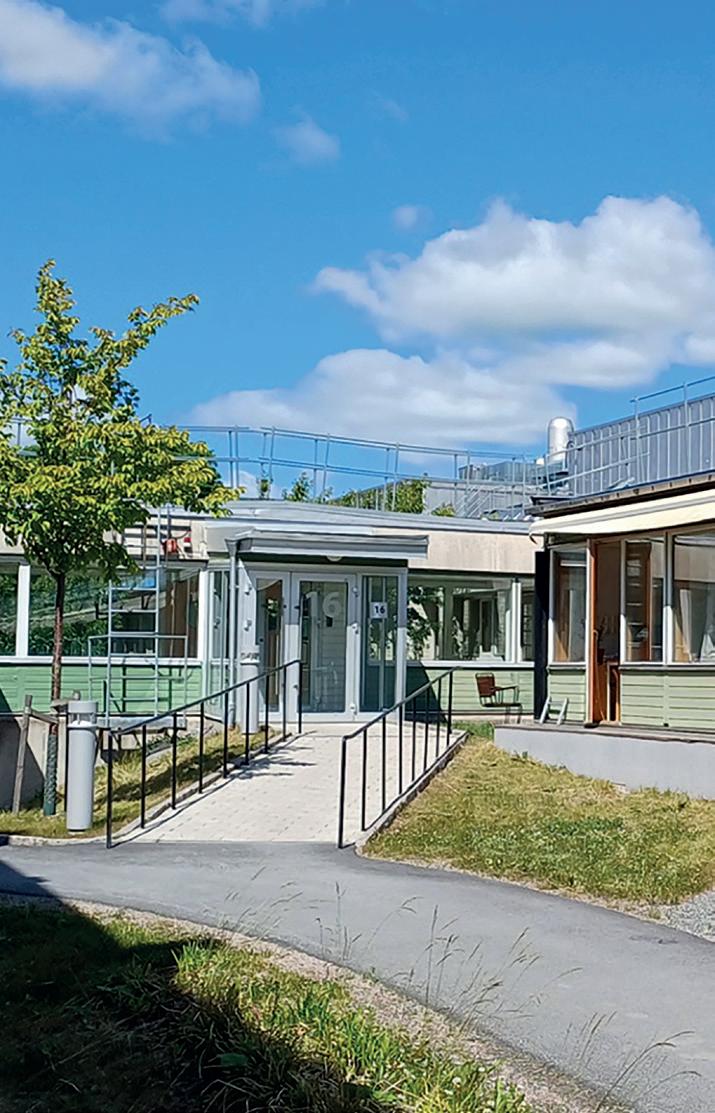
2023
Na het faillissement van InnoGenerics neemt Ofichem Group de medicijnfabriek in Leiden over. Dit is Ofimedicine geworden!
After the bankrupcy of InnoGenerics Ofichem Group takes over the medicine factory in Leiden. This became Ofimedicine!
2025 2025 2025
Overname van Avivia B.V. (Nijmegen, NL): een Contract Development Organisation (CDO) met uitgebreide expertise in o.a. formuleringsontwikkeling en analysemethodeontwikkeling.
Acquisition of Avivia B.V. (Nijmegen, NL): a Contract Development Organisation (CDO) with extensive expertise in, among other things, formulation and analytical method development.
Overname van OT Chemistry van Meribel Pharma Solutions (Uppsala, SE): een organisatie met ruime ervaring in onder meer medicinale chemie, route scouting en procesontwikkeling.
Acquisition of Meribel Pharma Solutions’ OT Chemistry (Uppsala, SE): an organisation with extensive experience in, among other things, medicinal chemistry, route scouting, and process development.
Ofichem viert haar 50e jubileum!
Ofichem celebrates its 50th anniversary!
WERVING VAN PERSONEEL: TOEN EN NU
RECRUITING STAFF: THEN AND NOW
In 1976, een jaar na de oprichting van Ofichem, ging Dr. Otto Oldenziel al op zoek naar een aantal medewerkers voor het toen nog jonge bedrijfje.
Ter vergelijking een bericht uit 2025. We gebruiken niet langer de krant, maar LinkedIn om nieuw personeel te werven.
In 1976, a year after Ofichem was founded, Dr. Otto Oldenziel began looking for employees for what was still a relatively new company.
For comparison, a message from 2025. We no longer use the newspaper, but LinkedIn to recruit new staff.
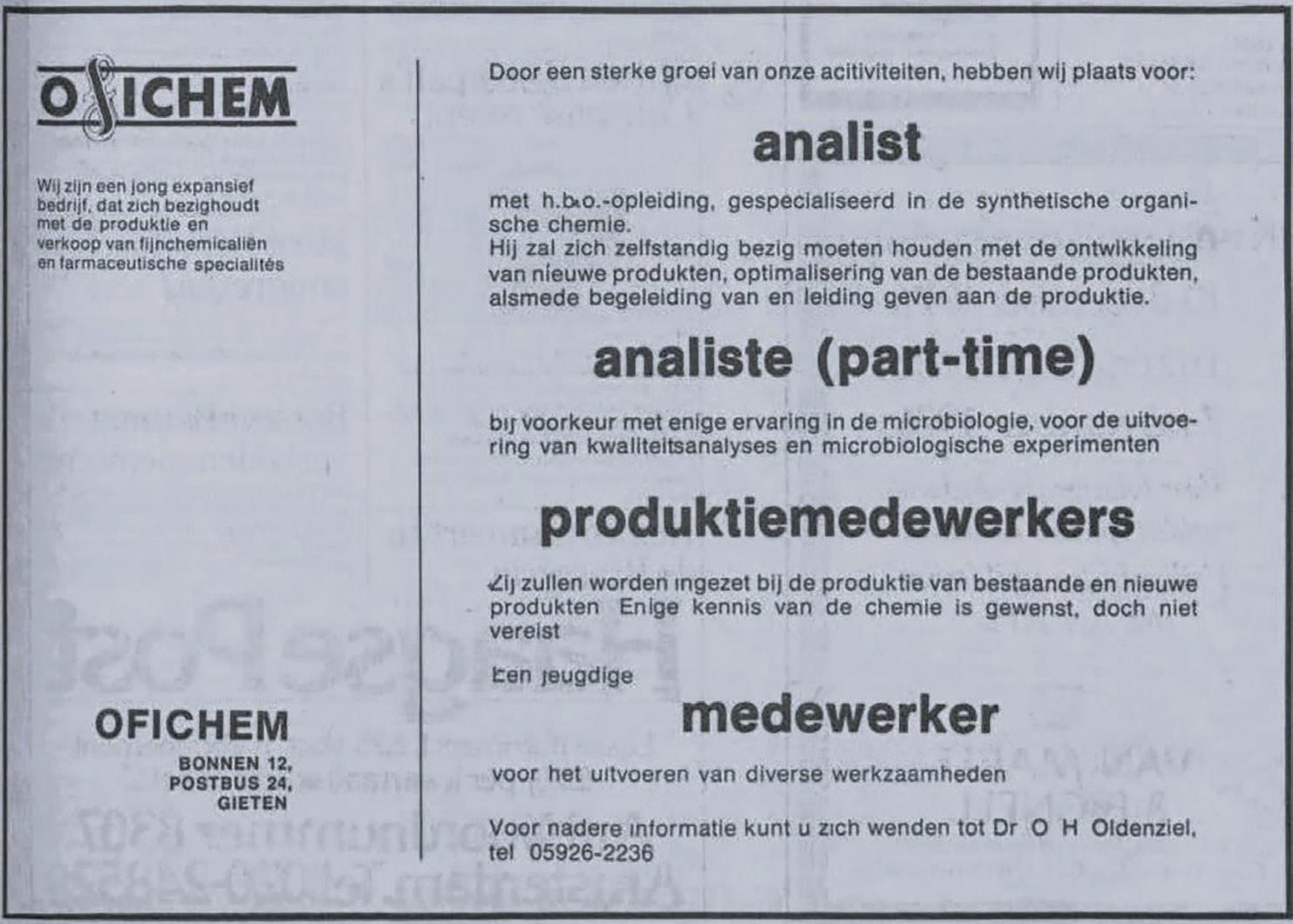
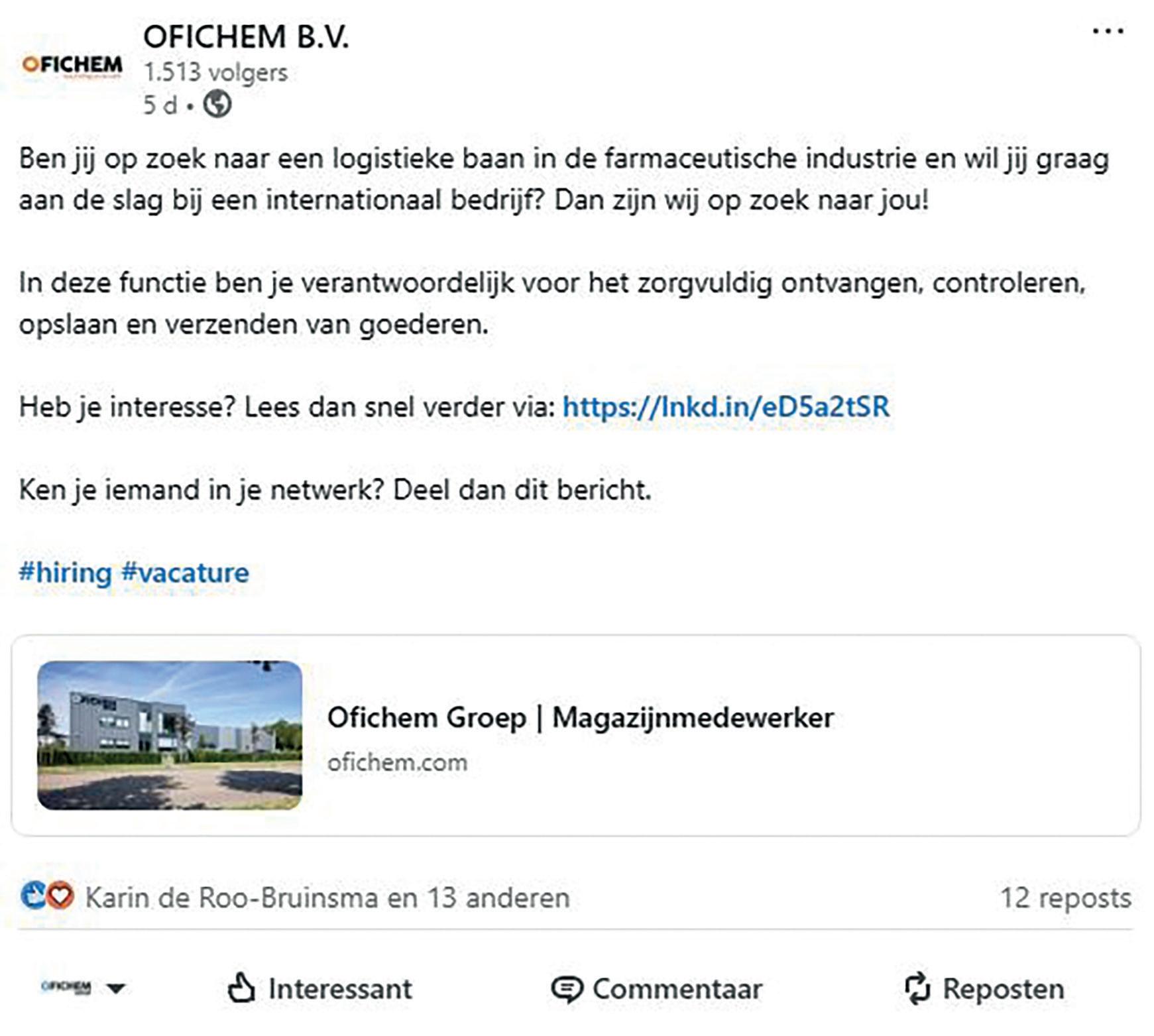
Nieuwsblad van het Noorden, 23 oktober 1976.
Ofichem B.V. via LinkedIn, 15 augustus 2025.
HOE OFICHEM BEGON
HOW OFICHEM STARTED
Samen met zijn vrouw Ina Oldenziel-Meursing richtte organisch chemicus Dr. Otto Oldenziel in 1975 Ofichem op. Otto was net gepromoveerd en wilde niet richting het Westen om daar in dienst van een bedrijf te werken. Hij wilde liever zelf iets opzetten en begon wat te rommelen in de garage. In een geïmproviseerd laboratorium deed hij allerlei proefjes en testjes. Hij noemde het Lab Ofichem en specialiseerde zich in chemische syntheses.
Otto kwam van een boerenfamilie en ging als oudste zoon studeren. Toen hij was afgestudeerd en gepromoveerd als organisch chemicus, wilde hij graag ondernemer worden.
In 1975 richtte hij samen met zijn vrouw, Ina, ‘Ofichem’ op, als afkorting van Oldenziel Fine Chemicals. ‘Fine chemicals’ was destijds de officiële naam voor wat nu API heet: Active Pharmaceutical Ingredient (het actieve bestanddeel in een medicijn).
Organic chemist Dr. Otto
Oldenziel, along with his wife, Ina Oldenziel-Meursing, founded Ofichem in 1975. Otto had just received his doctorate and did not want to go to the West to work for a company. He preferred to set something up himself and started tinkering in the garage. In a makeshift laboratory, he conducted all sorts of experiments and tests. He named it Lab Ofichem and specialized in chemical syntheses.
Otto came from a farming family and, as the eldest son, went to university. After graduating and receiving his doctorate as an organic chemist, he wanted to become an entrepreneur.
In 1975, he and his wife, Ina, founded ‘Ofichem’, short for Oldenziel Fine Chemicals. ‘Fine chemicals’ was the official name at the time for what is now called API: Active Pharmaceutical Ingredient (the active ingredient in medicine).
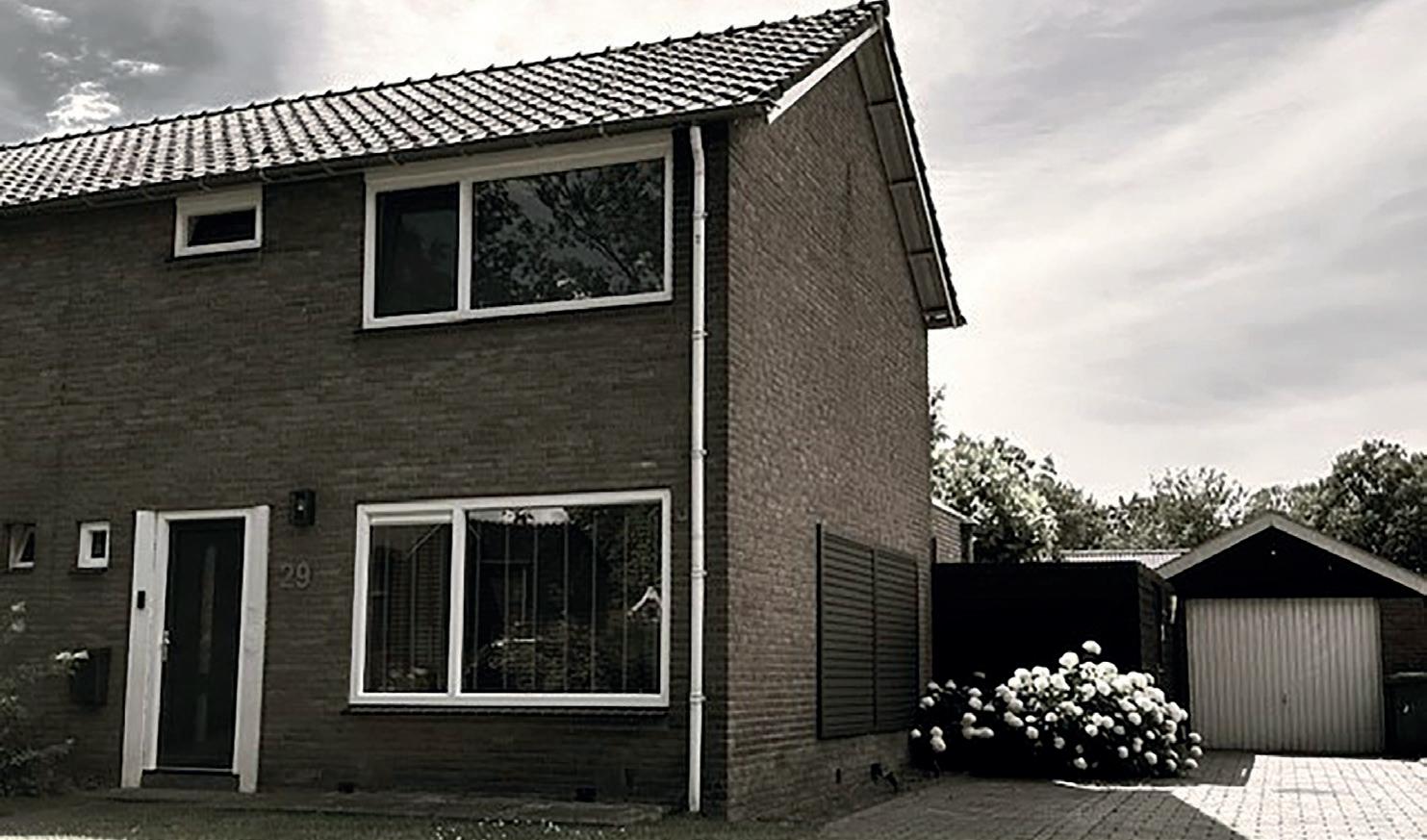
Doorzettingsvermogen
Via zijn netwerk kreeg de vraag of hij bepaalde farmaceutische stoffen kon maken. Dat kon hij zeker! Hij was een intelligente man met veel kennis en een enorm doorzettingsvermogen. Zo is hij begonnen om in opdracht chemische verbindingen te produceren en te testen.
Het echtpaar wist van aanpakken en werkte hard. Er werden visitekaartjes en briefpapier gedrukt en thuis typte Ina aan tafel acquisitiebrieven op de Olympia typmachine. Door hun aanpak kregen ze steeds meer klanten, waaronder Dopharma, en werd er geld verdiend.
Perseverance
Through his network, Otto was asked if he could produce certain pharmaceutical substances. He certainly could! He was an intelligent man with extensive knowledge and tremendous perseverance. That is how he started producing and testing chemical compounds under contract.
The couple was a hands-on team and worked hard. They had their business cards and stationery printed, and at home, Ina would type acquisition letters at the table on the Olympia typewriter. Their approach led to a growing number of clients, including Dopharma, and they started making money.
De garage (rechts) waar Ofichem begon / The garage where Ofichem started (right).
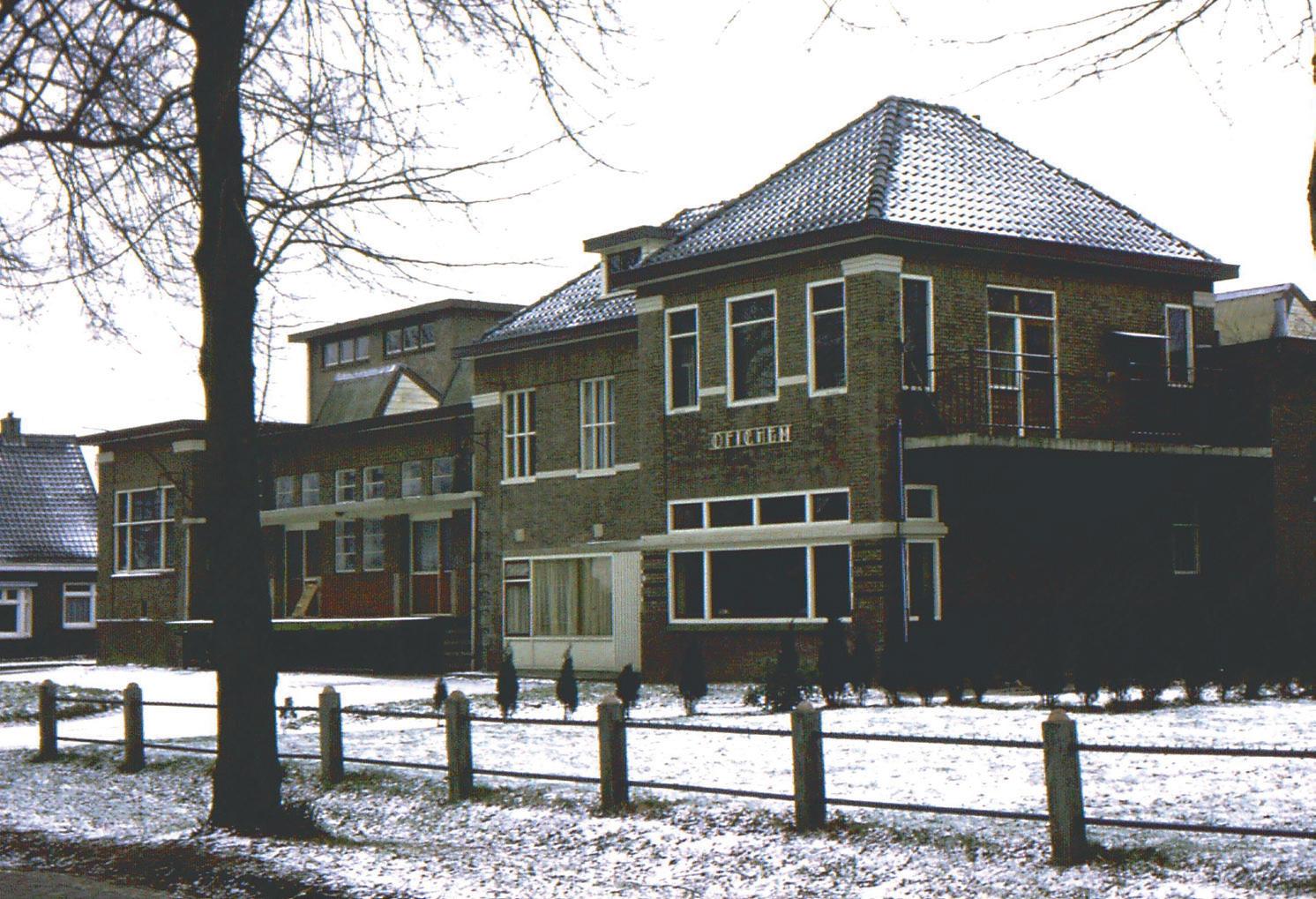
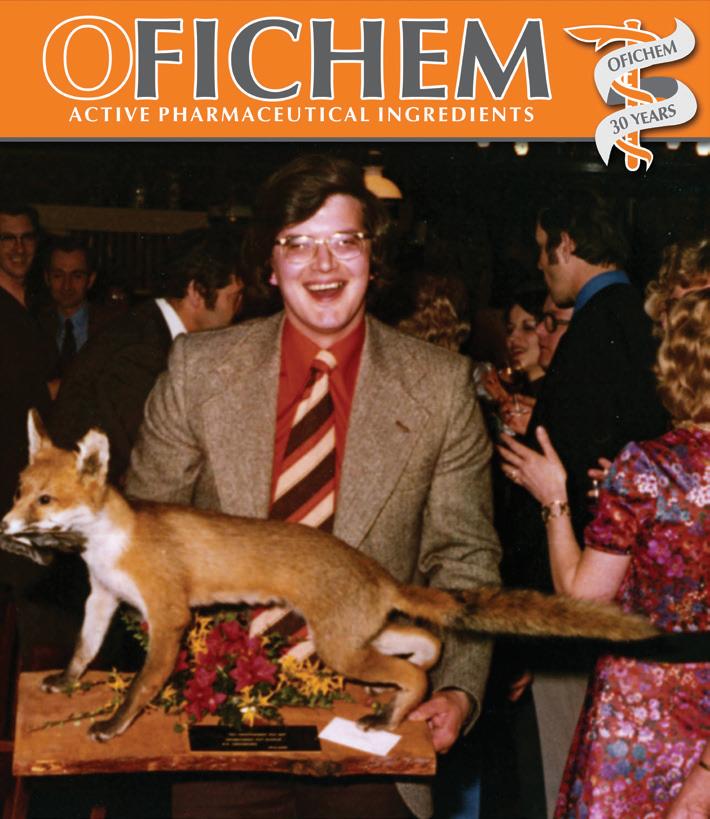
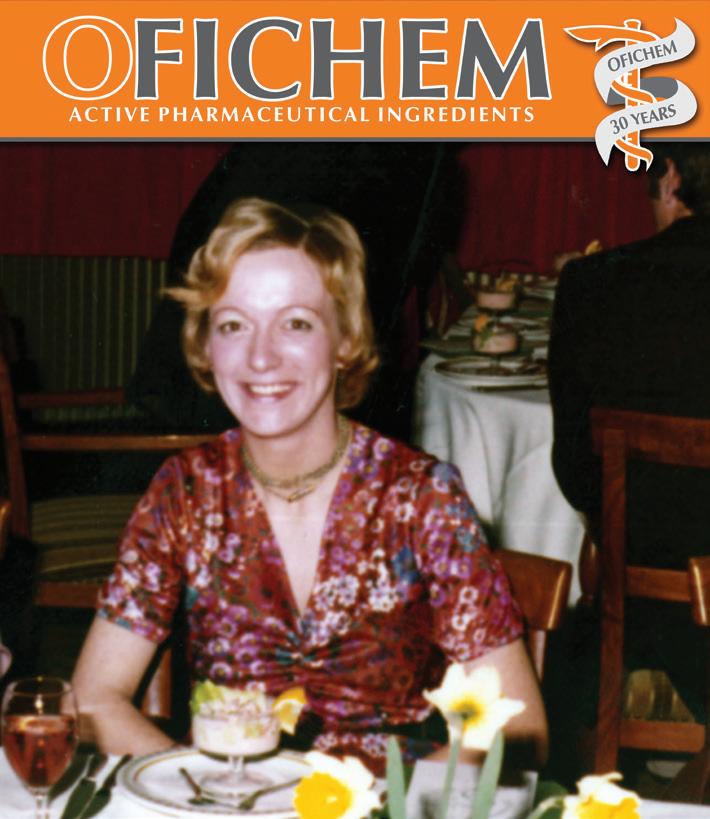
Uitbreiding
Naarmate er meer opdrachten binnenkwamen, paste het bedrijfje niet langer in de garage. Er werd ruimte gevonden in de melkfabriek in Gieten, die te huur stond. De woning boven de fabriek en de naastgelegen loods werden door het echtpaar verhuurd.
Overdag deed Ina de loonadministratie, typte ze etiketten, bracht ze medicijnen weg, enzovoort. ’s Avonds reisde ze door heel Drenthe om voorlichting te geven over voeding. Daar kon het echtpaar van leven. Alle inkomsten van het lab werden meteen weer geïnvesteerd in het bedrijf. In 1977 kochten Otto en Ina de hele melkfabriek op.
Brand
Tot twee keer toe werd Ofichem getroffen door brand: in 1976 en 1977. Er ontstond kritiek vanuit de buurt. Omwonenden waren geschrokken van de branden en vonden het maar gevaarlijk dat er een chemisch bedrijf was gevestigd in het dorp. Farmacie klonk op zich nog wel goed, maar chemie niet.
Ondertussen begon Ofichem steeds beter te draaien, mede dankzij inkomsten uit de verhuur van woningen, garages en een loods. De melkfabriek was feitelijk al een soort bedrijvenverzamelpand avant la lettre geworden.
Expansion
As more orders came in, the small business no longer fit in the garage. Space was found in the dairy factory in Gieten, which was available for rent. The couple rented out the house above the factory and the adjacent warehouse.
During the day, Ina managed payroll, typed labels, delivered medications, and so on. In the evenings, she travelled throughout Drenthe to provide nutritional information. This provided the couple with a living. All income from the lab was immediately reinvested in the business. In 1977, Otto and Ina bought the entire dairy factory.
Fire
Ofichem was hit by fire twice: in 1976 and 1977. Neighbourhood criticism arose. Residents were shocked by the fires and found it dangerous that a chemical company was located in the village. Pharmaceuticals sounded good, but chemicals did not.
Meanwhile, Ofichem’s performance improved, thanks in part to income from renting out houses, garages, and a warehouse. The dairy factory had effectively become a kind of business complex before its time.
De voormalige melkfabriek in Gieten / The former dairy factory in Gieten.
Otto en Ina in de beginjaren van Ofichem / Otto and Ina in the early years of Ofichem.
De voorkant van de fabriek werd verbouwd en Ofichem begon met parallelle import en de in- en verkoop van allerlei medicijnen uit onder andere Frankijk en Italië.
Er kwamen ook een paar nieuwe BV’s bij. Ofichem leverde medicijnen aan ziekenhuizen, die destijds nog gewoon via de PTT en Van Gend & Loos werden verstuurd.
Verhuizen naar Ter Apel
Toen de werkzaamheden en activiteiten steeds verder groeiden, begon de bedrijfsruimte in de melkfabriek te knellen. Tegelijkertijd groeide ook de onvrede in het centrum van Gieten.
De gemeente wilde graag nieuwe woningen bouwen op het terrein van de oude melkfabriek en bood Ofichem een verhuispremie. Tegelijkertijd lag er een welkomst-premie klaar in Ter Apel. Die gemeente wilde graag meer werkgelegenheid binnen haar gemeentegrenzen. In 1986 was de verhuizing naar Ter Apel een feit.
Hogere eisen en strenge regels
Kort na de verhuizing brak een zware tijd aan voor Ofichem: er werden steeds meer en hogere eisen gesteld aan farmaceutische bedrijven in Nederland. Dat kwam door de introductie van de ‘Good Manufacturing Practices’ (GMP) in Europa en Amerika.
The front of the factory was renovated, and Ofichem began parallel importing, buying and selling all kinds of medicines from countries such as France and Italy.
A few new companies were also added. Ofichem supplied medicines to hospitals, which at the time were still shipped via the PTT and Van Gend & Loos.
Relocating to Ter Apel
As operations and activities continued to grow, space in the dairy factory became tight. At the same time, discontent grew in the centre of Gieten.
The municipality wanted to build new homes on the site of the old dairy factory and offered Ofichem a relocation grant. At the same time, a welcome grant was available in Ter Apel. The municipality there was eager to create more employment opportunities within its borders. In 1986, the move to Ter Apel became a reality.
Higher Requirements and Strict Regulations
Shortly after the move, Ofichem faced challenging times: increasingly stringent requirements were imposed on pharmaceutical companies in the Netherlands. This was due to the introduction of Good Manufacturing Practices (GMP) in Europe and the US.
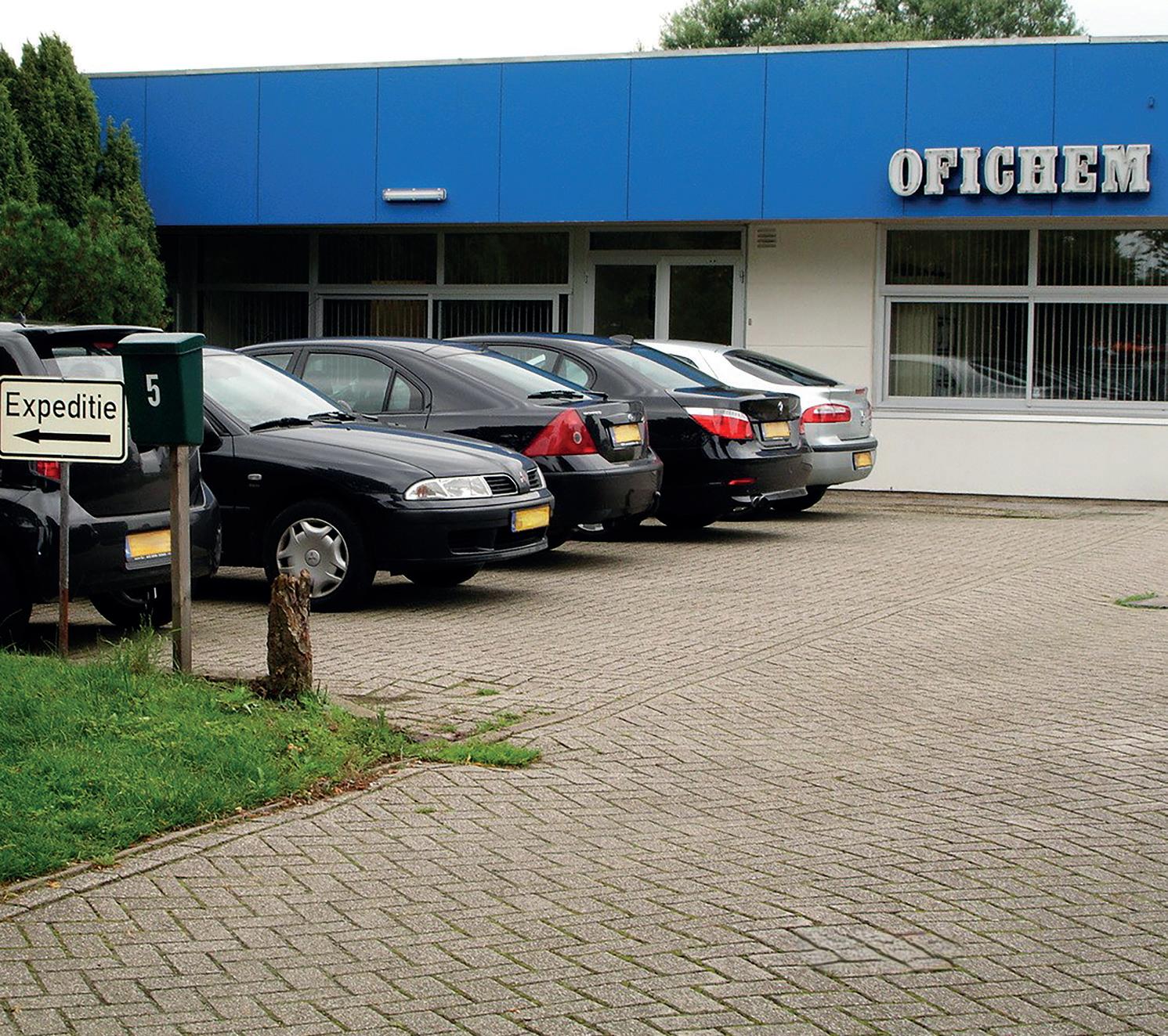
In
Als gevolg daarvan kwamen er steeds meer medicijnen uit China, want daar golden die strenge regels niet en kon men dus veel sneller en goedkoper produceren. Daarna werden een paar nieuwe Business Units opgericht, vooral voor import en verkoop van medicijnen en grondstoffen.
As a result, more and more medicines came from China, where these strict regulations did not apply, allowing for much faster and cheaper production. Subsequently, several new Business Units were established, primarily for the import and sale of medicines and raw materials.
In 1986 verhuisde Ofichem naar de Heembadweg in Ter Apel.
1986, Ofichem moved to the Heembadweg in Ter Apel.
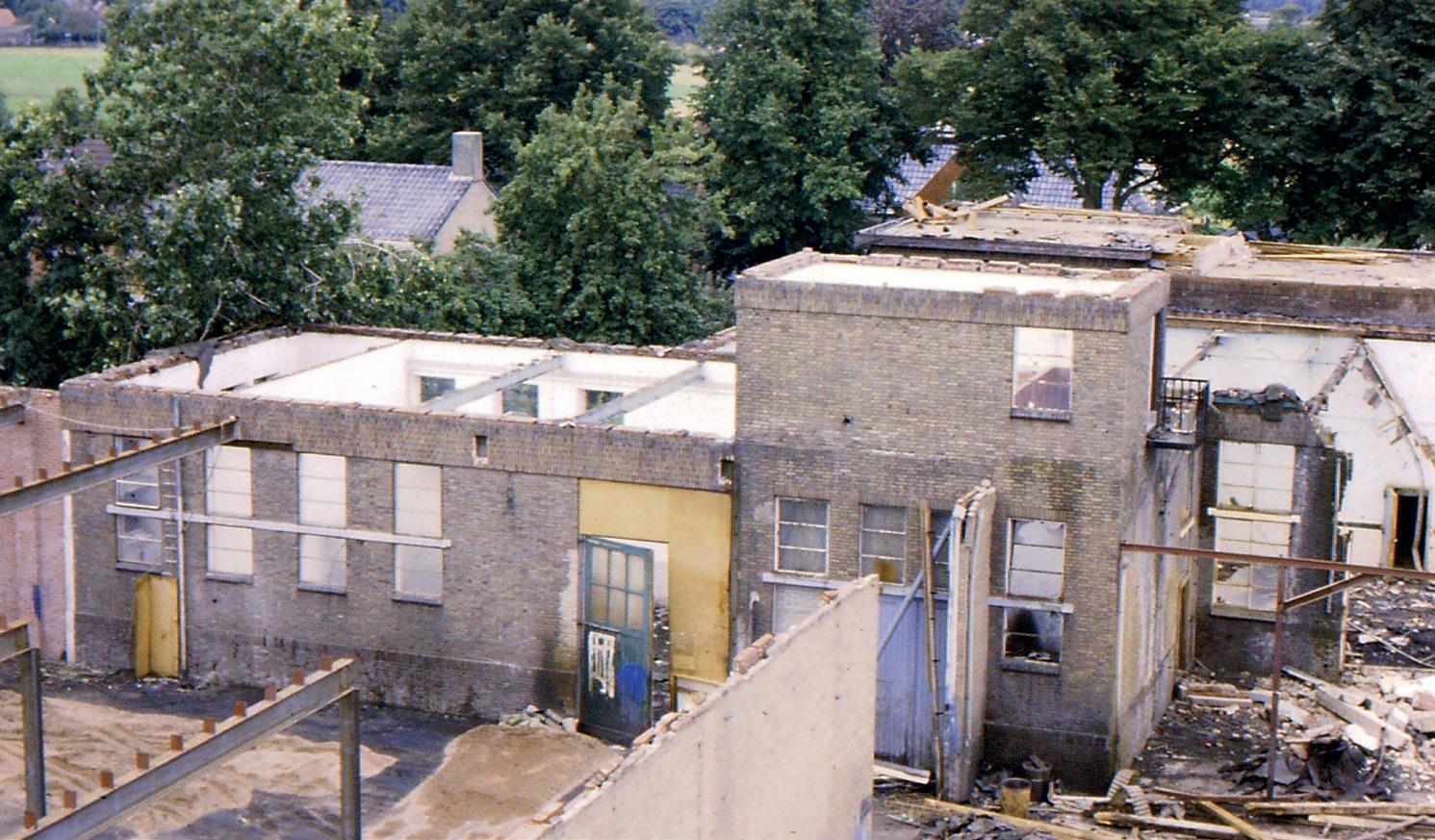
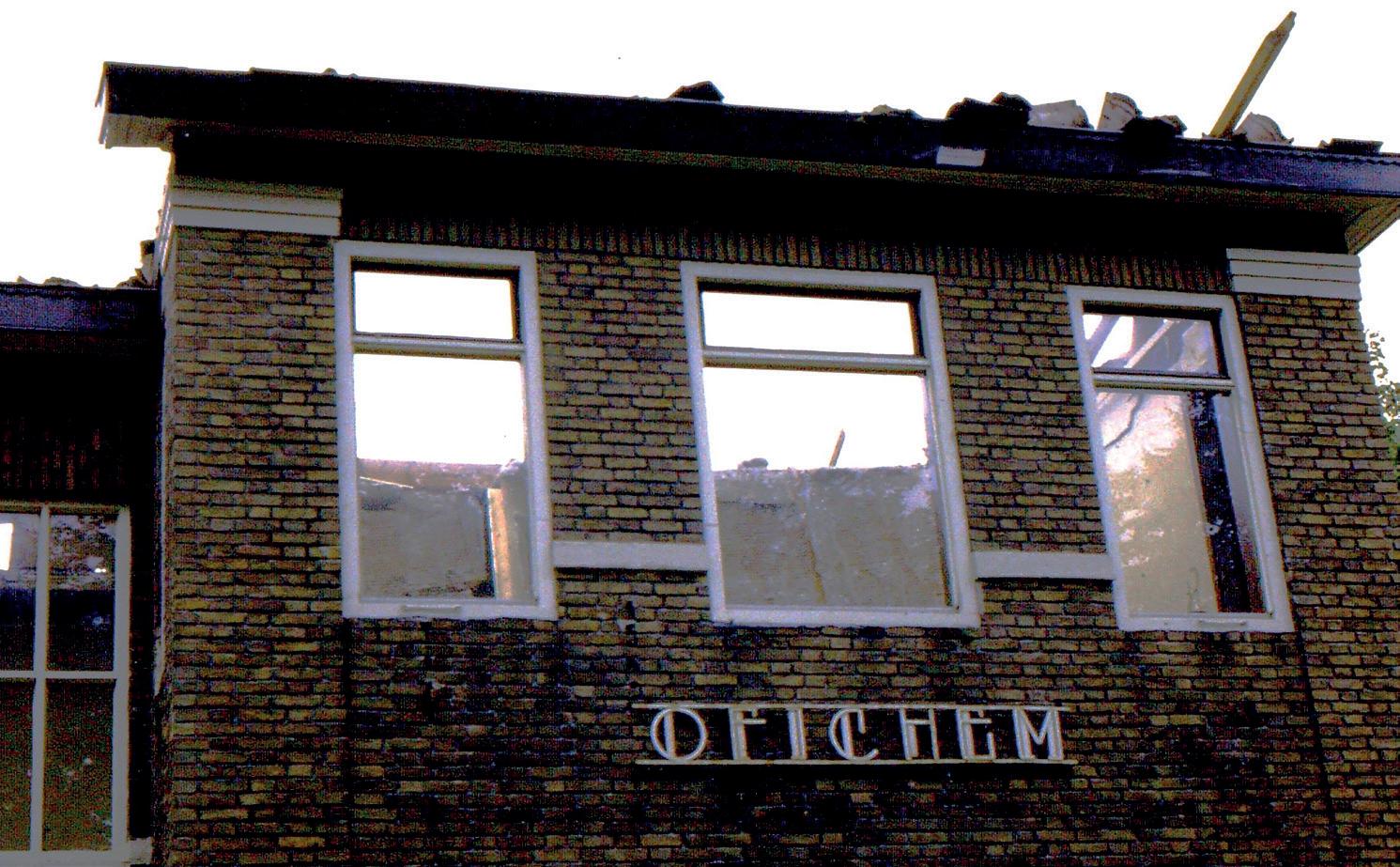
Managementopvolging
In september 2006 vroeg Otto of zijn zoon Weite een paar dagen per week in het bedrijf wilde werken. Om ervaring op te doen werkte hij op allerlei afdelingen. Ook hielp Weite met het definitief implementeren van de GMP.
In datzelfde jaar kreeg Otto problemen met zijn gezondheid en op 3 december overleed hij plotseling. Als oudste zoon werd Weite voor de leeuwen gegooid. Samen met zijn moeder zette hij het bedrijf voort om het later volledig over te nemen.
Management Succession
In September 2006, Otto asked his son Weite to work at the company a few days a week. To gain experience, he worked in various departments. Weite also helped with the final implementation of GMP.
That same year, Otto’s health deteriorated, and he died suddenly on December 3rd. As the eldest son, Weite was thrown to the wolves.
Together with his mother, he continued the company and later took it over completely.
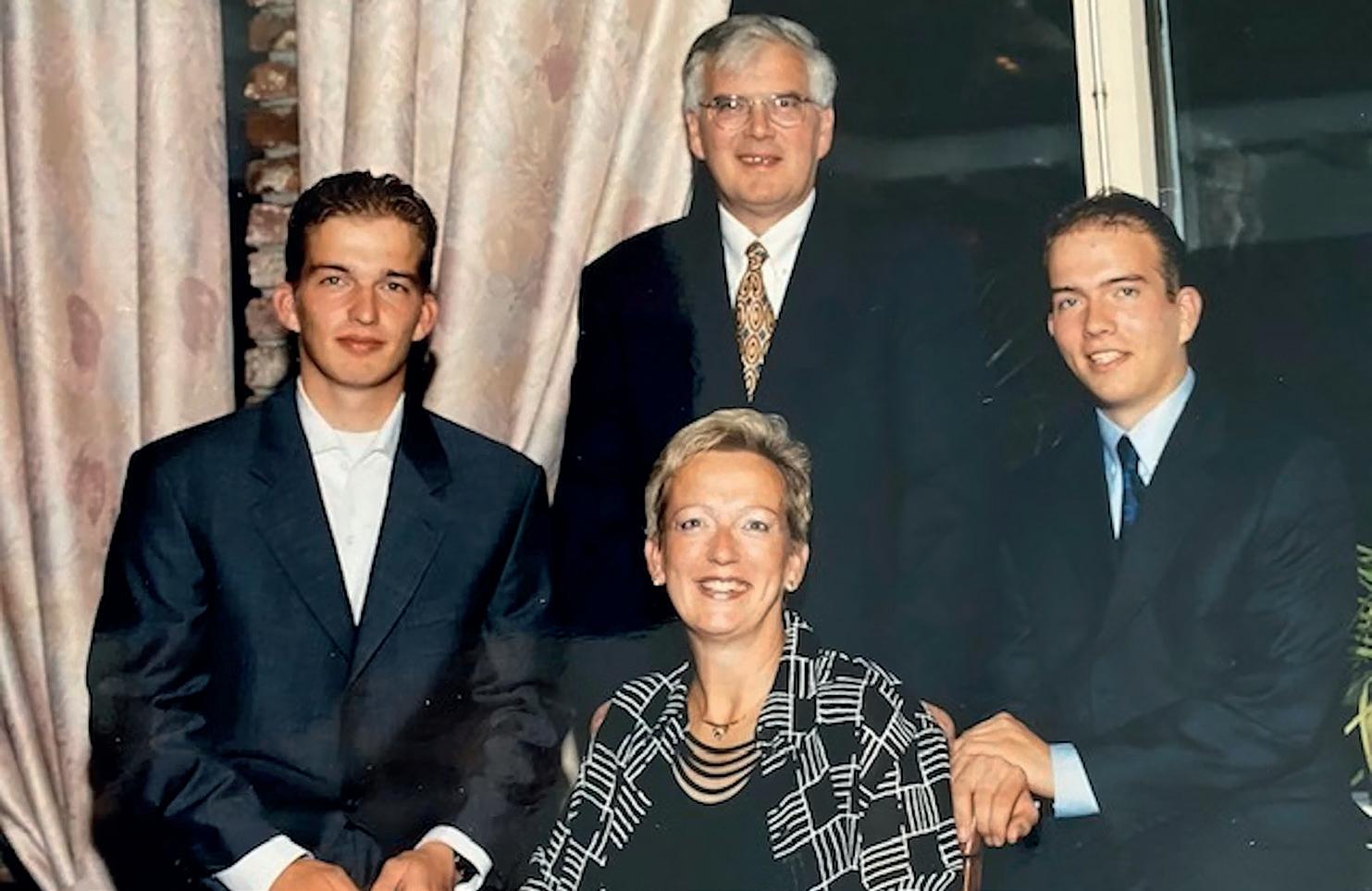
De voorgevel van de oude melkfabriek, voordat ook deze werd gesloopt. The facade of the old dairy factory, before it was also demolished.
De oude melkfabriek moest wijken voor nieuwbouwwoningen in Gieten. The old dairy factory had to make way for new housing in Gieten.
De familie Oldenziel: Weite, Otto, Job en Ina / The Oldenziel family.
GOEDE TIJDEN EN SLECHTE TIJDEN
GOOD TIMES AND BAD TIMES
Vanaf de oprichting in de jaren ’70 tot eind jaren ’90 kende Ofichem een stabiele bedrijfsvoering. Het bedrijf telde zo’n 12 medewerkers die aan een vast productassortiment werkten dat naar tal van klanten werd geëxporteerd. Aan het eind van de jaren ’90 deden zich wereldwijd twee ontwikkelingen voor die voor Ofichem een zware periode inluidden.
Allereerst oefenden westerse overheden druk uit op de farmaceutische sector om goedkoper te produceren. Dit had te maken met de voorspelbare toename van zorguitgaven, als gevolg van de ouder wordende babyboomgeneratie. Daarnaast zette China, na het Mao-tijdperk, geleidelijk haar economie open en werd het lid van de Wereldhandelsorganisatie (WTO).
GMP
Om hun producten goedkoper te kunnen aanbieden, gingen westerse bedrijven nu hun inkopen in China doen. Bovendien werd begin 2000 ‘Good Manufacturing Practice’ (GMP) geïntroduceerd voor API-producten.
Met deze strenge richtlijnen wilde de overheid de kwaliteit van medicijnen beter garanderen.
Concurrentie vanuit China
Om aan die richtlijnen te kunnen voldoen, moesten bedrijven flink investeren. Echter, de APIproductie-industrie had het juist al extra moeilijk door de concurrentie vanuit China. Daar nam men het destijds nog niet zo nauw met diezelfde GMP-richtlijnen.
From its founding in the 1970s until the late 1990s, Ofichem enjoyed stable business operations. The company employed approximately 12 people, working on a fixed product range that was exported to numerous customers. At the end of the 1990s, two developments occurred worldwide that heralded a difficult period for Ofichem.
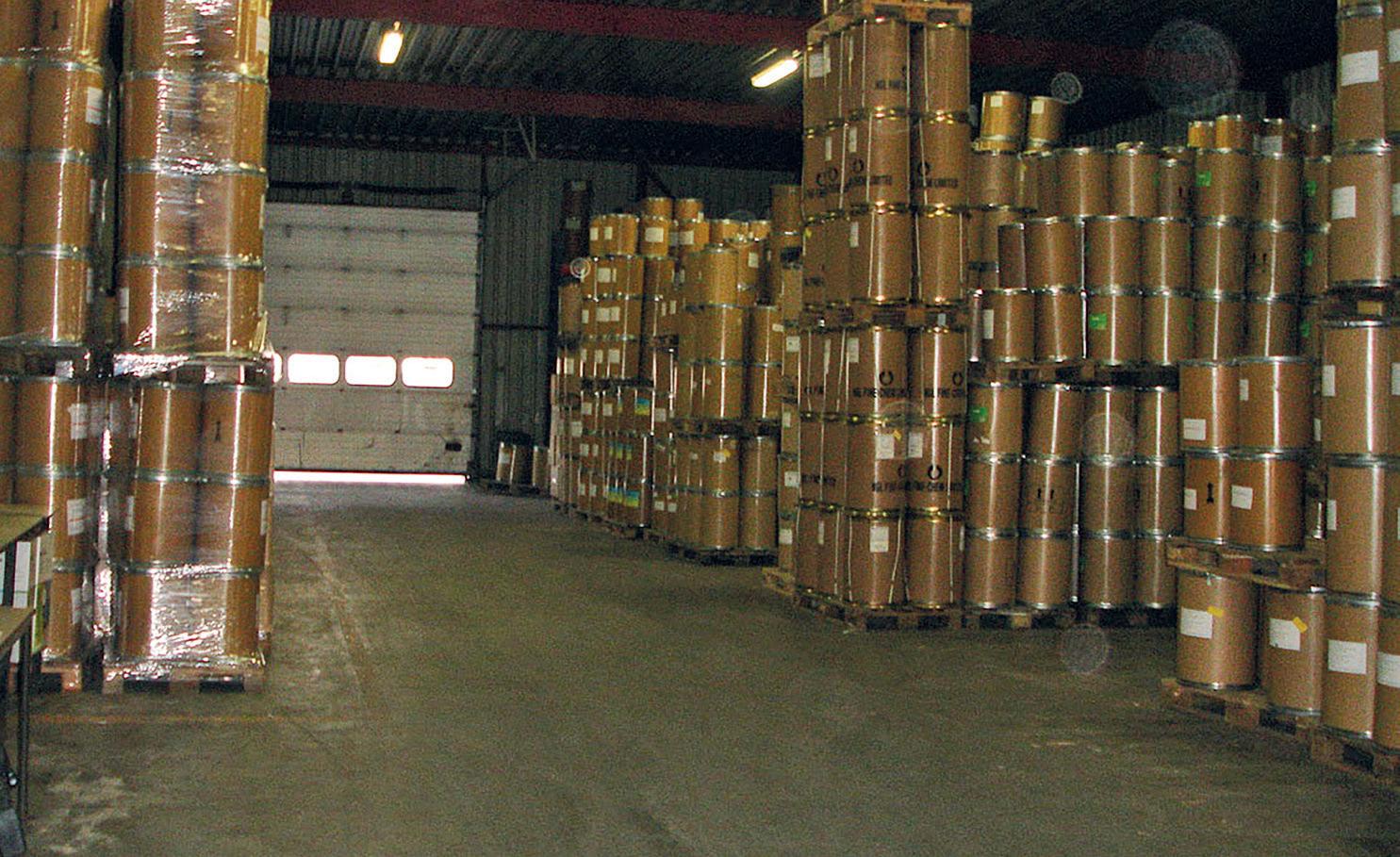
First, Western governments pressured the pharmaceutical sector to produce more cheaply. This was related to the predictable increase in healthcare expenditures, resulting from the aging baby boom generation. Furthermore, after the Mao era, China gradually opened its economy up and became a member of the World Trade Organization (WTO).
GMP
To offer their products more cheaply, Western companies began sourcing from China. Moreover, in early 2000, ‘Good Manufacturing Practice’ (GMP) was introduced for API products. With these strict guidelines, the government wanted to better guarantee the quality of medicines.
Competition from China
To meet these guidelines, companies had to invest heavily. However, the API production industry was already facing additional challenges due to competition from China. At the time, those same GMP guidelines were not yet being strictly adhered to there.
De oude loods / The old warehouse.
Bestaansrecht
In die periode is in een relatieve korte tijd, zo’n 10 jaar, 80% van de gehele wereldproductie van API’s naar China overgegaan en moesten veel bedrijven in Europa en Amerika hun deuren sluiten. Ook Ofichem kreeg hier in alle hevigheid mee te maken. Feitelijk had Ofichem in haar toenmalige vorm geen bestaansrecht meer.
DAN STOP IK ERMEE EN ZET IK DE SHOVEL ERTEGEN
Deals en doorzetten
Het waren dus moeilijke jaren voor Ofichem. Otto Oldenziel wilde de productie zo lang mogelijk voortzetten. Maar als dat niet meer haalbaar was, zou hij ermee stoppen. Zijn woorden waren letterlijk: “Dan stop ik ermee en zet ik de shovel ertegen.” Hij wist dat de verouderde fabriek in Ter Apel qua vastgoed nauwelijks nog waarde had.
Eigen handelsonderneming
Achteraf gezien gebeurde er in diezelfde periode ook iets heel positiefs: een handelsonderneming in API’s had belangstelling in Ofichem en wilde het wel overnemen.
De deal ketste echter al snel af waarop Ofichem besloot een eigen handelsonderneming op te richten. Deze dochteronderneming deed waar het productiebedrijf altijd tegen had gevochten: API’s uit China en India importeren om ze vervolgens weer wereldwijd te verspreiden.
Ervaren commerciële mensen, waaronder Arjan van Ravenhorst, werden aangetrokken om in Ter Apel te komen werken. De oprichting van de handelsorganisatie vond medio 2004 plaats en heeft veel goeds betekend voor het voortbestaan van Ofichem.
Reason to Exist
During that period, in a relatively short time, about 10 years, 80% of the entire global API production shifted to China, and many companies in Europe and America were forced to close their doors. Ofichem was also hit hard by this. In fact, Ofichem, in its then-current form, no longer had any reason to exist.
THEN I WILL QUIT AND PUT THE SHOVEL TO IT
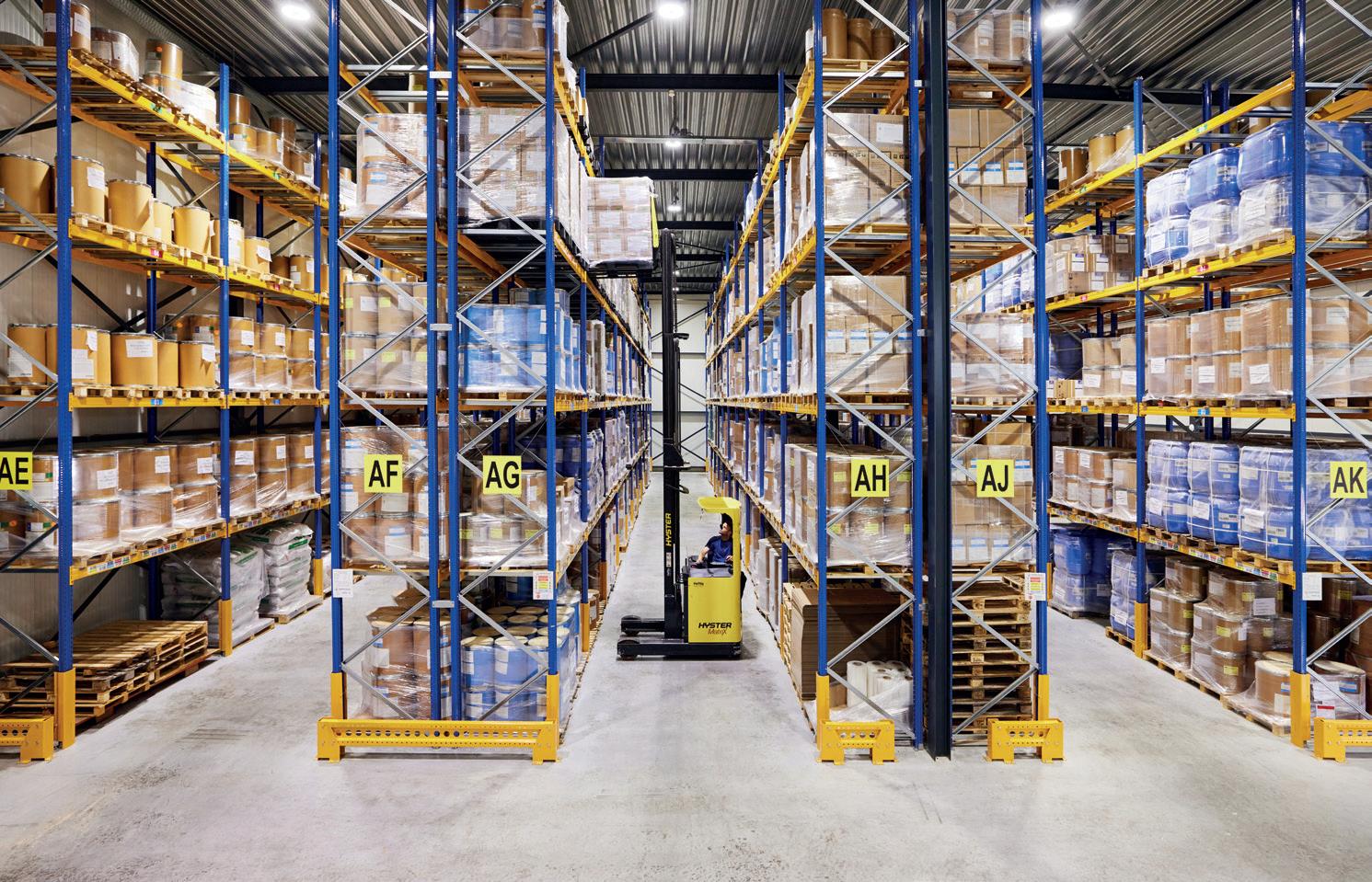
Deals and Perseverance
These were difficult years for Ofichem. Otto Oldenziel wanted to continue production as long as possible. But if that was no longer feasible, he would close down. His words were literally: “Then I will shut down and put the shovel to it.” He knew that the outdated factory in Ter Apel had virtually no real estate value.
Own Trading Company
In retrospect, something very positive happened during that same period: an API trading company expressed interest in Ofichem and wanted to acquire it. However, the deal quickly fell through, and Ofichem decided to establish its own trading company. This subsidiary did what the production company had always resisted: importing APIs from China and India and then distributing them worldwide.
Experienced business people, including Arjan van Ravenhorst, were brought in to work in Ter Apel. The trading organization was established in mid-2004 and has been very beneficial for the continued existence of Ofichem.
De nieuwe loods - een stuk georganiseerder! / The new, and more organised, warehouse!
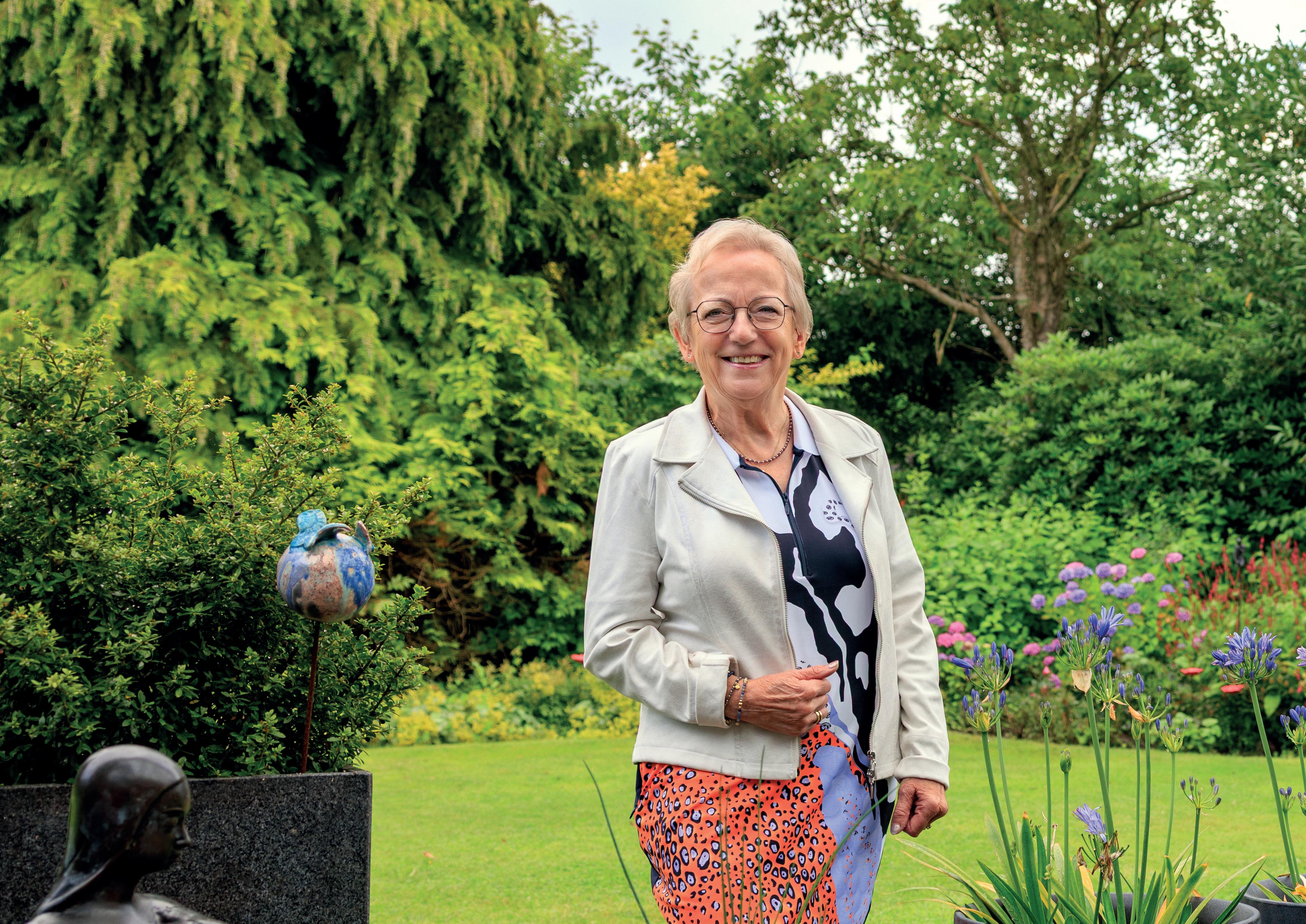
Ina Oldenziel-Meursing:
“WE HEBBEN KEIHARD GEWERKT, MAAR OOK HEEL VEEL PLEZIER GEHAD SAMEN”
“WE WORKED VERY HARD, BUT ALSO HAD A LOT OF FUN TOGETHER”
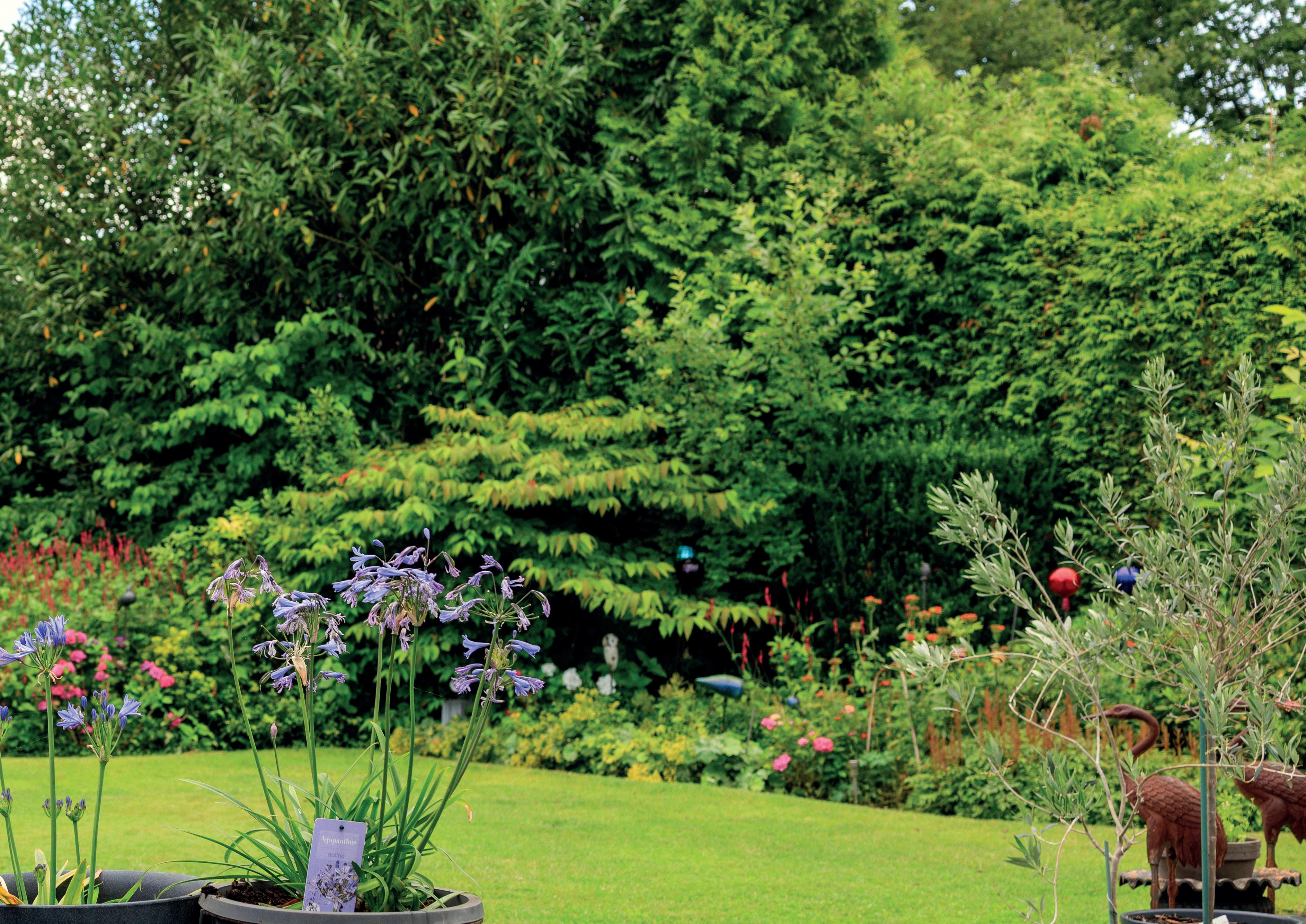
Ze kwamen allebei van de boerderij: Dr. Otto-Hendrik Oldenziel (1947) uit Kropswolde (Groningen) en Hillechiena Harmina Meursing (1951) uit Anderen (Drenthe). Ze kozen allebei voor een studie in plaats van het boerenleven: Otto werd chemicus en ondernemer, Ina werd lerares en leidinggevende in de thuiszorg. Uiteindelijk kozen ze voor elkaar. Nu blikt Ina Oldenziel-Meursing terug op 50 bewogen en avontuurlijke jaren.
“We zijn op 29 juni 1973 getrouwd”, vertelt Ina, terwijl ze aan tafel zit in haar tuin in Gieten. “Otto was toen net bezig met zijn promotie en ik was lerares voedingsleer. We hadden nog een heel vrij leven. Nadat Otto was gepromoveerd wilde hij liever zelf iets opzetten en begon wat te rommelen in de garage, naast onze twee-ondereen-kap woning in Gieten. Hij deed daar allerlei proefjes en testjes. Dit was het prille begin van Ofichem.”
Van huren naar kopen Het jonge stel werkte hard, verzorgde hun eigen marketing en kreeg steeds meer klanten. In 1976 huurden ze een passende productieruimte: de leegstaande melkfabriek in Gieten.
Alles leek voorspoedig te gaan, maar in april 1976 brak er brand uit. Omdat er allerlei proeven werden uitgevoerd, onder andere met methanol, was een vonkje van een kapot verlengsnoer genoeg om brand te veroorzaken.
“We hebben het pand samen met de hele familie zelf schoongemaakt. Overal zat roet op. Mijn moeder en schoonmoeder hielpen ons gelukkig mee. Toen we weer opengingen, ontstond er kritiek vanuit de buurt. Omwonenden waren geschrokken van de brand en vonden het maar gevaarlijk dat er een bedrijf met chemicaliën in het dorp was gevestigd. Er stond af en toe ook een stuk in de krant over ons.”
They both came from farms: Dr. Otto-Hendrik Oldenziel (born 1947) from Kropswolde (Groningen) and Hillechiena Harmina Meursing (born 1951) from Anderen (Drenthe). They both chose to study instead of farm life: Otto became a chemist and entrepreneur, and Ina became a teacher and manager in home care. Ultimately, they chose each other. Now, Ina Oldenziel-Meursing looks back on 50 eventful and adventurous years.
“We got married on June 29, 1973,” Ina says, sitting at a table in her garden in Gieten. “Otto was just getting his doctorate, and I was a nutrition teacher. We still had a very free life. After Otto got his doctorate, he wanted to start something himself and started messing around in the garage next to our semi-detached house in Gieten. He did all sorts of experiments and tests there. This was the very beginning of Ofichem.”
From renting to buying
The young couple worked hard, handled their own marketing, and attracted more and more customers. In 1976, they rented a suitable production space: the vacant dairy factory in Gieten.
Everything seemed to be going well, but in April 1976, a fire broke out. Because various tests were being conducted, including ones with methanol, a spark from a broken extension cord was enough to cause a fire.
“We cleaned the building ourselves, along with the whole family. There was soot everywhere. Fortunately, my mother and mother-in-law helped us. When we reopened, we received criticism from the neighbourhood. Residents were shocked by the fire and found it dangerous that a chemical company was located in the village. Every now and then, there were articles about us in the newspaper.”
Verhuizen en bevallen
In de privésfeer veranderde van alles. Ina: “Mijn ouders verkochten hun boerderij in Anderen aan ons die we vervolgens lieten verbouwen. Ondertussen werd ik ook nog zwanger van Weite. Hij werd op 20 november 1976 geboren in het ziekenhuis Assen, waarna ik zes weken zwangerschapsverlof kreeg. Dat was een enorm drukke periode. Gelukkig hebben mijn ouders veel opgepast en ook mijn schoonmoeder heeft veel voor ons betekend.”
Nóg een brand
De zaken gingen goed en in 1977 besloot het echtpaar de gehele melkfabriek aan te kopen. Helaas brak in datzelfde jaar weer een brand uit.
IK HAD HET WERK IN DE VINGERSHET WAS VOOR MIJ MAKKELIJK OM TE DOEN
“De inboedel was verzekerd, maar het pand zelf niet; de verzekeringsman was vergeten dat door te geven. Zodoende keerde de verzekering niet uit en konden we met de hele familie opnieuw alles schoonmaken. Na die ervaring is alles meteen goed verzekerd.” Ondertussen ontstond in de buurt steeds meer onrust.
In- en verkoop
In september 1978 werd de tweede zoon Job geboren. “De zaken gingen goed”, vervolgt Ina. “We hebben de voorkant van de fabriek verbouwd en begonnen met parallelle import en de in- en verkoop van allerlei medicijnen.”
Het werk nam flink toe en de bedrijfsruimte in de melkfabriek werd al snel te klein. Ofichem verhuisde in 1986 naar Ter Apel; Gieten wilde huizen bouwen op het fabrieksterrein en bood een vertrekpremie terwijl Ter Apel met een welkomstpremie lonkte omdat ze nieuwe banen wilde.
Werk-privé balans
In 1985 begon Ina bij de thuiszorg als leidinggevende. “Ik had het werk in de vingers en het was voor mij makkelijk om te doen. Aangezien ik ook de zorg voor de kinderen had, kwam ik veel minder in het bedrijf. Het waren lange werkdagen. In onze weinige vrije tijd brachten we de jongens naar allerlei paardenconcoursen in het land. Zomervakanties duurden voor ons vaak maar 1 week.”
Paardenvirus
Als er één virus is waarmee de familie van Ina besmet is, dan is het wel het paardenvirus. Dat werd overgedragen op de kinderen: Weite en Job begonnen al op jonge leeftijd met ponyrijden.
Moving and Giving Birth
A lot changed in her personal life. Ina: “My parents sold their farm in Anderen to us, which we then had renovated. In the meantime, I also became pregnant with Weite. He was born on November 20, 1976, in the Assen hospital, after which I was given six weeks of maternity leave.”
“That was an extremely busy time. Fortunately, my parents babysat often , and my mother-in-law also helped us a lot.”
Another Fire
Business was going well, and in 1977 the couple decided to purchase the entire dairy factory. Unfortunately, another fire broke out that same year.
I HAD A KNACK FOR THE WORK - IT WAS EASY FOR ME TO DO
“The contents were insured, but the building itself was not; the insurance agent had forgotten to report that. As a result, the insurance did not pay out, and we had to clean everything again with the whole family. After that experience, everything was immediately properly insured.” Meanwhile, unrest was growing in the neighborhood.
Buying and Selling
In September 1978, their second son, Job, was born. “Business was good,” Ina continues. “We renovated the front of the factory and started parallel importing, buying and selling all kinds of medicines.” Work increased significantly, and the space in the dairy factory quickly became too small. Ofichem moved to Ter Apel in 1986; Gieten wanted to build houses on the factory site and offered a departure premium, while Ter Apel offered a welcome bonus, seeking new jobs.
Work-life balance
In 1985, Ina started working in home care as a manager. “I had a knack for the work, and it was easy for me to do. Since I also had to take care of the children, I spent much less time at the company. The workdays were long. In our limited free time, we took the boys to all sorts of horse-riding competitions around the country. For us, summer holidays were often only a week long.”
Horseriding Virus
If there is one virus that infected Ina’s family, it is the horseriding virus. This virus was passed on to the children: Weite and Job started riding ponies at a young age and later competed enthusiastically.
Later reden ze ook fanatiek wedstrijden. Otto ging nooit mee naar de wedstrijden van zijn zonen. Hij vond thuis rust in de omgang met de paarden en het schoonhouden van de stallen. Wel bewonderde hij ’s avonds hun prestaties middels de video-opnames die Ina had gemaakt. Zij begeleidde de jongens altijd en haalde zelfs haar groot rijbewijs zodat ze de enorme paardenvrachtwagen, die de familie inmiddels had aangeschaft, kon besturen.
Gymnasium
“Weite en Job deden allebei gymnasium in Assen, net als hun vader”, blikt Ina terug. Beide zonen gingen vervolgens farmacie studeren. Job switchte later naar geneeskunde. Ze leefden in een strak en gedisciplineerd ritme: overdag naar school, ’s avonds paardrijden, ’s weekends wedstrijden. De jongens hadden veel succes en waren in heel hippisch Nederland bekend.
Moeilijke jaren
Eind jaren 90 begon een moeilijke tijd voor het bedrijf dat net was verhuisd naar Ter Apel. Er werden steeds hogere eisen gesteld aan farmaceutische bedrijven in Nederland en er kwamen goedkope medicijnen uit China. Daarna werden er een paar nieuwe BV’s opgericht, vooral voor import en verkoop van grondstoffen.
ALS OUDSTE ZOON WERD WEITE EIGENLIJK VOOR DE LEEUWEN GEGOOID
In september 2006 vroeg Otto of Weite een paar dagen per week in het bedrijf kwam werken. Om ervaring op te doen werkte Weite op allerlei afdelingen. “Otto kreeg in datzelfde jaar problemen met zijn gezondheid en op 3 december overleed hij plotseling”, vertelt Ina.
“Als oudste zoon werd Weite eigenlijk direct voor de leeuwen gegooid. We hebben eerst samen het bedrijf voortgezet en later heeft Weite het volledig overgenomen. Sinds die tijd heb ik afstand genomen. Ofichem heeft zich inmiddels enorm ontwikkeld. Ik ben ontzettend trots op Weite en hou heel veel van hem. Hij doet het echt geweldig!”
Otto never accompanied his sons to their competitions. He found peace at home interacting with the horses and keeping the stables clean. However, in the evenings, he admired their performances through the video recordings Ina had made. She always mentored the boys and even got her heavy goods vehicle (HGV) license so she could drive the enormous horse truck the family had acquired.
Pre-university education
“Weite and Job both attended pre-university education in Assen, just like their father,” reflects Ina. Both sons subsequently studied pharmacy. Job later switched to medicine. They lived a strict and disciplined life: school during the day, horseback riding in the evenings, competitions on weekends. The boys were very successful and were known throughout the Dutch equestrian community.
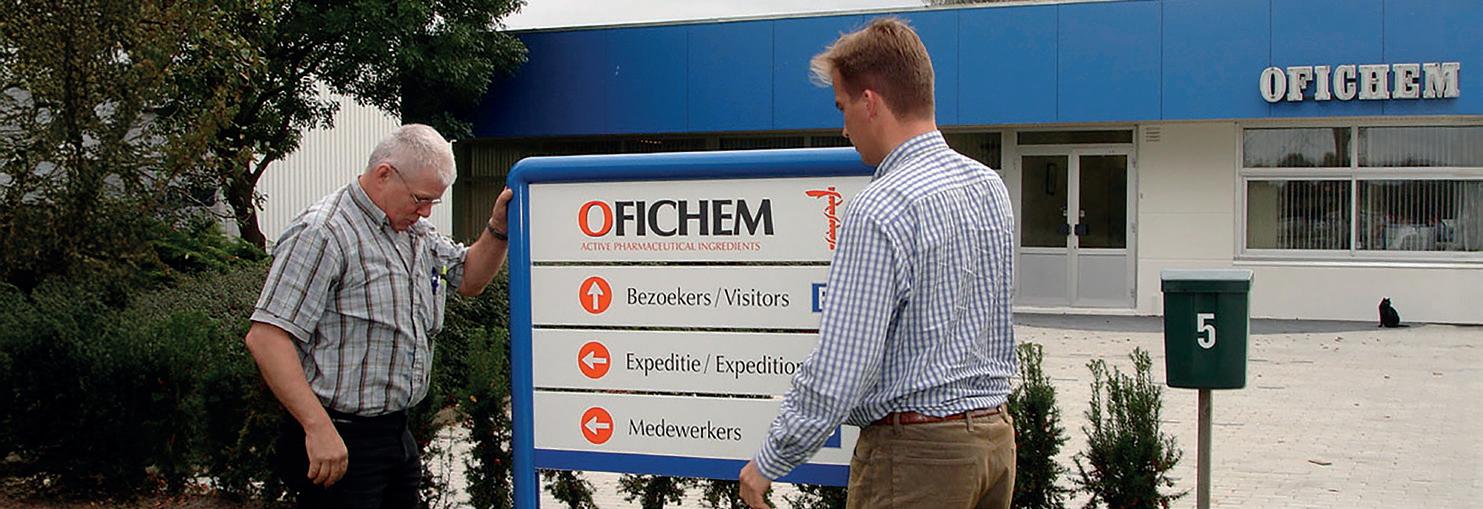
Difficult Years
The late 1990s saw a difficult period for the company, which had just relocated to Ter Apel. Increasingly higher demands were placed on pharmaceutical companies in the Netherlands, and cheap medicines were arriving from China. Subsequently, several new companies were established, primarily for the import and sale of raw materials.
AS THE ELDEST SON, WEITE WAS PRACTICALLY THROWN TO THE WOLVES
In September 2006, Otto asked Weite to work at the company for a few days a week. To gain experience, Weite worked in various departments. “That same year, Otto experienced health problems and passed away suddenly on December 3rd,” says Ina.
“As the eldest son, Weite was practically thrown to the wolves immediately. We initially continued the business together, and later Weite took over completely. Since then, I have stepped back. Ofichem has developed enormously. I am incredibly proud of Weite and love him very much. He is doing a truly fantastic job!”
Samen met Wim Ekkelkamp (gewaardeerd oud-medewerker) plaatst Weite een bord.
Together with Wim Ekkelkamp (valued former employee), Weite places a new sign.
DE AAPI’S BINNEN OFICHEM
THE AAPIS WITHIN OFICHEM
De Personeelsvereniging is een belangrijk onderdeel van het familiebedrijf Lab Ofichem. Vanaf het moment dat ze startte bij ons bedrijf in 1990, was Truida Dol de aangewezen persoon om leuke activiteiten te organiseren. Dat deed ze met veel plezier voor het handjevol medewerkers dat destijds bij Lab Ofichem werkte.
Toen het bedrijf maar bleef groeien kreeg ze er hulp bij van verschillende collega’s, die bij toerbeurt de organisatie op zich namen.
Niet alleen het bedrijf groeide, ook het aantal activiteiten nam in de loop der jaren toe. Werd er eerst alleen een barbecue georganiseerd, later kwamen daar het kerstdiner bij, een activiteit voor alleen de medewerkers én een activiteit waarbij ook de partners welkom waren.
Kortom: het werd tijd om een en ander te gaan professionaliseren.
Remco Vree Egberts, Laura Boxem en Karin de Roo, de initiatiefnemers van het hele gebeuren, startten in juni 2022 met het traject.
The Staff Association is an important part of the family business Lab Ofichem. From the moment she joined the company in 1990, Truida Dol was the designated person to organize fun activities. She did this with great pleasure for the handful of employees who worked at Lab Ofichem at the time.
As the company continued to grow, she received help from various colleagues, who took turns organizing the activities.
Not only did the company grow, but the number of activities also increased over the years. Initially, only a barbecue was organized, but later a Christmas dinner was added, an activity for employees only, and one where partners were also welcome.
In short: it was time to professionalize things.
Remco Vree Egberts, Laura Boxem, and Karin de Roo, the initiators of the entire initiative, began the process in June 2022.
In april 2023 resulteerde dit uiteindelijk in de officiële oprichting van PV DE AAPI’S (de naam is uiteraard een knipoog naar de API’s die we produceren ;).
Truida Dol en Marij Krekt waren ook bereid om zitting te nemen in het bestuur en sindsdien organiseren deze 5 medewerkers met veel plezier alle activiteiten gedurende het hele jaar.
In April 2023, this finally resulted in the official establishment of PV DE AAPI’S (the name is, of course, a nod to the APIs we produce ;). ‘Aap’ also means ‘monkey’ in Dutch, hence the monkeys in our logo!
Truida Dol and Marij Krekt also agreed to join the board, and since then, these five employees happily organise all the activities throughout the year.
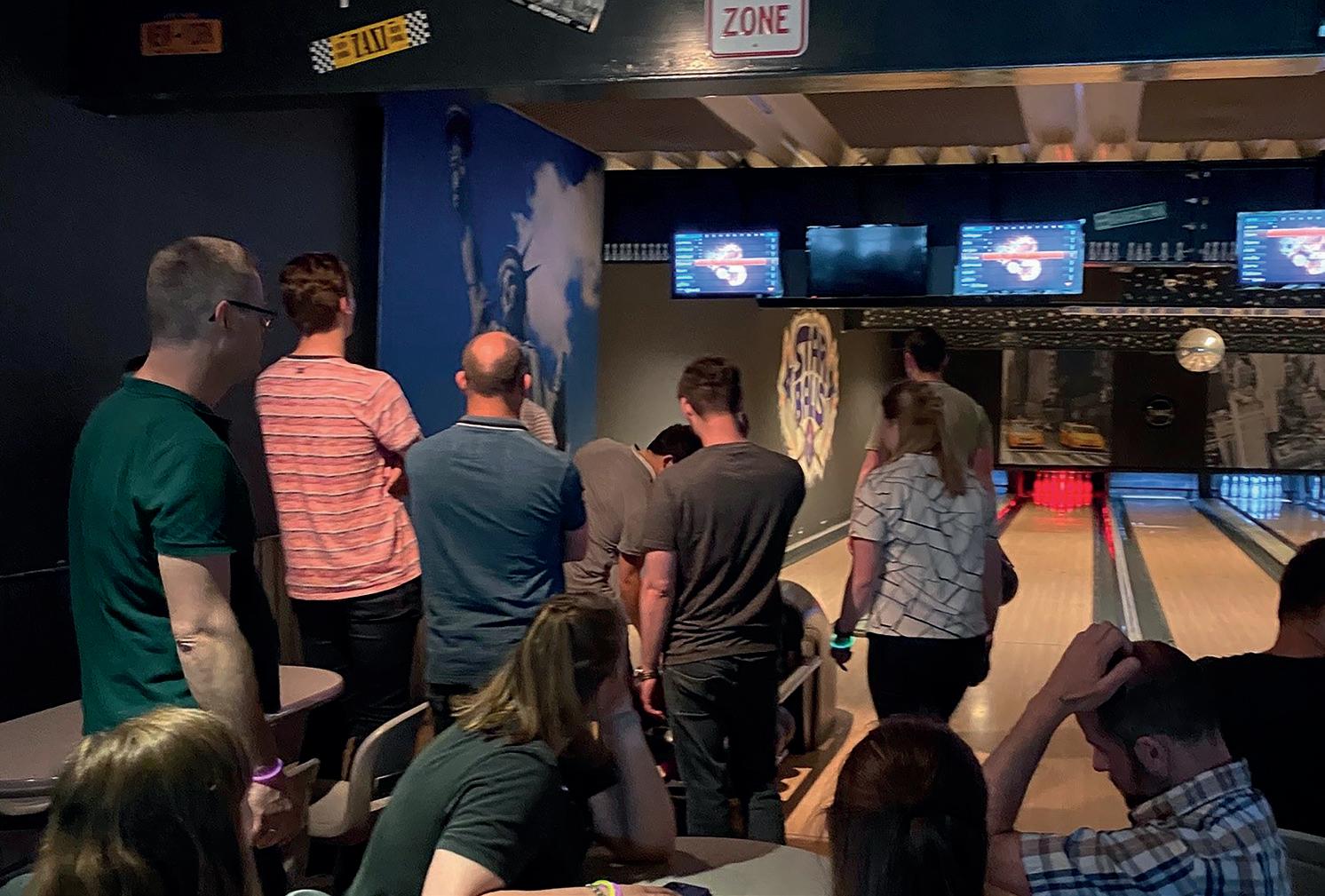
Denk bijvoorbeeld aan de ‘Nieuwjaarskoffie’ op de eerste werkdag in het nieuwe jaar, de jaarlijkse Paasbrunch in de kantine aan de Heembadweg, de BBQ (de laatste jaren altijd met een speciaal thema), het Kerstdiner met een leuke activiteit erbij en uiteraard alle uitjes buiten het kantoor. Ook de jaarlijkse ‘Foute Kersttruiendag’ is sinds jaren een hit!
These include the “New Year’s Coffee” on the first workday of the new year, the annual Easter brunch in the canteen at the Heembadweg, the BBQ (always with a special theme in recent years), the Christmas dinner with a fun activity, and of course, all the outings outside of the office. The annual “Ugly Christmas Sweater Day” has also been a hit for years!
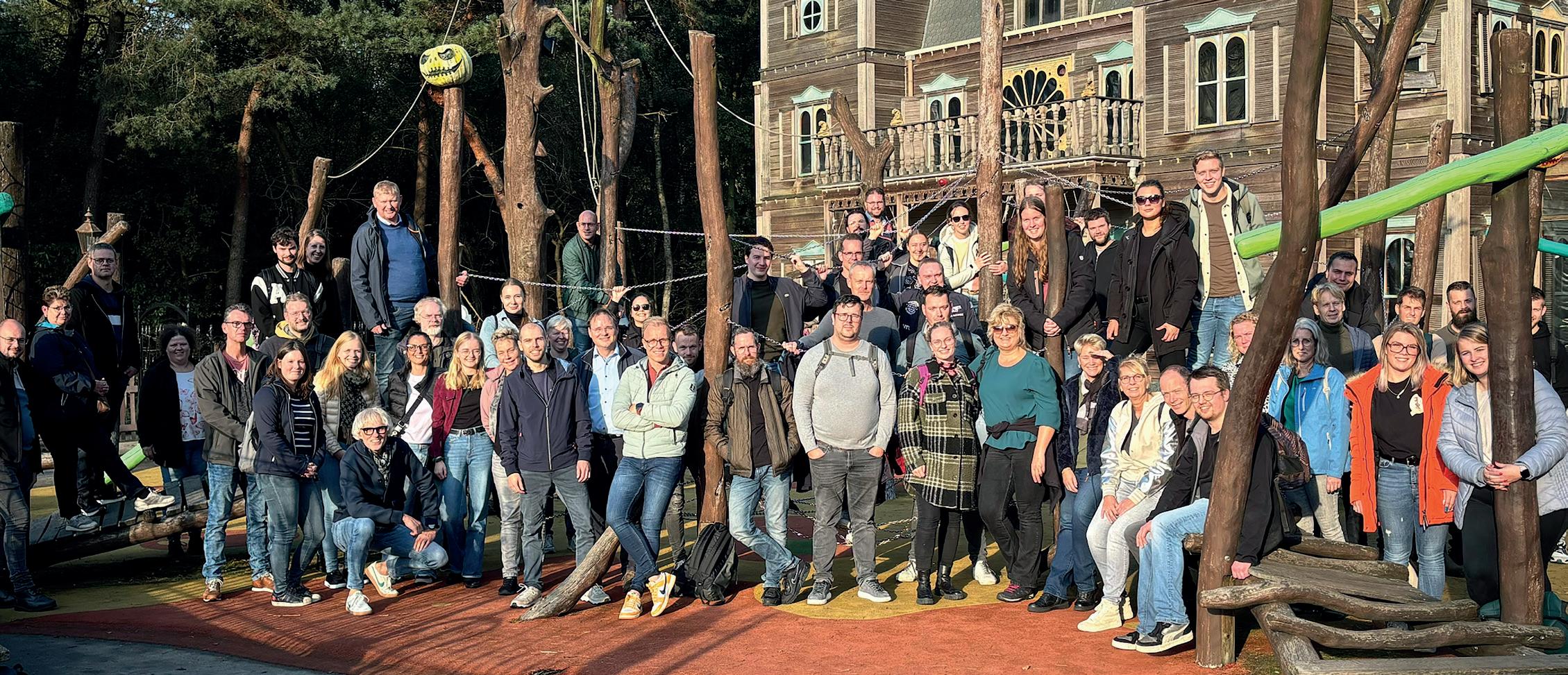
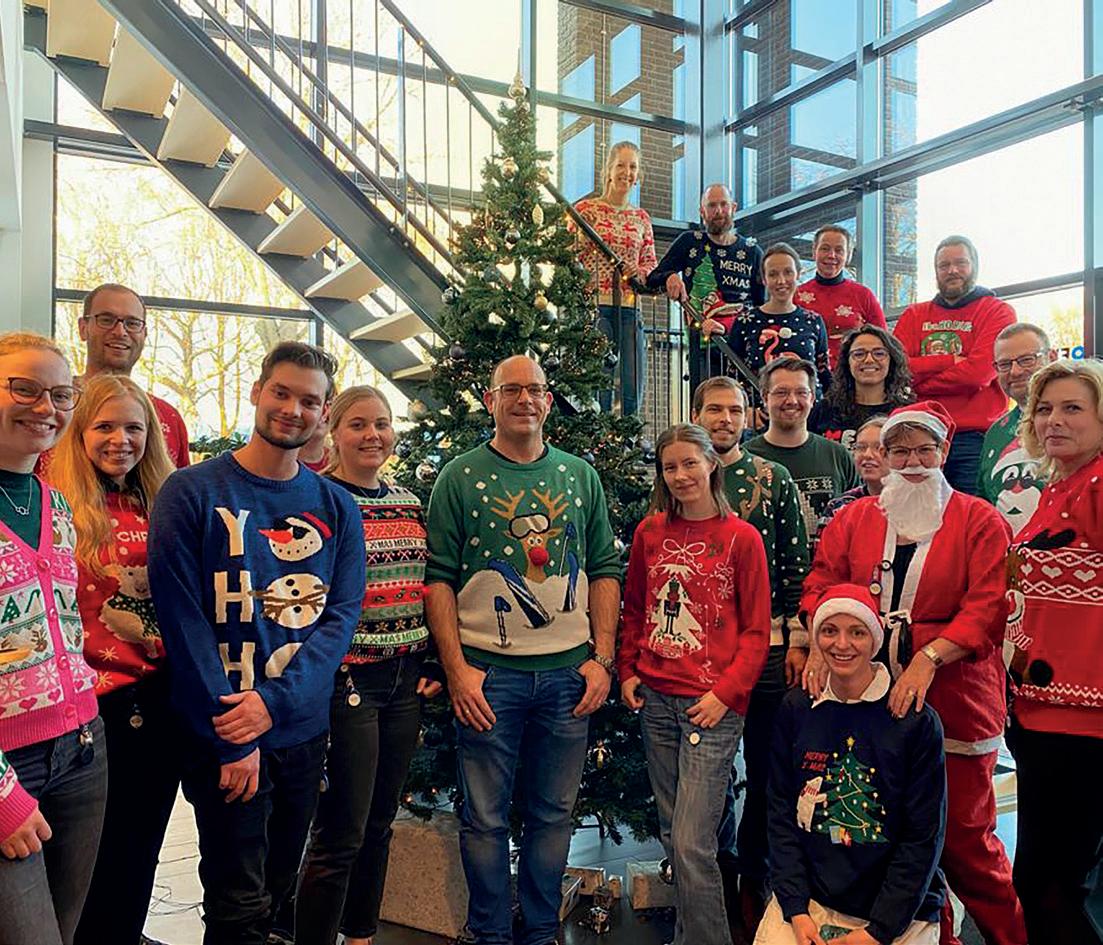
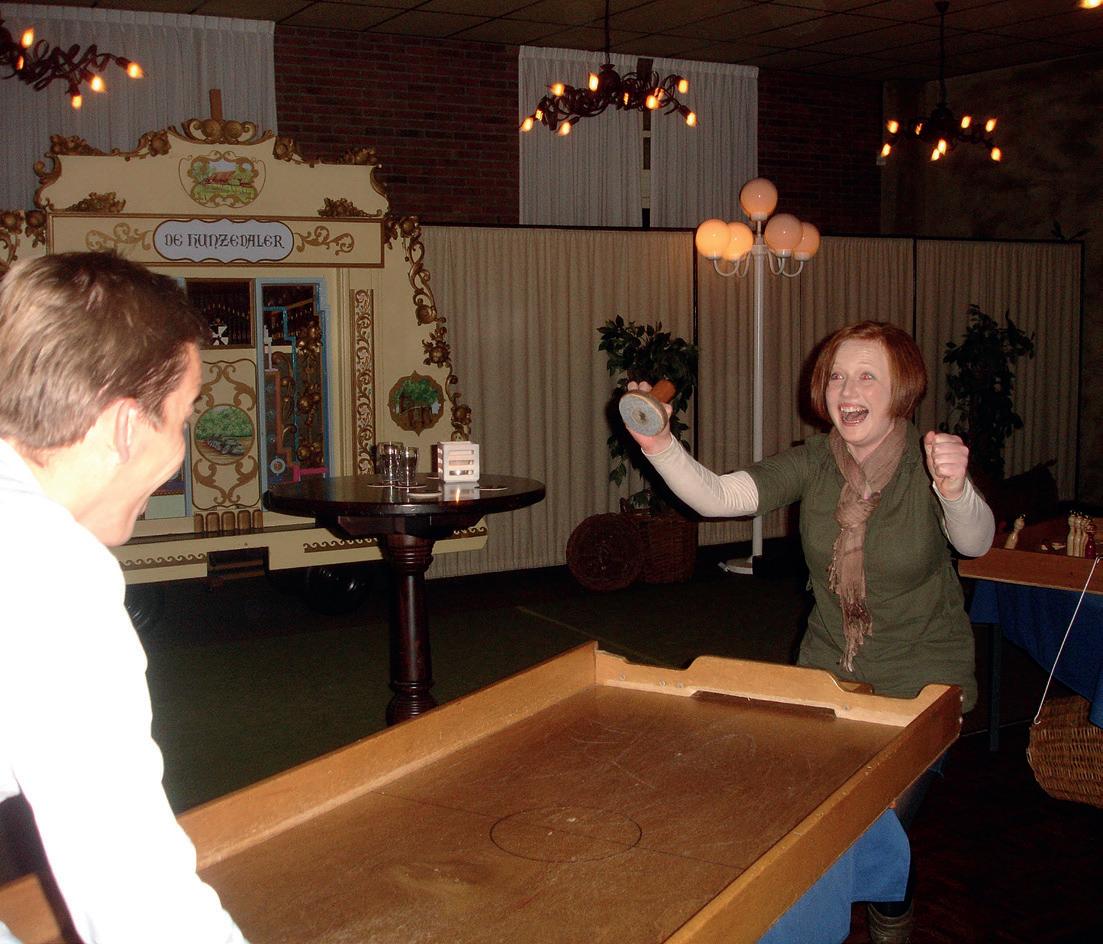
Voor wat betreft de uitjes buiten het kantoor, zijn er in de loop der jaren al heel veel verschillende dingen gedaan: skiën in een overdekte hal in Bottrop, karten, een kookworkshop, een dag klimmen in een klimpark en, onlangs nog, een ‘teambattle’ in Bourtange.
Bij de meeste activiteiten worden alle medewerkers op een ludieke manier gemengd, zodat men elkaar wat beter leert kennen. Het officiële doel van PV DE AAPI’S (vastgelegd in de statuten) staat bij alles voorop: het actief bevorderen van de sfeer binnen de Ofichem Group en tussen de werknemers onderling.
In januari 2023 werd Ofimedicine in Leiden overgenomen. En goed voorbeeld doet volgen, want inmiddels zijn daar ook al verschillende leuke feestjes georganiseerd. Ongetwijfeld zal dit uiteindelijk leiden tot de oprichting van de tweede officiële personeelsvereniging binnen de Ofichem Group!
As for outings outside the office, there have been a lot of different activities over the years: skiing in an indoor hall in Bottrop, go-karting, a cooking workshop, a day of climbing in a climbing park, and, most recently, a “team battle” in Bourtange.
Most activities involve all employees mixing in a fun way, allowing them to get to know each other better. The official goal of PV DE AAPI’S (stated in the articles of association) is paramount: actively promoting a positive atmosphere within the Ofichem Group and among employees.
In January 2023, Ofimedicine in Leiden was acquired. And a good example is being followed, as several fun parties have already been organized there. This will undoubtedly eventually lead to the establishment of the second official staff association within the Ofichem Group!
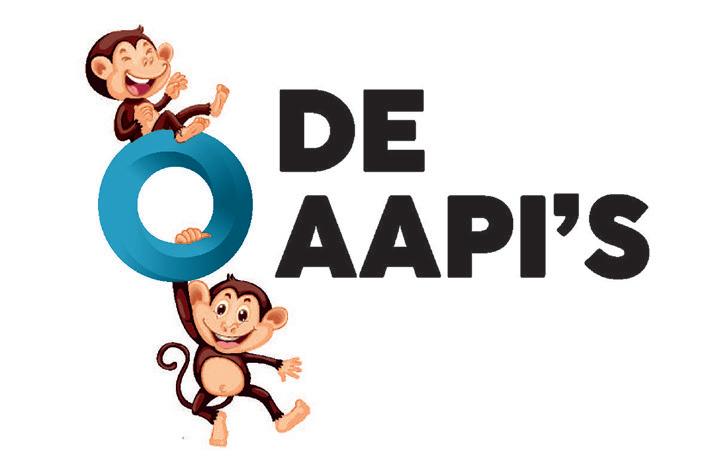
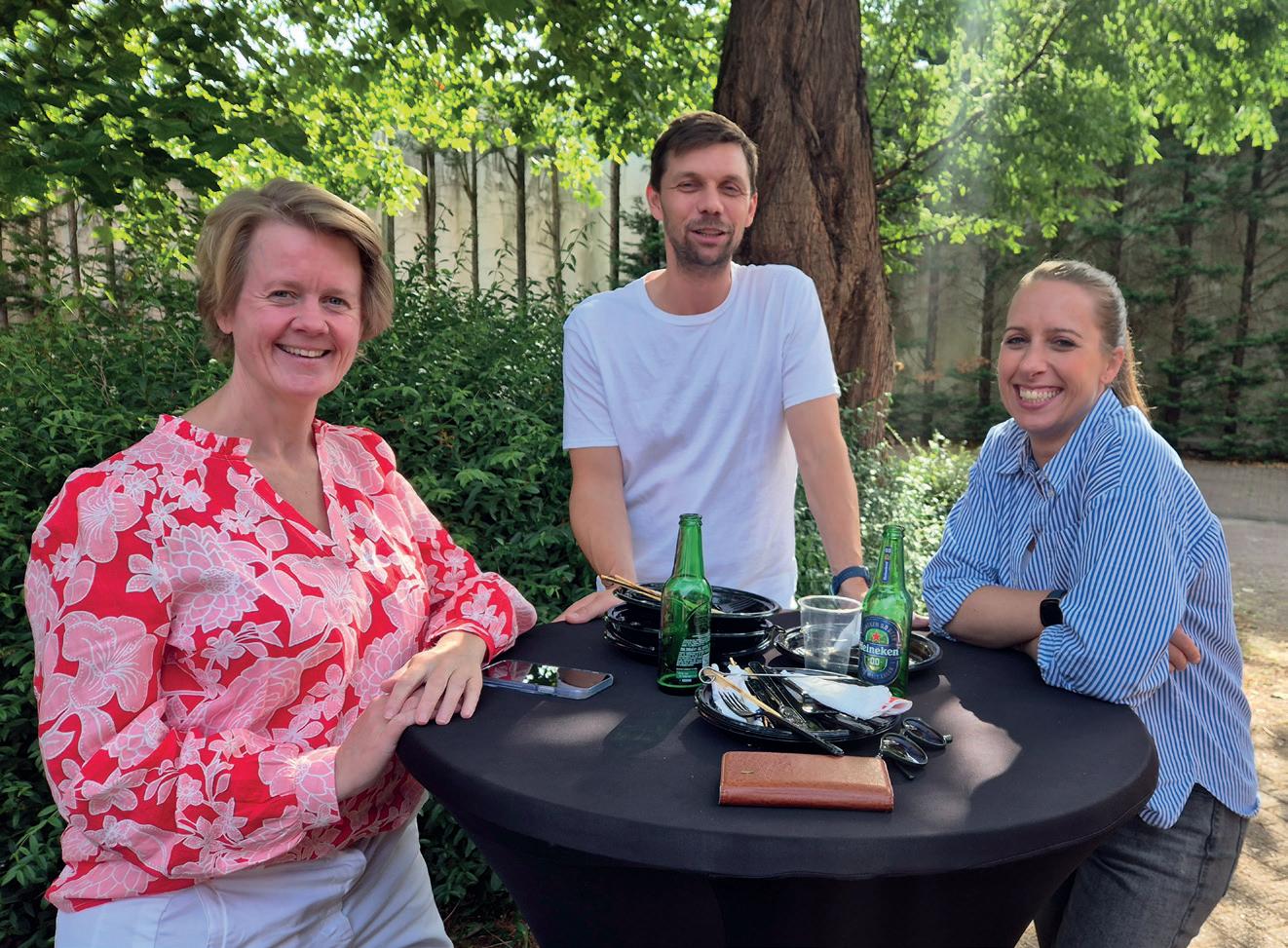
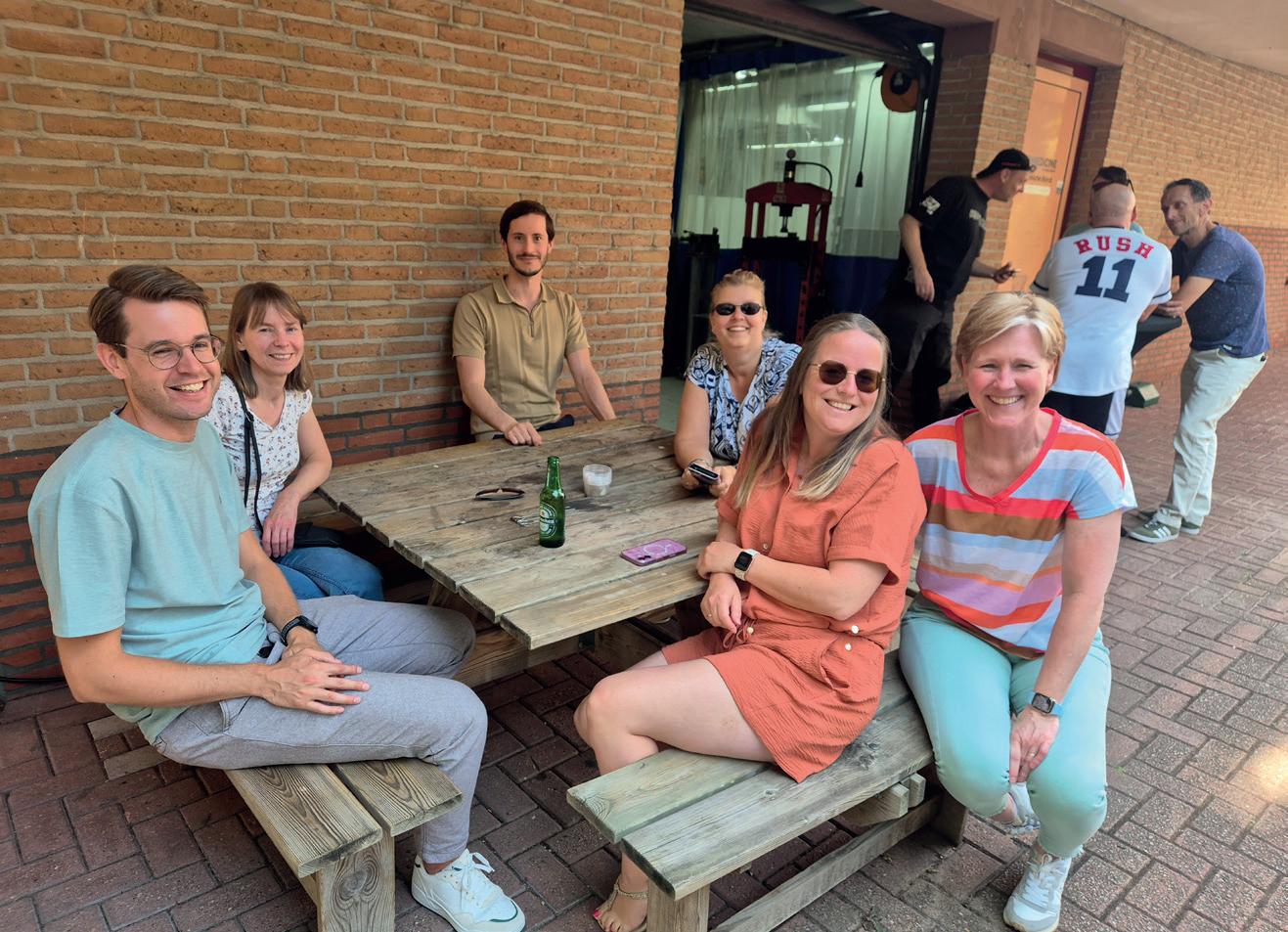
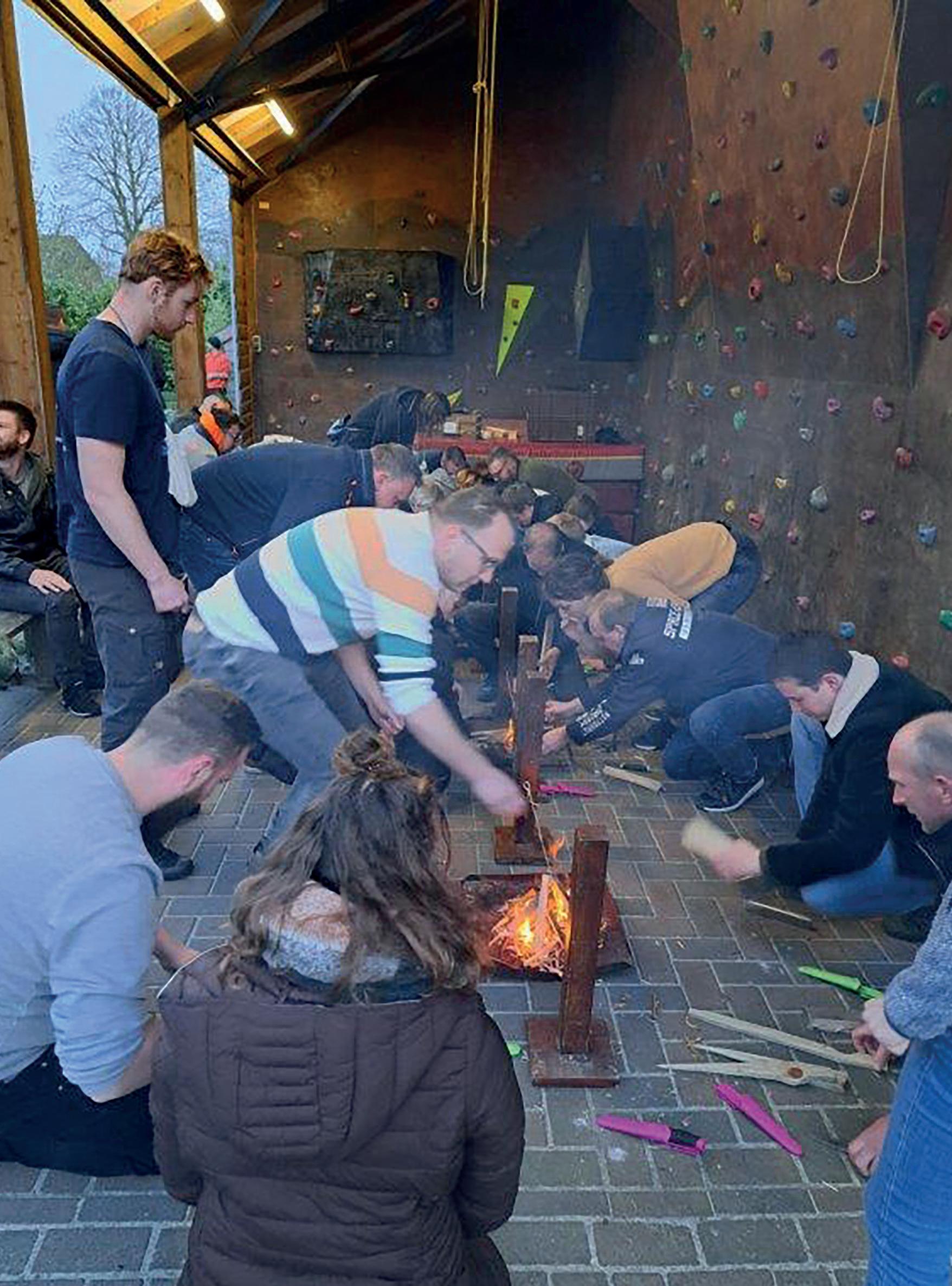
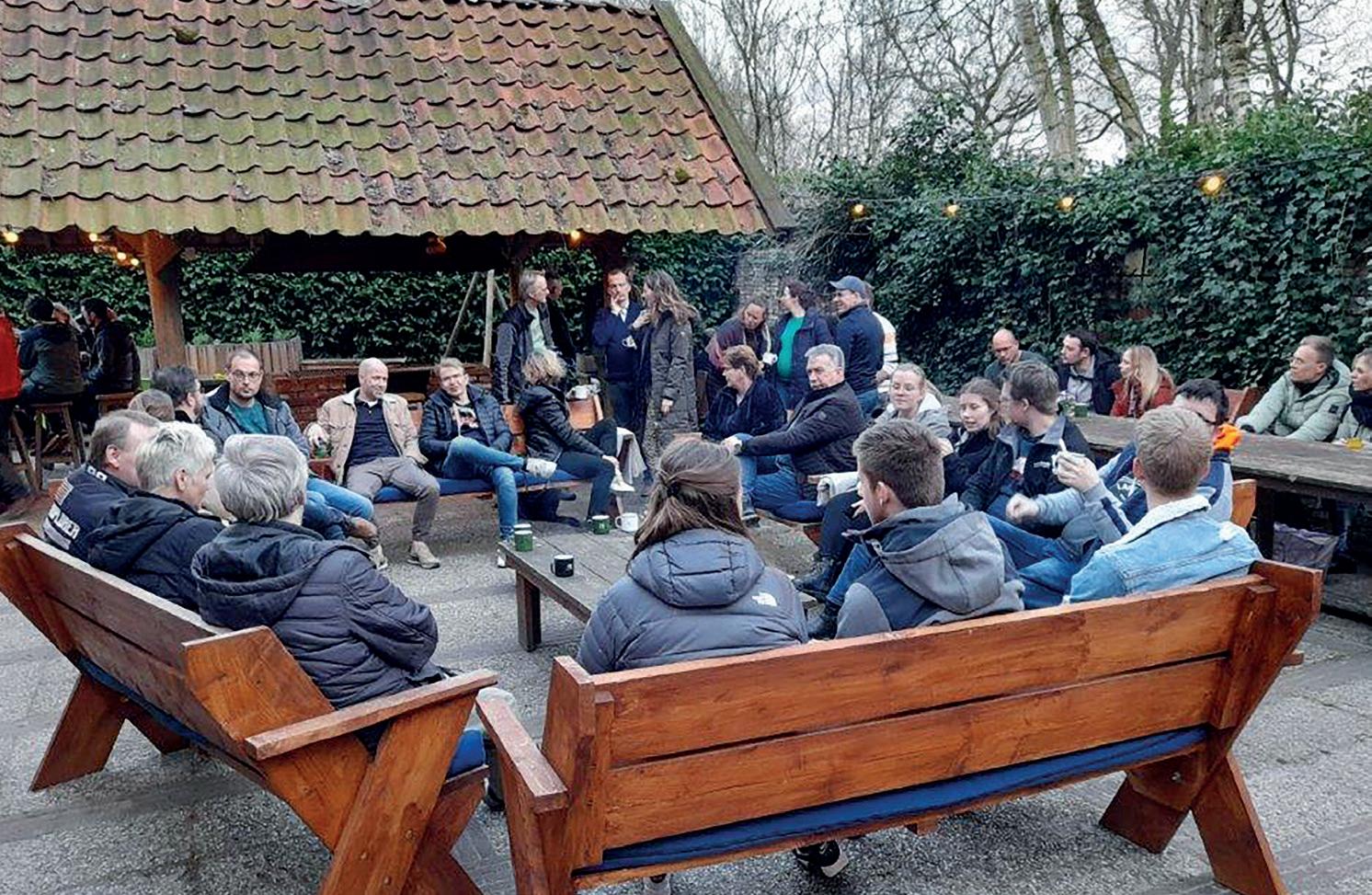

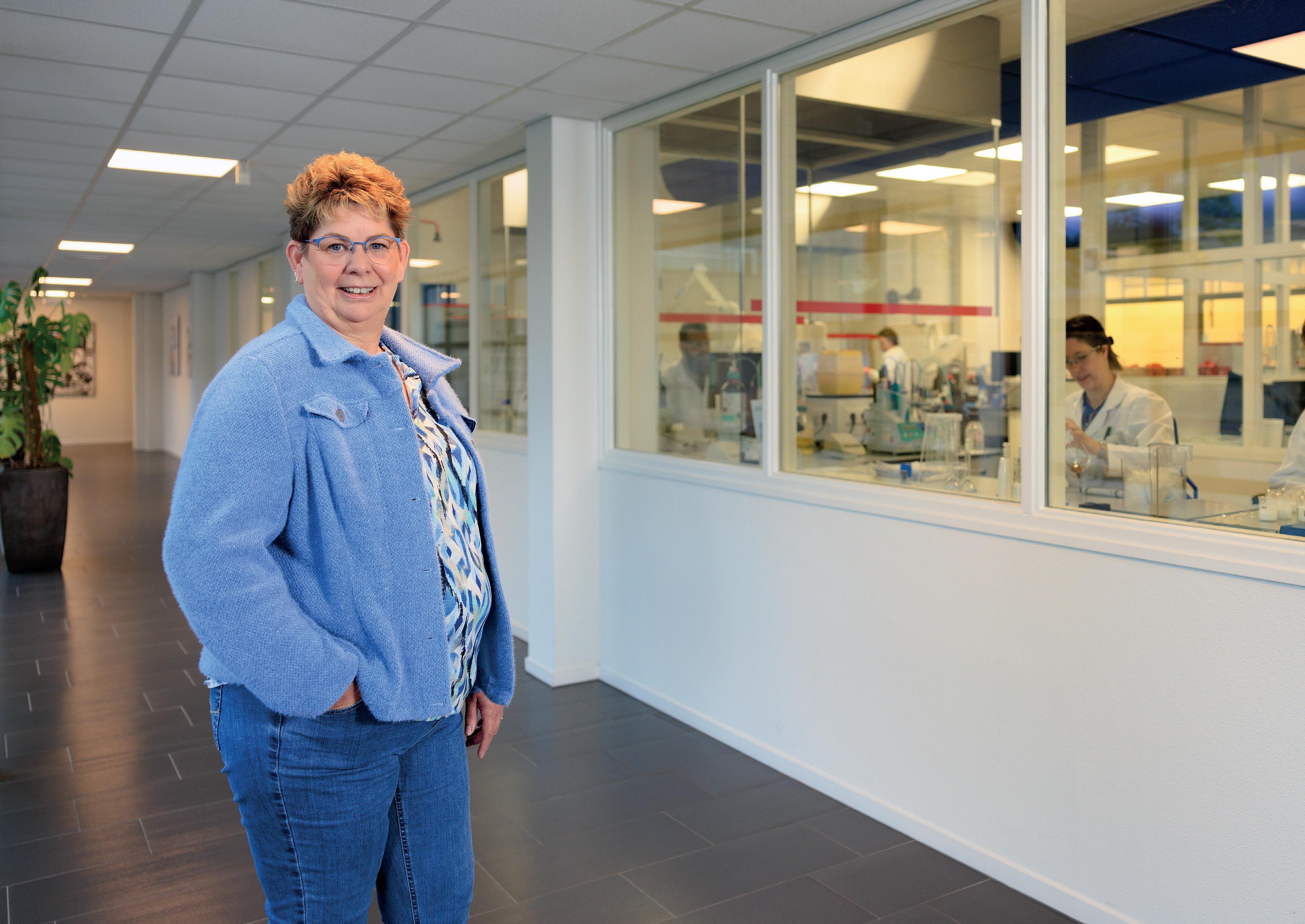
Truida Dol:
“IK KREEG VEEL VRIJHEID EN VERTROUWEN”
“I WAS GIVEN A LOT OF FREEDOM AND TRUST”

Als er iemand is die de professionalisering van Ofichem aan den lijve heeft meegemaakt, dan is het Truida Dol wel. Zij werd in 1990 persoonlijk door Dr. Otto Oldenziel aangenomen. “Ofichem had toen nog niet de bekendheid die het nu heeft”, vertelt ze.
“Dat is in de loop der jaren wel veranderd!” Wat volgens Truida onveranderd is gebleven, is de cultuur: iedereen hoort erbij, of je nu in het lab werkt of bij de facilitaire dienst.
Het was een tijd waarin alles kon, de beginjaren van Ofichem in Ter Apel. De toen 21-jarige Truida werd door directeur Otto Oldenziel persoonlijk aangenomen als facilitair medewerker. Een echt duidelijke taakomschrijving kreeg ze niet.
“Voordat ik bij Ofichem kwam, werkte ik in een modezaak. Dus vond Otto het heel normaal dat ik naast mijn gewone werk de pijpen van zijn nieuwe broeken innam,” vertelt ze lachend.
Wat Truida erg waardeerde in Otto was de vrijheid en het vertrouwen dat hij haar gaf bij Ofichem.
Contact met de familie Kenmerkend noemt ze het contact met de familie. Aan ‘de vrouw van de baas’, Ina Oldenziel, gaf Truida wekelijks het boodschappenlijstje voor de kantine door. “We tutoyeerden elkaar en als er een uitje was van de thuiszorg, waarvoor Ina werkte als leidinggevende, mochten we wel eens mee.”
HET WAS HEEL
NORMAAL DAT IK
NAAST MIJN WERK
ZIJN BROEKSPIJPEN
OOK INNAM
Ook de zonen van Otto waren bekende verschijningen op de werkvloer. Vol trots nam Otto al het personeel mee naar de promotie van Weite in Groningen en ‘s avonds was er een groot feest in Gieten.
If anyone has personally witnessed the professionalization of Ofichem, it is Truida Dol. She was personally hired by Dr. Otto Oldenziel in 1990. “Back then, Ofichem did not have the recognition it has now,” she says.
“That has changed over the years!” What has remained unchanged, according to Truida, is the culture: everyone is included, whether you work in the lab or in facility management.
The early years of Ofichem in Ter Apel was a time when everything was possible. Truida, then 21, was personally hired by director Otto Oldenziel as a facilities employee. However, she did not receive a clearly defined job description.
“Before I joined Ofichem, I worked in a clothing store. So, Otto thought it was perfectly normal that, in addition to my regular work, I would hem the legs of his new pants,” she says with a laugh.
What Truida really appreciated about Otto was the freedom and trust he gave her at Ofichem.
Contact with the family
She describes contact with the family as characteristic. Truida gave the weekly grocery list for the canteen to ‘the boss’s wife,’ Ina Oldenziel. “We were on informal terms. When there was an outing organized by the home care service, for which Ina worked as a manager, we were sometimes allowed to come along.”
IT WAS QUITE NORMAL FOR ME, IN ADDITION TO MY WORK, TO SHORTEN HIS TROUSER LEGS
Otto’s sons were also familiar faces on the work floor. Otto proudly took all the staff to Weite’s promotion in Groningen, and that evening there was a big celebration in Gieten.
Informele omgang
“In 2004 ging het rookverbod van kracht. Regelmatig zochten we het ketelhuis op om daar stiekem van een sigaretje te genieten. Niet zelden werden we vergezeld door Otto”, aldus Truida die daarmee ook het informele karakter van de arbeidsverhoudingen aangeeft. “Zijn onverwachte dood in 2006, vlak voor zijn zestigste jaar, was een klap voor ons allemaal. Alle medewerkers waren bij Otto’s begrafenis aanwezig.”
Informal interaction
“In 2004, the smoking ban went into effect. We regularly went to the boiler room to secretly enjoy a cigarette. We were often accompanied by Otto,” says Truida, who also indicates the informal nature of the working relationships. “His unexpected death in 2006, just before his sixtieth birthday, was a blow to us all. All employees attended Otto’s funeral.”
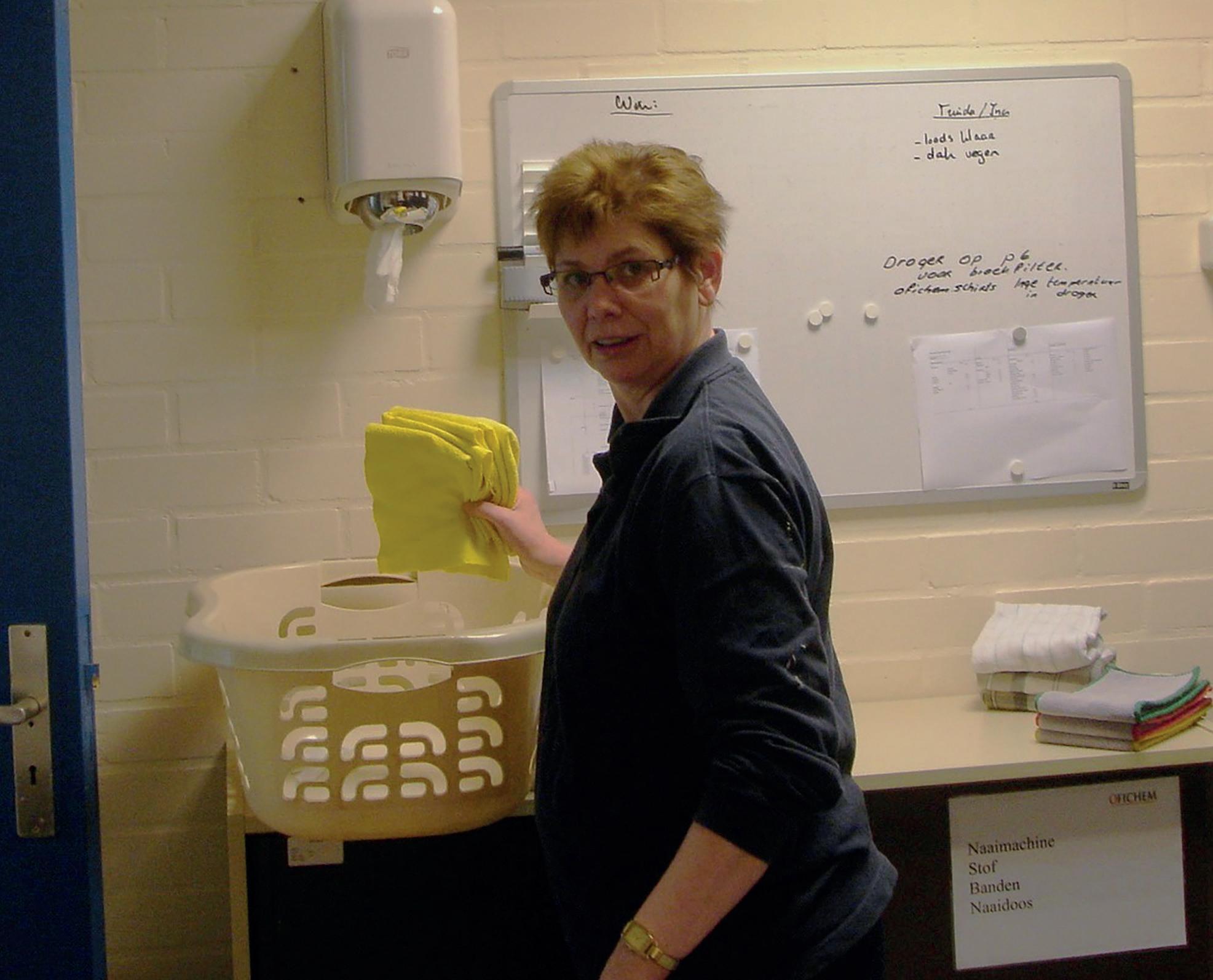
Onverwachte veranderingen
Het was een bijzondere speling van het lot: een paar weken voor de dood van zijn vader, besloot Weite, toen nog werkzaam als parttime apotheker, zich meer met Ofichem te bemoeien. Hij zou de kwaliteitsrichtlijnen binnen het bedrijf gaan implementeren.
Truida: “Dat Weite zo snel de gehele bedrijfsvoering moest overnemen, had natuurlijk niemand verwacht.”
Kwaliteitseisen
Er veranderde veel onder Weite. “Stond ik eerder nog gewoon tussen de medewerkers op de productievloer te stofzuigen”, vertelt Truida, “nu werken we volgens de strenge kwaliteitseisen voor medicijnproducenten. Dat was ook een vereiste van de Nederlandse Voedsel- en Warenautoriteit.”
Weite heeft wel de informele cultuur weten te bewaren. De jaarlijkse barbecue, het personeelsuitje, het kerstdiner en al dat soort sociale activiteiten bleven gehandhaafd.
“We zien Weite veel minder dan voorheen omdat hij voor zijn functie vaak op reis moet. Maar als hij in Ter Apel is, dan kom je hem regelmatig op de werkvloer tegen en staat hij altijd open voor een praatje.”
Unexpected changes
It was a remarkable twist of fate: a few weeks before his father’s death, Weite, then still working as a part-time pharmacist, decided to become more involved with Ofichem. He would implement the company’s quality guidelines. Truida: “Of course, no one expected Weite to take over the entire business operations so quickly.”
Quality Requirements
A lot changed under Weite’s leadership. “Previously, I was just vacuuming the production floor among the employees,” says Truida, “now we work according to the strict quality standards for pharmaceutical manufacturers. That was also a requirement of the Dutch Food and Consumer Product Safety Authority.”
Weite has managed to maintain the informal culture. The annual barbecue, the team outing, the Christmas dinner, and all those kinds of social activities continued.
“We see Weite much less than before because his job requires him to travel frequently. But when he is in Ter Apel, you regularly see him on the work floor, and he is always open for a chat.”
IK STOND GEWOON
TUSSEN DE MEDEWERKERS OP DE PRODUCTIEVLOER
TE STOFZUIGEN
Groei
Met Weite begon ook de enorme groei van Ofichem. Truida: “We zijn uitgebreid met een nieuw pand aan de Drenthweg. Inmiddels tellen we zo’n 85 medewerkers in Ter Apel. De tijd dat ik bij iedereen persoonlijk langsging om een bijdrage te vragen voor de personeelsvereniging is allang voorbij, net als het bijhouden van verlofdagen op strippenkaarten. Ook hang ik niet langer de pasgewassen kleding van het productiepersoneel buiten te drogen; we hebben nu professionele wasmachines en drogers.
Growth
With Weite, Ofichem’s enormous growth also began. Truida: “We have expanded with a new building on Drenthweg. We now have around 85 employees in Ter Apel. The days of personally visiting everyone to ask for a contribution to the staff association are long gone, as is keeping track of leave days on punch cards. I also no longer hang the production staff’s freshly washed clothes outside to dry; we now have professional washing machines and dryers.
I WAS JUST VACUUMING AMONG THE EMPLOYEES ON THE PRODUCTION FLOOR
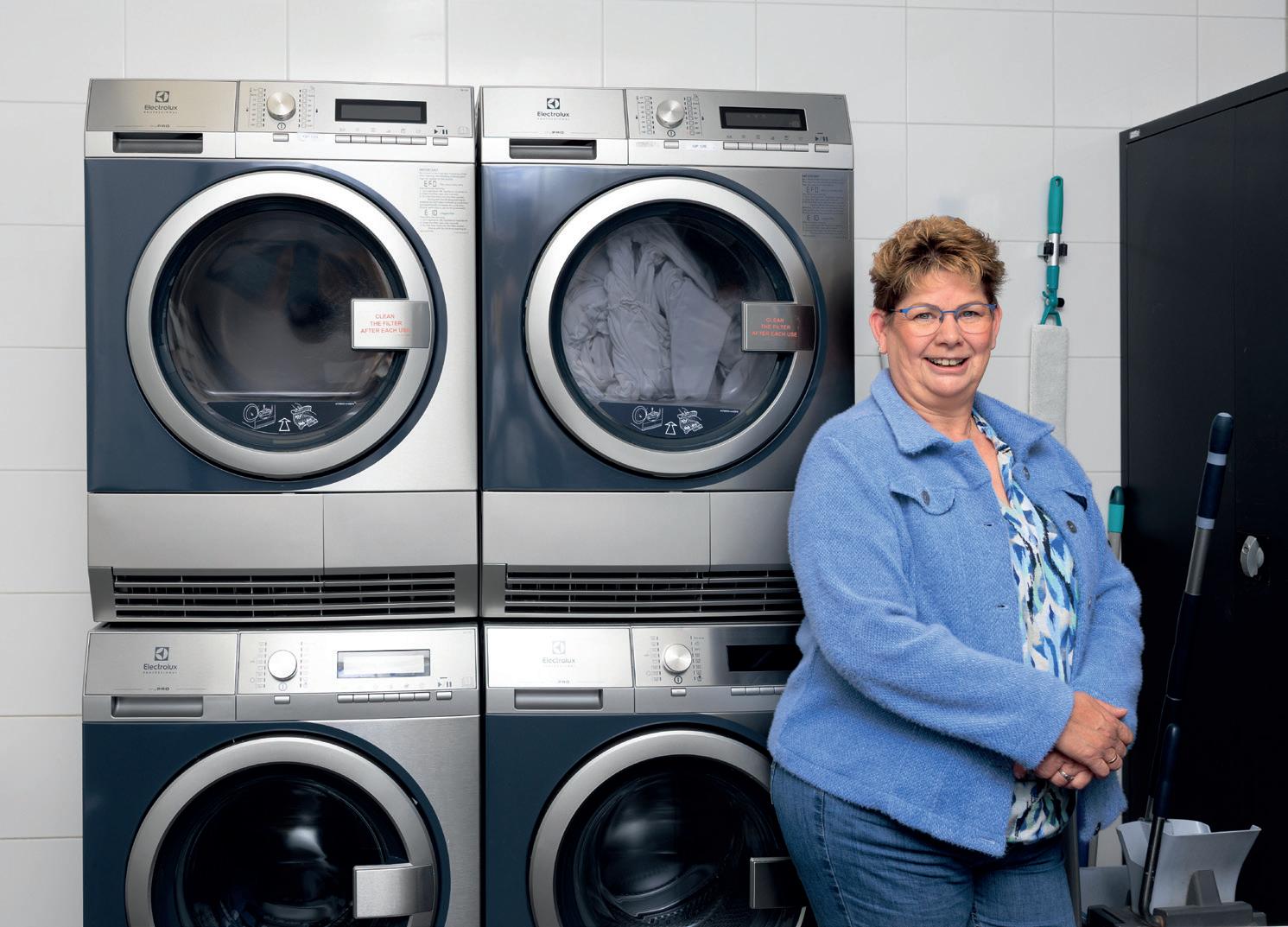
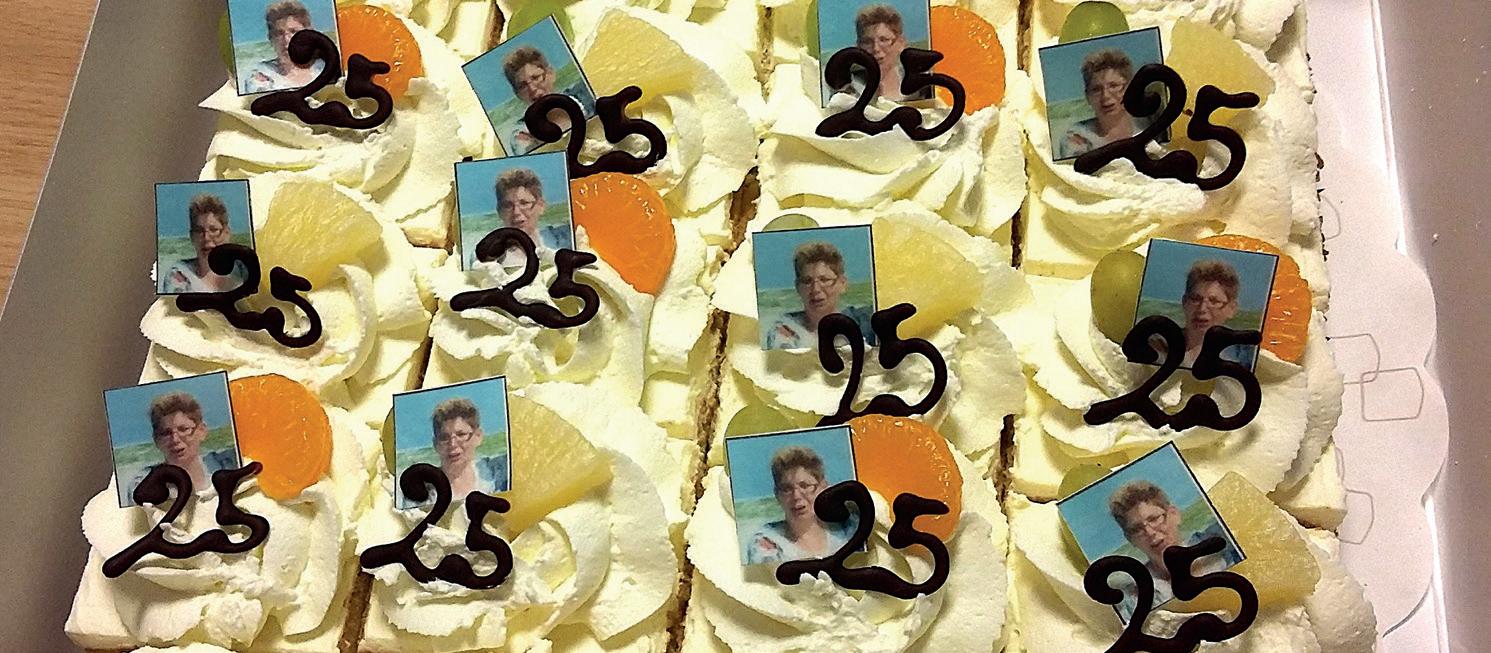
Vroeger was de kantine een kleine ruimte en stond er welgeteld 1 tafel. Moet je nu kijken! Het is ook allemaal internationaler geworden. Maar het informele is gebleven.
Toen de eerste zoon van Weite was geboren, gingen we bij hem thuis langs op kraamvisite. We kunnen trots zijn op dit bedrijf. Weliswaar is Ofichem een chemisch bedrijf en dat lijkt altijd een beetje af te schrikken, maar onze open dagen worden druk bezocht door omwonenden en men heeft veel bewondering voor Ofichem.”
The canteen used to be a small space with just one table. Look at it now! It has all become more international, but the informal atmosphere has remained.
When Weite’s first son was born, we went to visit him at home. We can be proud of this company. Admittedly, Ofichem is a chemical company, and that always seems a bit off-putting, but our open days are well-attended by local residents, and they have a lot of admiration for Ofichem.”
GROEI EN ONTWIKKELINGEN
GROWTH AND DEVELOPMENTS
Na de onzekerheden van eind jaren negentig en begin jaren 2000 zijn we hard gegroeid. Strengere eisen waren het begin van deze ontwikkelingen, maar sindsdien hebben we de trend van groei gewoon doorgezet:
2001: Oprichting Incopharm GMbH als dochteronderneming van Lab Ofichem.
2004: Ofichem breidt uit met de handelsorganisatie Ofichem B.V.
2005: Dr. Otto Oldenziel besluit tot het bouwen van een kleinschalige Good Manufacturing Practice productieruimte.
2006: Start van de verbouw om het eerste deel van de grote productieruimtes om te bouwen tot de eerste Good Manufacturing Practice productieruimtes.
Dr. Otto Oldenziel overlijdt plotseling. Dr. Weite Oldenziel zet de ingezette verbouwingen door.
2007: Verder doorgaan met de verbouw van het eerste deel van de productieruimtes en aansluitend het tweede gedeelte.
After the uncertainties of the late 1990s and early 2000s we have grown rapidly. Stricter requirements were the start of these developments, but since then we have simply continued the trend of growth:
2001: Establishment of Incopharm GmbH as a subsidiary of Lab Ofichem.
2004: Ofichem expands with the trading organisation Ofichem B.V.
2005: Dr. Otto Oldenziel decides to build a small-scale Good Manufacturing Practice production facility.
2006: Start of the renovation to convert the first part of the large production areas into the first Good Manufacturing Practice production areas.
Dr. Otto Oldenziel passes away suddenly. Dr. Weite Oldenziel continues the renovations that had already begun.
2007: Continuation of the renovation of the first part of the production areas, followed by the second part.
2007-2008: Bedrijf weer laten voldoen aan alle noodzakelijke wettelijke regelgeving, zoals Milieu-, ARBO-, oppervlaktewater-, ATEXe.a. regelgeving. Implementatie van een GMP regelgeving systeem.
2007-2008: The company is brought back into compliance with all necessary legal regulations, such as environmental, health and safety, surface water, ATEX and other regulations. Implementation of a GMP regulatory system.
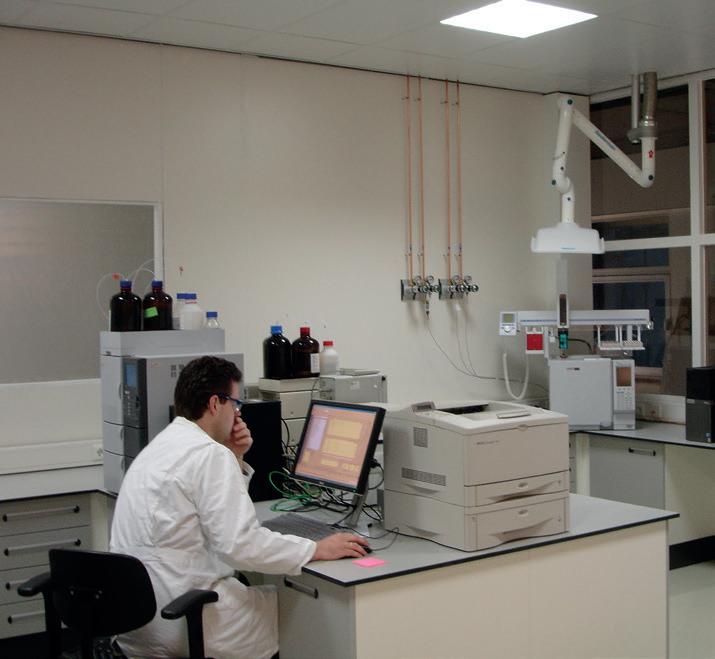
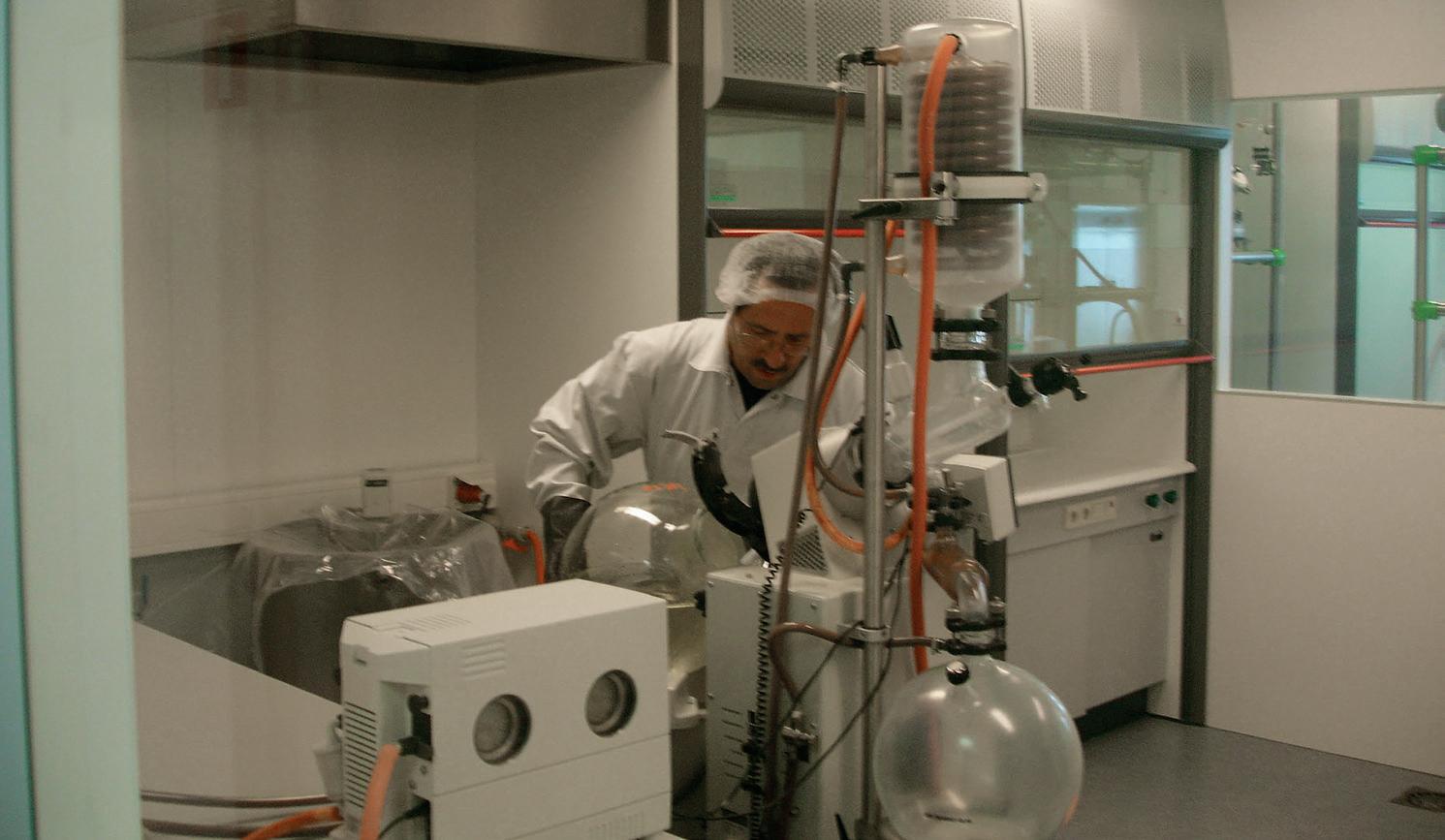
Het gerenoveerde lab / The renovated lab.
De eerste GMP productieruimte / Our first GMP production facility.
2008: Eerste IGZ inspectie en GMP certificaat behaald.
2010: Start bouw van een nieuw kantoor aan de voorkant van het pand aan de Heembadweg (Ter Apel).
Interne verbouwing van het oorspronkelijke pand, zoals bijvoorbeeld de volledige renovatie van het laboratorium. Hiervoor moeten een aantal kantoren worden opgeofferd, waaronder die van de algemeen directeur.
Tijdelijke ruimtes in container units worden gecreëerd op de binnenplaats. Hier krijgen de afdelingen Logistiek, Finance, QA en de algemeen directeur een plek.
2011: Tijdelijke units op de binnenplaats worden verwijderd. De binnenplaats wordt dichtgemaakt zodat er een ruime kantine kan worden gerealiseerd voor het groeiend aantal personeelsleden. Er worden 2 wandelgangen gecreëerd. De oude kantine wordt omgebouwd naar douche- en kleedruimtes.
2012: Start bouw en oplevering van een additionele opslagruimte (2.500 m2) voor de snel groeiende handelstak naast de bestaande loods van het oorspronkelijke pand aan de Heembadweg. Interne renovatie van de oude loods en aanpalende ruimtes.
2008: First IGZ inspection and GMP certificate obtained.
2010: Start of construction of a new office at the front of the building on Heembadweg (Ter Apel).
Internal renovation of the original building, including the complete renovation of the laboratory. This requires sacrificing a number of offices, including that of the managing director.
Temporary spaces are created in container units in the courtyard. The Logistics, Finance, QA and managing director departments are relocated here.
2011: Temporary units in the courtyard are removed. The courtyard is closed off so that a spacious canteen can be created for the growing number of staff. Two walkways are created. The old canteen is converted into shower and changing rooms.
2012: Start of construction and completion of an additional storage space (2,500 m2) for the rapidly growing trade division next to the existing warehouse of the original building on Heembadweg. Internal renovation of the old warehouse and adjacent spaces.

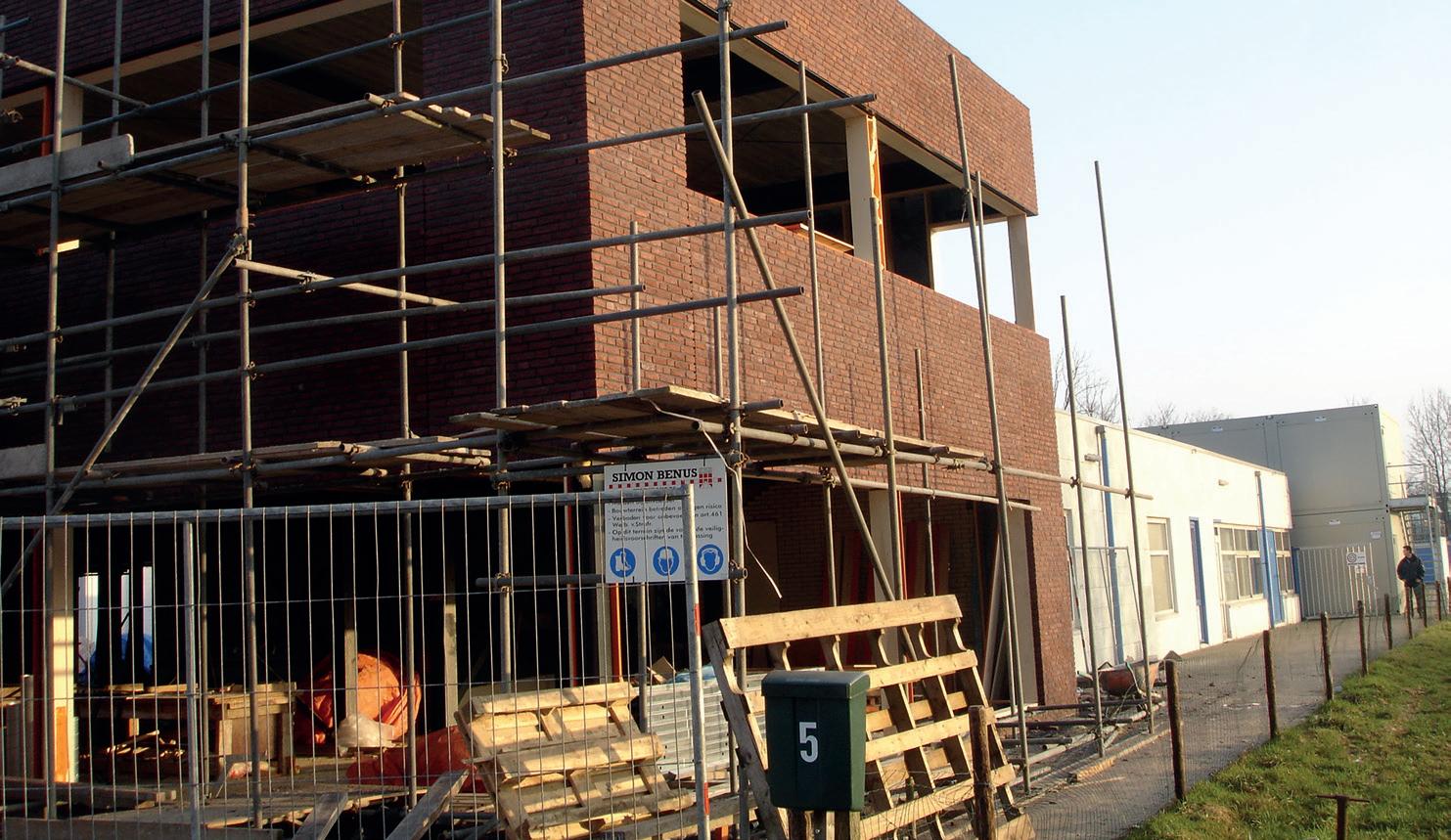
Er kwamen zonnepanelen op het kantoor én de loods te liggen. Solar panels were installed on both the office and the warehouse.
Een frisse look voor ons nieuwe kantoor, nog altijd op nummer 5!
2014-2015: Renovatie van de gehele productieruimte: alle oude installaties worden vervangen. Er wordt een 2e verdieping boven de productieruimtes gecreëerd die dient als loopgang en als technische gang. Die geeft goed zicht op de productieruimtes zonder deze te hoeven betreden, wat GMP-technisch een groot voordeel is. Ook wordt op deze verdieping een kantoor voor het hoofd van de Productie en de Technische Dienst gecreëerd.
De vernieuwing van de gehele HVAC (verwarming, ventilatie en airco) systeem van het bedrijf met speciale warmtewisselaren zorgt voor een grote terugwinning van energie. De R&D chemie-afdeling verhuist naar Zernike in Groningen (Innolab). De vrijgekomen ruimte aan de Heembadweg krijgt een productiebestemming.
2014-2015: Renovation of the entire production area: all old installations are replaced. A second floor is created above the production areas, which serves as a walkway and technical corridor. This provides a good view of the production areas without having to enter them, which is a major advantage in terms of GMP. An office for the head of Production and Technical Services is also created on this floor.
The renovation of the company’s entire HVAC (heating, ventilation and air conditioning) system with special heat exchangers results in significant energy recovery. The R&D chemistry department moves to Zernike in Groningen (Innolab). The space vacated on Heembadweg is used for production.
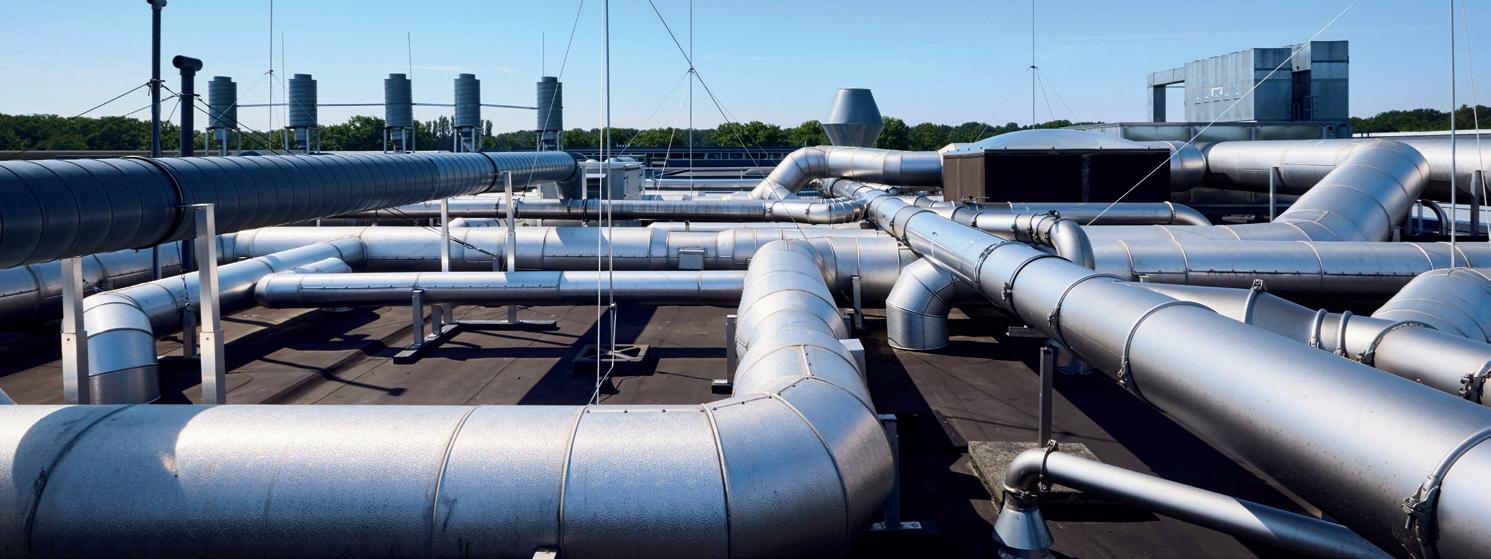
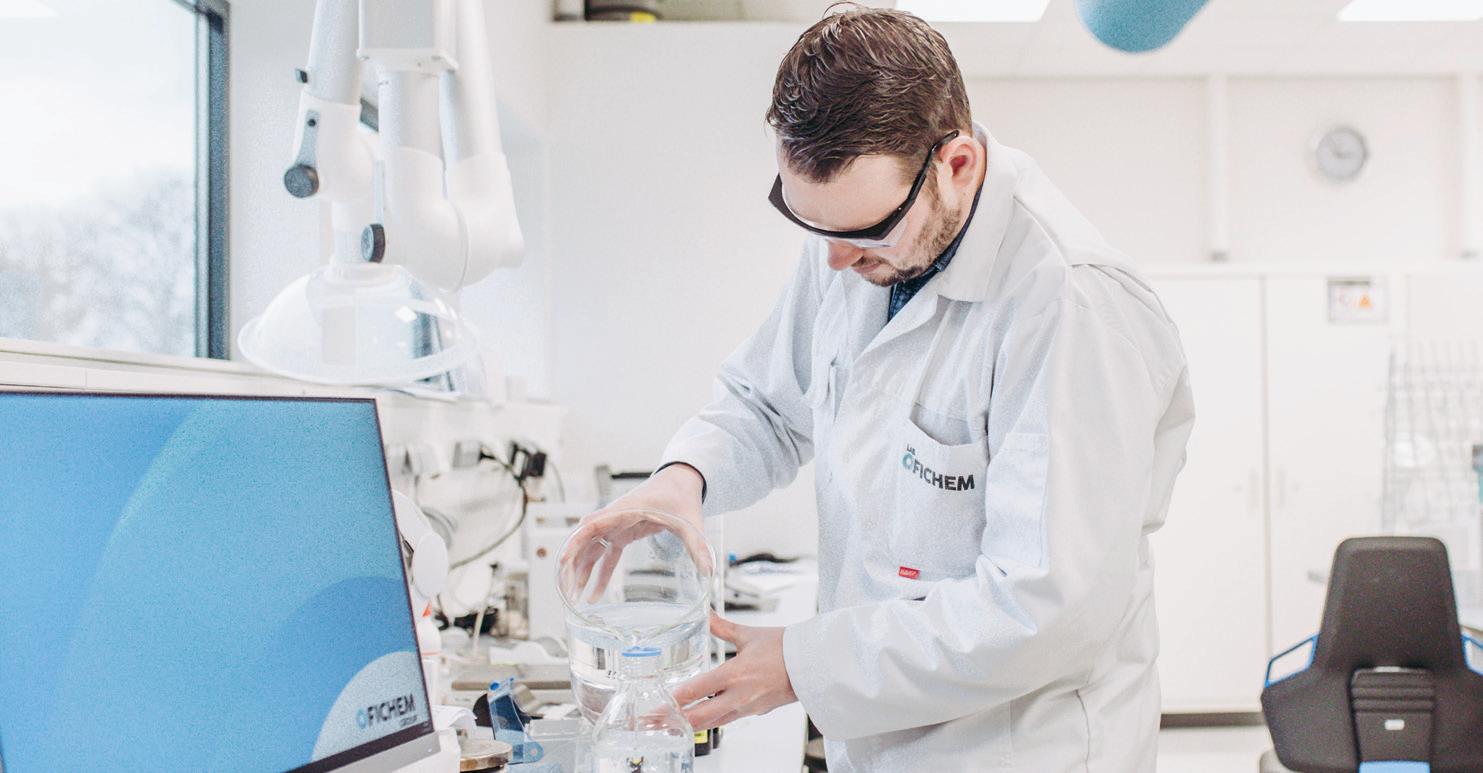
2016: Start renovatie van één van de grootschalige productielijnen ten behoeve van meer geavanceerde syntheses. De lijn wordt volledig chemisch resistent, temperaturen van -40 tot 200ºC zijn mogelijk, destilleren kan wel en niet onder vacuüm, er kan gewerkt worden met corrosieve gassen zoals HCl (waterstofchloride).
Overname van Call Zwolle, een klein laboratorium in eigendom van een groep apothekers die analyses uitvoert voor de eigen bereidingen. Dit vormt de aanleiding tot oprichting van een separate afdeling binnen Quality Control: de Analyse-voor-Derden-afdeling. Deze afdeling verzorgt analyses voor apotheken, ziekenhuis-apotheken, groot bereiders, etc.
2016: Start of renovation of one of the large-scale production lines for more advanced syntheses. The line is completely chemically resistant, temperatures from -40 to 200ºC are possible, distillation is possible with or without vacuum, and corrosive gases such as HCl (hydrogen chloride) can be used.
Acquisition of Call Zwolle, a small laboratory owned by a group of pharmacists that performs analyses for its own preparations. This leads to the establishment of a separate department within Quality Control: the Third-Party-Analysis department. This department provides analyses for pharmacies, hospital pharmacies, large manufacturers, etc.
De Analyse voor Derden-afdeling / The Third Party Analysis department.
Het nieuwe HVAC systeem op het dak aan de Heembadweg (Ter Apel).
The new HVAC system on our roof at the Heembadweg (Ter Apel).
2018: Na een strategische keuze wordt de productie van cytostatica gestaakt. De vrijgekomen ruimte maakt de fysieke groei mogelijk van de R&D Analyse-afdeling.
De handelsorganisaties, Ofichem en Ofipharma, aan de Heembadweg groeien zo hard dat ze opslagruimte tekort komen. De locatie aan de Drenthweg wordt aangekocht met naastgelegen grond die in eigendom was van de gemeente. Dit betreft een kantoor met een kleine loods. Eerst worden deze grondig verbouwd en aansluitend wordt een nieuwe opslagruimte (3.000 m2) van 10 meter hoog gebouwd.
2018: Following a strategic decision, the production of cytostatics is discontinued. The space that becomes available enables the physical growth of the R&D Analysis department.
The trade organisations, Ofichem and Ofipharma, on Heembadweg are growing so rapidly that they are running out of storage space. The location on Drenthweg is purchased, along with adjacent land owned by the municipality. This consists of an office with a small warehouse. First, these are thoroughly renovated, and then a new 10-metre-high storage space (3,000 m2) is built.
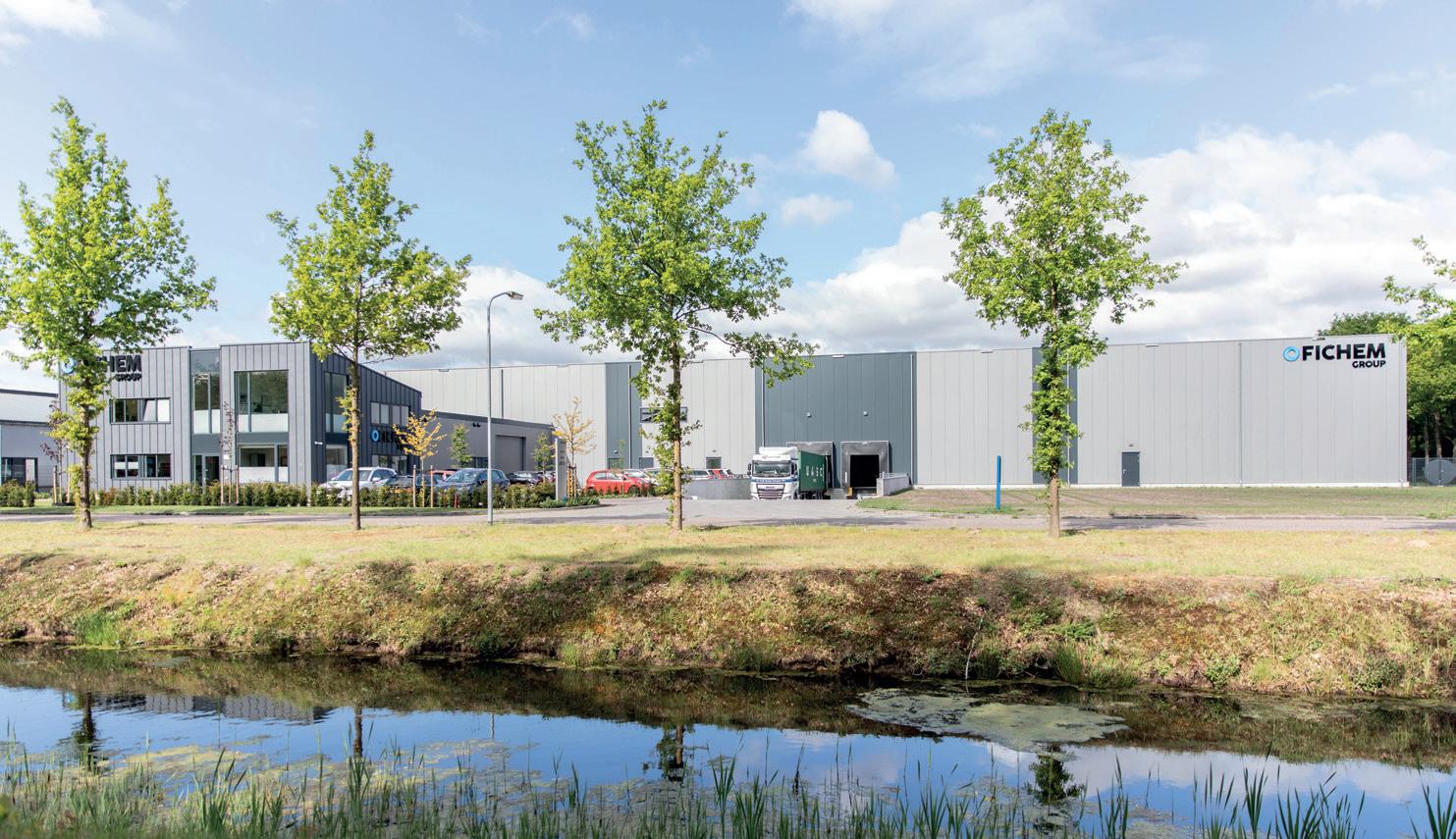
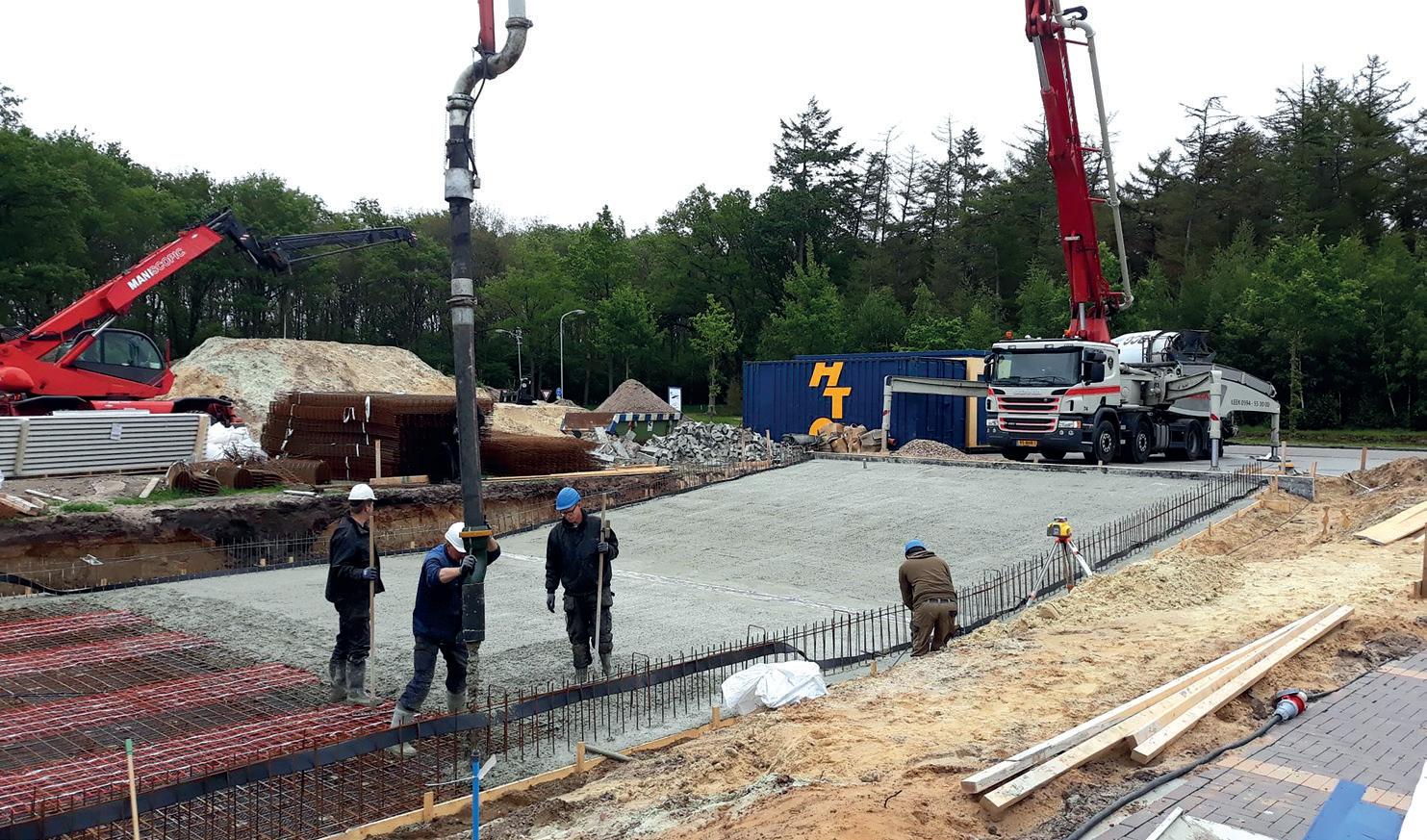
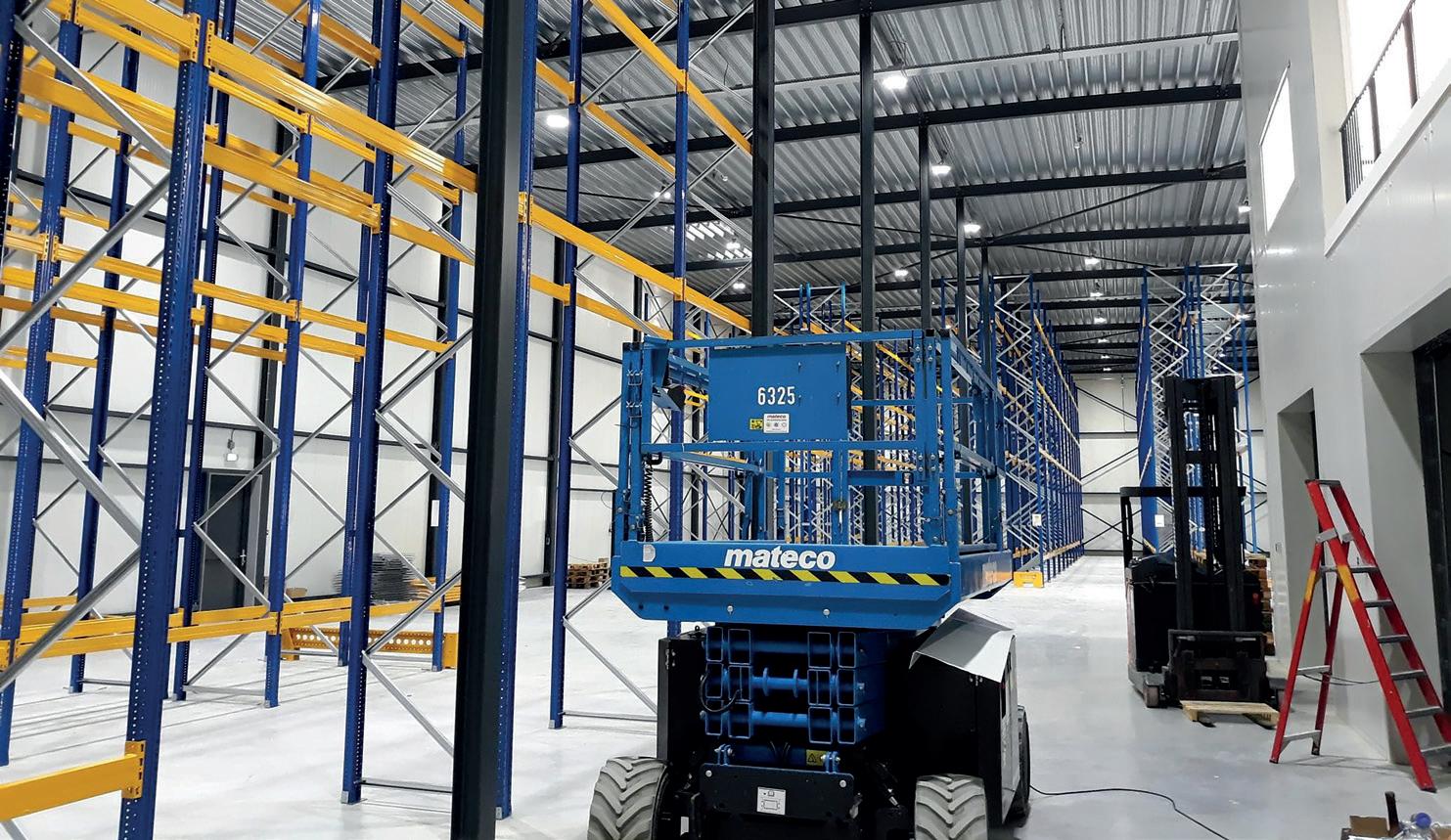
Bouw van de nieuwe loods aan de Drenthweg, Ter Apel (2019). Construction of the new warehouse at the Drenthweg, Ter Apel (2019).
De lege loods, klaar voor het opslaan van onze producten. The empty warehouse, ready to store our products.
Mede dankzij de nieuwe opslagruimte kan de Ofichem Group doorgroeien. Thanks in part to the new storage space, the Ofichem Group can continue to grow.
2020: Verhuizing van de veterinaire handelsorganisatie, Ofichem, naar de nieuwe opslagruimte aan de Drenthweg. Om de groei van de productielocatie mogelijk te maken verhuizen ook de algemeen directeur, zijn managementassistent en de afdeling Finance van de Heembadweg naar de Drenthweg. Verbouwing van de voormalige opslagruimte naar een nieuw R&D laboratorium, een ruimte voor analyse voor derden en een pilot productieruimte.
2020: Relocation of the veterinary trade organisation, Ofichem, to the new storage space on Drenthweg. To enable the growth of the production location, the managing director, his management assistant and the Finance department also move from Heembadweg to Drenthweg. Renovation of the former storage space into a new R&D laboratory, a space for third-party analysis and a pilot production space.
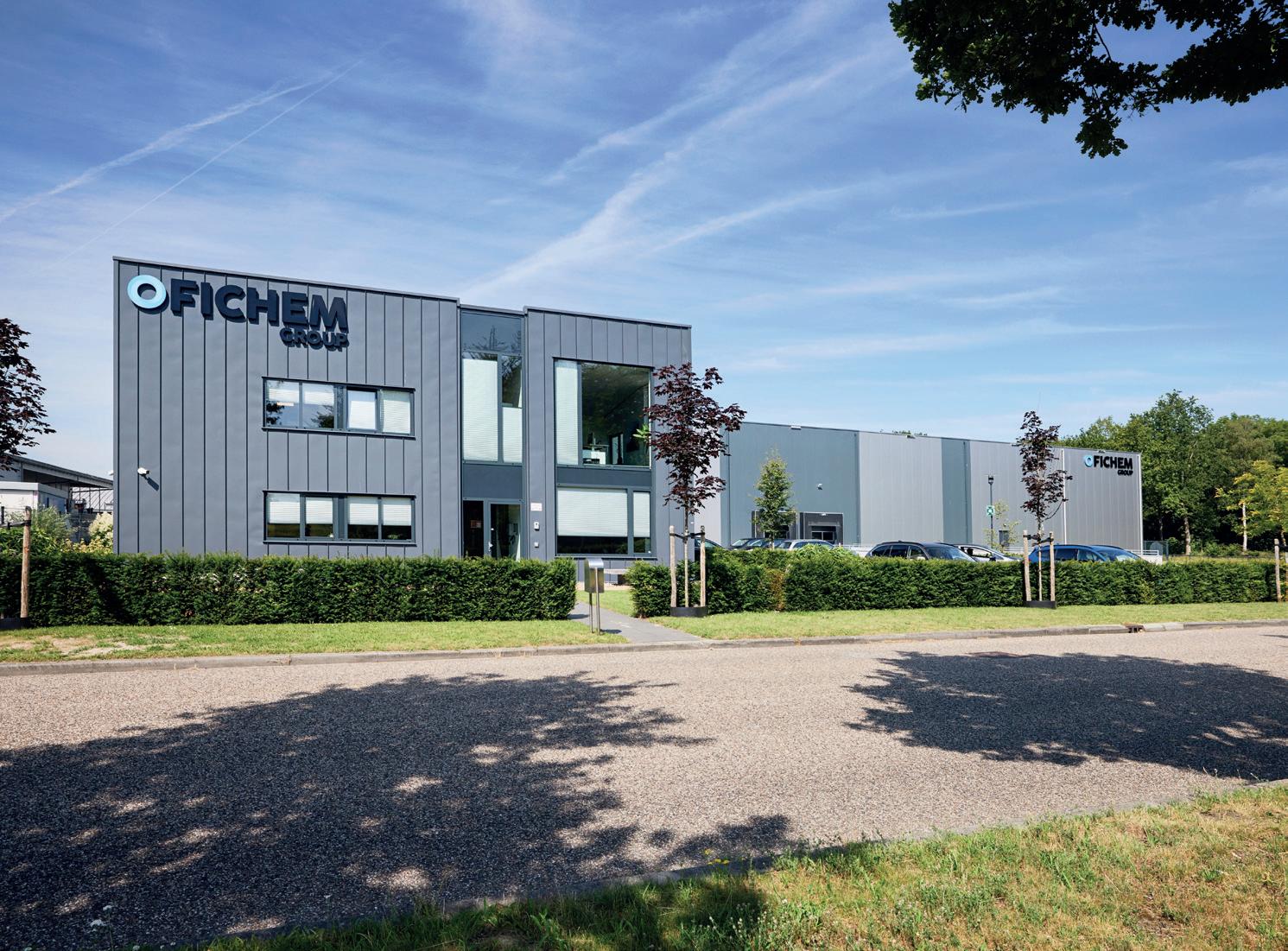
Ons kantoor en de nieuwe loods aan de Drenthweg. Our office and the new warehouse at the Drenthweg.
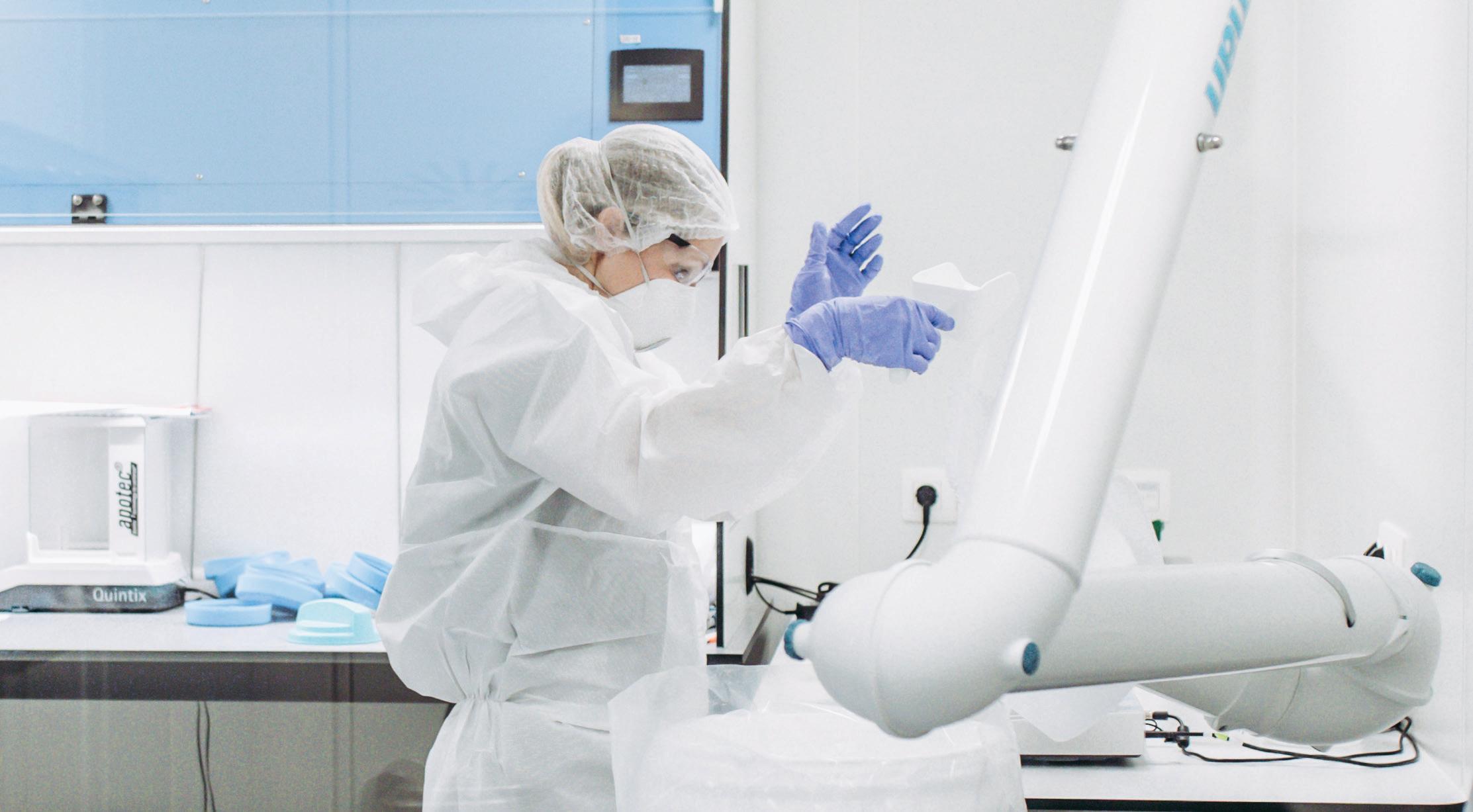
2022: Bouw van een eigen GMPproductieunit voor Ofipharma, aan de Drenthweg. Verhuizing van de humane handelsorganisatie, Ofipharma, naar de Drenthweg. Het R&D-analyse laboratorium aan de Heembadweg is omgebouwd tot een speciale ruimte voor het produceren van Opiaten.
Installatie van een additionele toegangscontrole, een isolator en een speciale afzuigkast voor grote productie. Eén van de grootschalige productielijnen wordt verbouwd voor het op grote schaal mogelijk maken van filtraties voor verwijdering van endotoxines in hulpgrondstoffen die gebruikt worden in specifieke medicijnen, waaronder Covid-19 vaccins.
2022: Construction of Ofipharma’s own GMP production unit on Drenthweg. Relocation of the human trade organisation, Ofipharma, to Drenthweg. The R&D analysis laboratory on Heembadweg is converted into a special room for the production of opiates.
Installation of additional access control, an isolator and a special fume cupboard for large-scale production. One of the large-scale production lines is being converted to enable large-scale filtration for the removal of endotoxins in auxiliary raw materials used in specific medicines, including Covid-19 vaccines.
De monstername-unit van Ofipharma / Ofipharma’s sampling unit.
2023: In het landelijke nieuws: de Ofichem Group neemt het voormalige InnoGenerics in Leiden over.
2025: Diverse verbouwingen van de productielijnen. Ombouw van een tweede grootschalige productielijn voor meerstaps syntheses.
De eerste productielijn behoeft verdere uitbreiding. Een andere productielijn wordt omgebouwd tot micronisatieruimte, wat een steeds belangrijkere activiteit wordt voor Lab Ofichem. Ook verbouwing van een andere ruimte met een destillatie-opstelling waardoor er in ‘continous flow’ en gefractioneerd gedestilleerd kan worden.
Acquisitie van Avivia in Nijmegen en overname van Recipharm On Target Chemistry in Uppsala.
2023: On the national news: the Ofichem Group acquires the former InnoGenerics in Leiden.
2025: Various renovations of the production lines. Conversion of a second large-scale production line for multi-step syntheses.
The first production line requires further expansion. Another production line is converted into a micronisation room, which is becoming an increasingly important activity for Lab Ofichem. Renovation of another room with a distillation setup, enabling ‘continuous flow’ and fractional distillation.
Acquisition of Avivia in Nijmegen and takeover of Recipharm On Target Chemistry in Uppsala.
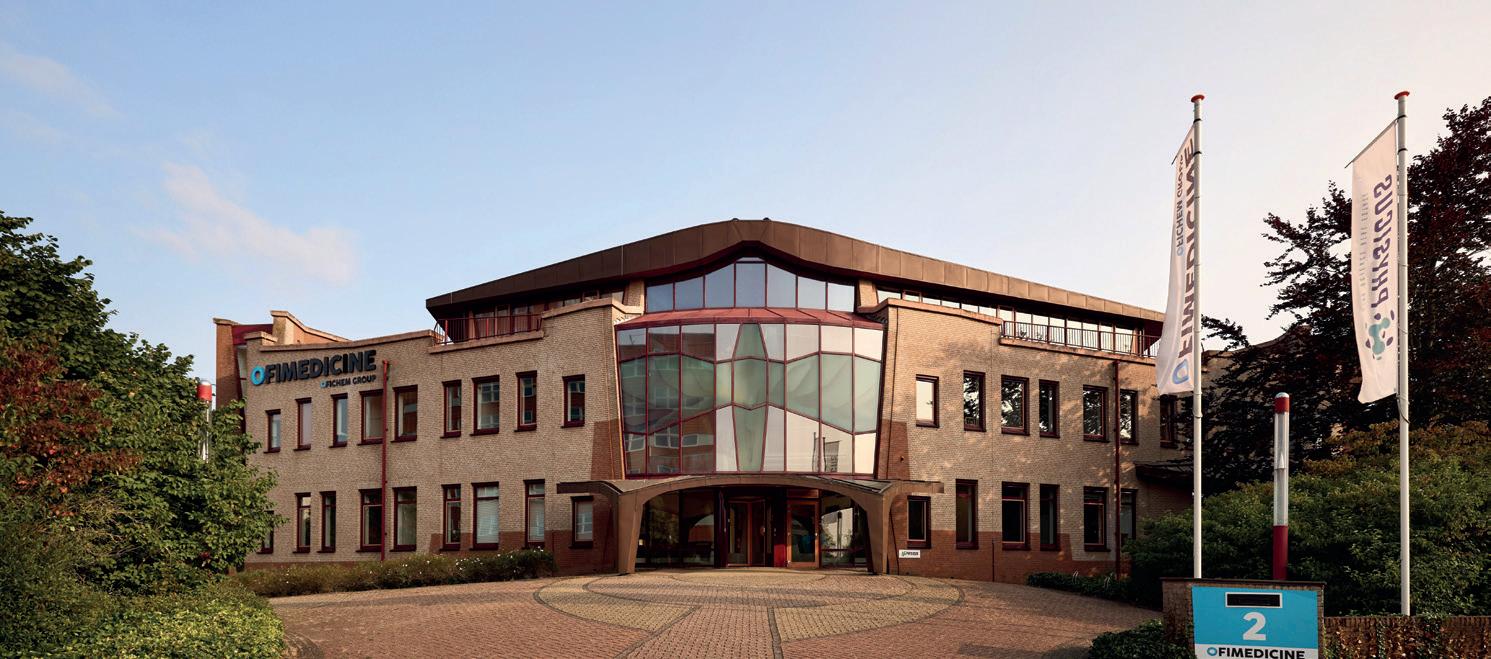
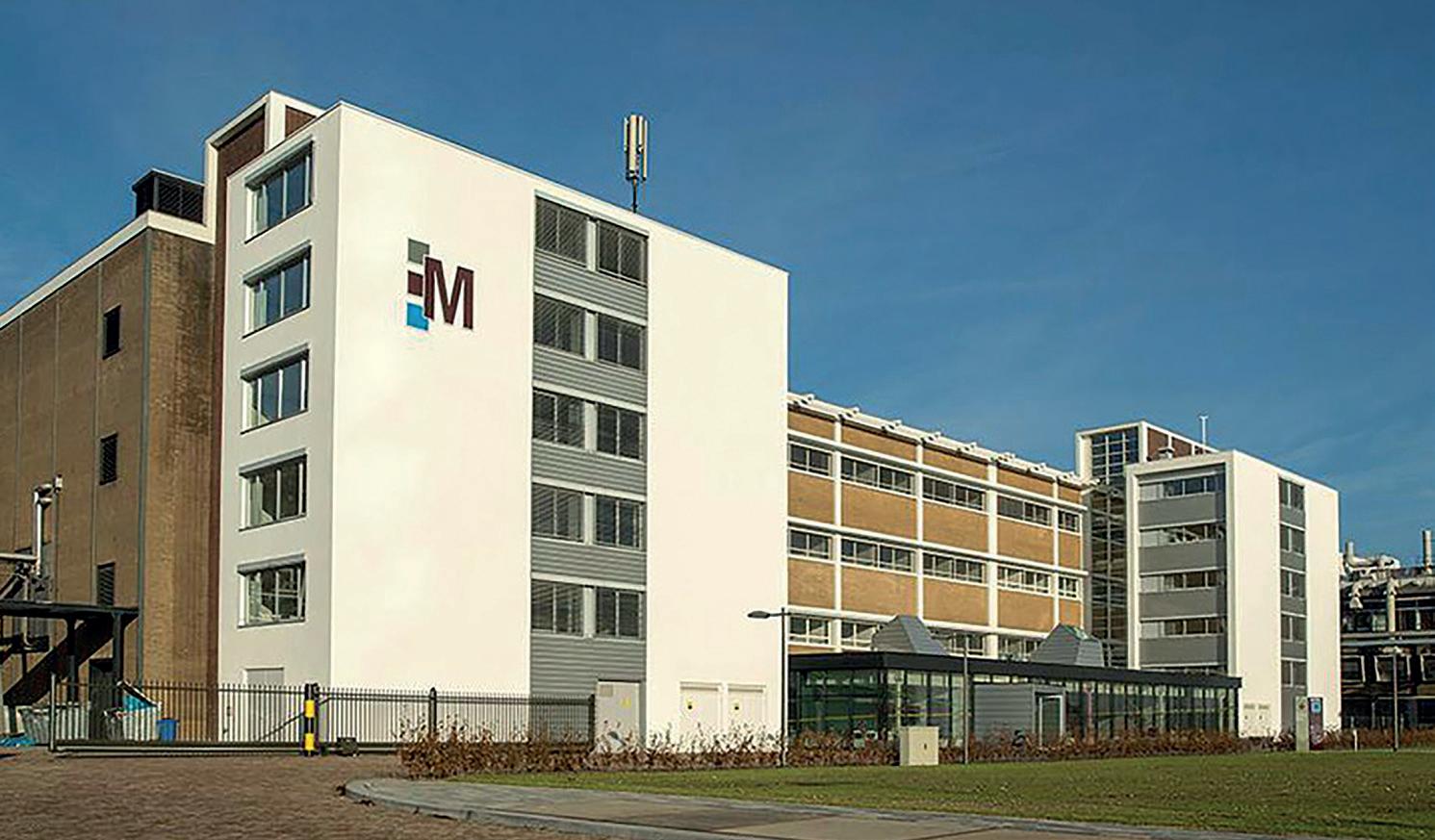
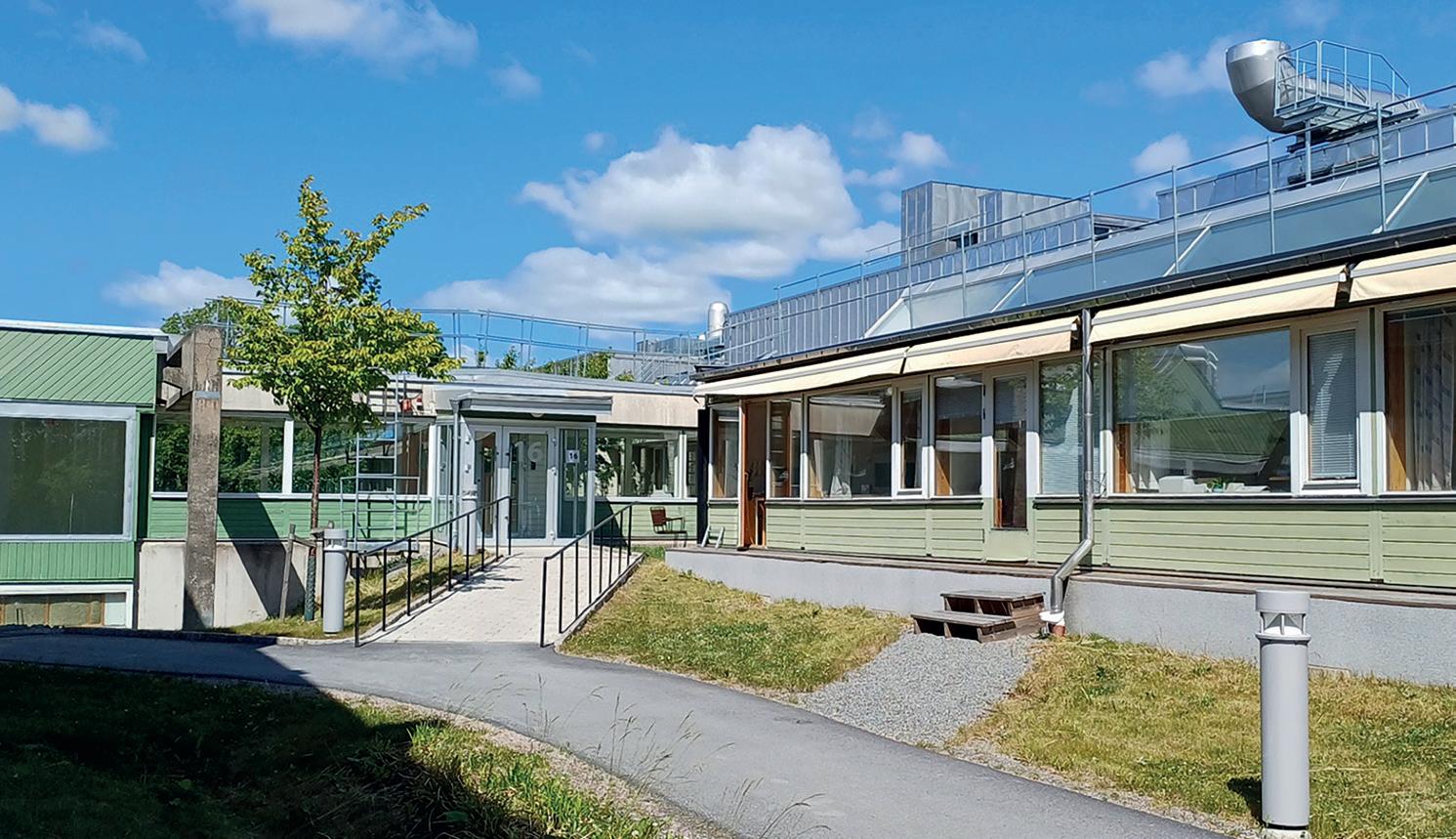
Het pand van InnoGenerics in Leiden (NL) - nu Ofimedicine. The InnoGenerics building in Leiden (NL) - now Ofimedicine.
Het pand Uppsala (SE), eerder van OT Chemistry. The building in Uppsala (SE), previously belonging to OT Chemistry.
Het pand in Nijmegen (NL), eerder van Avivia. The building in Nijmegen (NL), previously belonging to Avivia.
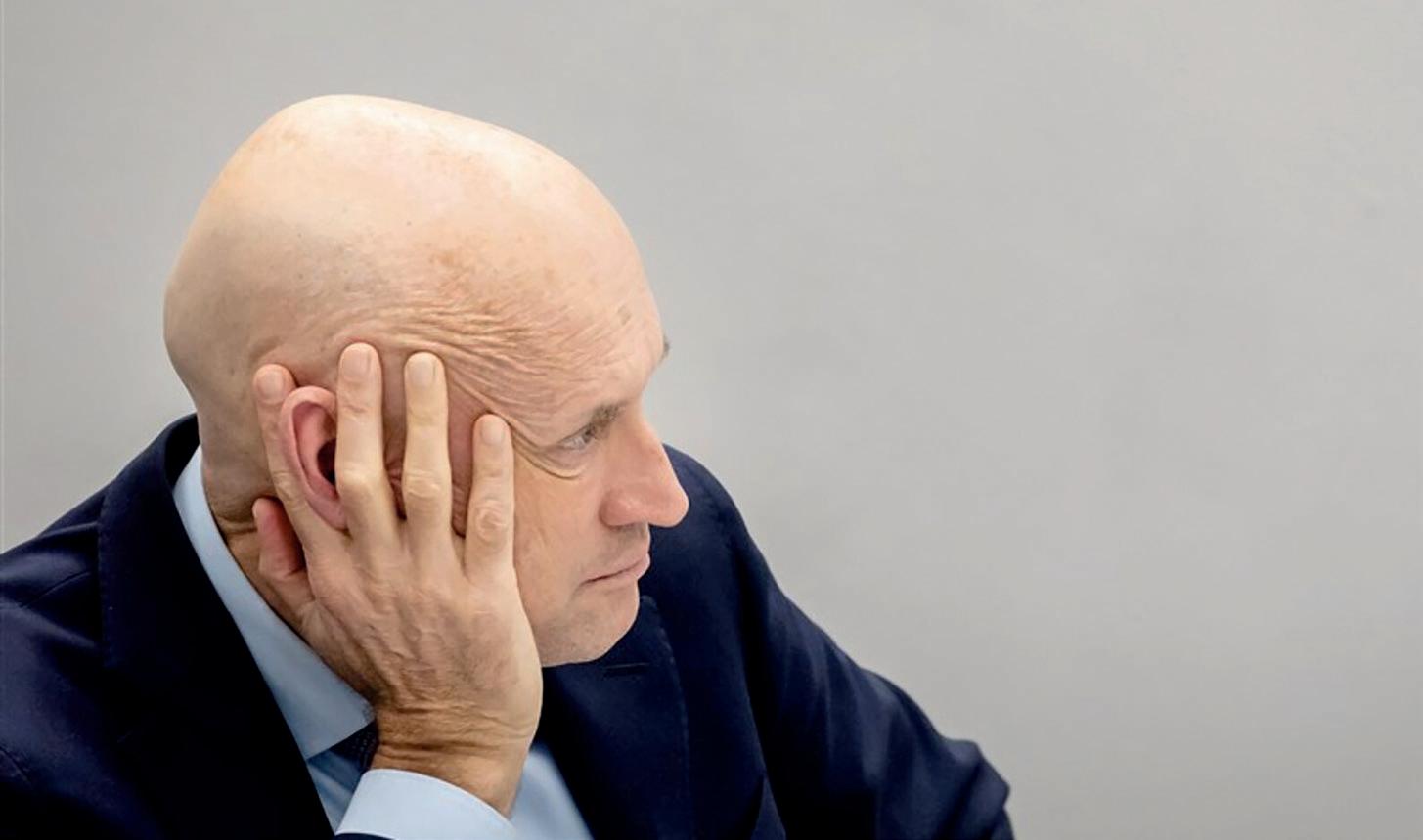
Arjan van Ravenhorst:
“ALLEEN ALS JE JE WERK MET PLEZIER DOET, STA JE GOEDGEMUTST KLAAR VOOR JE KLANTEN”
“ONLY IF YOU ENJOY YOUR WORK, YOU CAN HAPPILY SERVE YOUR CUSTOMERS”
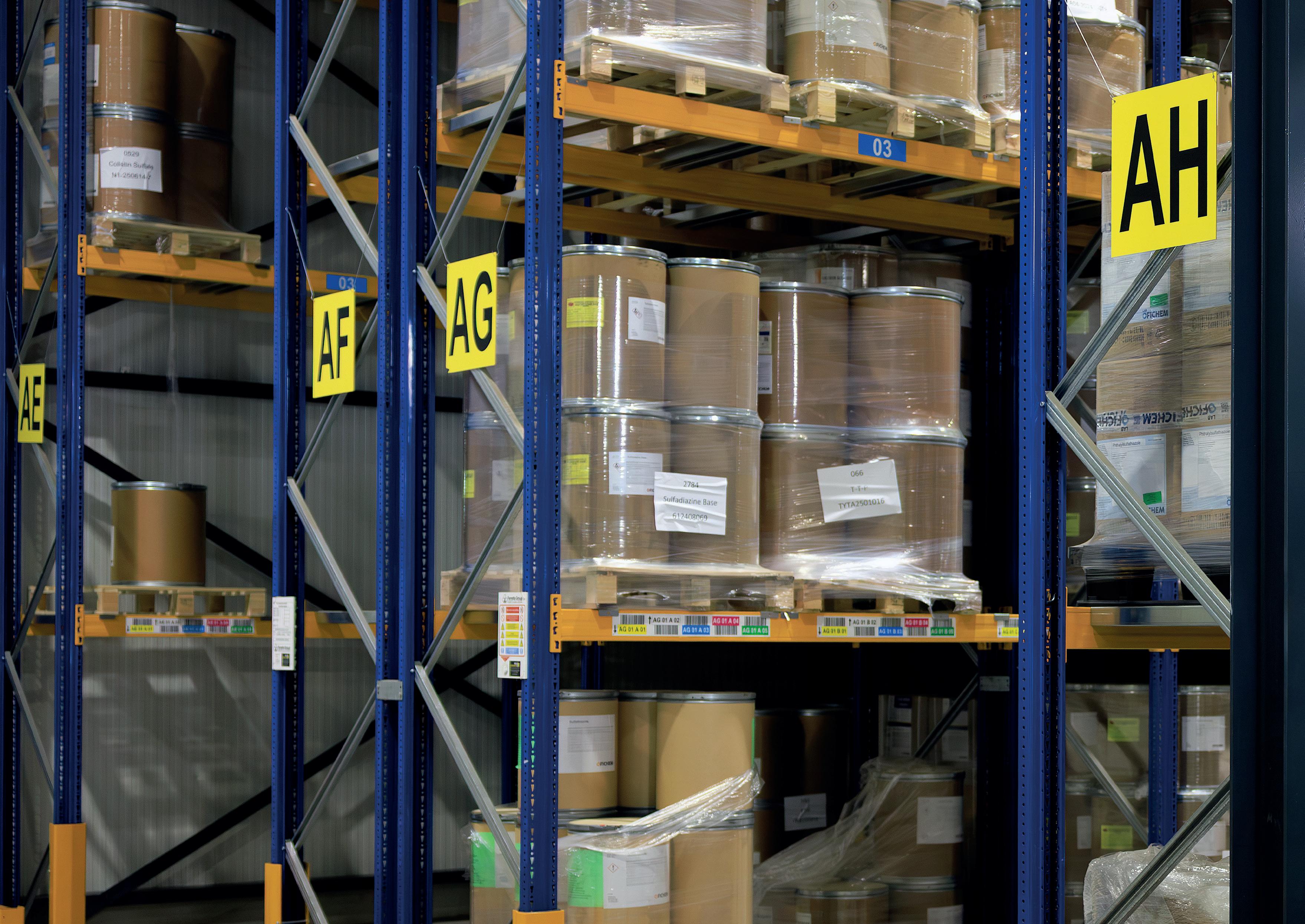
Sinds 2004 is Arjan van Ravenhorst betrokken bij de handelstak van Ofichem. Een kleinschalig, wat ouderwets familiebedrijf, zo typeert de huidige Managing Director de toenmalige onderneming. Inmiddels staat de tweede generatie aan het roer van de Ofichem Group en is het bedrijf uitgegroeid tot een bloeiende internationale onderneming met diverse Business Units.
In 2003 wilde de Brabantse grondstoffendistributeur Orffa, Laboratorium Ofichem overnemen. Een deal kwam er niet. Wel brachten de onderhandelingen Dr. Otto Oldenziel in contact met Arjan van Ravenhorst die destijds Business Unit Manager was van Orffa Pharma.
“Otto wilde een handelstak opzetten en kon daarvoor wel een aantal ‘cowboys uit het Zuiden’ gebruiken die over een goedgevulde portefeuille met visitekaartjes beschikten.
Hij vroeg mij of ik voor hem wilde werken. De handelstak, Ofichem B.V. was daarna een feit”, vertelt Arjan, “met als specialisatie de wereldwijde handel van farmaceutische grondstoffen voor veterinair en humaan gebruik.”
HIJ KON WEL WAT ‘COWBOYS UIT HET ZUIDEN’ GEBRUIKEN
Hart op de tong
Met Otto had Arjan een bijzondere band. “Hij was beslist niet commercieel. Alles wat met commercie te maken had, vond hij maar tijdverspilling. In zekere mate was hij ook onhandig in de sociale omgang, wars van formaliteiten.” Lachend voegt Arjan eraan toe: “We hadden een keer een ontmoeting met een Chinese delegatie. Bij hen draaide alles om beleefdheden en formaliteiten, maar Otto gooide gewoon zijn visitekaartjes over tafel.”
Arjan van Ravenhorst has been involved in the trading division of Ofichem since 2004. A smallscale, somewhat old-fashioned family business, is how the current Managing Director describes the company at the time. The second generation is now at the helm of the Ofichem Group, and the company has grown into a thriving international enterprise with various Business Units.
In 2003, the Brabant-based raw materials distributor Orffa wanted to acquire Lab Ofichem. A deal never materialized. However, the negotiations brought Dr. Otto Oldenziel into contact with Arjan van Ravenhorst, who was then Business Unit Manager at Orffa Pharma.
“Otto wanted to set up a trading division and could use a few ‘cowboys from the South’ with a well-stocked portfolio of business cards.
He asked me if I wanted to work for him. The trading division, Ofichem B.V., was then established,” says Arjan, “specializing in the global trade of pharmaceutical raw materials for veterinary and human use.”
HE COULD USE A FEW ‘COWBOYS FROM THE SOUTH’
Heart on his sleeve
Arjan had a special bond with Otto. “He was definitely not commercial. He considered anything that had to do with commerce a waste of time. To a certain extent, he was also awkward socially, averse to formalities.” Arjan adds with a laugh: “We once met with a Chinese delegation. They were all about politeness and formality, but simply threw his business cards on the table.”
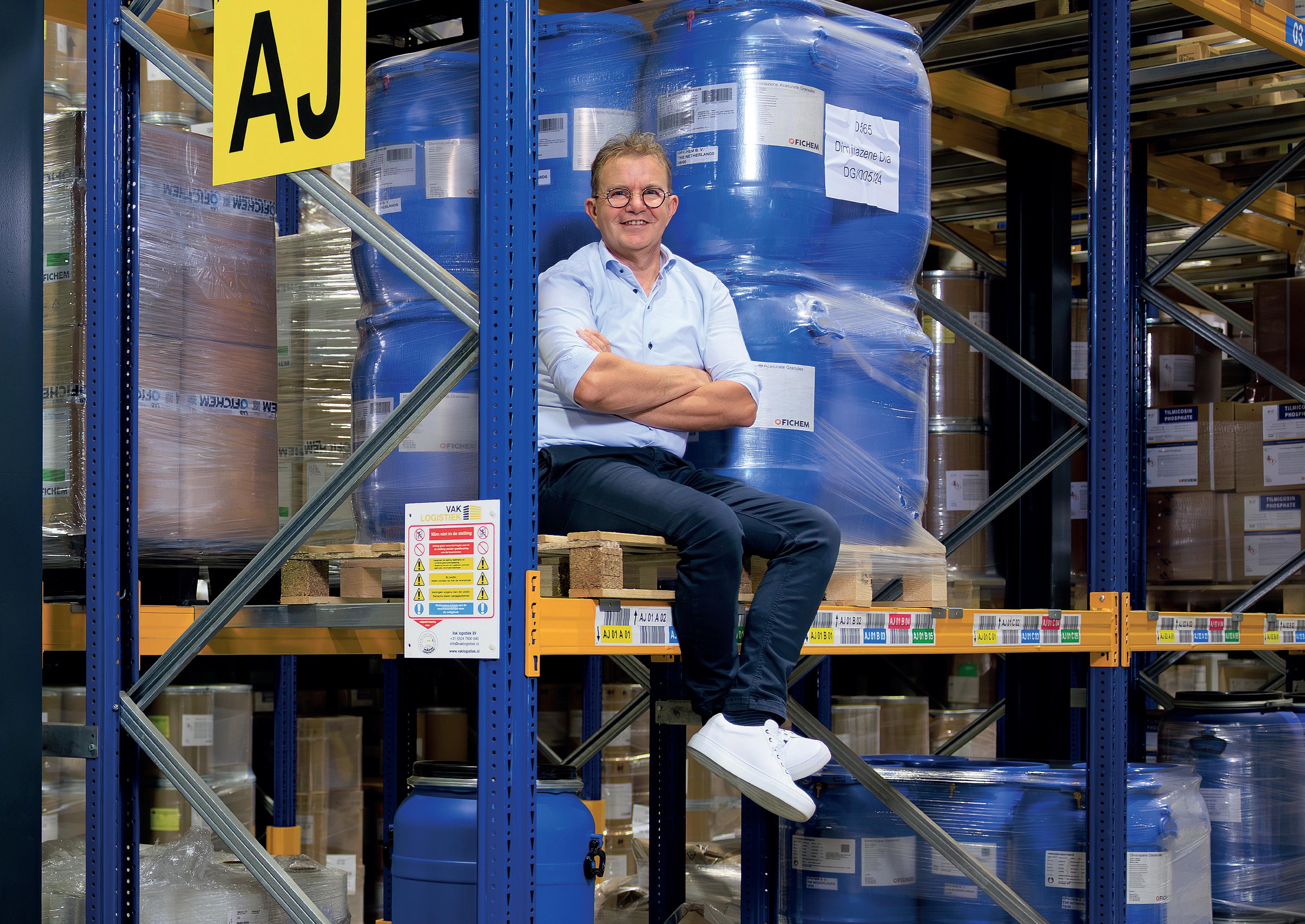
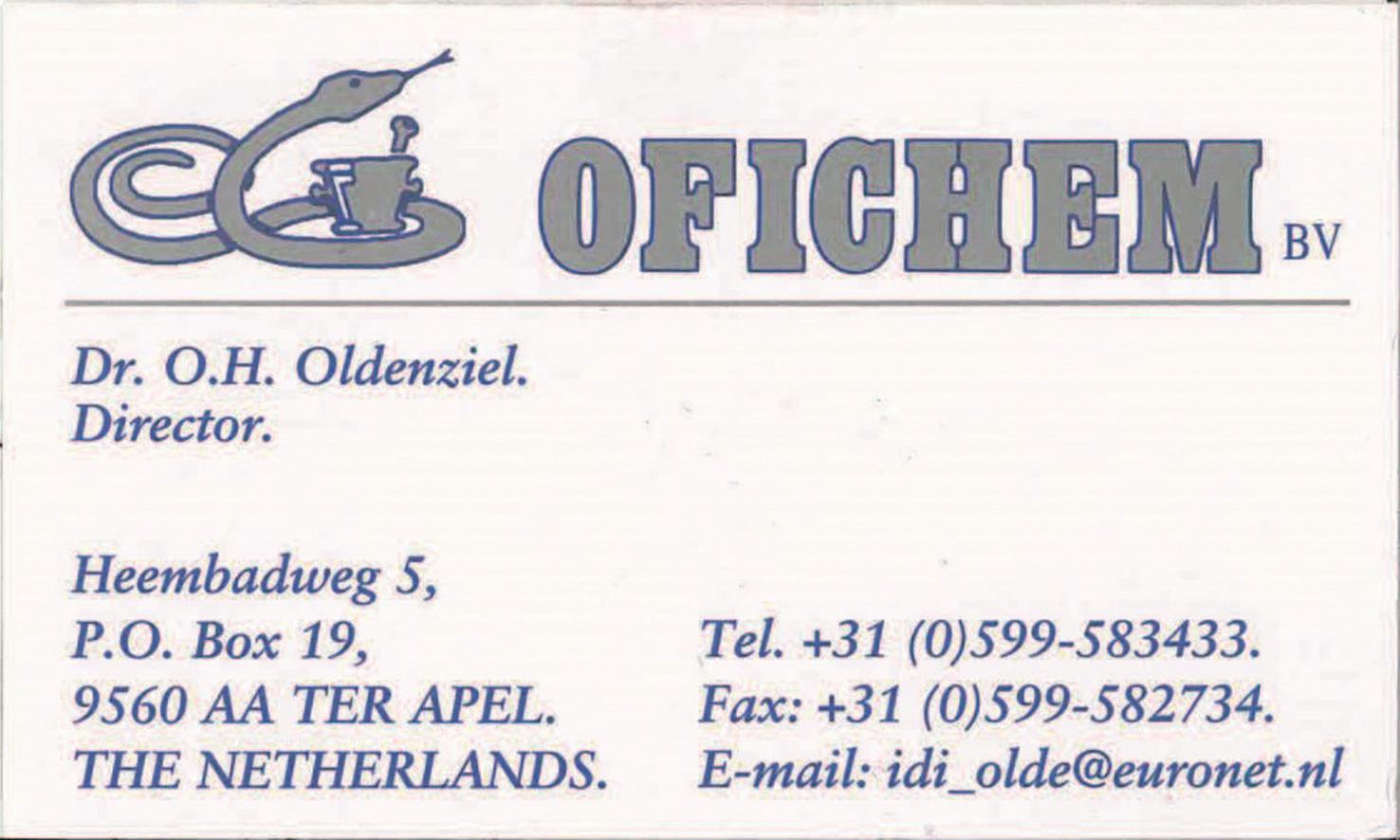
“Anderzijds heb ik Otto ook leren kennen als een slim en heel mooi mens. Hij droeg het hart op de tong en kon tegelijk hard en zacht zijn. Voor zijn medewerkers ging hij door het vuur.”
Flair
Er werd hard gewerkt door de héle familie. Om dat te illustreren haalt Arjan de internationale beurzen aan waar Ofichem exposeerde. “Otto’s vrouw, Ina, ging ook altijd met ons mee en trad op als gastvrouw. Dat deed ze met veel flair. Haar aanwezigheid en de Drentse droge worst bevestigden het beeld van een familiebedrijf en dat wekte een gevoel van thuiskomen op bij onze klanten.”
Zoon Weite kwam later in beeld. Vlak voor het overlijden van zijn vader in december 2006 was hij juist begonnen met de kwaliteitszorg binnen Ofichem.
“On the other hand, I also got to know Otto as a smart and very nice person. He wore his heart on his sleeve and could be both tough and gentle. He would go through fire for his employees.”
Flair
The whole family worked hard. To illustrate this, Arjan cites the international trade fairs where Ofichem exhibited. “Otto’s wife, Ina, always joined us and acted as hostess. She did this with great flair. Her presence and the local dried sausage from Drenthe confirmed the image of a family business, and that created a feeling of coming home for our customers.”
Son Weite came into the picture later. Just before his father’s death in December 2006, he had just started working on quality assurance at Ofichem.
Door de plotselinge dood van Otto kreeg Weite ineens de complete bedrijfsvoering in handen.
Passie
“Weite kijkt met een duidelijke visie naar de toekomst van de Ofichem Group en maakt grote stappen om deze werkelijkheid te laten worden”, zegt Arjan. “Waar Otto alles altijd zoveel mogelijk in eigen hand wilde houden, kan Weite goed delegeren. Hij heeft mensen om zich heen verzameld die met passie hun werk doen en oprecht betrokken zijn bij het succes van het bedrijf.”
DE NADRUK LIGT
OP PLEZIER HEBBEN. DAT VINDEN WE HIER ERG BELANGRIJK.
Omdat de handelstak van Ofichem onder Arjans leiding goed liep, focuste Weite zich op de productie in een andere Business Unit van de groep. Er vond een duidelijke professionaliseringsslag plaats.
Trots
Arjan is er trots op hoe zijn Business Unit de markt bedient vanuit internationale kantoren, met een hypermodern voorraadmanagement in Ter Apel en op maat gemaakte software die de collega’s, leveranciers en klanten wereldwijd met elkaar verbindt.
Otto’s sudden death suddenly put Weite in charge of the entire operational management.
Passion
“Weite has a clear vision for the future of the Ofichem Group and is making great strides to make it a reality,” says Arjan. “While Otto always wanted to keep everything in-house as much as possible, Weite is adept at delegating. He has gathered people around him who are passionate about their work and genuinely committed to the company’s success.”
Because Ofichem’s trading division was performing well under Arjan’s leadership, Weite focused on production in another Business Unit within the group. A significant professionalization drive took place.
THE EMPHASIS LIES ON HAVING FUN. WE BELIEVE THAT IS VERY IMPORTANT HERE.
Pride
Arjan is proud of how his Business Unit serves the market from international offices, with state-of-the-art inventory management in Ter Apel and customized software that connects colleagues, suppliers, and customers worldwide.
Arjan: “Door een optimale balans tussen onze internationale activiteiten en de ondersteuning vanuit de groep, is het ‘wat ouderwets bedrijf’ doorgegroeid tot een bepalende speler op de API-markt.”
Innovatieve APIs
Belangrijke mijlpalen binnen de Ofichem Group noemt Arjan de toekenning van het Good Manufacturing Practice-certificaat in 2010, het winnen van de Groninger Ondernemingsprijs in 2012 en de inspectie van de Food en Drugs Administration (FDA) in 2015 die met goed gevolg werd afgelegd, waardoor de Amerikaanse markt open kwam te liggen. “De productie van nieuwe, meer innovatieve, API’s nam toen een enorme vlucht”, aldus Arjan.
Plezier
“Om onze levensvatbaarheid te versterken, er leven per slot van rekening 180 gezinnen van Ofichem,” benadrukt Arjan, “heeft de groep diverse bedrijven overgenomen en richten we ons meer op Research & Development en op het volledig kunnen bedienen van de hele farmaceutische keten.”
Arjan: “By optimally balancing our international activities with the support of the group, this somewhat old-fashioned company has grown into a key player in the API market.”
Innovative APIs
Arjan cites important milestones within the Ofichem Group as being awarded the Good Manufacturing Practice certificate in 2010, winning the Groningen Business Award in 2012, and successfully completing the Food and Drug Administration (FDA) inspection in 2015, which opened up the American market. “The production of new, more innovative APIs then skyrocketed,” says Arjan.
Enjoyment
“To strengthen our viability – after all, 180 families rely on Ofichem,” Arjan emphasizes, “the Group has acquired several companies and is focusing more on Research & Development and on fully serving the entire pharmaceutical supply chain.”
Volgens hem zijn zakelijkheid, nuchterheid, gedrevenheid en hard werken kernwoorden binnen Ofichem. “Maar de nadruk ligt op plezier hebben. Dat vinden we hier erg belangrijk, want alleen als je je werk met plezier doet, sta je goedgemutst klaar voor je klanten,” zegt Arjan beslist.
According to him, business acumen, common sense, drive, and hard work are key values within Ofichem. “But the emphasis lies on having fun. We believe that is very important here, because only if you enjoy your work, you can happily serve your customers,” says Arjan decisively.
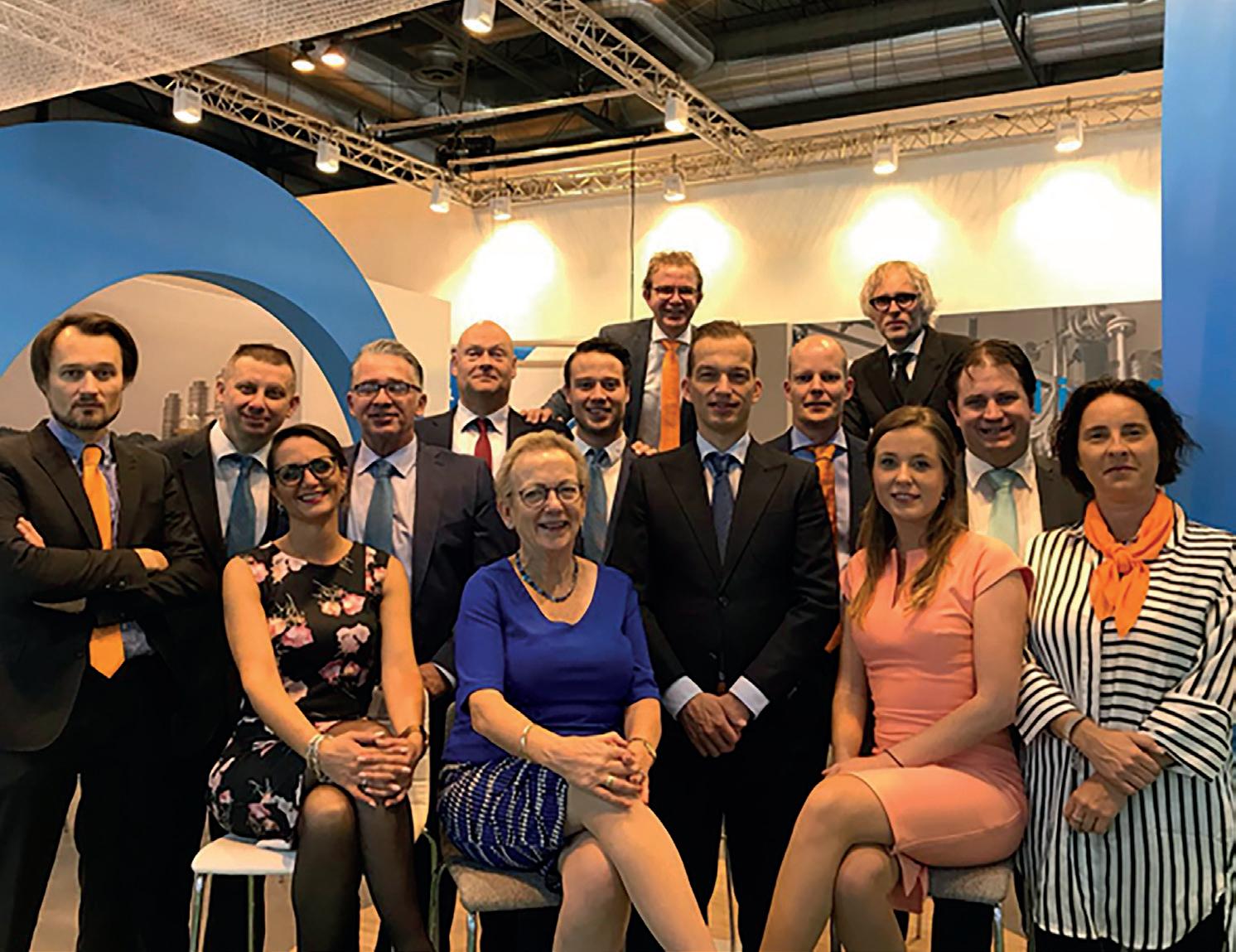
Ofichem bij CPHI in Madrid (2018) / Ofichem at CPHI in Madrid (2018).
PRIJZENKAST VAN OFICHEM
OFICHEM’S TROPHY CABINET
De afgelopen jaren viel Ofichem een aantal keren in de prijzen. Daar zijn we uiteraard beretrots op. Elke prijs is immers een bekroning van ons werk en de toewijding van onze teams binnen de groep. Welke prijzen dat waren? Je leest het hier.
De Groninger Ondernemingsprijs
In 2012 wonnen we de Groninger Ondernemingsprijs, dé prijs voor het meest toonaangevende bedrijf in Stad en/of Ommeland. De stichting achter de prijs wil meer bekendheid geven aan bijzonder ondernemerschap in de provincie Groningen. De jury was unaniem in haar keuze en roemde de duidelijke visie op het ondernemerschap, het moderne personeelsbeleid en de goed doordachte bedrijfsstructuur van Ofichem.
“De prijs heeft veel voor ons bedrijf betekend, want we kwamen toen uit een moeilijke periode. We zetten toen alles op alles om de boel weer op orde te krijgen. Om dan na die periode zo’n prijs te mogen ontvangen, voelde als een enorme beloning voor al het harde werk van iedereen bij Ofichem,” aldus CEO Dr. Weite Oldenziel.
In recent years, Ofichem has won several awards. We are, of course, incredibly proud of this. After all, each award is a recognition of our work and the dedication of our teams within the group. Which awards were they? You can read about them here.
The Groningen Business Award
In 2012, we won the Groningen Business Award, the prize for the most prominent company in the city and/or the surrounding area. The foundation behind the award aims to raise awareness of exceptional entrepreneurship in the province of Groningen. The jury was unanimous in its choice, praising Ofichem’s clear vision of entrepreneurship, modern HR policy, and well-thoughtout corporate structure.
“The award meant a lot to our company, as we were emerging from a difficult period. We did everything we could to get things back on track. Receiving such an award after that period felt like a tremendous reward for all the hard work of everyone at Ofichem. right after that rough period,” says CEO Dr. Weite Oldenziel.
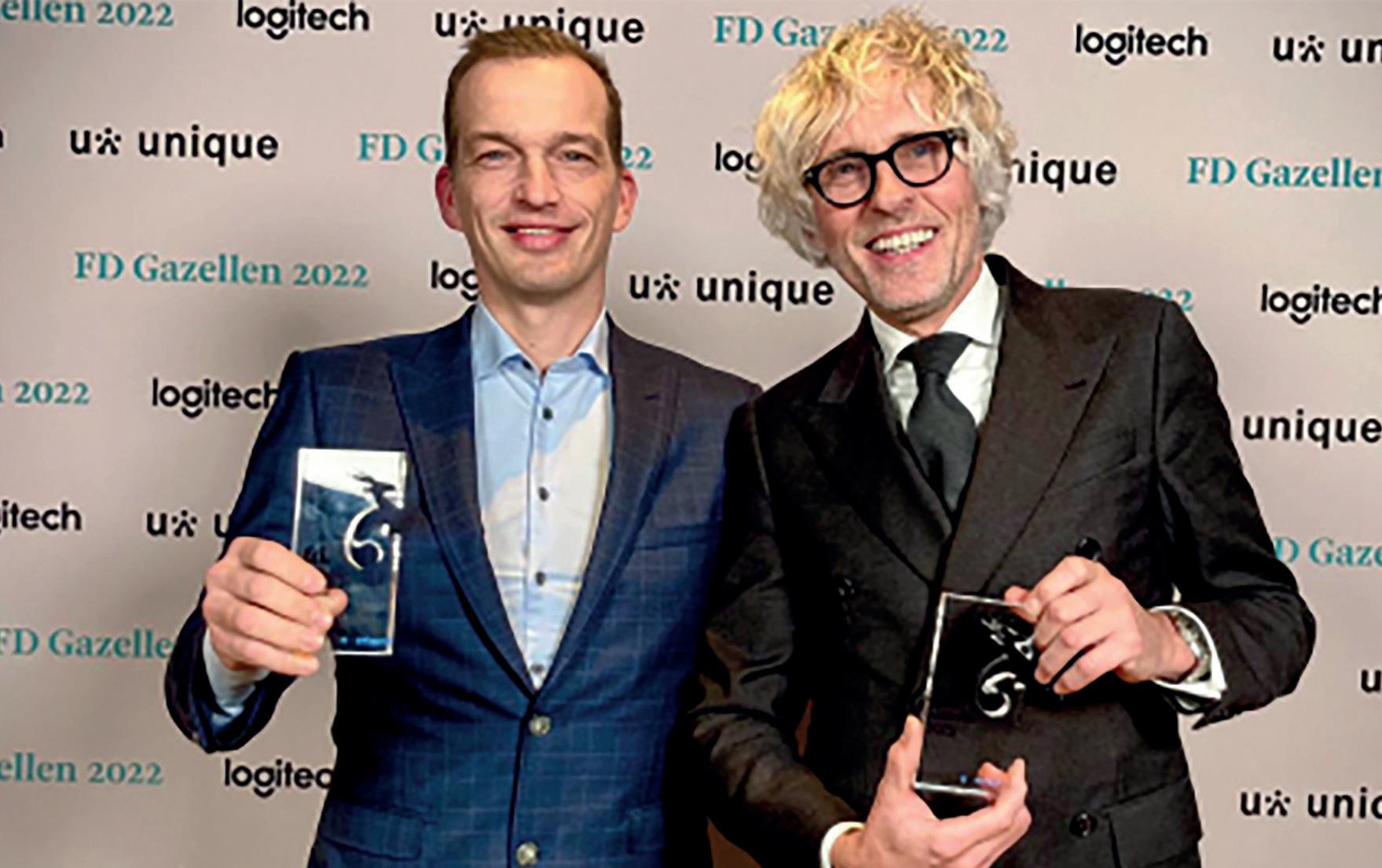
3x FD Gazellen
Ofipharma heeft maar liefst drie keer op rij een prijs mogen ontvangen. Het ging om FD Gazellen Awards van het Financieele Dagblad (FD). Die worden jaarlijks uitgereikt aan de snelst groeiende bedrijven in Nederland. Als criterium geldt dat je minimaal 20% moet groeien over een periode van drie jaar.
In 2022 wonnen we een Gazelle in de categorie ‘kleine bedrijven’ en in 2023 en 2024 in de categorie ‘middelgrote bedrijven’. Volgens het FD laten winnaars zien dat ze niet alleen financieel gezond zijn, maar ook een duidelijke visie en strategie hebben.
3x FD Gazelles
Ofipharma has received an award no fewer than three times in a row. These were the FD Gazelle Awards from the Financial Times (FD). These awards are presented annually to the fastest-growing companies in the Netherlands. The criterion is a minimum growth of 20% over a three-year period.
In 2022, we won a Gazelle in the ‘small businesses’ category and in 2023 and 2024 in the ‘medium-sized businesses’ category. According to the FD, winners demonstrate not only financial health but also a clear vision and strategy.
Weite Oldenziel en Jeroen Gordijn ontvangen de FD Gazellen (2022) Weite Oldenziel and Jeroen Gordijn receive the FD Gazellen (2022)
Drie genomineerden
Ondernemingsprijs
Groningen De genomineerden voor de Groninger Ondernemingsprijszijn gistermiddag bekend gemaakt. Uit de 31 inzendingen zijn drie bedrijven geselecteerd: De Haan Special Equipment uit Stadskanaal, gespecialiseerd in staaldraadeindverbindingen en katrollen, Molendrift (een instelling voor geestelijke gezondheidszorg uit Groningen) en Ofichem uit Ter Apel (farmaceutische ingrediënten voor mens en dier). De jury zal op 27 september de winnaar bekend maken tijdens een interactieve show in Martiniplaza. De Groninger Ondernemingsprijs werd vorig jaar gewonnen door Bollegraaf Recycling Machinery in Appingedam.
>
Dagblad van het Noorden, 4 september 2012
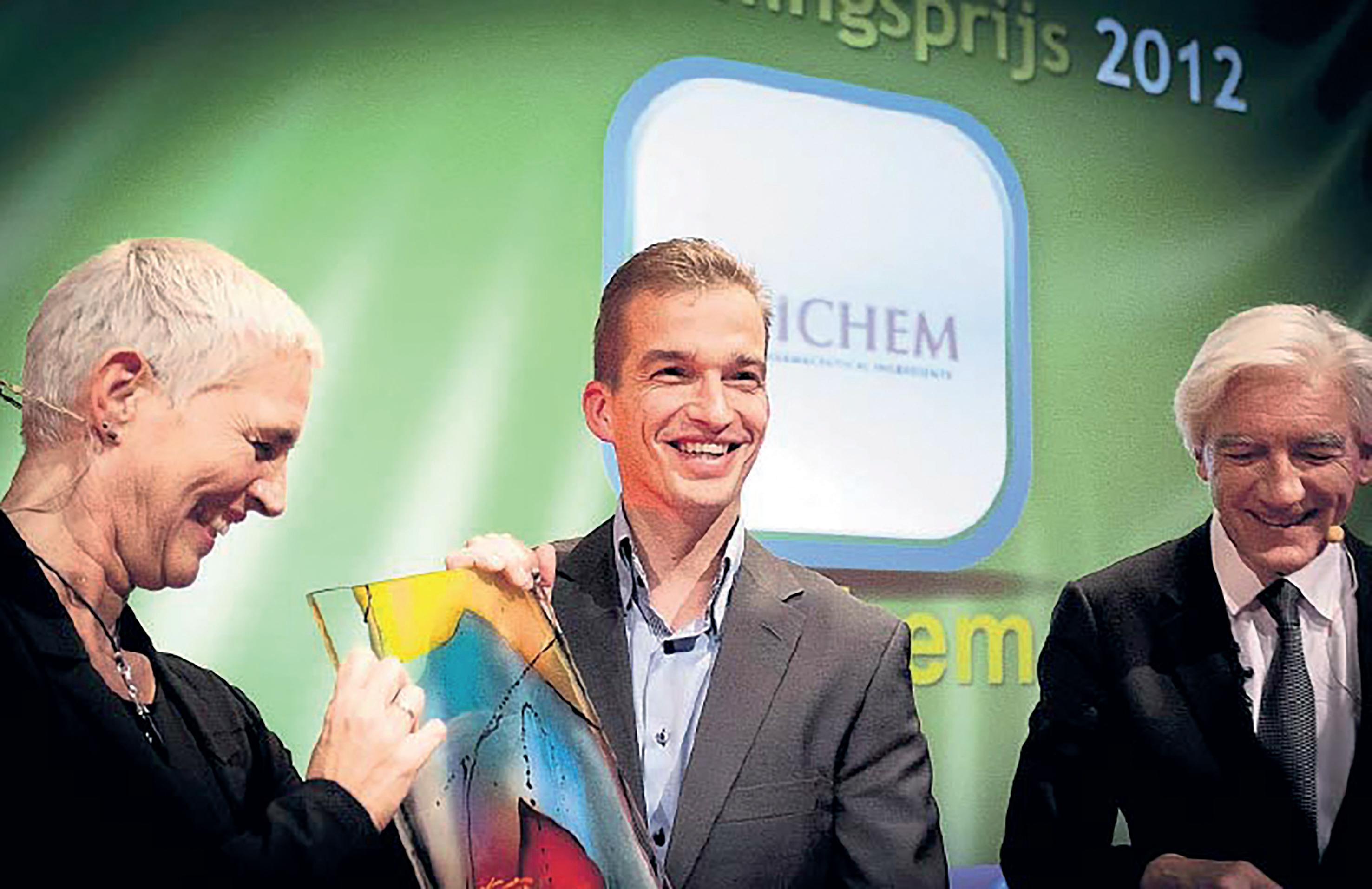
Groningse Ondernemingsprijs 2012 naar Ofichem
Dagblad van het Noorden, 28 september 2012 >
Groningen Medicijngrondstoffenfabrikant Ofichem uit Ter Apel is winnaar van de Groningse Ondernemingsprijs 2012. Directeur Weite Oldenziel kreeg die titel gisteravond uitgereikt door commissaris van de Koningin Max van den Berg (rechts) tijdens de drukbezochte finale in Martiniplaza. Ofichem onderscheidt zich volgens de jury als een ’solide bedrijf’ dat ’zich inleeft in de klanten’ en ’durft in te spelen op kansen van innovaties’, met een ’duidelijke visie op ondernemerschap’, ’een goed doordachte bedrijfsstructuur’ en ’een modern personeelsbeleid’. Daarmee bleef het Ter Apeler bedrijf de twee andere genomineerden voor: de psychiatrische jeugdzorginstellingMolendrift uit Groningen en De Haan Special Equipment, fabrikant van hijsblokken en staaldraadeindverbindingen in Stadskanaal. Foto: Jan Willem van Vliet
BIJZONDERE ONTMOETINGEN
EXTRAORDINARY ENCOUNTERS
In de afgelopen 50 jaar zijn er ook diverse bijzondere bezoeken en ontmoetingen geweest. Hoewel we niet alles konden terughalen, zijn er een aantal die ons zeker zijn bijgebleven.
Bezoek van premier Rutte
Op woensdag 1 juni 2016 bezocht premier Mark Rutte ons op de Zernike Campus in Groningen; enkele jaren hadden wij hier ons R&D lab. Zijn bezoek was onderdeel van een innovatietour door Groningen en Drenthe. Aan het einde van zijn tour door het Noorden vertelde een enthousiaste Rutte: “Ik vind het echt waanzinnig. Deze regio is booming!”. Mooie complimenten voor onze regio!
Bezoek van burgemeester Velema
Op vrijdag 24 september 2021 werden de nieuwe R&D faciliteiten en laboratoria van Lab Ofichem officieel geopend in Ter Apel. Burgemeester Jaap Velema van de gemeente Westerwolde opende de nieuwe bedrijfsruimte ceremonieel met het doorknippen van een lint. Hierbij was al ons personeel aanwezig, evenals de mensen en bedrijven die bijgedragen hebben aan de realisatie van deze nieuwe faciliteit.
Over the past 50 years, we have also had several special visits and encounters. Although we couldn’t recall everything, there are a few that have definitely stuck with us.
Prime Minister Rutte’s
Visit
On Wednesday, June 1, 2016, Prime Minister Mark Rutte visited us at the Zernike Campus in Groningen; for a few years, this was the location of our R&D lab. He did this as part of an innovation tour through Groningen and Drenthe. At the end of his tour of the North, an enthusiastic Rutte said: “I think it is absolutely fantastic. This region is booming!” A wonderful compliment to our region!
Mayor Velema’s Visit
On Friday, September 24, 2021, Lab Ofichem’s new R&D facilities and laboratories were officially opened in Ter Apel. Mayor Jaap Velema of the municipality of Westerwolde officially opened the new business premises with a ribbon cutting ceremony. All our staff were present, as were the people and companies who contributed to the realization of this new facility.
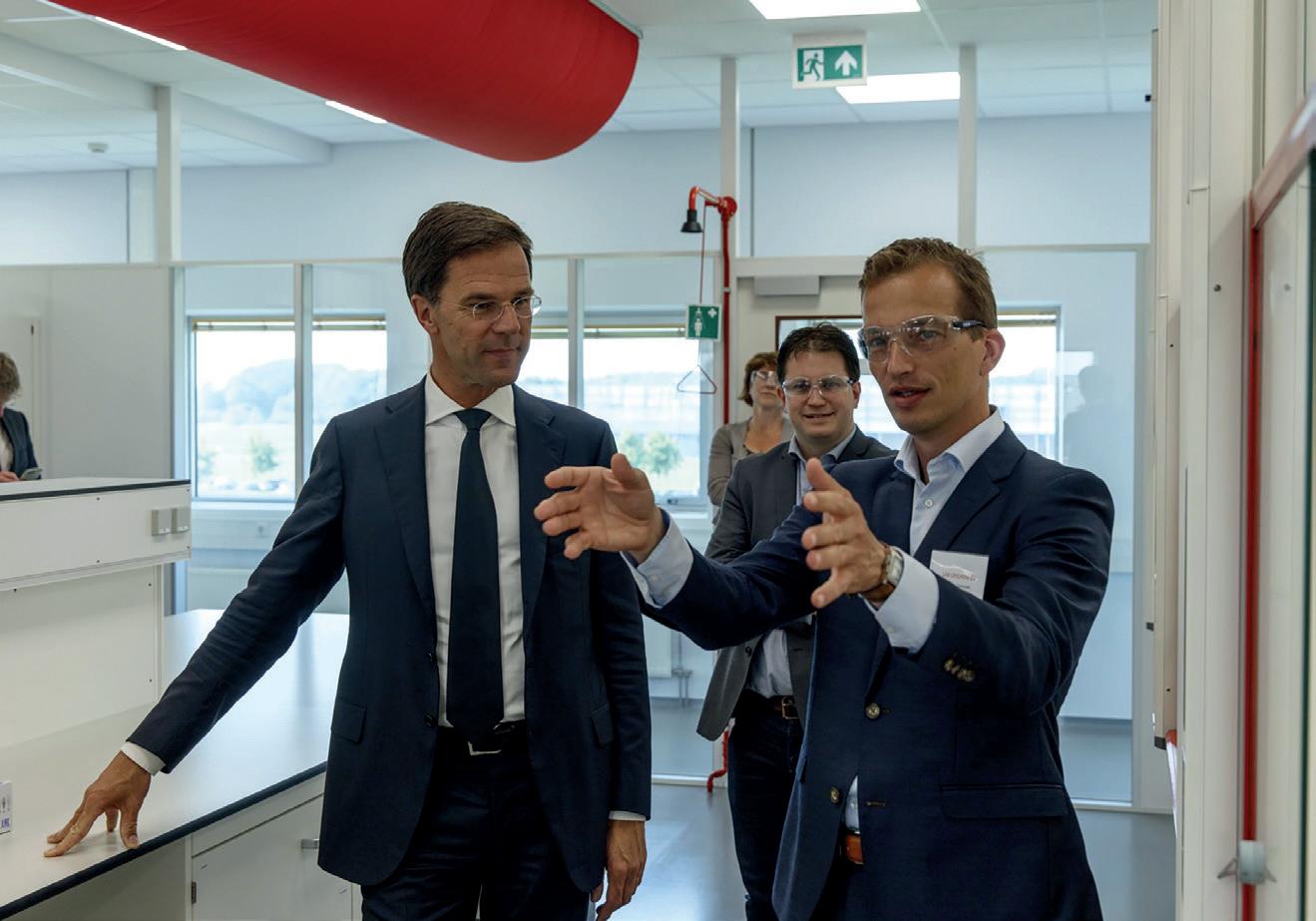
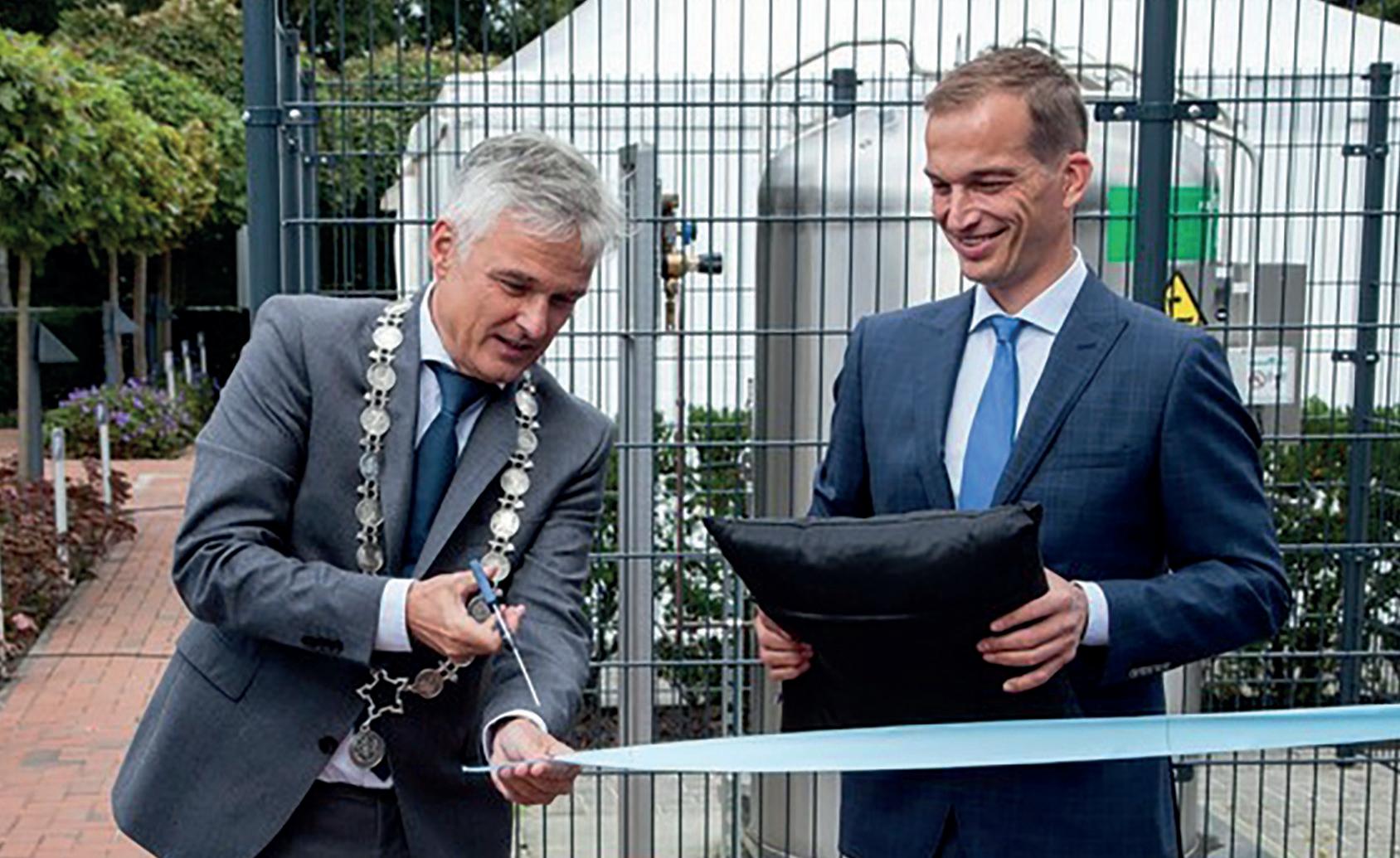
Premier Rutte op bezoek bij het R&D Lab (2016). Foto: Erik van Echten.
Burgemeester Velema opent de nieuwe R&D faciliteiten/labs. Foto: Geert Smit.
Prime Minister Rutte visits the R&D Lab (2016). Photo: Erik van Echten.
Mayor Velema opens the new R&D facilities/labs. Photo: Geert Smit.
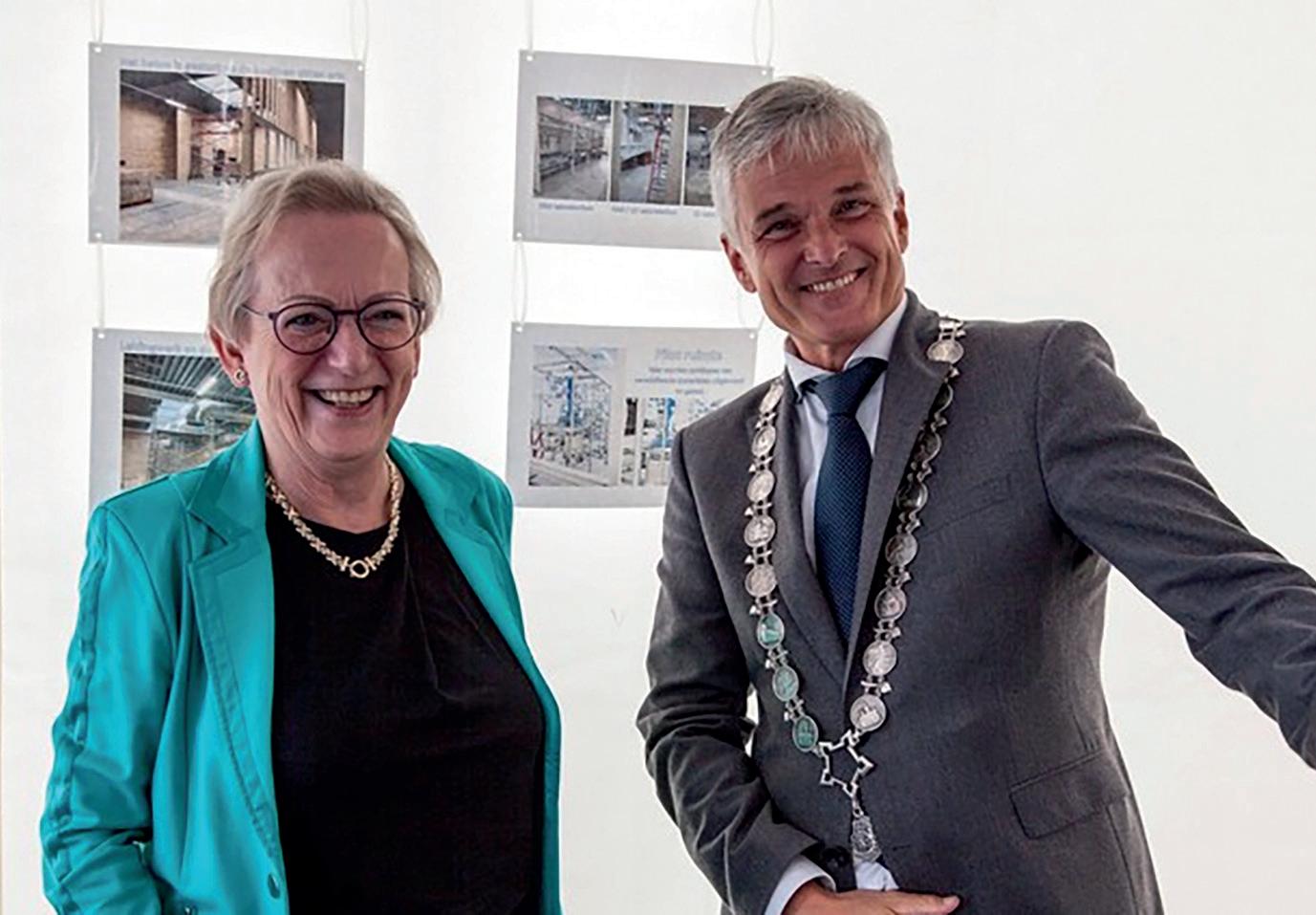
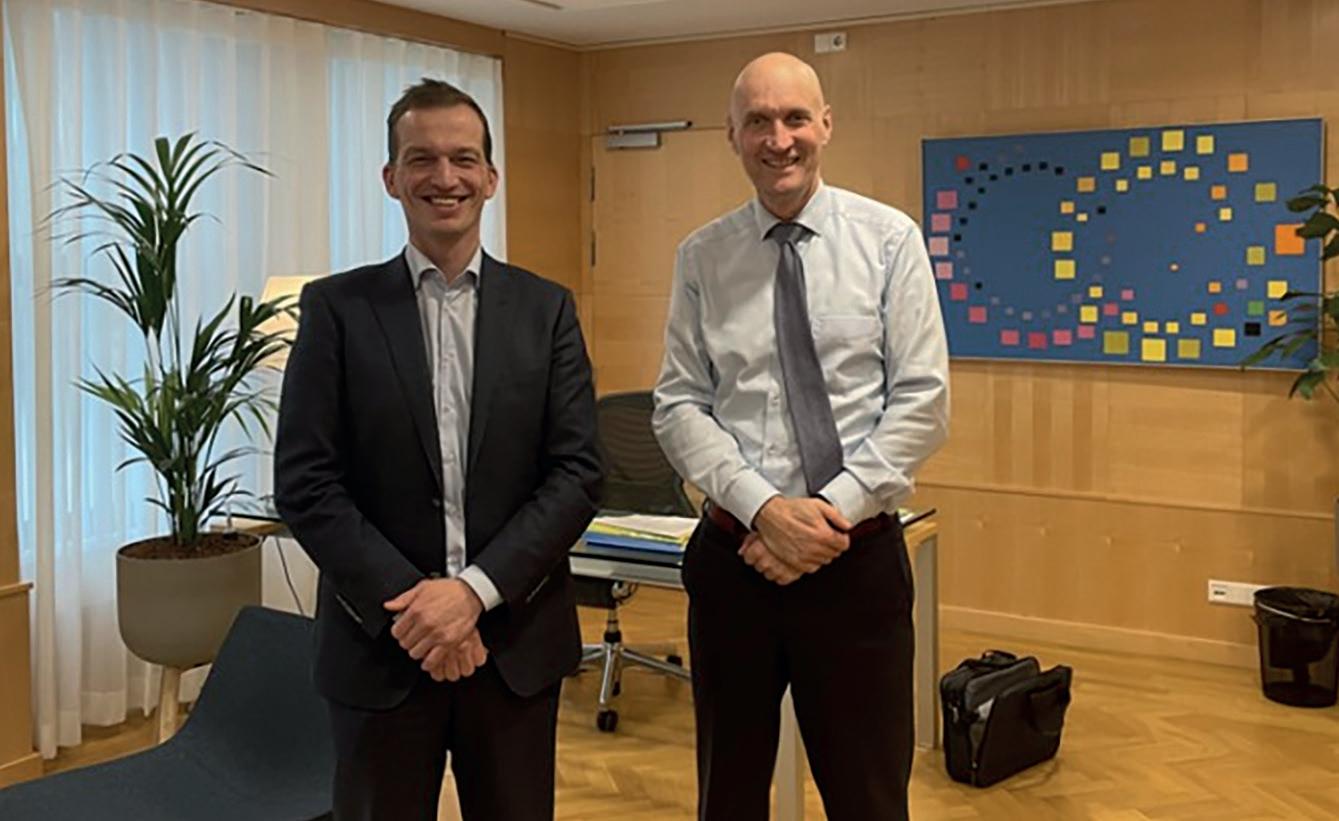
Bezoek aan minister Kuipers
Op uitnodiging van het Ministerie van VWS was onze CEO, Dr. Weite Oldenziel, in 2023 op bezoek bij minister Kuipers in Den Haag. Het was een goed gesprek over de beschikbaarheid van medicijnen in Nederland.
BIO International Convention
In juni 2023 organiseerde de RVO een handelsmissie naar Boston (VS). Vanuit het kabinet waren o.a. minister Adriaansens (Economische zaken en Klimaat) en minister Kuipers (Volksgezondheid, Welzijn en Sport) aanwezig. Als je heel goed zoekt, zul je ook Weite op de foto vinden.
Visit with Minister Kuipers
At the invitation of the Ministry of Health, Welfare and Sport, our CEO, Dr. Weite Oldenziel, visited Minister Kuipers in The Hague in 2023. It was a valuable conversation about the availability of medicines in the Netherlands.
BIO International Convention
In June 2023, the Netherlands Enterprise Agency (RVO) organized a trade mission to Boston, USA. Representatives from the cabinet, including Minister Adriaansens (Economic Affairs and Climate Policy) and Minister Kuipers (Health, Welfare and Sport), were present. If you look very closely, you will also find Weite in the photo.
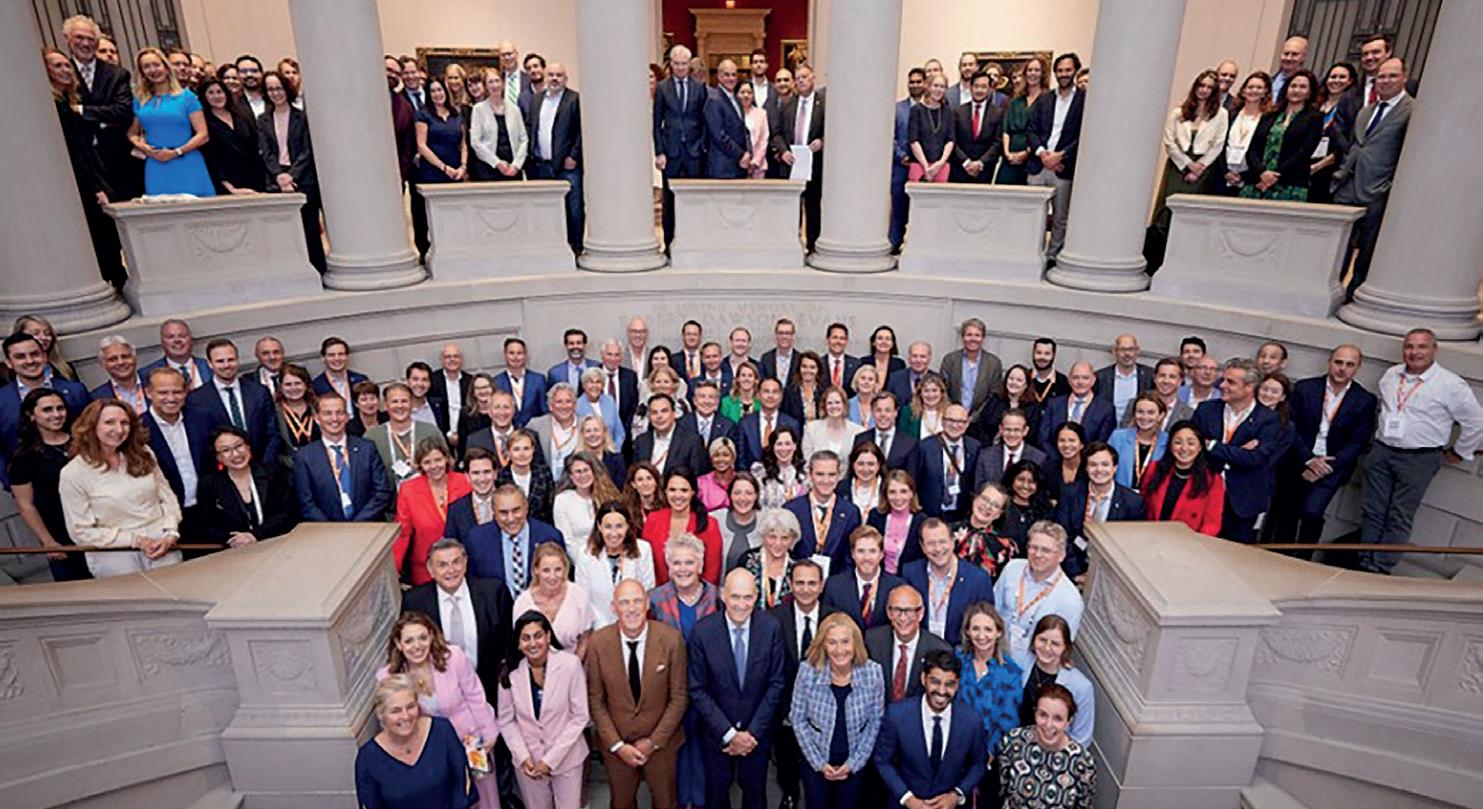
Ina Oldenziel en Burgemeester Velema bij de opening (2021). Foto: Geert Smit.
Weite en minister Kuipers in Den Haag (2023)
BIO International Convention, Boston (2023)
Ina Oldenziel and Mayor Velema at the opening (2021). Photo: Geert Smit.
Weite and Minister Kuipers in The Hague (2023)
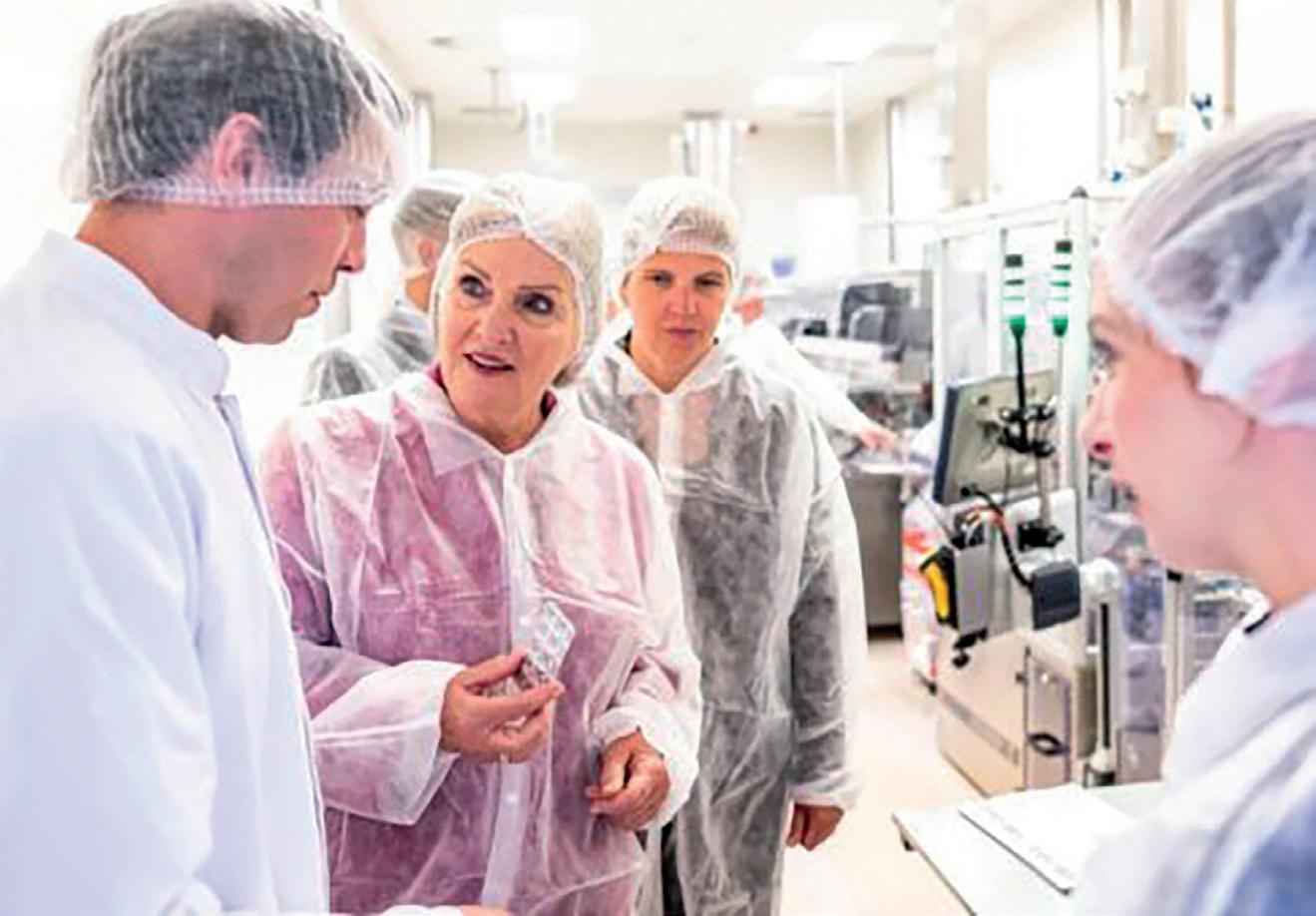

Naast de rondleiding werd er ook gesproken over het geneesmiddelentekort.
In addition to the tour, the medicine shortage was
Bezoek van minister Dijkstra
Op vrijdag 24 mei 2024 bracht minister Pia Dijkstra, minister van Medische Zorg, een bezoek aan Ofimedicine in Leiden. Wederom was het een bezoek in het kader van geneesmiddelentekorten. Wij ervoeren haar bezoek als een belangrijke stap in de richting van een duurzame oplossing voor deze steeds groter wordende kwestie.
Na haar bezoek schreef ze lovende woorden op LinkedIn:
“Ik kreeg een rondleiding door het magazijn en de fabriek en een interessant inkijkje in het hele productieproces. Daarnaast spraken we over een groot probleem: het geneesmiddelentekort.
Producenten als Ofichem spelen een belangrijke rol in het tegengaan van tekorten. Het was goed om te horen dat Ofichem overweegt of het kan helpen bij het aanleggen van voorraden voor de Nederlandse markt en voor de lange termijn kan investeren in de productie van kritieke geneesmiddelen. Dit zou zeker helpen bij het verminderen van kwetsbaarheden in de toeleveringsketens van medicijnen.
Dank voor het mooie bezoek!”
Visit by Minister Dijkstra
On Friday, May 24, 2024, Minister of Medical Care Pia Dijkstra visited Ofimedicine in Leiden. This visit was again in the context of medicine shortages. We considered her visit an important step toward a sustainable solution to this evergrowing issue.
After her visit, she wrote a kind message on LinkedIn:
“I was given a tour of the warehouse and factory, and an interesting glimpse into the entire production process. We also discussed a major problem: the shortage of medicines.
Manufacturers like Ofichem play a key role in combating shortages. It was good to hear that Ofichem is considering whether it can help build stocks for the Dutch market and invest in the long-term production of critical medicines. This would certainly help reduce vulnerabilities in medicine supply chains.
Thank you for the wonderful visit!”
Minister Dijkstra wordt rondgeleid bij Ofichem (2024).
Minister Dijkstra is given a tour of Ofichem (2024).
discussed.
Bezoek van burgemeester Heijkoop
In juni 2025 heeft Ofimedicine burgemeester Peter Heijkoop van Leiden ontvangen op de productielocatie aldaar. Een mooi moment om te laten zien waar zij dagelijks aan werken: het lokaal produceren van generieke medicijnen in tabletvorm. In Europa is die productie op dit moment beperkt. Tijdens het bezoek ging het over de waarde van nabijheid, leveringszekerheid en samenwerking.
A Visit from Mayor Heijkoop
In June 2025, Ofimedicine welcomed Mayor Peter Heijkoop of Leiden to its production site. It was a great opportunity to demonstrate what they work on daily: the local production of generic medicines in tablet form. Production in Europe is currently limited. During the visit, they discussed the value of proximity, security of supply, and collaboration.
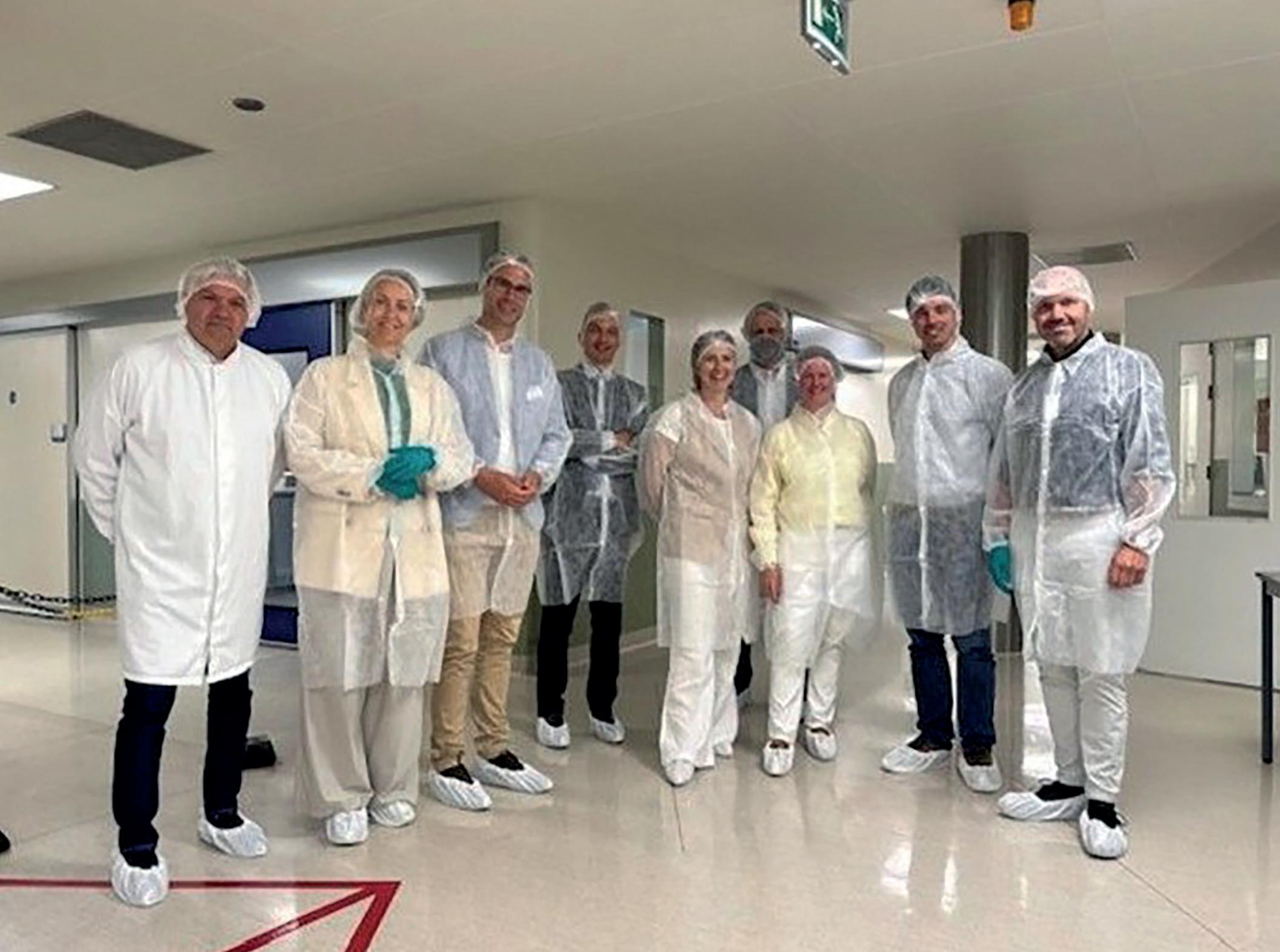
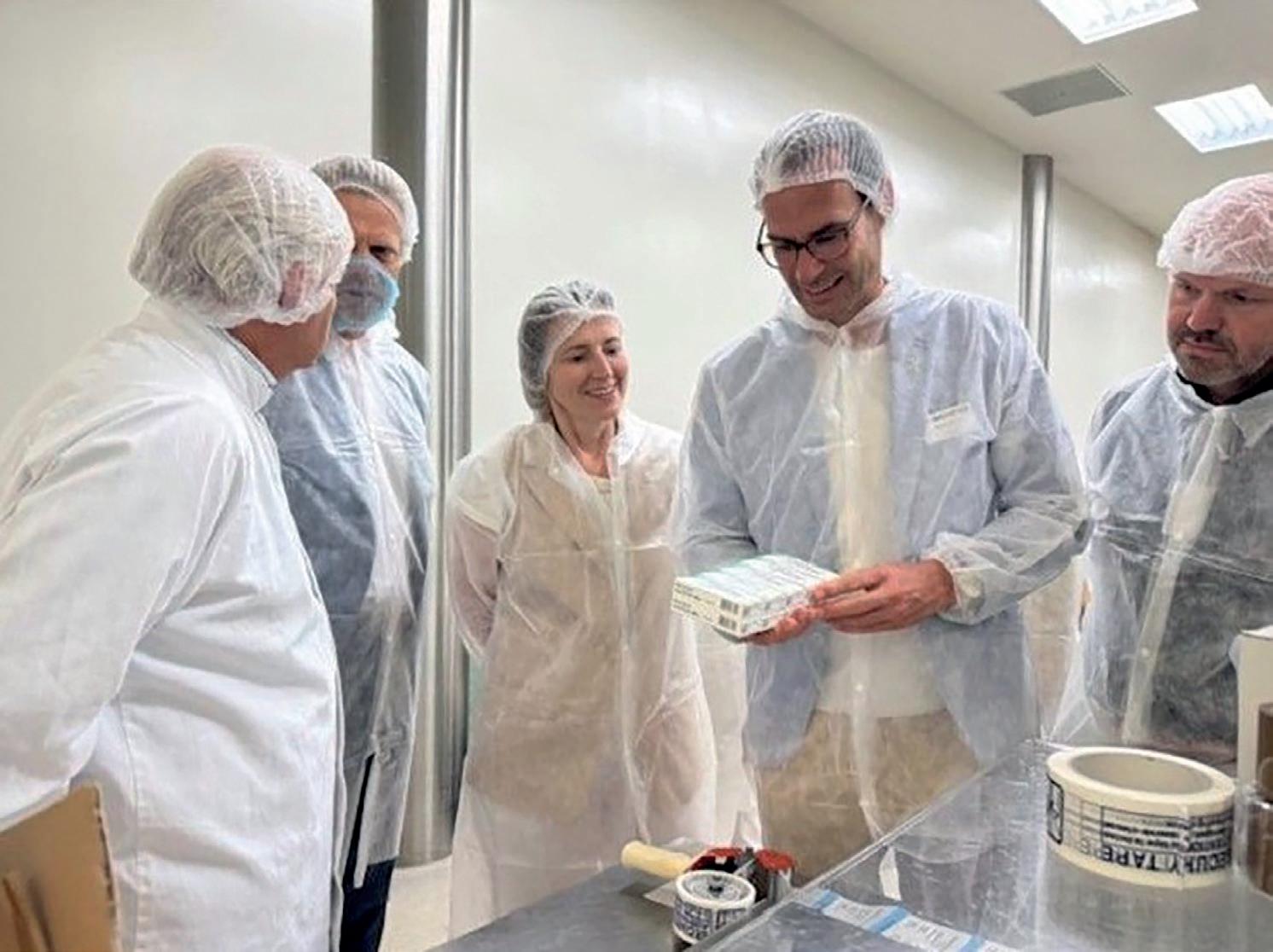
De complete delegatie van het bedrijfsbezoek aan Ofimedicine in Leiden. The complete delegation of the company visit to Ofimedicine in Leiden.
Burgemeester Heijkoop werd rondgeleid bij Ofimedicine in Leiden. Mayor Heijkoop was given a tour of Ofimedicine in Leiden.
Weite OIdenziel, CEO Ofichem:
“KOP D’R VEUR, HAND AAN DE PLOEG EN NAAR DE HORIZON KIJKEN!”
“HEAD
UP, HAND ON THE PLOUGH AND LOOK TO THE HORIZON!”
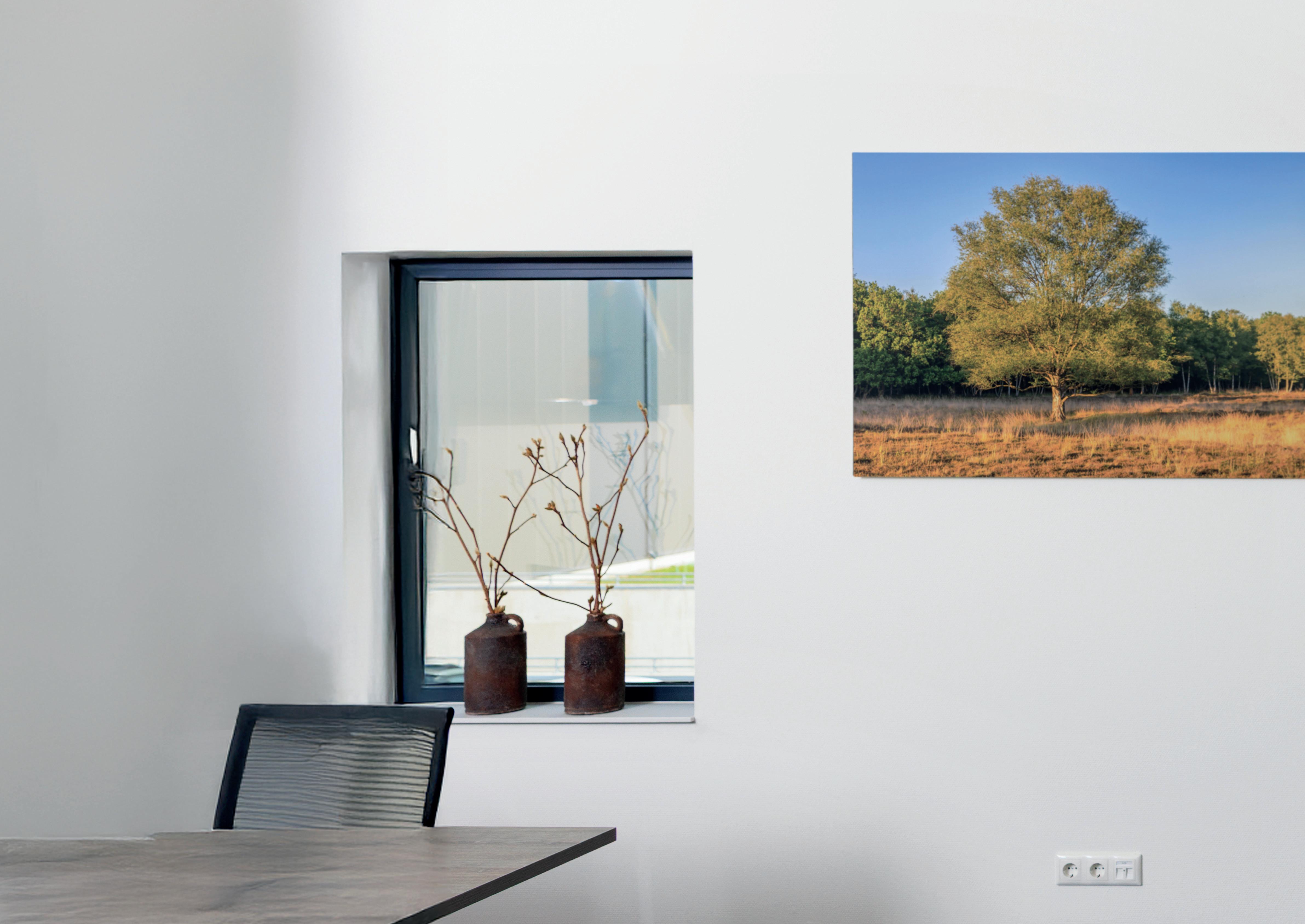
Thuis in huize Oldenziel ging het zelden over farmacie of Ofichem.
Waar het wel vaak over ging, was school en paarden! Toen Weite het gymnasium had afgerond, wist hij niet wat hij moest gaan studeren. Zijn vader zei: “Ga maar farmacie studeren!” Zonder de open dag te bezoeken volgde Weite de suggestie van zijn vader op.
“Pas toen ik bijna klaar was met mijn promotie in de Neurochemie, werd ik nieuwsgierig naar het bedrijf.
Op de allerlaatste verjaardag van mijn vader, in januari 2006, vroegen wij als familie hoe het er nu eigenlijk voor stond met het bedrijf.
Overigens wilde mijn vader niet dat zijn kinderen het bedrijf zouden overnemen, hij wilde het liever verkopen.”
“Hij zei tegen ons: “Ga maar parttime werken — in zijn optiek was 40 uur werken parttime — en begin niet met zo’n oude fabriek in Ter Apel.””
Toekomst
“Zelf ambieerde ik geen baan in de wetenschap. Niet dat ik het niet leuk vond, maar tijdens mijn tijd aan de universiteit had ik te veel goede mensen gefrustreerd zien vertrekken omdat ze hun aanstelling niet verlengd kregen.”
ANDEREN DIE OVER JE LOT BESCHIKKEN, DAAR HEB IK WAT AVERSIE TEGEN
“Tijdens de afrondende fase van mijn onderzoek werkte ik nog parttime als apotheker in een openbare apotheek. Ook daar zag ik voor mezelf geen toekomst. Zorgverzekeraars die steeds meer gingen bepalen wat je wel en niet mocht doen, dat zag ik niet zitten. Daarnaast vond ik het niet uitdagend genoeg. Ik wilde hard werken, iets verdienen en iets opbouwen. Anderen die over je lot beschikken, daar heb ik wat aversie tegen”
At the Oldenziel household, pharmacy or Ofichem were rarely discussed. What was often discussed, however, was school and horses! When Weite finished high school, he did not know what to study. His father then said, “Go study pharmacy!” Without attending the open day, Weite followed his father’s suggestion.
“It was not until I was almost finished with my PhD in Neurochemistry that I became curious about the company. On my father’s very last birthday, in January 2006, we, as a family, asked how things were going with the company. My father did not actually want his children to take over the company; he preferred to sell it.”
“He told us: “Just work part-time — in his view, 40 hours was part-time — and do not start with some old factory in Ter Apel.””
Future
“I did not aspire to have a career in academia. Not that I did not enjoy it, but during my time at university, I had seen too many good people leave in frustration because their contracts were not renewed.”
I HAVE SOME AVERSION TO OTHERS HAVING
CONTROL OVER YOUR FATE
“During the final phase of my research, I was still working part-time as a pharmacist in a community pharmacy. I did not see a future for myself there either. I did not like the idea of health insurers increasingly dictating what you could and could not do. Besides, I did not find it challenging enough. I wanted to work hard, earn something, and build something. I have some aversion to others having control over your fate.”
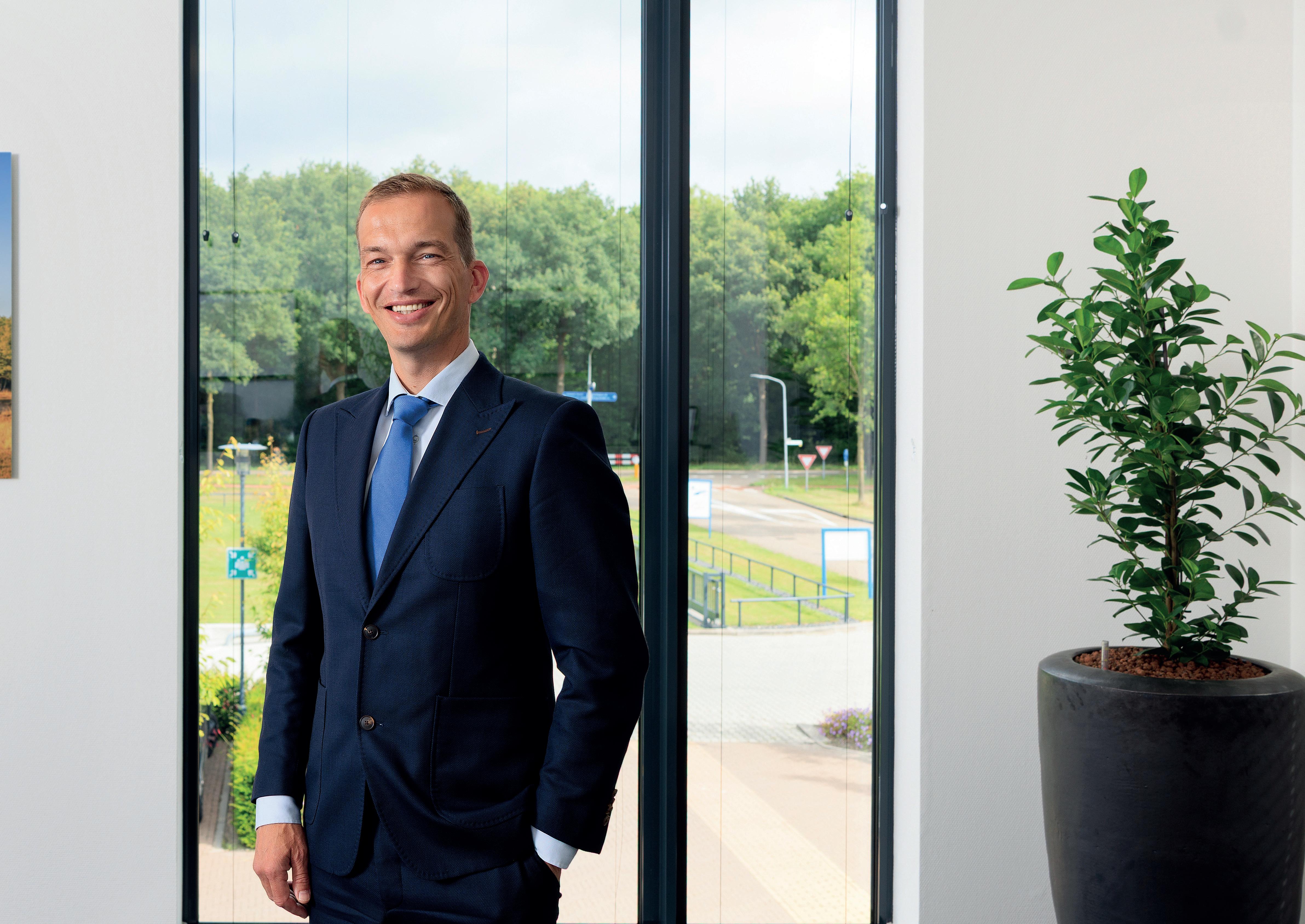
Shovel afbellen
“In de zomer van 2006 raakte ik betrokken bij Ofichem. Twee jaar daarvoor was het handelsbedrijf opgericht. Dat had natuurlijk wat aanlooptijd nodig, maar nu begon het goed te lopen. Wilde mijn vader eerder nog het productiebedrijf platgooien, nu moest de shovel maar worden afgebeld.”
“Voor het implementeren van de Good Manufacturing Practiceregelgeving zocht mijn vader een industrieapotheker. Die vond hij te duur, dus vroeg hij of ik het wilde doen. Per september 2006 ging ik 4 dagen per week bij Ofichem werken.”
IK WIST TOEN ÜBERHAUPT NIET OF IK EEN TOEKOMST BIJ OFICHEM WILDE
Flauwekul
“Ik moest de eerste basisprincipes van GMP invoeren. Uiteraard niet te uitgebreid, want ‘die flauwekul’ kostte alleen maar geld. De producten van Ofichem waren immers goed, maar we moesten nu eenmaal mee in de vaart der volkeren. Een GMP afkeur van de fabriek zou ook onherroepelijk tot sluiting leiden.”
Bedrijfsopvolging
“Eén dag in de week werkte ik bij een spin-off bedrijf dat vanuit onze vakgroep van de Universiteit was opgericht, Brains Online. Op die manier hield ik nog een deur open naar een andere toekomst. Mijn vader wist immers nog niet of er een toekomst voor Ofichem zou zijn - en ik wist überhaupt niet of ik een toekomst bij Ofichem wilde. Dus eerst maar een paar jaar proberen en daarna verder zien. “Bovendien verdien je dan ook wat, want tot nu toe heb je nog niets verdiend”, zei mijn vader.”
“Ik promoveerde in november 2006. Een maand later overleed mijn vader. Zomaar ineens; een hartinfarct. Hij was pas 59 jaar. We hadden nooit echt goed gesproken over de toekomst, laat staan over bedrijfsopvolging. Ik heb van het ene op het andere moment noodgedwongen zijn plaats ingenomen en ben zo het bedrijf ingerold.”
Kop d’r Veur
“Voor mij was dat een zeer heftige en intensieve periode, maar tegelijkertijd is het ook wat het is. ‘Kop d’r veur, hand aan de ploeg en naar de horizon kijken!’ Een maand na het overlijden van mijn vader, in januari 2007, kwamen er inspecteurs van de Nederlandse Voedsel en Warenautoriteit (NVWA) langs voor een onaangekondigde bedrijfscontrole.”
Calling off the Shovel
”In the summer of 2006, I got involved with Ofichem. The trading company had been founded two years earlier. Naturally, that needed some time to get started, but now things were starting to take off. My father had previously wanted to shut down the production company, but now it was time to call off the shovel.”
“To implement the Good Manufacturing Practice regulations, my father was looking for an industrial pharmacist. He found that too expensive, so he asked if I wanted to do it. In September 2006, I started working at Ofichem four days a week.”
AT THE TIME I DID NOT EVEN KNOW IF I WANTED A FUTURE AT OFICHEM
Nonsense
“I had to implement the first basic principles of GMP. Not too extensively, of course, because ‘that nonsense’ only cost money. After all, Ofichem’s products were good, but we simply had to keep up with the times. A GMP rejection of the factory would also inevitably lead to closure.”
Business Succession
“One day a week, I worked at a spin-off company founded by our department at the university, Brains Online. That way, I kept a door open to a different future. After all, my father did not yet know if there was a future for Ofichem—and I did not even know if I wanted a future at Ofichem. So, I decided to try it for a few years and then see what happens. “Besides, you will earn something then, because you have not earned anything yet,” my father said.”
“I received my doctorate in November 2006. A month later, my father passed away. Suddenly, a heart attack. He was only 59. We had never really talked about the future, let alone business succession. I was suddenly forced to take his place and that is how I got involved in the company.”
Head Up
“For me, that was a very intense and demanding period, but at the same time, it is what it is. ‘Head up, hands on the plough, and look to the horizon!’ A month after my father’s death, in January 2007, inspectors from the Dutch Food and Consumer Product Safety Authority (NVWA) came by for an unannounced company inspection.”
“Het werd duidelijk dat we zo snel mogelijk een professionaliseringsslag moesten maken. Letterlijk zeiden ze: “Je hebt 3 weken de tijd om de boel hier op te ruimen en anders moet het bedrijf sluiten.””
Nieuw leven inblazen
“Mijn vader wilde lange tijd het bedrijf stopzetten en gedurende een kleine 10 jaar was er niet of nauwelijks meer geïnvesteerd. We hebben de boel flink opgeruimd en 3 weken later was die NVWA hobbel gelukkig genomen. Aansluitend volgde in die periode de ene na de andere spreekwoordelijke hobbel elkaar snel op.”
“We hebben ervoor gezorgd dat we met het handelsbedrijf geld verdienden. Die inkomsten stopten we weer terug in het productiebedrijf dat zo nieuw leven kreeg ingeblazen en een ‘turn-around’ kon maken. Dat is ons gelukt.”
Emotioneel
“De eerste 5 jaren was er sprake van een zogenaamde bedrijfsopvolgingsfaciliteit waarin zaken erg verweven waren. Daarna zijn we als familie gaan evalueren met advies van de accountant en een overnameadviseur. Dat was emotioneel en psychologisch erg zwaar, omdat privé en zakelijk dwars door elkaar liepen.”
“Ook de afwikkeling van de nalatenschap met alle financiële en fiscale consequenties was erg complex. Dat traject heeft bijna 2 jaar geduurd. Eind 2013 hebben we als familie een goede oplossing gevonden die nog steeds goed voelt. Als je achteraf terugkijkt is er toen de eerste 10 jaar wel heel veel gebeurd.”
Vijf operationele bedrijven
“We zijn in de loop der jaren gegroeid naar een groep van 5 operationele bedrijven, met daaromheen nog wat andere bedrijven: de Business Unit-structuur. Ieder heeft zijn eigen organisatie, directie, businessplan, financiering en fysieke locatie.”
“Op dit moment hebben we in totaal ongeveer 200 mensen in dienst. Het zijn van een groot corporate bedrijf met veel managementlagen is juist iets dat we niet willen.”
“It became clear that we needed to professionalize as quickly as possible. They literally said: “You have three weeks to clean up this place, or the company will have to close.””
A Fresh Start
“My father wanted to close down the company for a long time, and for almost ten years, there had been little to no investment. We cleaned up the place, and thankfully, three weeks later, that NVWA hurdle was overcome. During that period, one proverbial hurdle followed another in quick succession.”
“We made sure we were making money with the trading company. We reinvested that income back into the production company. This breathed new life into the business and allowed us to make a turnaround. We succeeded.”
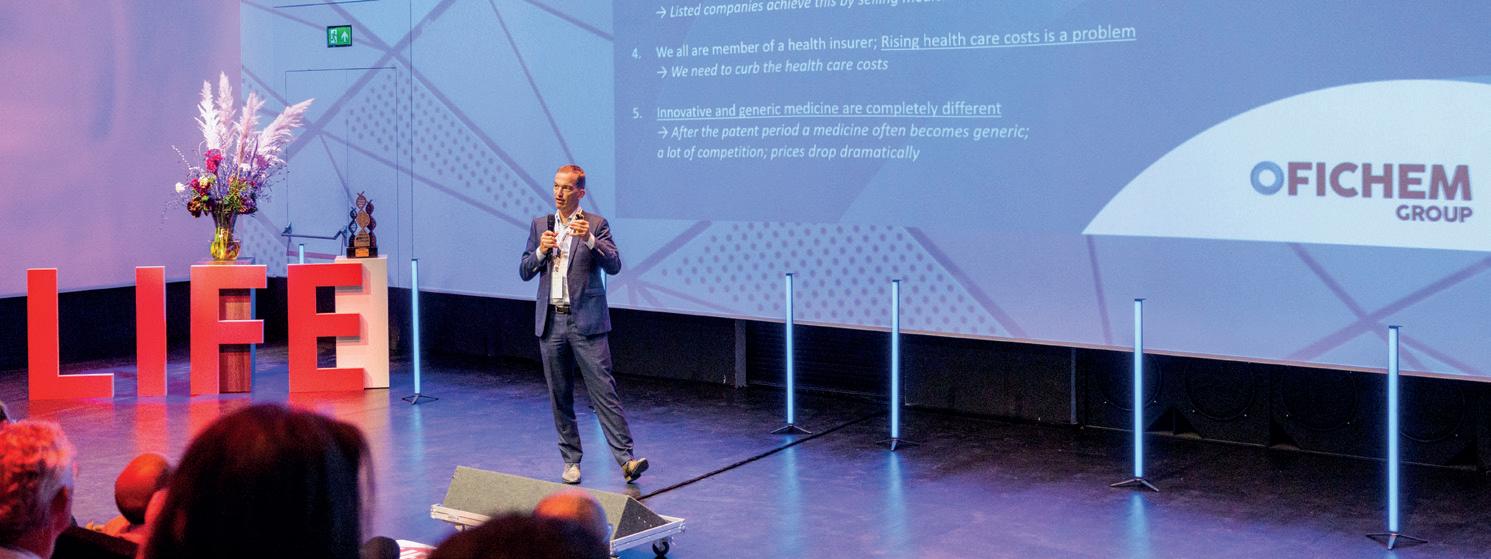
Emotional
“For the first five years, there was a so-called business succession facility, with many things intertwined. After that, we, as a family, evaluated the situation with advice from the accountant and a mergers and acquisitions advisor. That was emotionally and psychologically very difficult, because our personal and business lives were intertwined.”
“The settlement of the estate, with all its financial and tax consequences, was also very complex. That process took almost two years. At the end of 2013, we, as a family, found a good solution that still feels good. Looking back, a lot happened in those first 10 years.”
Five Operating Businesses
“Over the years, we have grown into a group of five operating companies, surrounded by several other companies: the Business Unit structure. Each has its own organization, management, business plan, financing, and physical location.”
“We currently employ approximately 200 people in total. Being a large corporate entity with many layers of management is precisely what we do not want.”
Weite bij de LIFE Science Conferentie (2023) / Weite at the LIFE Science Conference
FEITEN EN CIJFERS
FACTS AND FIGURES
Dr.
Ofichem begon klein in 1975: Otto Oldenziel bouwde samen met zijn vrouw Ina het bedrijf op vanuit de garage aan huis. Langzaam kwamen er steeds meer
medewerkers bij en is Ofichem Group uitgegroeid tot wat het vandaag de dag is: een succesvol internationaal bedrijf, dat altijd dicht bij haar roots is gebleven.
Ofichem started small in 1975: Dr. Otto Oldenziel and his wife Ina built the company from their home garage. Gradually, more and more employees joined, and the
Ofichem Group grew into what it is today: a successful international company that has always stayed true to its roots.
Lab Ofichem: GMP, GDP, FDA inspected
Ofichem: GDP
Ofipharma: GMP, GDP
Ofimedicine: GMP, GDP
50 commercially produced own API’s
30 CDMO API projects per annum
> 400 different API’s distributed
> 40 different type of tablets produced, with a capacity of > 2 billion tablets
> 10 CDMO medicine projects per annum
Offices
3 GMP manufacturing sites, 4 lab locations
30 CDMO projects p.a.
> 100 different type of CRO and service projects per annum
>400 APIs distribution products
>500 million tablets produced
OFICHEM OP DE KAART
OFICHEM ON THE MAP
Exportlanden
Export countries
Geen activiteiten
No activities
2x Ter Apel, Leiden, Nijmegen, NL
Hamburg, DE
Hangzhou City, CN
Winston-Salem, US
Paris, FR Moscow, RU
Uppsala, SE
OPBOUW VAN DE OFICHEM GROUP
OFICHEM’S ORGANISATIONAL CHART
Ofichem B.V. Ofipharma B.V.
Laboratorium Ofichem B.V.
Ofichem Beheer B.V.
Ofimedicine B.V.
Representative Office Ofichem B.V. Hangzhou
PNG Medical B.V. h.o.d.n. Ofinext
Laboratorium Ofichem US Inc.
Ofimedicine Compounding B.V.
Aviva B.V.
Incopharm GmbH Ofichem Sweden AB
Ofichem Uppsala AB
HET MANAGEMENT VAN OFICHEM
OFICHEM’S MANAGEMENT
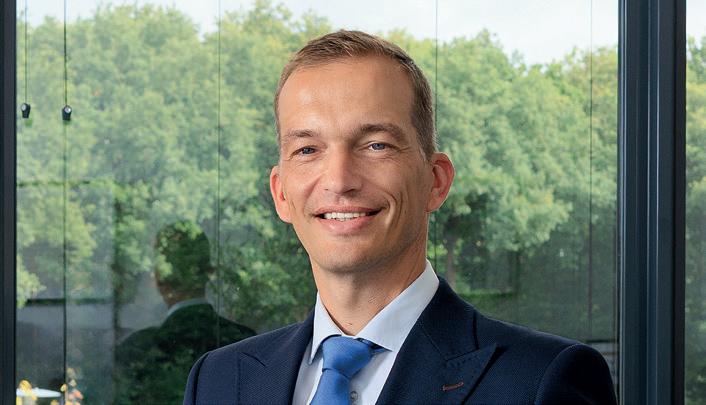
Weite Oldenziel CEO Ofichem Group
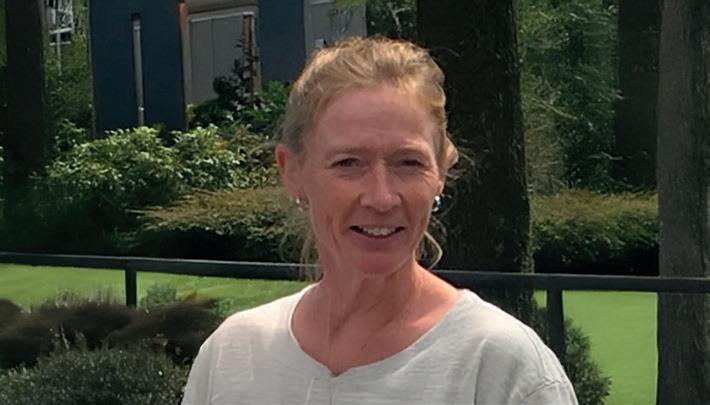
Josien Luiten voormalig CFO Ofichem Group
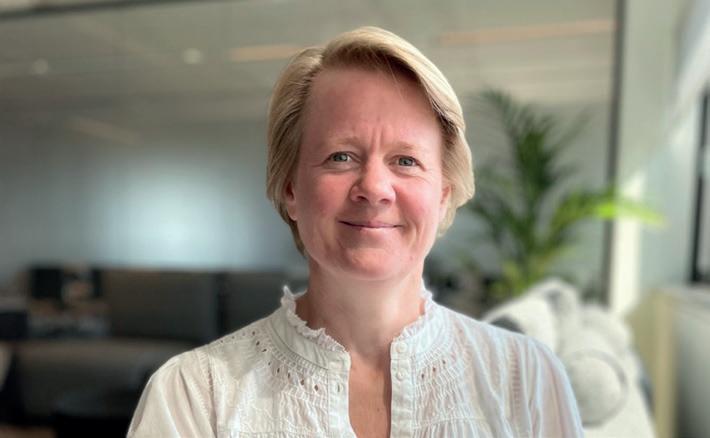
Ilka Reineman Managing Director Ofimedicine B.V.
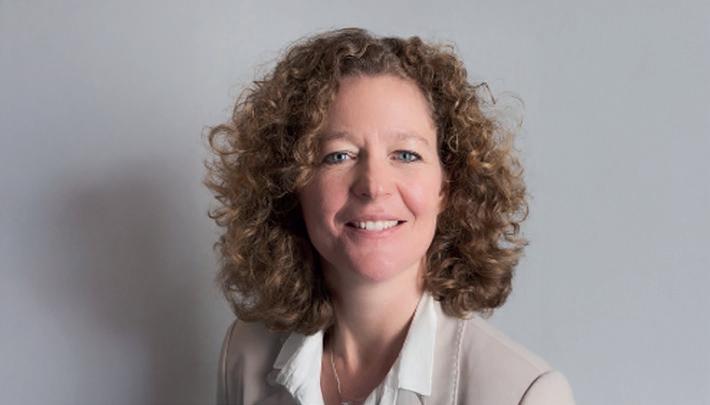
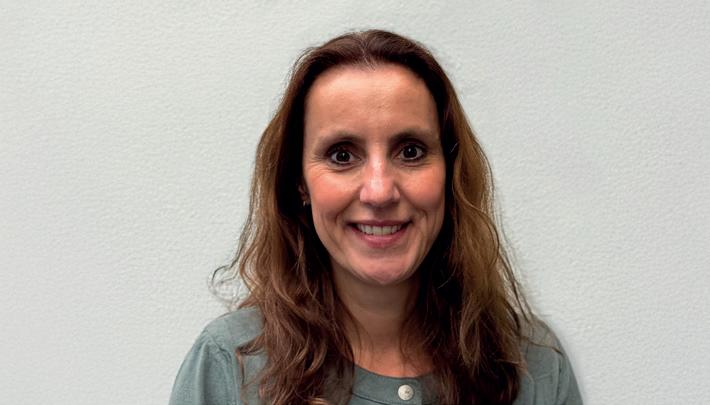

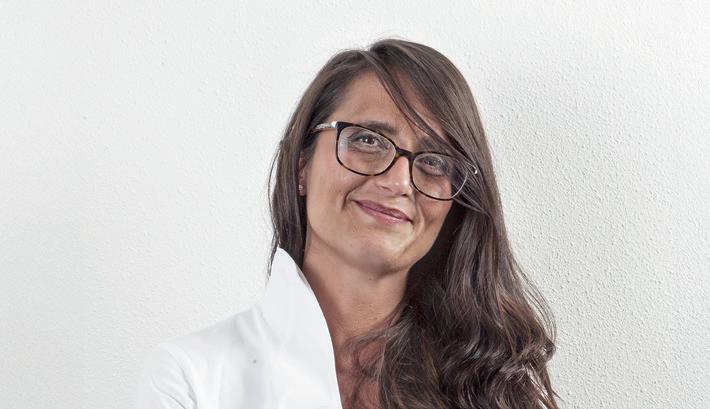
Alessia Cogotti Managing Director Lab Ofichem B.V. & Ofichem Sweden
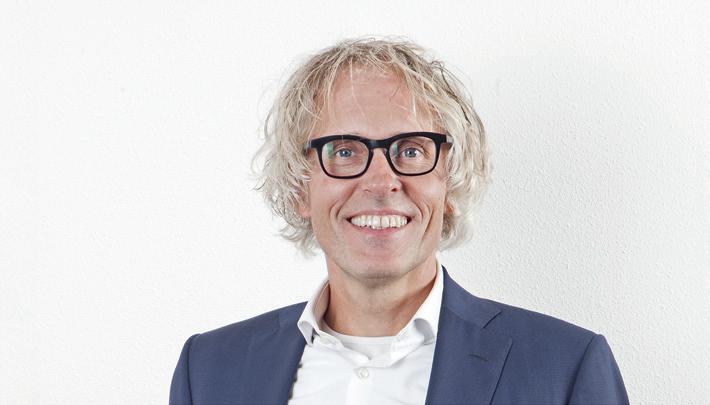
Jeroen Gordijn Managing Director Ofipharma B.V.

Arjan van Ravenhorst Managing Director Ofichem B.V.
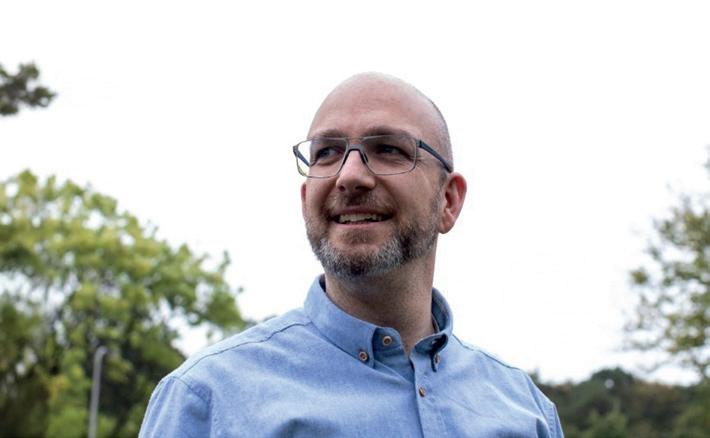
Lee Ayres Managing Director Avivia B.V.
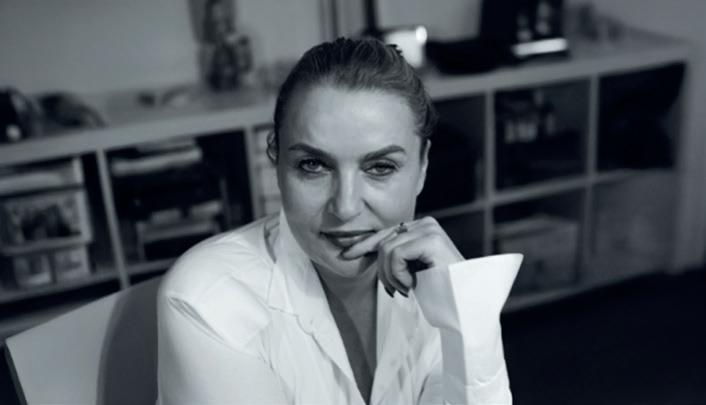
Managing Director Incopharm GmbH
Sascha Bogerd CFO Ofichem Group
Ulf Hoppmann CSO Ofichem Group
Kirsten Lingbeek COO Ofichem Group
Goska Feist
EEN TERUGBLIK
LOOKING BACK
Weite Oldenziel staat nu bijna 20 jaar aan het roer van Ofichem. Welke ontwikkelingen zag hij de afgelopen decennia?
“Eind 20e eeuw vroeg men zich af hoe we de gezondheidszorg betrouwbaar, bereikbaar en betaalbaar konden houden. Men kwam toen tot de conclusie dat er een overstap gemaakt moest worden naar generieke medicijnen. Dat wil zeggen: medicijnen waarin de werkzame stof centraal staat, in plaats van de naam van het medicijn en/of de fabrikant.”
Aspirine
“Neem bijvoorbeeld de pijnstiller Aspirine, gefabriceerd door Bayer uit Duitsland. De werkzame stof daarin is acetylsalicylzuur. Zo heet het actieve bestanddeel. Dus naast doosjes Aspirine zijn er ook de generieke labels van Acetylsalicylzuur te koop.”
China
“Eind vorige eeuw begon men goedkoop grondstoffen in te kopen in China. Hierdoor heeft de API-industrie in de Westerse landen een flinke klap gekregen. Feitelijk bestaan er in Europa of de VS geen
API-productiebedrijven meer die volledig vanuit basischemicaliën alle synthesestappen tot aan de API kunnen maken.”
Afhankelijkheid
“De westerse bedrijven die zijn overgebleven, kopen ergens een ‘(key)intermediate’ of ‘advanced startmateriaal’ in om van daaruit de synthese-route te vervolgen. Vanuit dat perspectief is er een 100% afhankelijkheid van China voor wat betreft de API-productie. En dus automatisch ook voor de generieke medicijnproductie die vanuit API’s wordt gemaakt.”
Verdienmodel
“Op dit moment bevindt de generieke medicijnproductie in Europa en de VS zich in dezelfde fase als de API-productie-industrie 25 jaar geleden. Er is geen verdienmodel voor het produceren van generieke medicijnen in Europa. Zelfs gerenommeerde Indiase bedrijven worden al te duur en in de race naar de bodem zoekt men al naar bedrijven die het in India en China nog goedkoper kunnen produceren. De reden waarom het vaak nog goedkoper kan laat zich raden.”
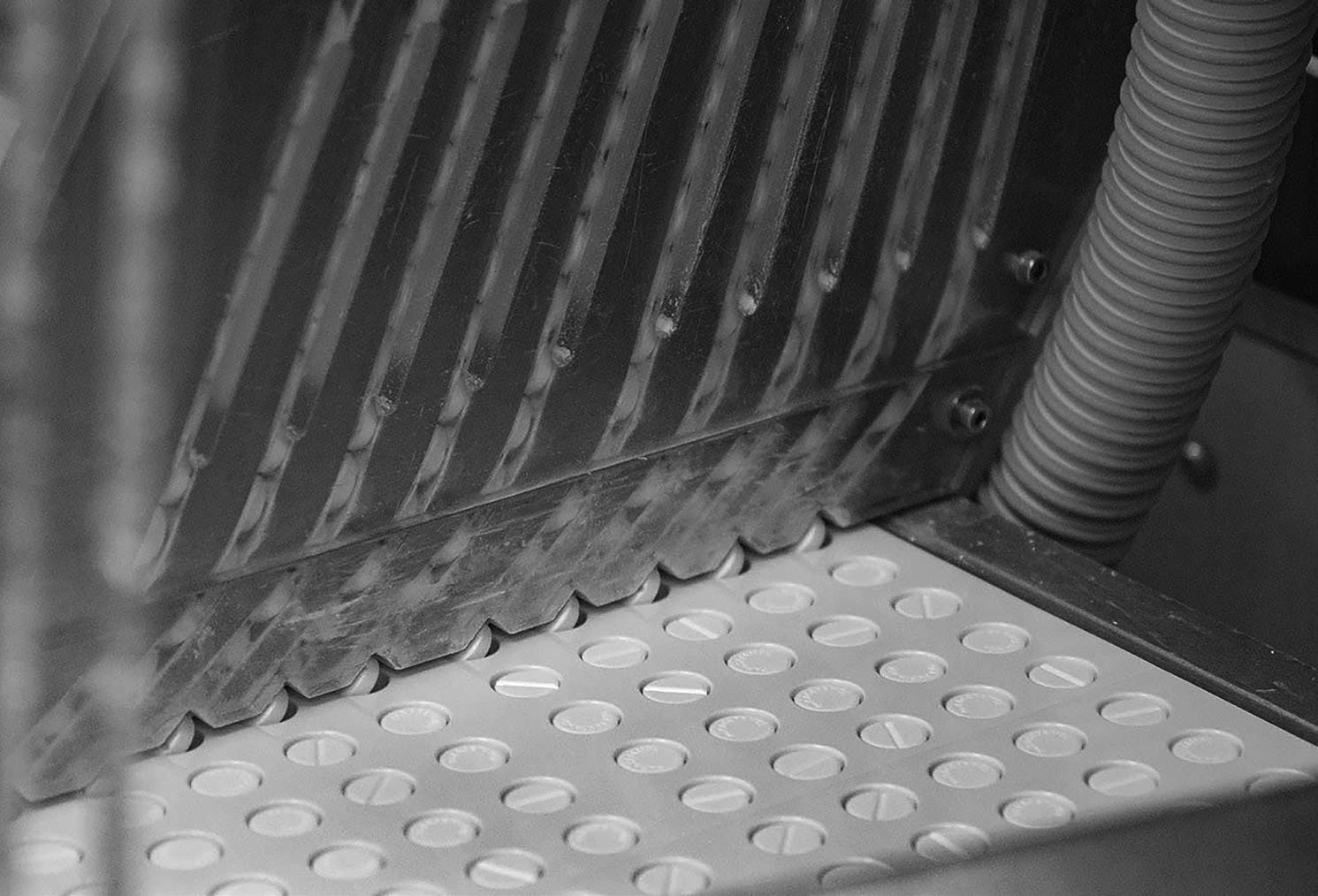
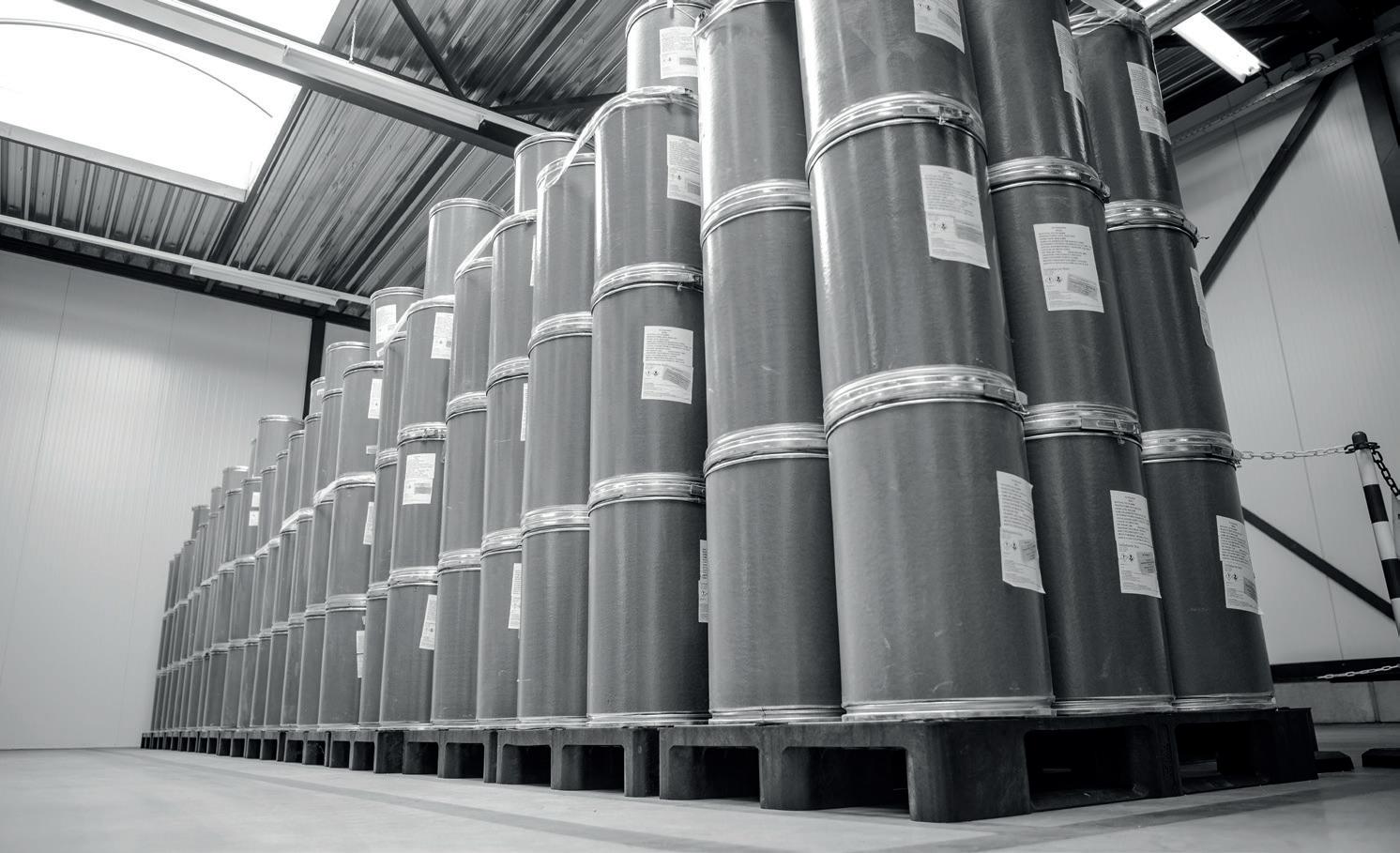
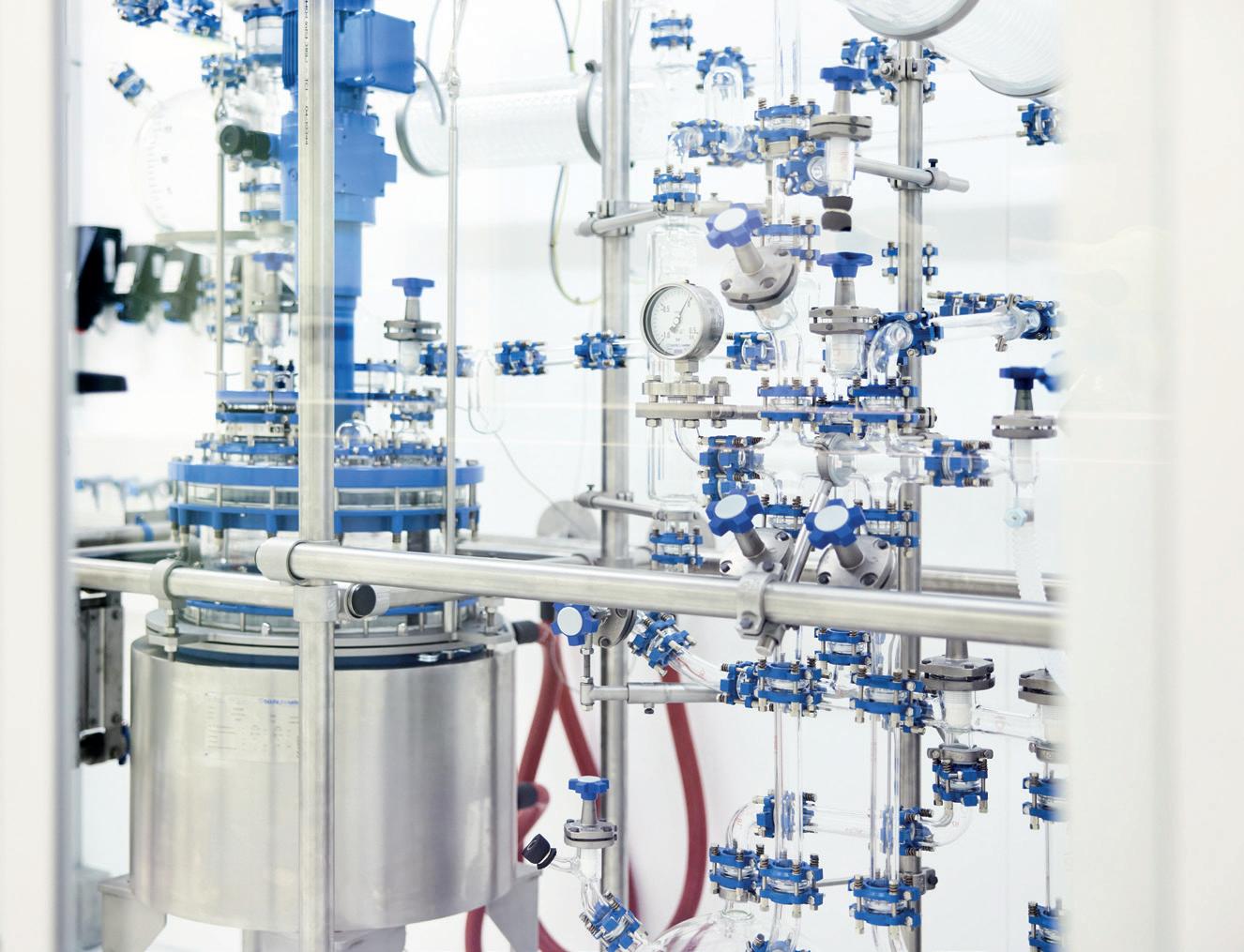
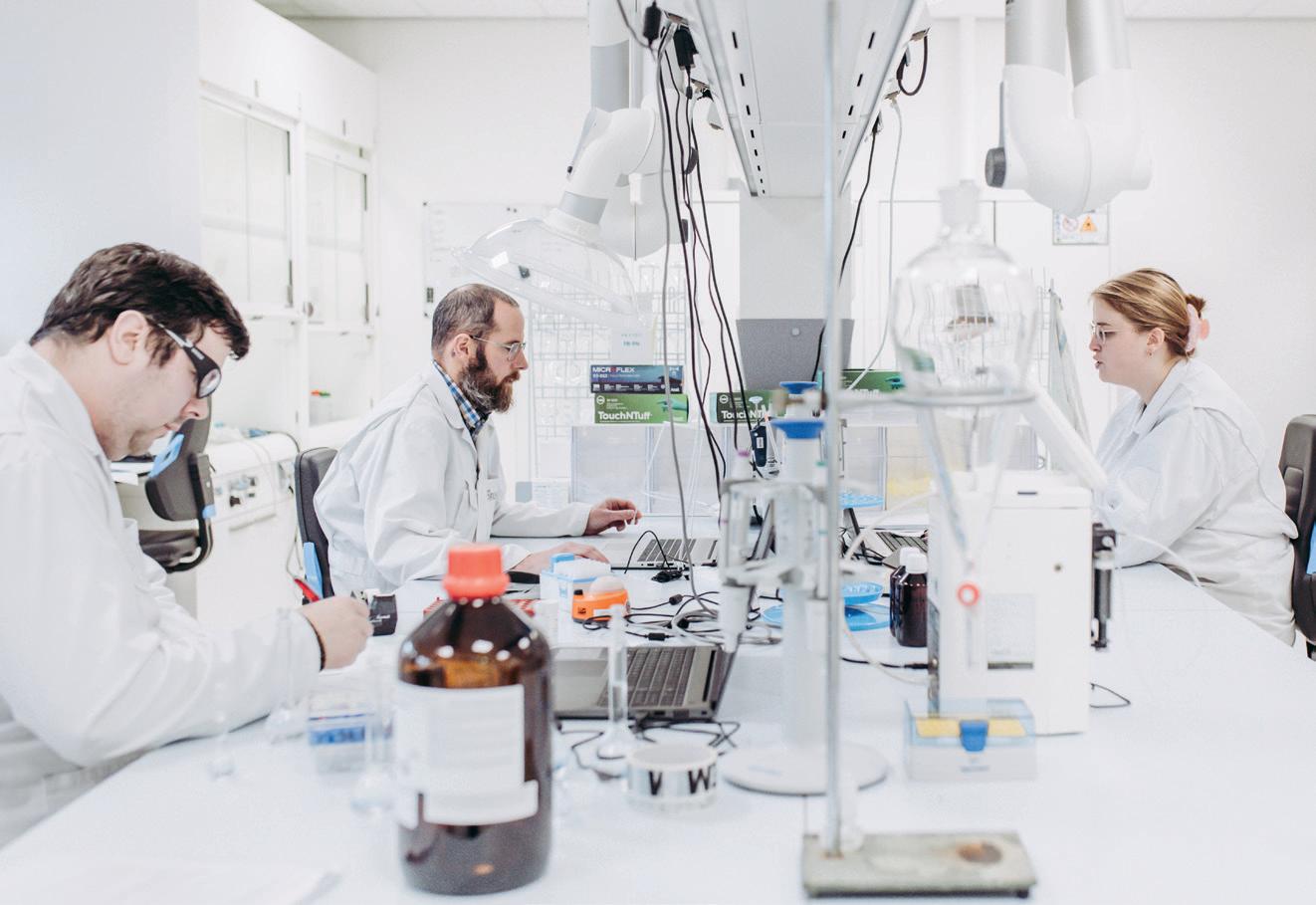
Weite Oldenziel has been at the helm of Ofichem for almost 20 years now. What developments has he witnessed over the past decades?
“At the end of the 20th century, people wondered how we could keep healthcare reliable, accessible, and affordable. They then concluded that a transition to generic medications was necessary. This means medications that focus on the active ingredient, rather than the name of the drug and/or the manufacturer.”
Aspirin
“Take, for example, the painkiller Aspirin, manufactured by Bayer in Germany. The active ingredient is acetylsalicylic acid. That is the name of the active ingredient. So, in addition to boxes of Aspirin, generic labels of acetylsalicylic acid are also available.”
China
“At the end of the last century, people began purchasing cheap raw materials from China. This has dealt a significant blow to the API industry in Western countries. In fact, there are no longer any API production companies in Europe or the US that can perform all the synthesis steps leading to the API entirely from basic chemicals.”
Dependence
“The remaining Western companies purchase a ‘(key) intermediate’ or ‘advanced starting material’ from somewhere and then continue the synthesis route from there. From that perspective, there is a 100% dependence on China for API production. And therefore, automatically also for generic medicines produced from APIs.”
Business model
“Currently, generic drug production in Europe and the US is in the same phase as the API production industry 25 years ago. There is no business model for producing generic drugs in Europe. Even reputable Indian companies are already becoming too expensive, and in the race to the bottom, they are already looking for companies that can produce them even more cheaply in India and China. The reason why it can often be done even cheaper is obvious.”
BLIK OP DE TOEKOMST
LOOKING INTO THE FUTURE
Hoe ziet de toekomst van Ofichem eruit, als het aan Weite ligt?
“Ik zie de toekomst voor Ofichem positief in, ondanks alle onzekerheden in de wereld. We hebben een mix van vele verschillende soorten activiteiten, producten en klanten. Er zijn altijd onderdelen die het tijdelijk minder goed doen of juist beter doen dan verwacht. Maar doordat we niet een te grote afhankelijkheid hebben van een bepaald bedrijfsonderdeel, is er een mogelijkheid tot compensatie.”
Acquisities
“Daarnaast kijken we de laatste jaren ook meer naar acquisities in plaats van uitsluitend organische groei. Zo is het bedrijf in Leiden ontstaan na een voortzetting vanuit een faillissement en zijn de bedrijven in Nijmegen en Uppsala recent overgenomen.”
“Actueel spelen er nog een aantal zaken, maar daar kan ik nu nog niet veel over vertellen. Dat zie je vanzelf op het moment dat dit boek is uitgekomen en al een tijdje in de boekenkast staat.”
One Stop Shop
“We hebben een duidelijke visie hoe het bedrijf zich moet ontwikkelen: we willen een volledig geïntegreerd farmaceutisch bedrijf zijn, dat elke individuele stap kan uitvoeren die nodig is in de ontwikkeling en commerciële productie van medicijnen”
“Onze organisatie bestaat uit kleinere units. Het is nu de uitdaging om het ondernemerschap per unit en de onderlinge samenwerking tussen de units te optimaliseren, zodat we de klanten een propositie aan kunnen bieden volgens het ‘one stop shop’-principe.”
“Binnen deze visie hebben we een GAP-analyse gemaakt van wat er binnen ons bedrijf nog ontbreekt en middels acquisities proberen we dit nu op te vullen en te integreren binnen ons bedrijf.”
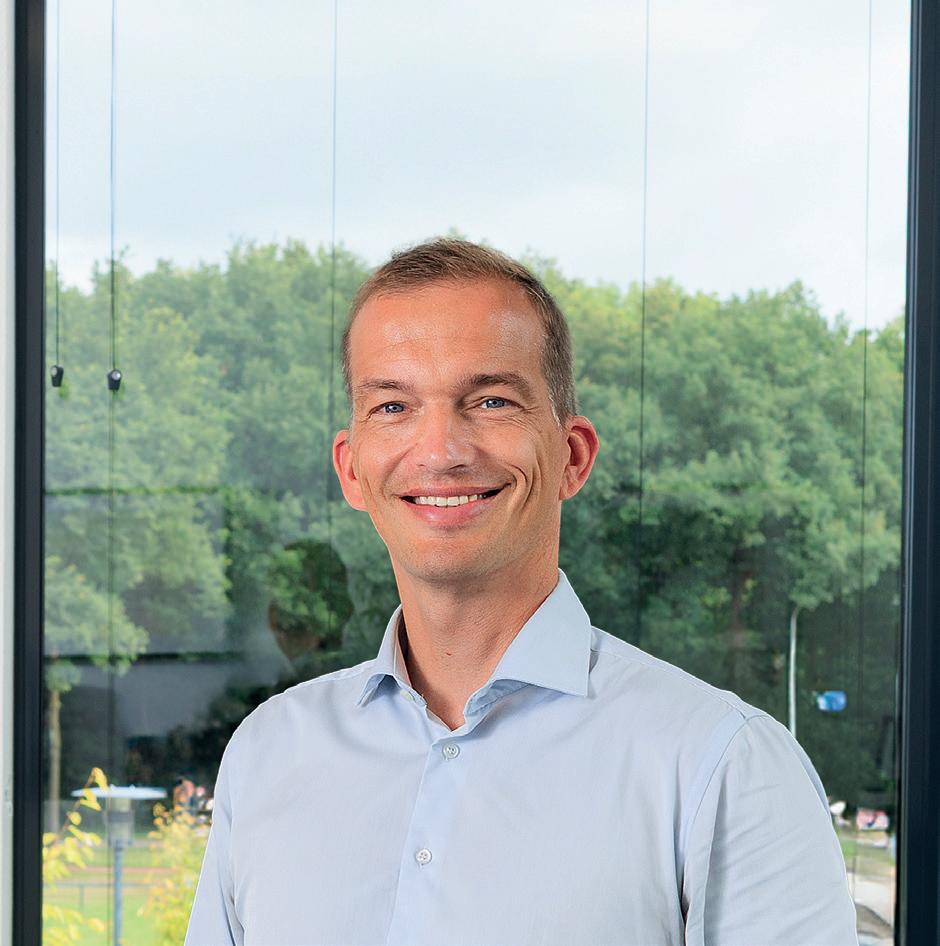
Terug naar de roots
“Nu hebben alle verschillende Business Units nog een eigen naam, maar dit wordt te onoverzichtelijk. Bovendien ontstaat er door de organische groei van de verschillende Business Units ook commerciële overlap tussen units wat het geheel nog complexer maakt.”
“Daarom gaan we dit jaar weer met één naam naar buiten: de naam waar het 50 jaar geleden mee is begonnen, Ofichem.”
What does the future hold for Ofichem, if it were up to Weite?
“I see a positive future for Ofichem, despite all the uncertainties in the world. We have a mix of many different activities, products, and customers. There are always units that temporarily perform less well or better than expected. But because we do not rely too heavily on any one business unit, there is an opportunity for compensation.”
Acquisitions
“In addition, in recent years we have also been focusing more on acquisitions rather than solely on organic growth. For example, the company in Leiden was established after a bankruptcy, and companies in Nijmegen and Uppsala were also recently acquired.”
“There are still a few things going on, but I cannot say much about them yet. You will see for yourself once this book is published and has been on your bookshelf for a while.”
One Stop Shop
“We have a clear vision for how the company should develop: we want to be a fully integrated pharmaceutical company, capable of carrying out every individual step required in the development and commercial production of medicines.”
“Our organization consists of smaller units. The challenge now is to optimize the entrepreneurship of each unit and the collaboration between them, so that we can offer customers a proposition based on the ‘one-stop-shop’ principle.”
“Within this vision, we have conducted a GAP analysis of what is still lacking within our company, and through acquisitions we are now trying to fill this gap and integrate it within our company.”
Back to our roots
“Currently, all the different Business Units still have their own names, but this is becoming too complex. Moreover, the organic growth of the various Business Units is creating commercial overlap between them, making things even more complex.”
“So, starting this year, we will once again be presenting ourselves with a single name. The name we started with 50 years ago: Ofichem.”
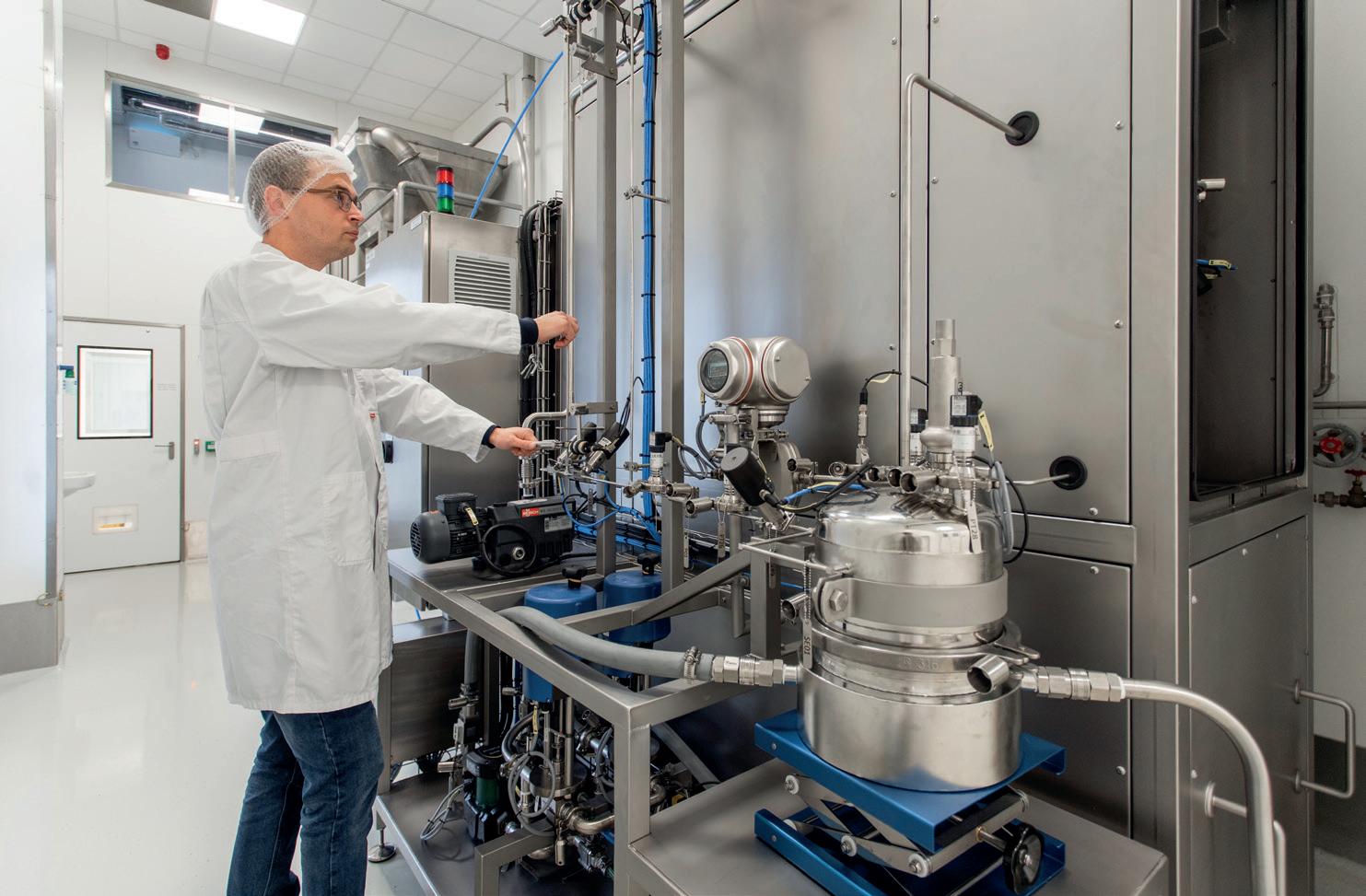
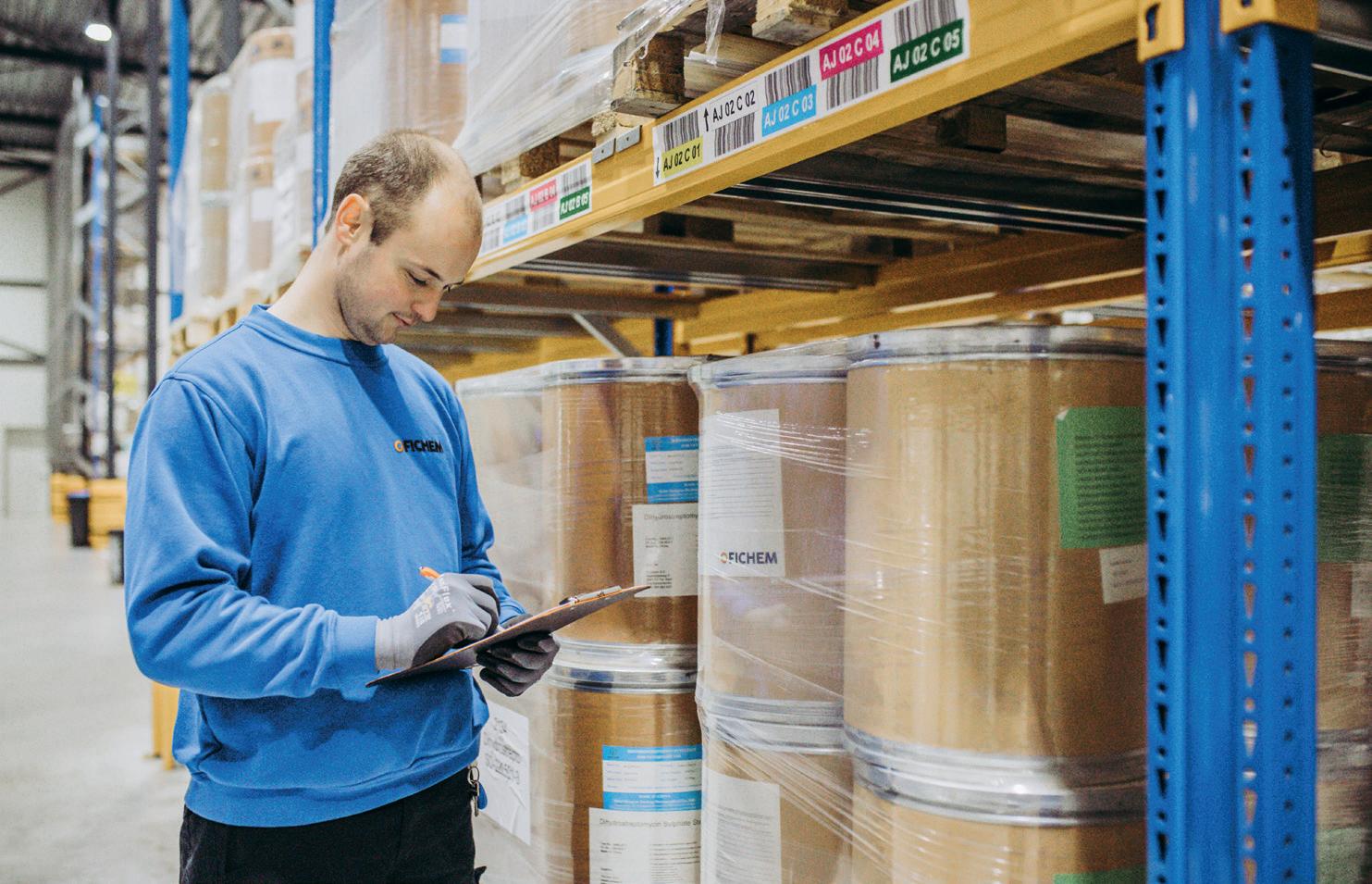
COLOFON
Deze bijzondere eenmalige uitgave markeert het jubileumjaar van Ofichem: al 50 jaar staat ons farmaceutisch bedrijf in dienst van gezondheid en innovatie. Wat ooit begon als een kleinschalige bedrijfsactiviteit in de garage van een twee-onder-een-kapwoning in Gieten, is uitgegroeid tot een mondiale organisatie die een wezenlijke bijdrage levert aan de gezondheid van mens en dier.
Dit jubileumboek vormt niet alleen een terugblik op de mijlpalen die we hebben bereikt, maar is bovenal een eerbetoon aan onze oprichter Otto Oldenziel en zijn vrouw Ina en aan al onze medewerkers, partners en klanten. Met trots kijken we terug en met passie vooruit.
Uitgever: Ofichem Group
Concept en realisatie: Statement Communicatie Adviesbureau, Groningen
Interviews: Statement, Ron Overbeek en Eduard van den Hoff Fotografie interviews: Jan Buwalda, Groningen
Ontwerp: Statement, Laura Nijhuis
Druk: MarneVeenstra, Groningen
September 2025
COLOPHON
This special one-off publication marks Ofichem’s anniversary: for 50 years, our pharmaceutical company has been serving health and innovation. What once began as a small-scale business in the garage of a semi-detached house in Gieten has grown into a global organization that makes a significant contribution to the health of people and animals.
This anniversary book not only reflects on the milestones we have achieved, but above all, it is a tribute to our founder Otto Oldenziel and his wife Ina, and to all our employees, partners, and customers. We look back with pride and forward with passion.
Publisher: Ofichem Group
Concept and production: Statement Communicatie Adviesbureau, Groningen
Interviews: Statement, Ron Overbeek en Eduard van den Hoff
Photography interviews: Jan Buwalda, Groningen
Design: Statement, Laura Nijhuis
Print: MarneVeenstra, Groningen
September 2025
